
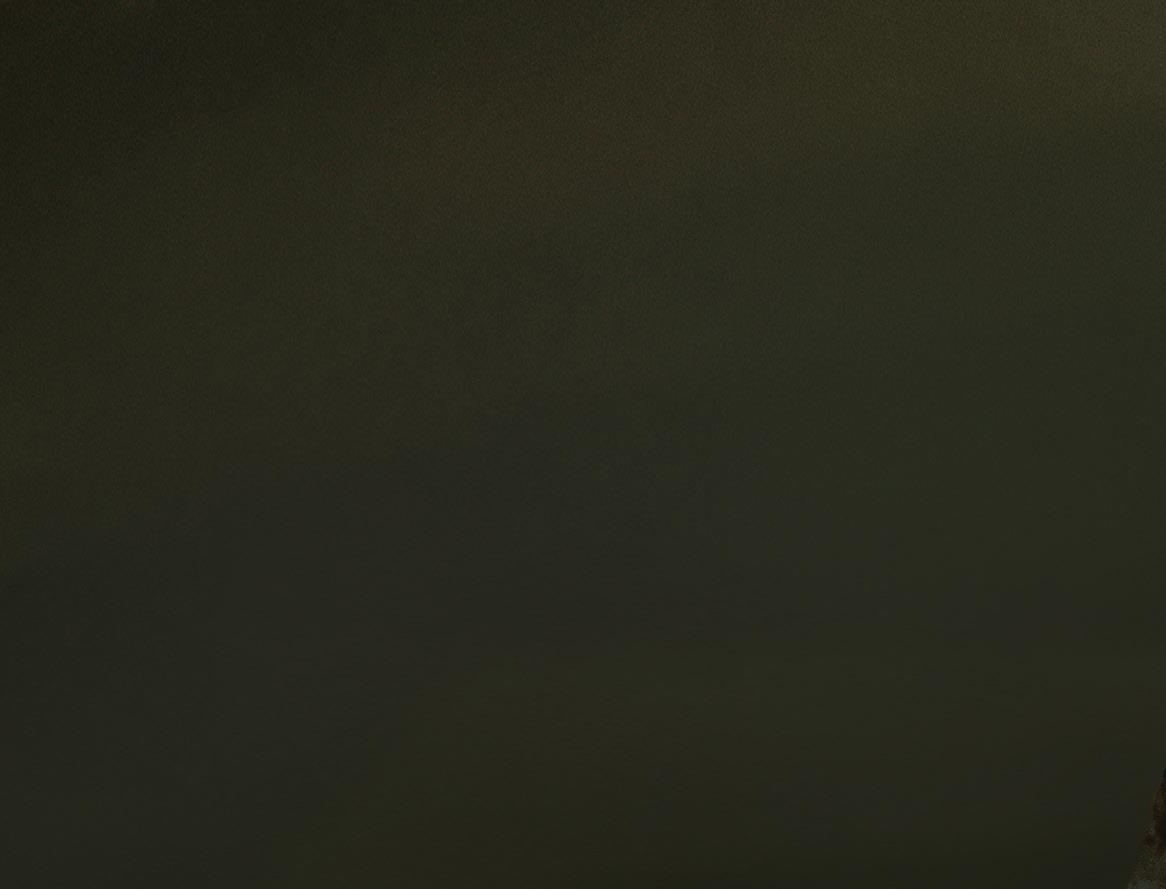










































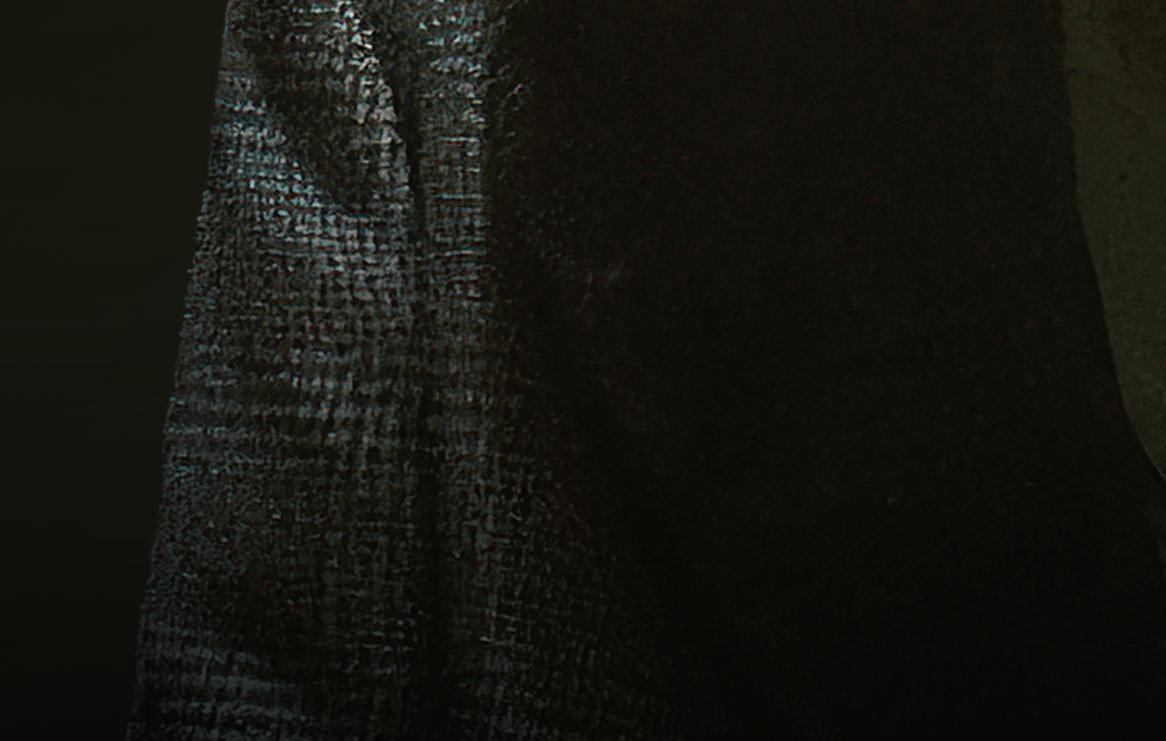













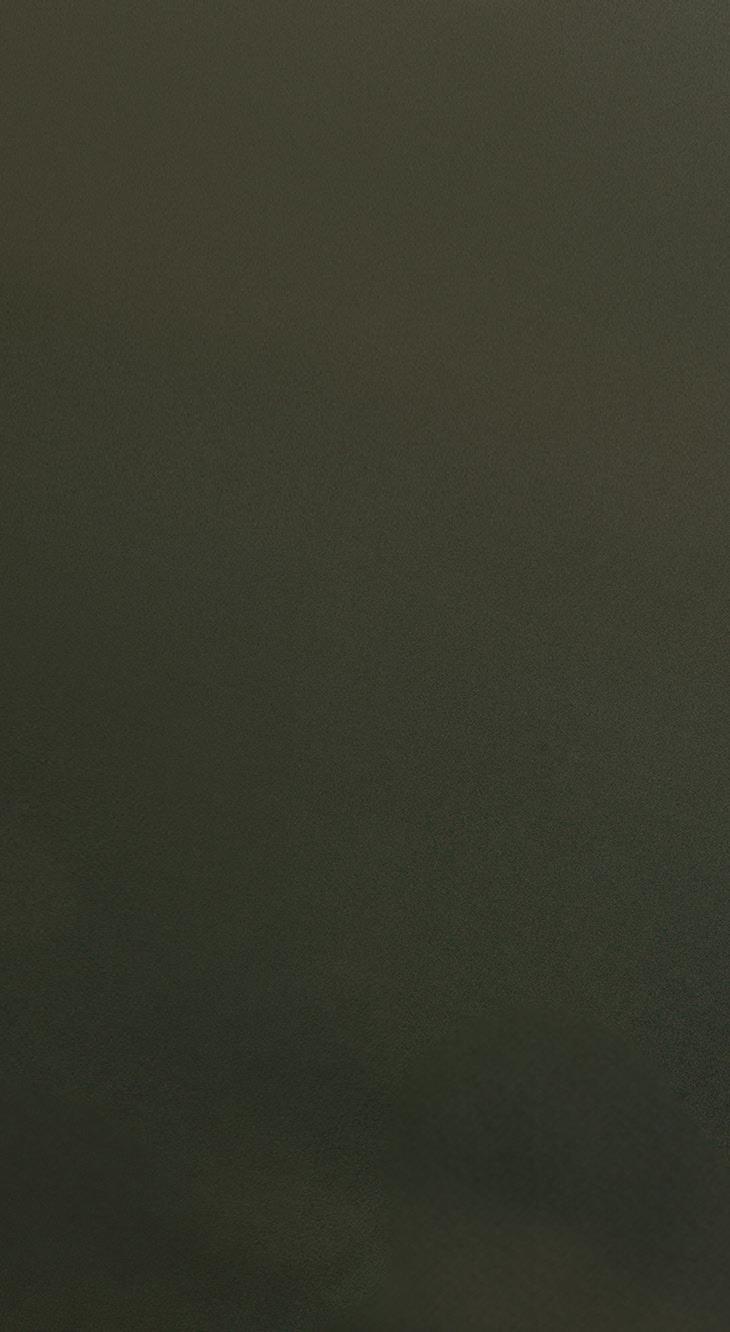









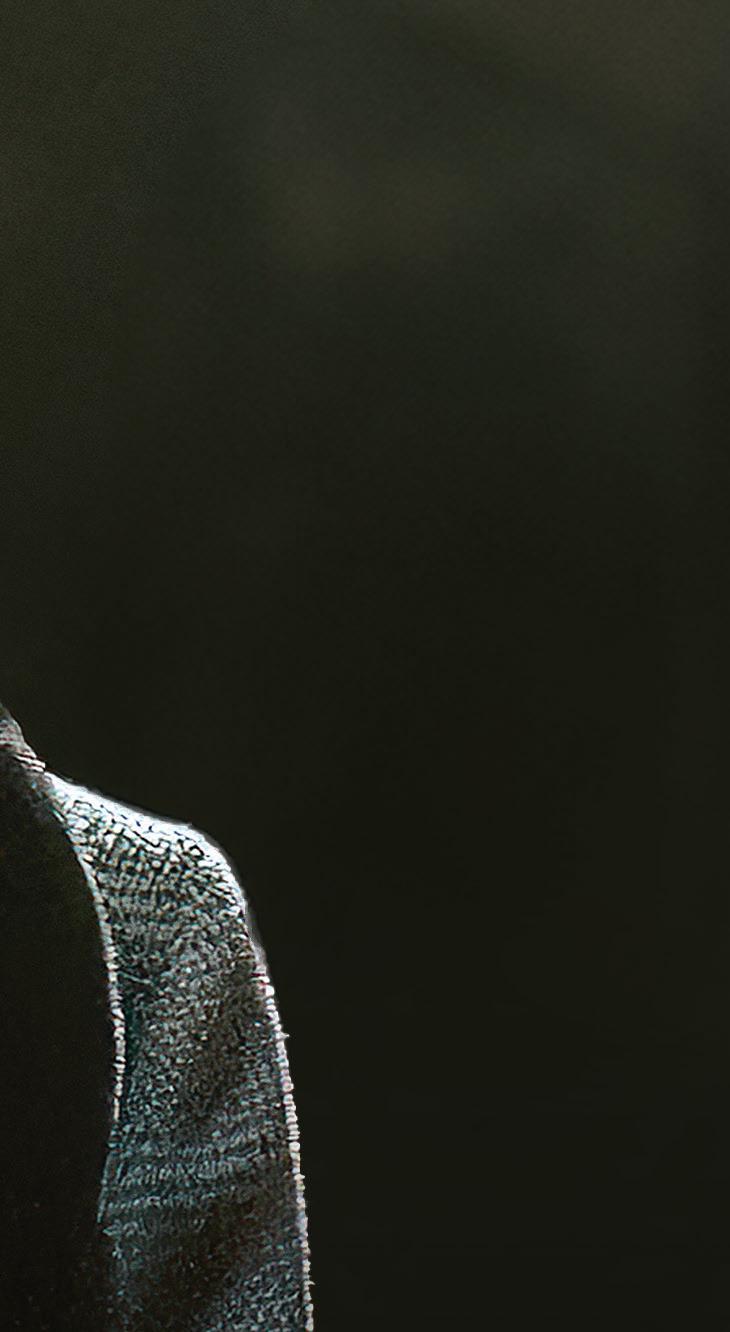

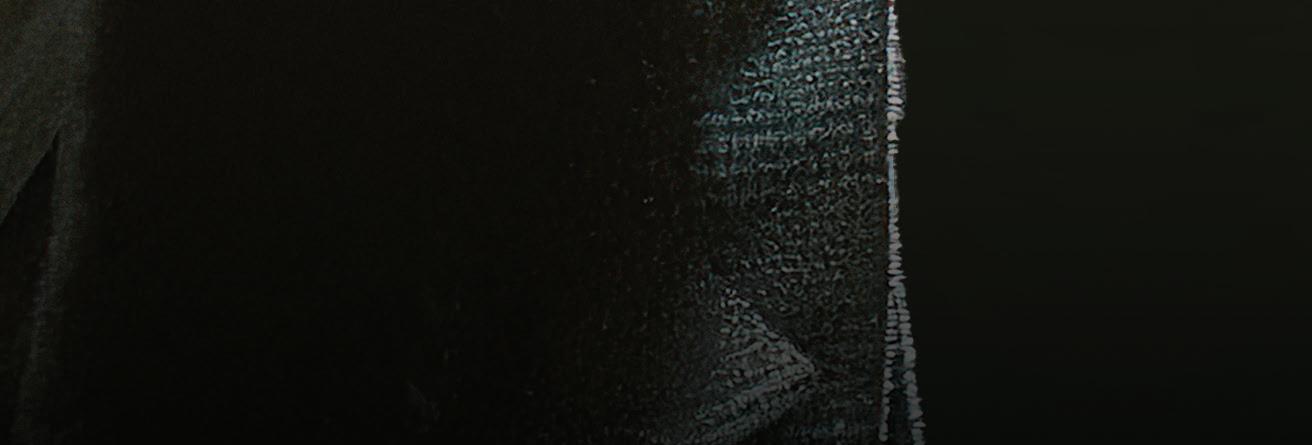

FOR YOUR EMMY OUTSTANDING LIMITED OR ANTHOLOGY SERIES LEAD ACTOR UNLIKE ANYTHING ELSE ON TELEVISION. A WONDERFUL PERFORMANCE BY C JUNE 12, 2024 | EMMY PREVIEW
FOR YOUR EMMY ® CONSIDERATION OUTST ANDING DRAMA SERIES
“A BRAIN-BREAKING REVELATION.”
“THE MOST UNFORGETTABLE SHOW OF THE YEAR.”
ENTERTAINMENT WEEKLY
“ACIDLY FUNNY AND SAVAGELY HEARTBREAKING.”
VANITY FAIR
“A TOWERING CAREER ZENITH FOR EACH OF ITS THREE KEY PLAYERS.”
GQ
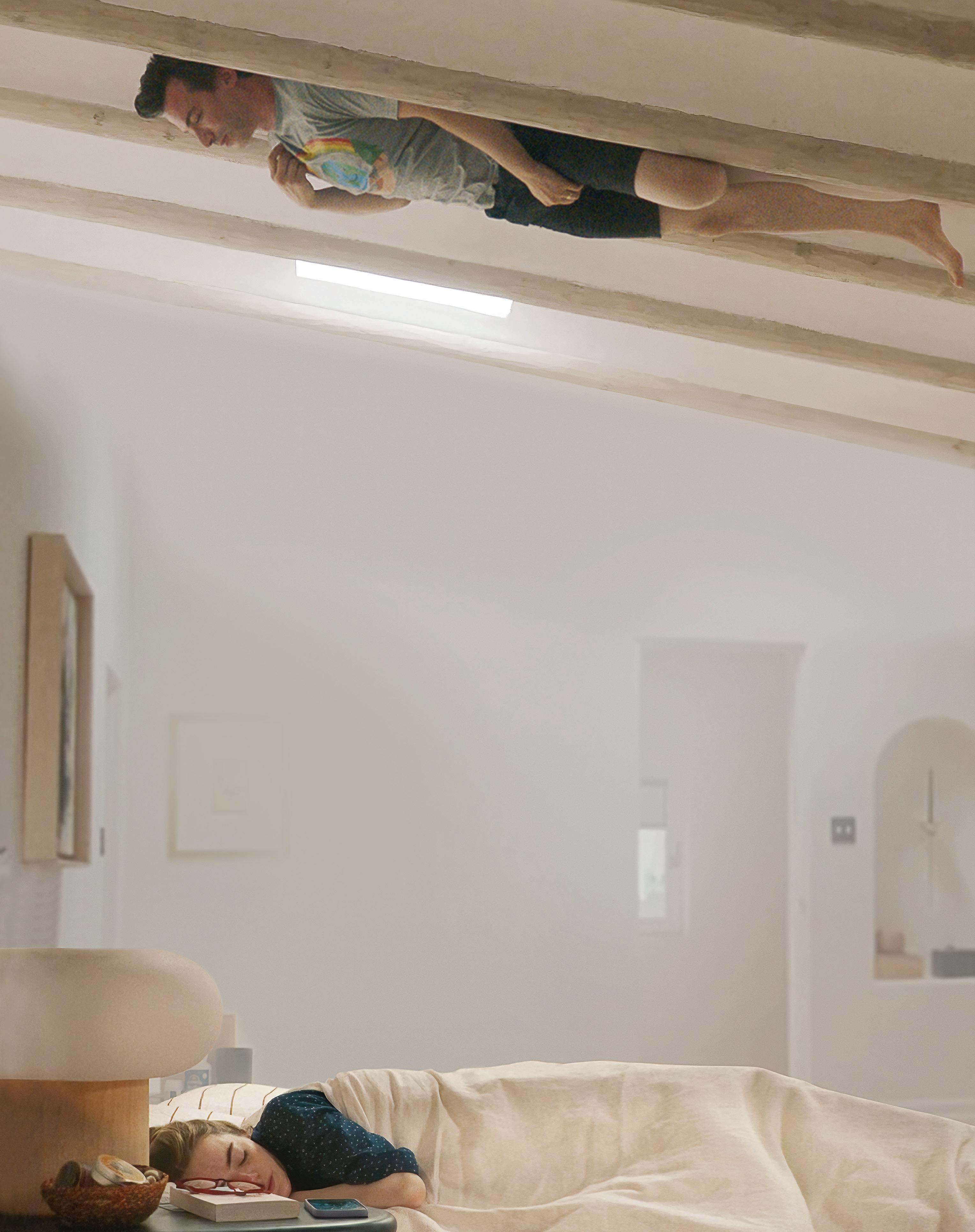









TIME


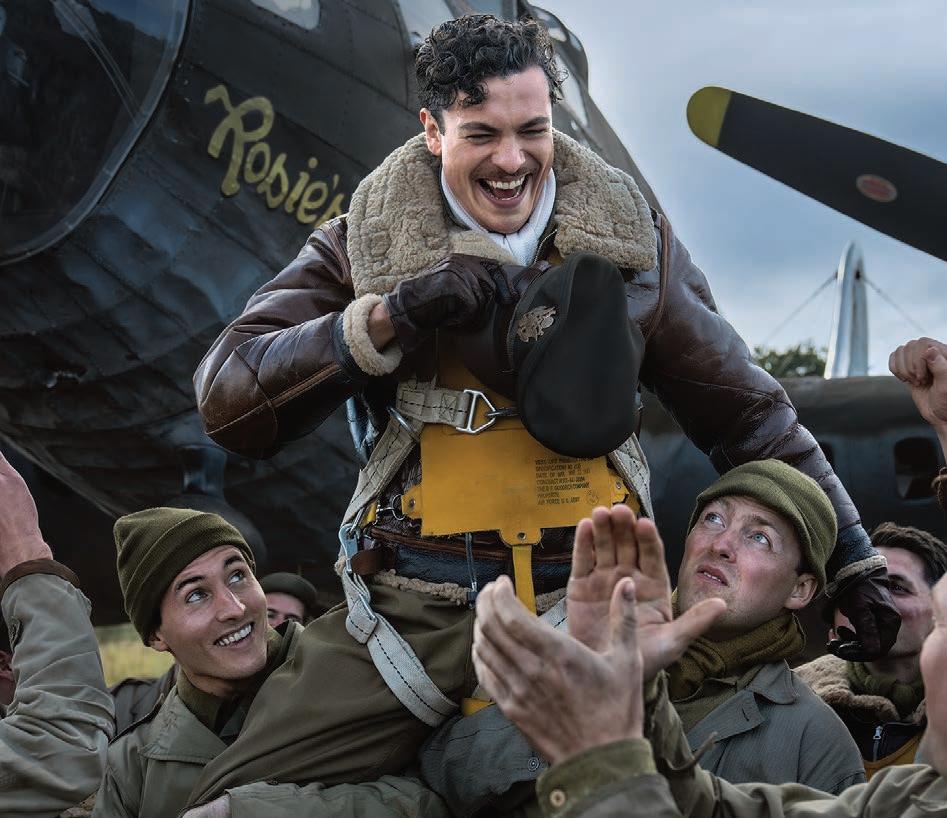


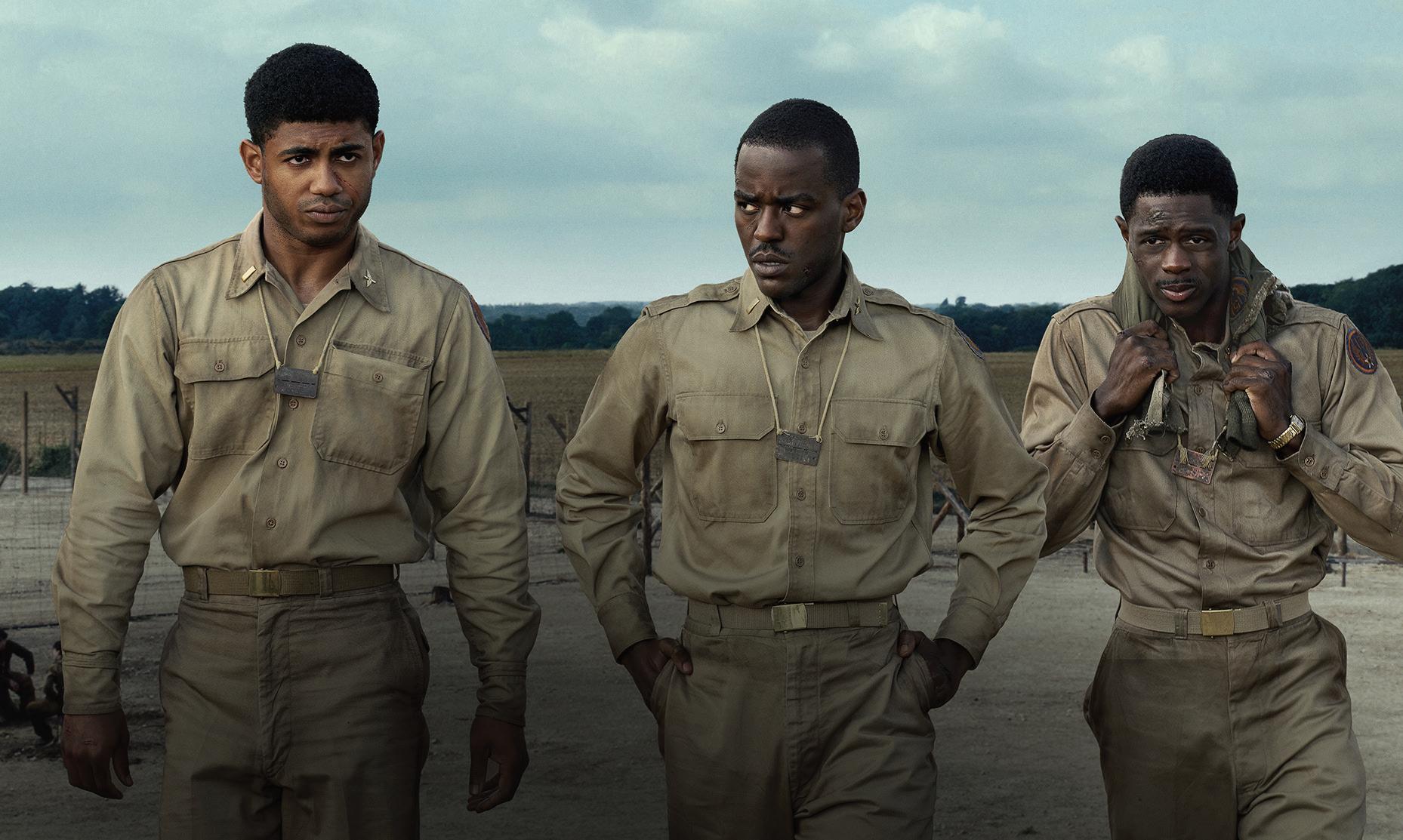
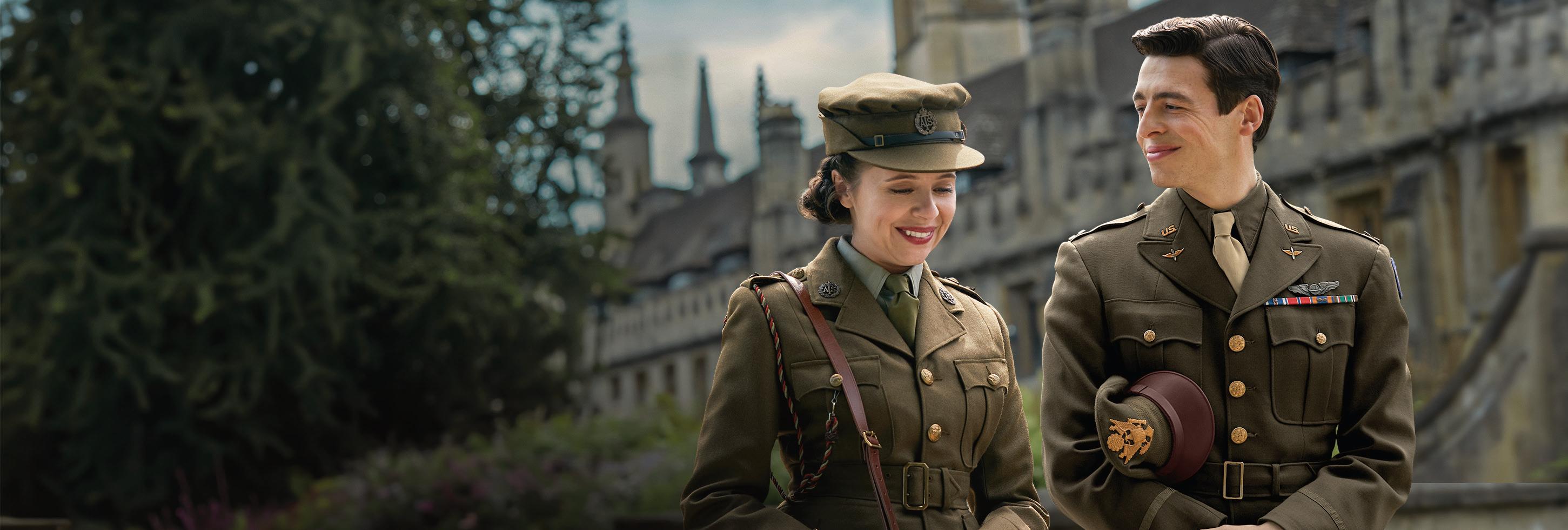

CO-EDITORS-IN-CHIEF
Nellie Andreeva (Television)
Mike Fleming Jr. (Film)
PRINT EDITORIAL
EXECUTIVE AWARDS EDITOR Joe Utichi
DESIGN DIRECTOR Fah Sakharet
SENIOR AWARDS EDITOR Antonia Blyth
FILM EDITOR Damon Wise
DOCUMENTARY EDITOR Matthew Carey
CRAFTS EDITOR Ryan Fleming
PRODUCTION EDITOR David Morgan
AWARDS WRITER Destiny Jackson
DEADLINE.COM EDITORIAL
AWARDS COLUMNIST & CHIEF FILM CRITIC Pete Hammond
COLUMNIST & INTERNATIONAL EDITOR-AT-LARGE Baz Bamigboye
EXECUTIVE MANAGING EDITOR Patrick Hipes
EDITORIAL DIRECTOR & BOX OFFICE EDITOR Anthony D’Alessandro
EXECUTIVE EDITOR, TELEVISION Peter White
EXECUTIVE EDITOR, LEGAL, LABOR & POLITICS Dominic Patten
EXECUTIVE EDITOR, INTERNATIONAL & STRATEGY Andreas Wiseman
SENIOR MANAGING EDITOR Denise Petski
MANAGING EDITOR Erik Pedersen
DEPUTY MANAGING EDITOR Tom Tapp
PHOTO EDITOR Robert Lang
EDITOR-AT-LARGE Peter Bart
SENIOR VICE PRESIDENT, CONTENT, INTERNATIONAL Stewart Clarke
INTERNATIONAL FEATURES EDITOR Diana Lodderhose
EXECUTIVE EDITOR Michael Cieply
BUSINESS EDITOR Dade Hayes
CO-BUSINESS EDITOR Jill Goldsmith
POLITICAL EDITOR Ted Johnson FILM EDITOR Justin Kroll
NEW YORK & BROADWAY EDITOR Greg Evans
ASSOCIATE EDITOR, TELEVISION Rosy Cordero
SENIOR TELEVISION WRITER Lynette Rice
TELEVISION REPORTER Katie Campione
SENIOR FILM REPORTER Matt Grobar
ASSOCIATE EDITOR & FILM WRITER Valerie Complex
INTERNATIONAL INVESTIGATIONS EDITOR Jake Kanter
INTERNATIONAL BOX OFFICE EDITOR & SENIOR CONTRIBUTOR Nancy Tartaglione
SENIOR INTERNATIONAL FILM CORRESPONDENT Melanie Goodfellow
INTERNATIONAL TELEVISION CO-EDITOR Max Goldbart
INTERNATIONAL TELEVISION CO-EDITOR Jesse Whittock
INTERNATIONAL REPORTER Zac Ntim
CONTRIBUTING EDITOR, ASIA Liz Shackleton
ASIA REPORTER Sara Merican
ASSOCIATE EDITOR Bruce Haring
NIGHT AND WEEKEND EDITOR Armando Tinoco
PRESIDENT Ellie Duque
BUSINESS LEADERSHIP
Carra Fenton SENIOR VICE PRESIDENT, ENTERTAINMENT SALES
Céline Rotterman SVP, GLOBAL BUSINESS DEVELOPMENT & STRATEGIC PARTNERSHIPS
Brianna Corrado PRESIDENT, ENTERTAINMENT SALES
Caren Gibbens VICE PRESIDENT, ENTERTAINMENT
Tracy Kain VICE PRESIDENT, SALES & EVENTS
Nadia Romdhani SALES DIRECTOR, INTERNATIONAL
Letitia Buchan SENIOR DIRECTOR SALES PLANNING & CAMPAIGN MANAGEMENT
Renee Amponin ACCOUNT MANAGER
Hugo Tepé DIGITAL SALES PLANNER
Luke Licata SENIOR DIGITAL SALES PLANNER
Daryl Jeffery SALES & MARKETING COORDINATOR
ART
Grant Dehner SENIOR DESIGNER
Paige Petersen DESIGNER
Terrence Ellsworth DESIGN PRODUCTION COORDINATOR
EVENTS AND MARKETING
Sophie Hertz DIRECTOR, EVENTS
Laureen O’Brien DIRECTOR, BRAND MARKETING
Ally Goldberg SENIOR EVENTS ASSOCIATE
PHOTOGRAPHY AND VIDEO
Larry Struber DIRECTOR OF PRODUCTION
Michael Buckner CHIEF PHOTOGRAPHER
David Ferino VIDEO DIRECTOR
Benjamin Bloom SENIOR VIDEO PRODUCER
Jade Collins VIDEO PRODUCER
Shane Whitaker VIDEO PRODUCER
SOCIAL MEDIA
Scott Shilstone DIRECTOR, SOCIAL MEDIA
Natalie Sitek SOCIAL MEDIA MANAGER
Nada Kheir SOCIAL MEDIA COORDINATOR
PRODUCTION
Natalie Longman PRODUCTION DIRECTOR
Michael Petre DISTRIBUTION DIRECTOR
Andrea Wynnyk PRODUCTION MANAGER
VICE
ISSUE CONTRIBUTORS
Carita Rizzo, Jen Yamato
CHAIRMAN & CEO Jay Penske
CHAIRMAN
Byrne
George Grobar CHIEF FINANCIAL OFFICER Sarlina See
CHIEF DIGITAL OFFICER Craig Perreault / EXECUTIVE VICE PRESIDENT, BUSINESS AFFAIRS & CHIEF LEGAL OFFICER Todd Greene / EXECUTIVE VICE PRESIDENT, OPERATIONS & FINANCE Celine Perrot-Johnson / EXECUTIVE VICE PRESIDENT, OPERATIONS & FINANCE Paul Rainey / EXECUTIVE VICE PRESIDENT, OPERATIONS & FINANCE Tom Finn / EXECUTIVE VICE PRESIDENT, PRODUCT & ENGINEERING Jenny Connelly / EVP, FINANCE Ken DelAlcazar / MANAGING DIRECTOR, INTERNATIONAL MARKETS Debashish Ghosh / EVP, GM OF STRATEGIC INDUSTRY GROUP Dan Owen SENIOR VICE PRESIDENT, REVENUE OPERATIONS Brian Levine / SENIOR VICE PRESIDENT, PUBLIC AFFAIRS & STRATEGY Brooke Jaffe / SENIOR VICE PRESIDENT, SUBSCRIPTIONS David Roberson / SENIOR VICE PRESIDENT, PARTNERSHIPS PMC LIVE Doug Bandes / SENIOR VICE PRESIDENT, GLOBAL TAX Frank McCallick / SENIOR VICE PRESIDENT, TECHNOLOGY Gabriel Koen / SENIOR VICE PRESIDENT, PROGRAMMATIC SALES Jessica Kadden / SENIOR VICE PRESIDENT, DEPUTY GENERAL COUNSEL Judith R. Margolin / SENIOR VICE PRESIDENT, HUMAN RESOURCES Lauren Utecht / SENIOR VICE PRESIDENT, BUSINESS DEVELOPMENT Marissa O’Hare / SENIOR VICE PRESIDENT, CREATIVE Nelson Anderson / SENIOR VICE PRESIDENT, PRODUCT DELIVERY Nici Catton VICE PRESIDENT, ASSOCIATE GENERAL COUNSEL Adrian White / VICE PRESIDENT, DIGITAL MARKETING Andrew Root / VICE PRESIDENT, EXECUTIVE SEARCH & HEAD OF TALENT ACQUISITION Andy Limpus / VICE PRESIDENT, HUMAN RESOURCES Anne Doyle / VICE PRESIDENT, ASSOCIATE GENERAL COUNSEL Ashley Snyder / HEAD OF INDUSTRY, CPG AND HEALTH Brian Vrabel / VICE PRESIDENT, SEO Constance Ejuma / VICE PRESIDENT, HUMAN RESOURCES Courtney Goldstein / VICE PRESIDENT & ASSOCIATE GENERAL COUNSEL Dan Feinberg / VICE PRESIDENT, MARKETING, STRATEGIC SOLUTIONS GROUP Denise Tooman / VICE PRESIDENT, BUSINESS INTELLIGENCE Greta Shafrazian / VICE PRESIDENT, ADVERTISING OPERATIONS Eddie Ko / VICE PRESIDENT, E-COMMERCE Jamie Miles / HEAD OF INDUSTRY, AGENCY DEVELOPMENT James Kiernan / HEAD OF INDUSTRY, TRAVEL Jennifer Garber / VICE PRESIDENT, ACQUISITIONS & OPERATIONS Jerry Ruiz / VICE PRESIDENT, PRODUCTION OPERATIONS Joni Antonacci / VICE PRESIDENT, FINANCE Karen Reed / VICE PRESIDENT, BUSINESS DEVELOPMENT Katrina Barlow / VICE PRESIDENT, INFORMATION TECHNOLOGY Kay Swift / VICE PRESIDENT, HUMAN RESOURCES Keir McMullen / VICE PRESIDENT, STRATEGIC PLANNING & ACQUISITIONS Mike Ye / VICE PRESIDENT, INTERNATIONAL SALES Richard Han / HEAD OF INDUSTRY, PERFORMANCE MARKETING Scott Ginsberg / VICE PRESIDENT, ASSOCIATE GENERAL COUNSEL Sonal Jain / VICE PRESIDENT, PRODUCT LICENSING Thomas Ferguson / VICE PRESIDENT, CORPORATE CONTROLLER Tom McGinnis DEADLINE HOLLYWOOD IS OWNED AND PUBLISHED BY PENSKE MEDIA CORPORATION
Gerry
PRESIDENT
/
CALL SHEET

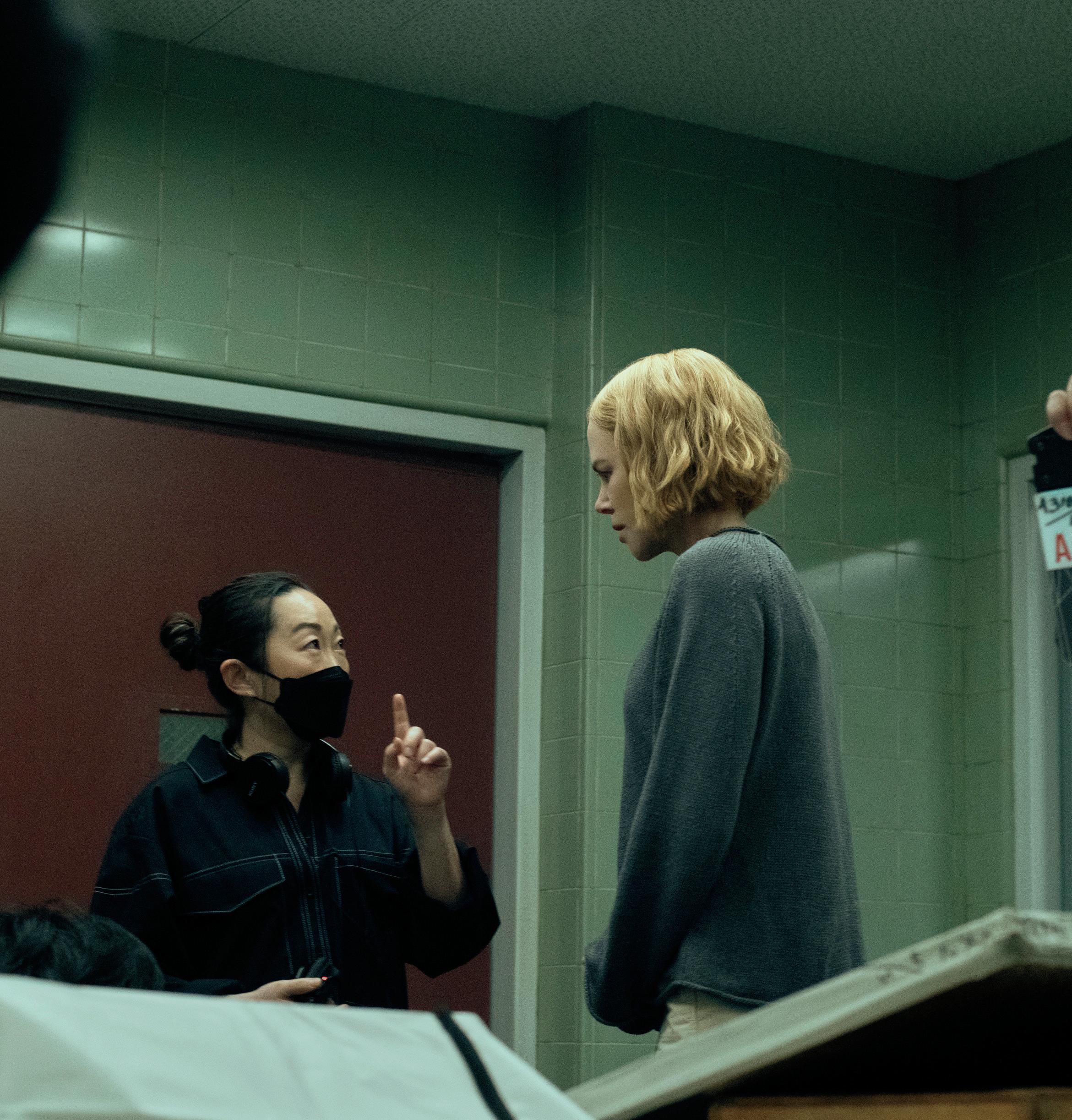
PRIME VIDEO JUNE 12, 2024
ON THE COVER
46
From left: Tadanobu Asano, Anna Sawai, and Hiroyuki Sanada photographed exclusively for Deadline by Jessica Chou.
After a lukewarm courtship, how Nicole Kidman landed Lulu Wang as her director for Amazon Prime Video's Expats
By Baz Bamigboye
Shot on location in Los Angeles.
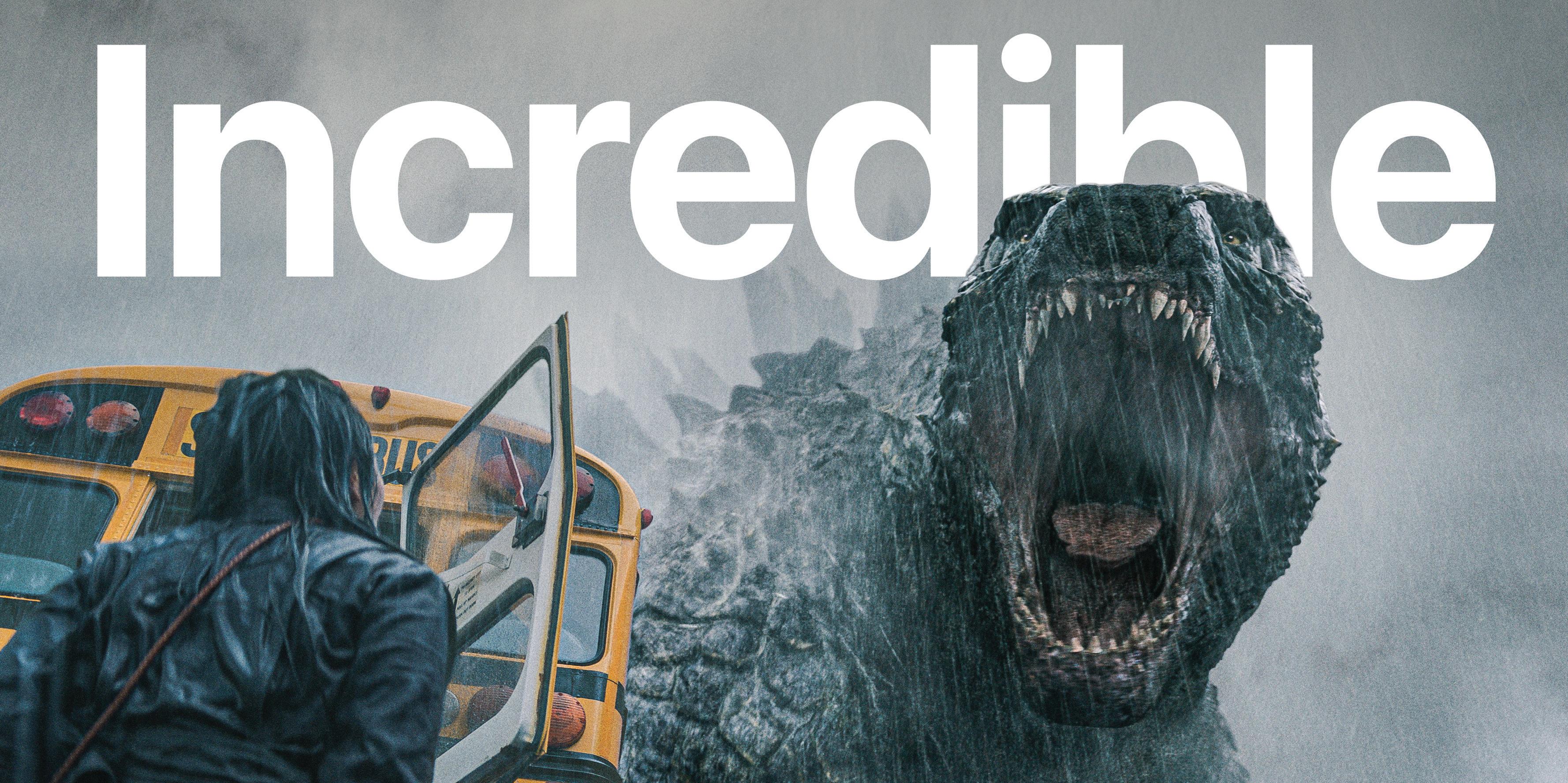
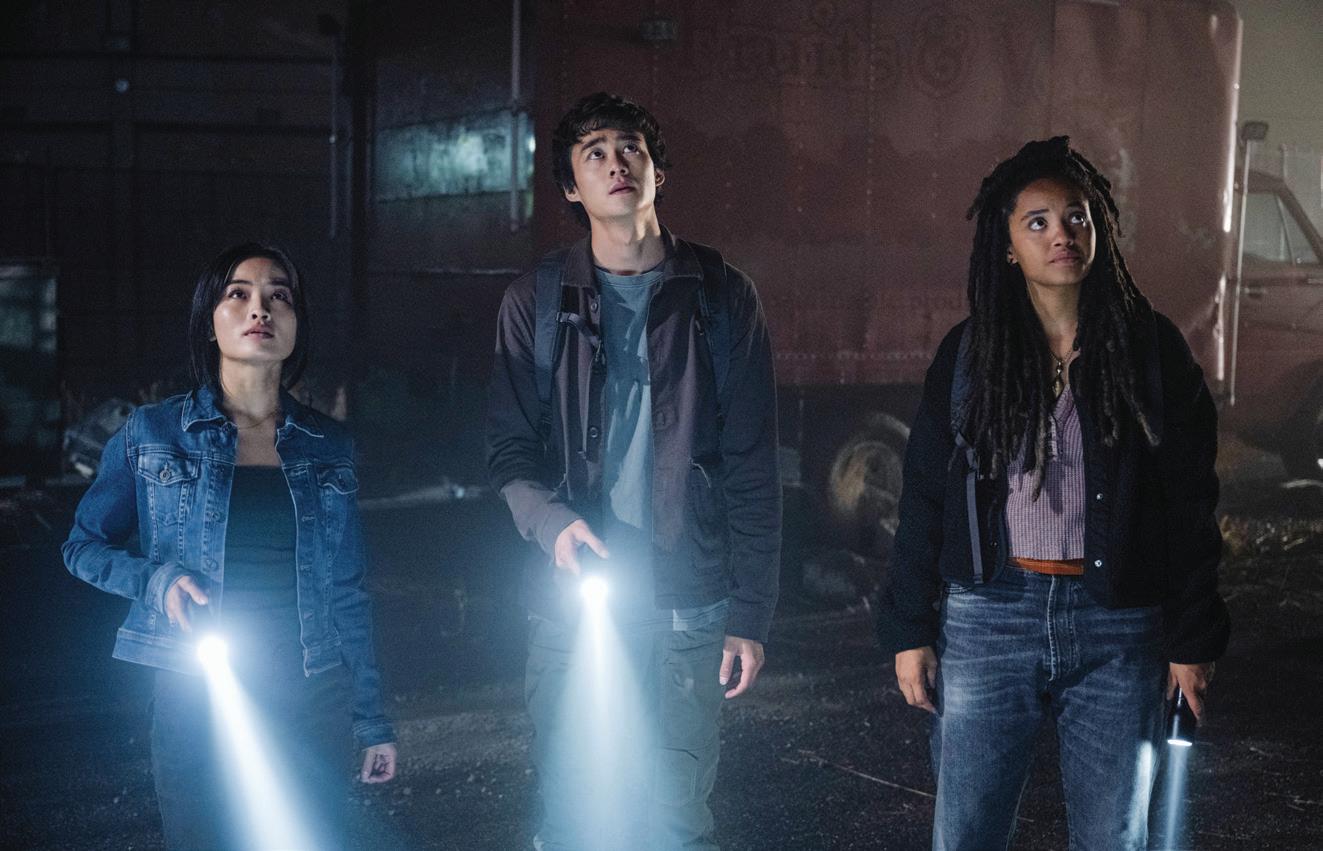
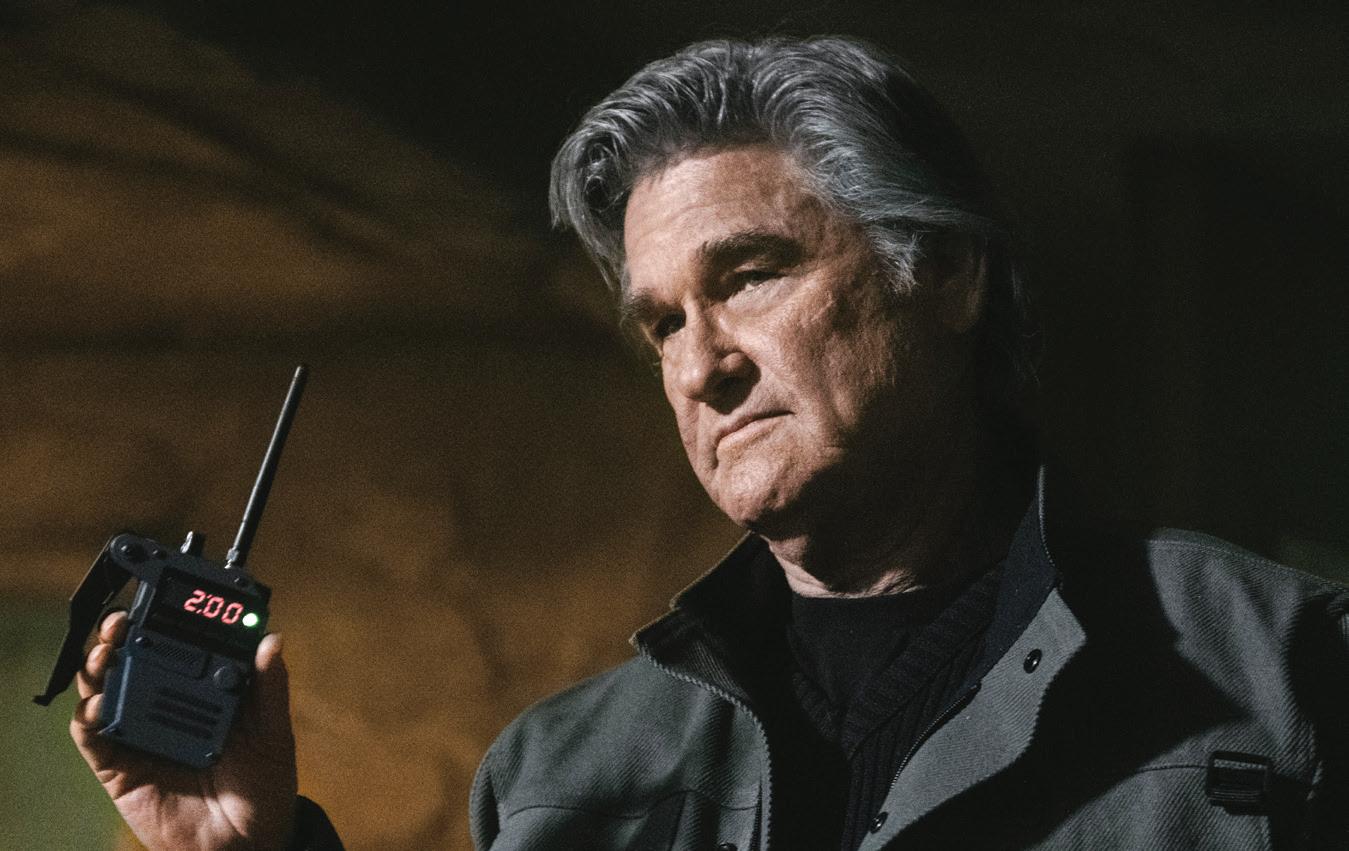
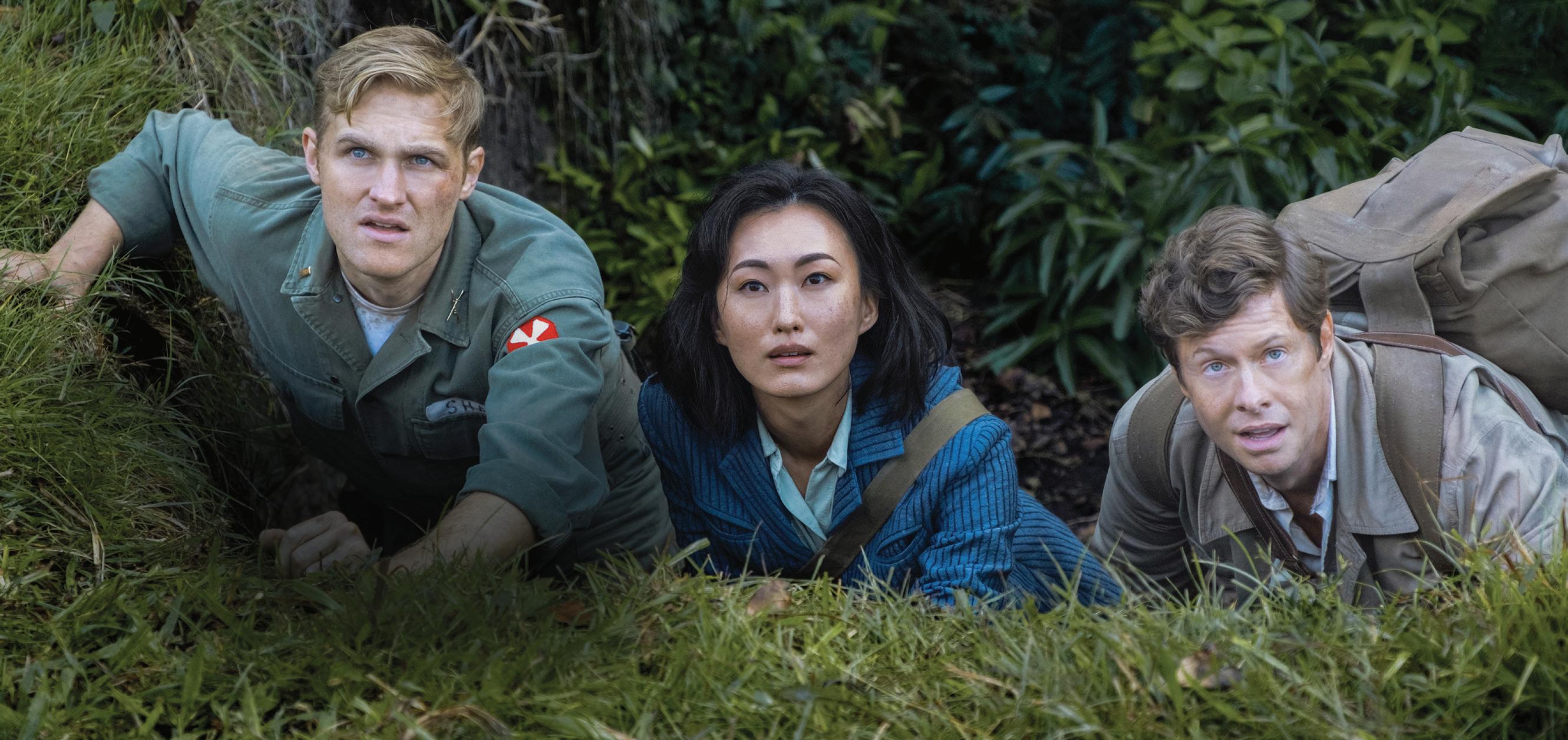

Premiere
8 GILLIAN ANDERSON
The star of Scoop on overcoming insecurity and owning her journey.
14 FRESH FACE
Ex-boxing champ Kali Reis gets her star as a cop in True Detective: Night Country
Cover Story
16 ONCE UPON A TIME IN JAPAN Rachel Kondo, Justin Marks, and their cast turn James Clavell's 1975 novel Shōgun into a runaway hit centered on its Japanese heart.
Dialogue
26 AMBIKA MOD
36 MAYA ERSKINE
Craft Services
40 PUTTING ON THE RIZZ: Dressing for success in Palm Royale, The Crown and The Guilded Age
The Partnership
46 EXILES ON MAIN STREET: The Expats director Lulu Wang and star Nicole Kidman.
Contenders Gallery
54 The biggest stars in Drama visited Deadline's Contenders portrait studio.
Snapshot
66 DEADLINE STUDIO
On the scene at the Amazon Prime Experience.
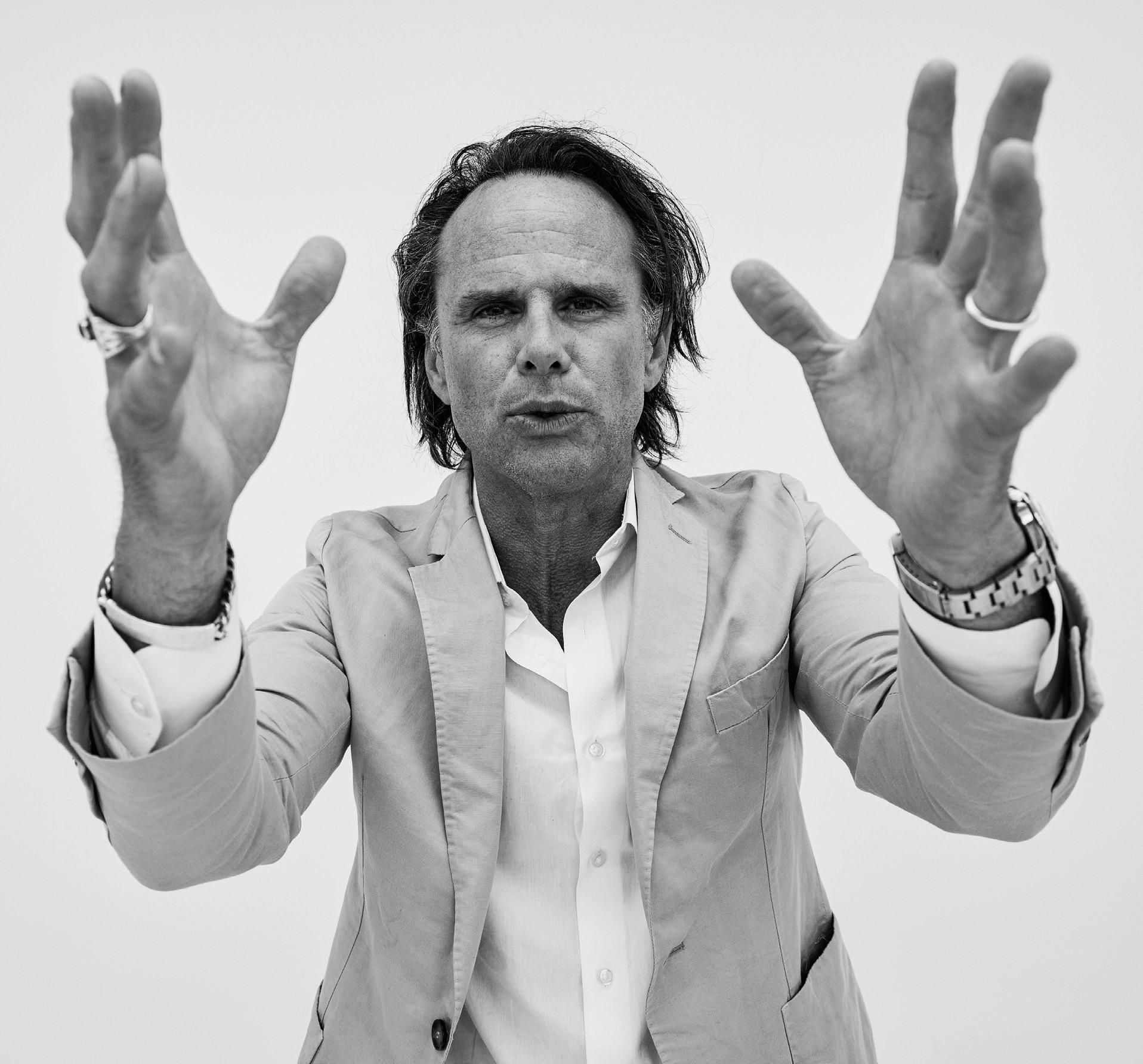
Walton Goggins gets the chair for a dual role in Fallout By Ryan
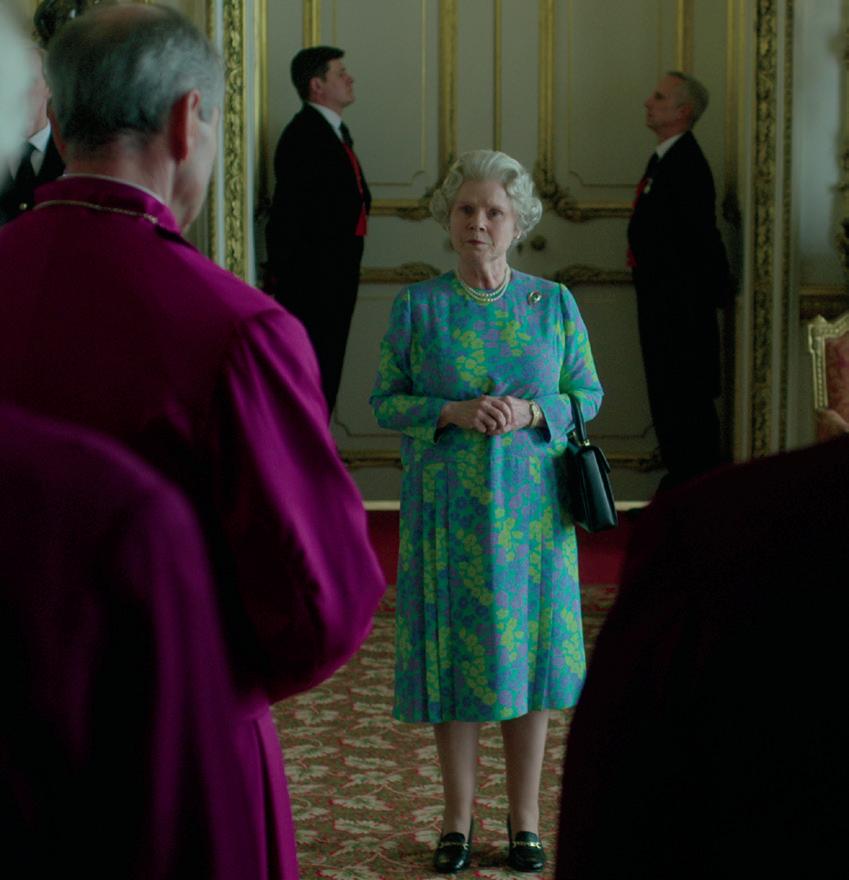
Design teams make fashion statements in Palm Royale, The Crown and The Gilded Age By

Former boxing champ Kali Reis finds her second wind as an actress in True Detective: Night Country. By
6 DEADLINE.COM/AWARDSLINE CALL SHEET NETFLIX/HULU
Ryan Fleming
40 14 32
Carita Rizzo
Fleming
30 RILEY KEOUGH
WALTON GOGGINS 34 SOFIA VERGARA
32
Outstanding Drama Series


FOR YOUR CONSIDERATION
WHAT’S HOT, WHAT’S NOT, AND EVERYTHING IN BETWEEN THIS EMMY SEASON.
PREMIERE
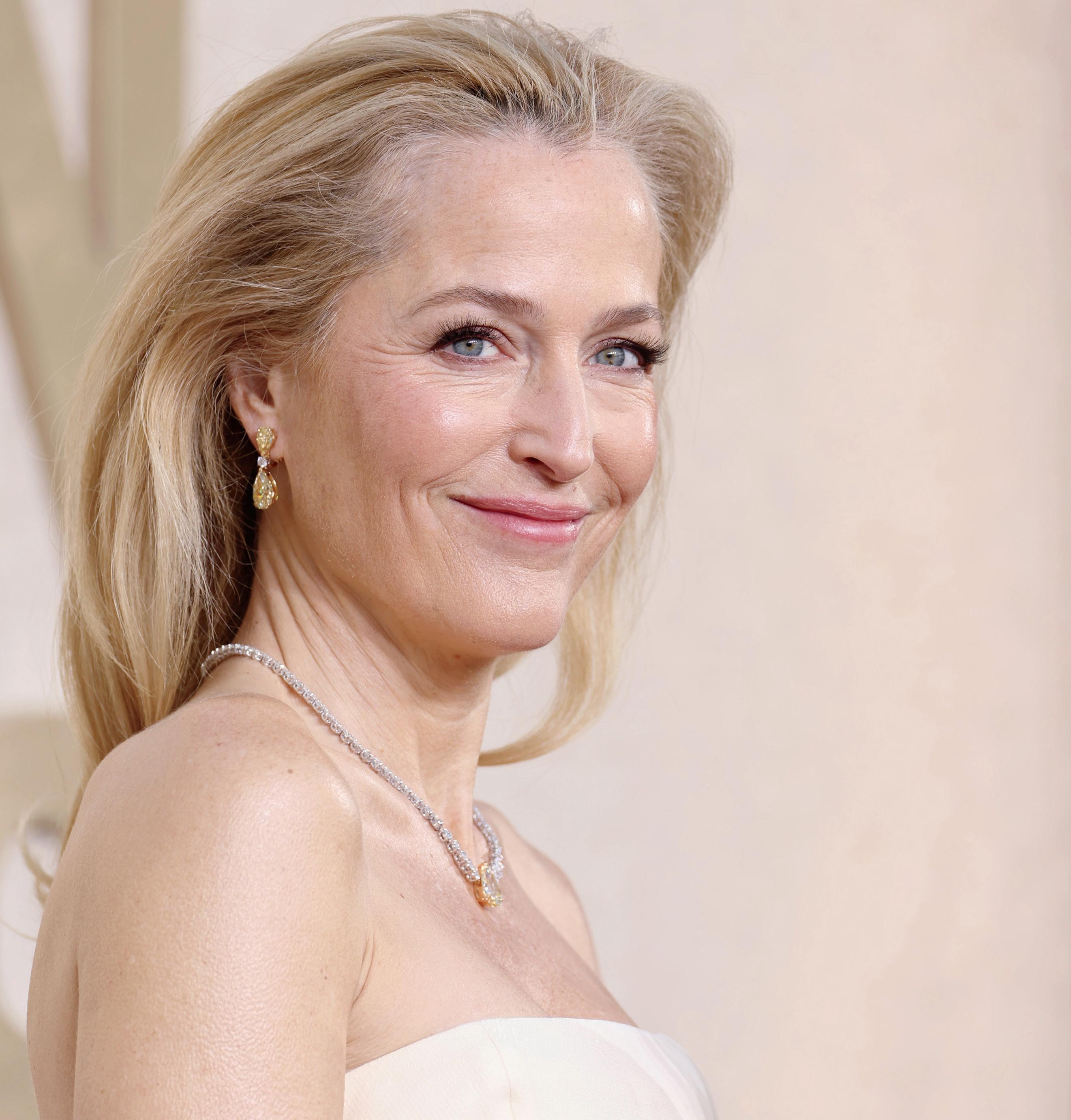
Scooper
Trouper
Gillian Anderson recreates the infamous 2019 BBC interview with Prince Andrew in Scoop, in which she plays British news icon Emily Maitlis
BY JOE UTICHI
8 DEADLINE.COM/AWARDSLINE
AMY SUSSMAN/GETTY IMAGES
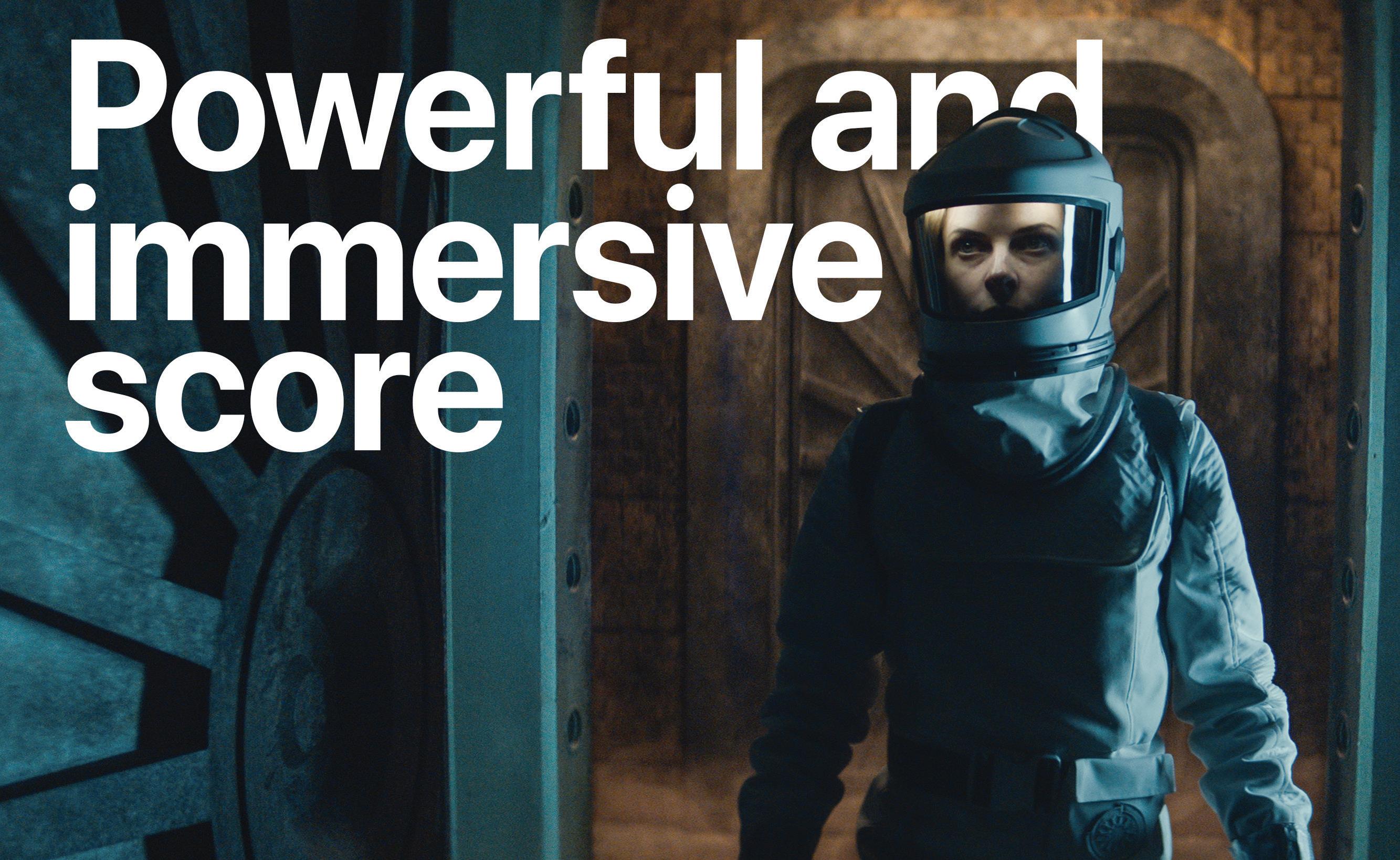


 VANITY FAIR
Moody and evocative music
VANITY FAIR
Moody and evocative music
Gillian Anderson has been a British national treasure for many years. This may seem incongruous to state definitively of a Chicago-born actress who first rose to prominence playing an FBI agent on a hit network show, but it is what it is. The year The X-Files ended, Anderson moved to London, and she has lived there ever since. She had spent her earliest childhood years in the city. Sorry America, it doesn’t matter what her passport says: at this point, Anderson has lived as much of her life in the U.K. as outside it, and the country is very keen to claim her.
Anderson’s Anglophilia runs deep, you see, and more than perhaps any other American acting transplant, she has earned her stripes. With the financial freedom The X-Files offered, she was called back to London to tread the boards, and from her earliest appearances on the West End stage she wowed audiences and critics alike, and earned three Olivier Award nominations. She quickly became British cinema’s best friend, starring in a string of independent productions. On TV, she has played Miss Havisham, Margaret Thatcher and, now, Emily Maitlis; three more culturally definitive Brits you could not find. And, oh yes, she was awarded an honorary OBE by the Queen in 2016.
It’s relevant, because Emily Maitlis, though she was born in Canada (to British parents), is a popular figure in the U.K., and it is that role we are meeting to discuss today. Havisham is fictional and Thatcher is, to say the least, divisive, but Maitlis is well-respected. And it’s because Anderson is so culturally British at this point that she nearly ran from the suggestion of playing her. “What would I be subjected to?” she wondered.
American and British television
news is so foundationally different that it is hard to find an analog for Emily Maitlis. CNN’s Christiane Amanpour—who is British-Iranian herself—is probably as close as Americans might come to understanding Maitlis’s power and prestige in Britain. As a host of the BBC’s news output, and then a main presenter on its flagship current affairs show Newsnight, she had become one of the most celebrated newsreaders and journalists in the country when, in 2019, she sat for an interview with Prince Andrew, the Duke of York.
The story of that interview is told in Netflix’s Scoop, which stars Anderson as Maitlis and details how an expected easy ride from the nation’s premier broadcaster to discuss the prince’s charity work became appointment viewing when it came to light that Andrew, a senior member of the British Royal Family, had continued a friendship with the disgraced financier Jeffrey Epstein years after he was convicted of child prostitution.
Maitlis’s interview with Andrew Windsor was one of the most sensational royal exclusives to date, as Andrew’s bizarre responses to the questions put to him only further sealed his fate. A few months after the interview aired, Andrew indefinitely withdrew from his public roles.
“Was I asking for trouble?”
Anderson says she asked herself. “Does doing it cause too much controversy? I admire her, she’s still alive, she’s in the same neighborhood. More than anything, was it a fair portrayal? This was someone else’s experience and I wasn’t interested in any dirt or drama.”
Anderson is a podcast fiend, which only further complicated the decision, because Maitlis’s The News Agents, which she co-hosts with Jon Sopel and Lewis Goodall, is one of her go-tos. “It’s part of

how I relax,” she laughs. True crime is another favorite; days after we speak, Anderson will send recommendations for West Cork and Monster: DC Sniper. “On the one hand, there’s a part of me that begrudges the fact that I feel the need to have a constant stream of information always going into my ear. But at the same time, I do like to learn, and I feel like it’s not wasted time if I’m learning things.”
This made tackling Emily Maitlis different from playing Margaret Thatcher in The Crown, though Anderson acknowledges too that she was nervous it would look like she was choosing to only play real people. “I do seem to be doing that over and over again,” she notes. In the case of Thatcher, “I didn’t know much about her at all. I certainly didn’t know anything about her history or her childhood.” Maitlis felt a lot closer.
Ultimately, the script for Scoop, by Peter Moffat and Geoff Bussetil, persuaded Anderson there was a story to tell, and one that could be done justice. “Interrogating the
script, it felt like the way she was presented was not controversial,” Anderson says. “She comes across well. I think it’s the perfect example of what makes her so good as a journalist, that she’s able to be spontaneous in the interview, and react to what he’s saying. You have to think on your feet and not be thrown, and for me, what happens in situations where there’s pressure or stress is that I’m more likely to say stupid things. For my brain to go blank, or to scare someone away by being too keen. All of the things that Emily doesn’t do. It’s the talent that sets good journalists apart, I think, and you see that.”
Anderson dove into the research, reading the book by Sam McAlister, the former Newsnight producer who had secured the interview with Andrew, on which Scoop is based; Billie Piper plays McAlister in the film. She also read Airhead, Maitlis’s own account of her career and the interview, and came to understand the pressure she feels Maitlis put on herself to get the interview right. Maitlis had
10 DEADLINE.COM/AWARDSLINE PREMIERE Close-Up NETFLIX
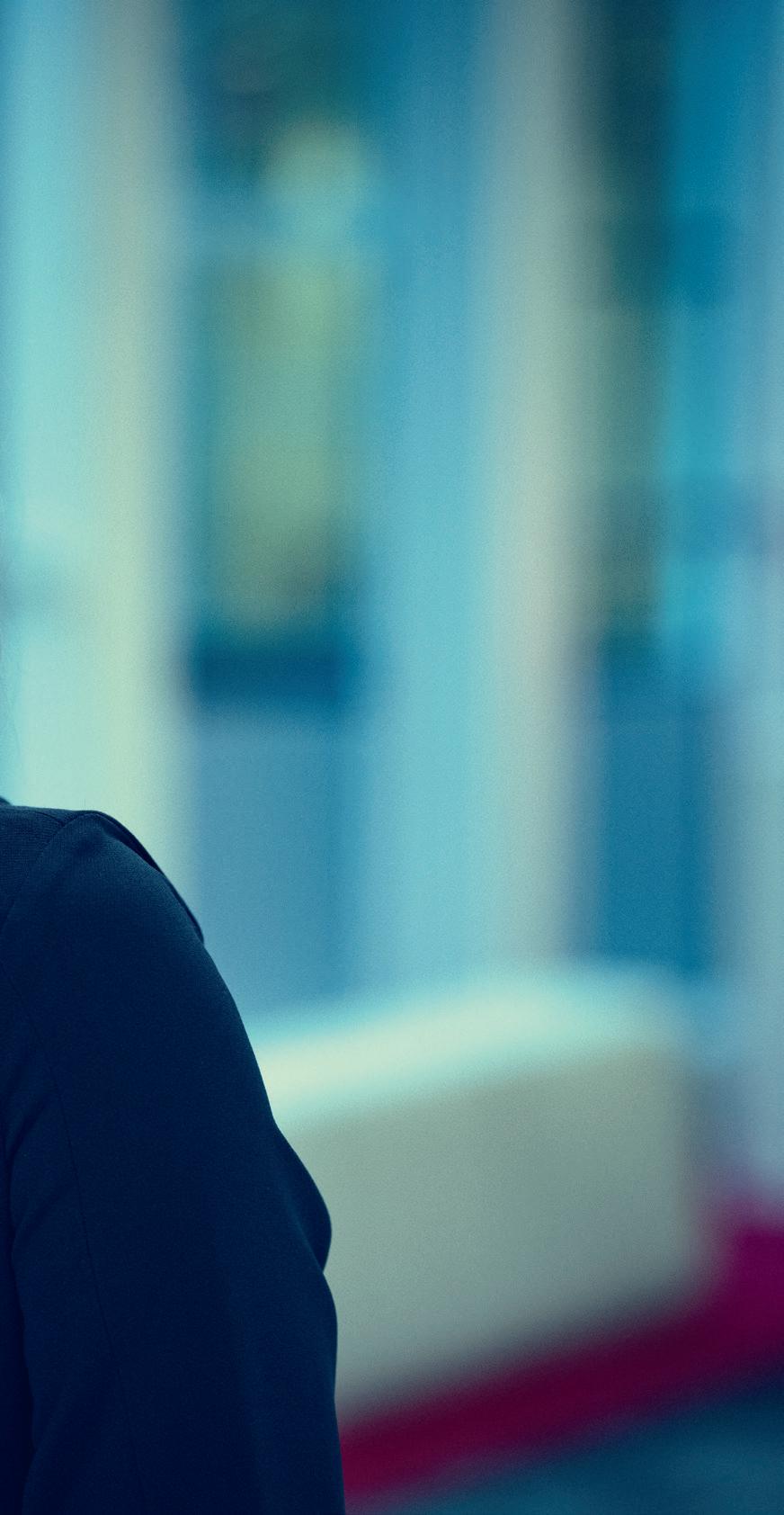
earlier interviewed Bill Clinton, who some felt ran rings around her, so the stakes were high.
“One of the things that has come up from journalists who have interviewed me about this is that they said they appreciated seeing the nervousness in her, as she looks in the mirror before the interview,” says Anderson. “I don’t know if she really addresses that in her own book, but she’s human, and you’d
expect that to be there. I used to be married to a war correspondent, I know of that adrenaline. I know the chasing of that feeling. I don’t know, but it seemed like part of her comes alive in that moment. Is it excitement, is it fear?”
Scoop deftly deals with the suggestion that it might also be the weight of expectation. Anderson dismisses the idea that what she does for a living can be adequately compared, but she also acknowledges that she remains terrified in the moments before she steps out onto a stage. “I’ve had panic attacks,” she says. “On stage, in interviews. On film or television, I always think I’m going to be fired for the first day or two. I can sense the directors and producers huddling behind the monitors, having conversations about the fact that I suck, and why did they hire me?”
She remembers working on The Fall, a dialogue-heavy project for which she received many plaudits. She had been exhausted working on multiple projects, traveling back and forth between countries, and struggled to remember her lines. “The lines wouldn’t stay in my head,” she says, “and because they wouldn’t stay in my head, and because I was too exhausted, I started to panic. And when I
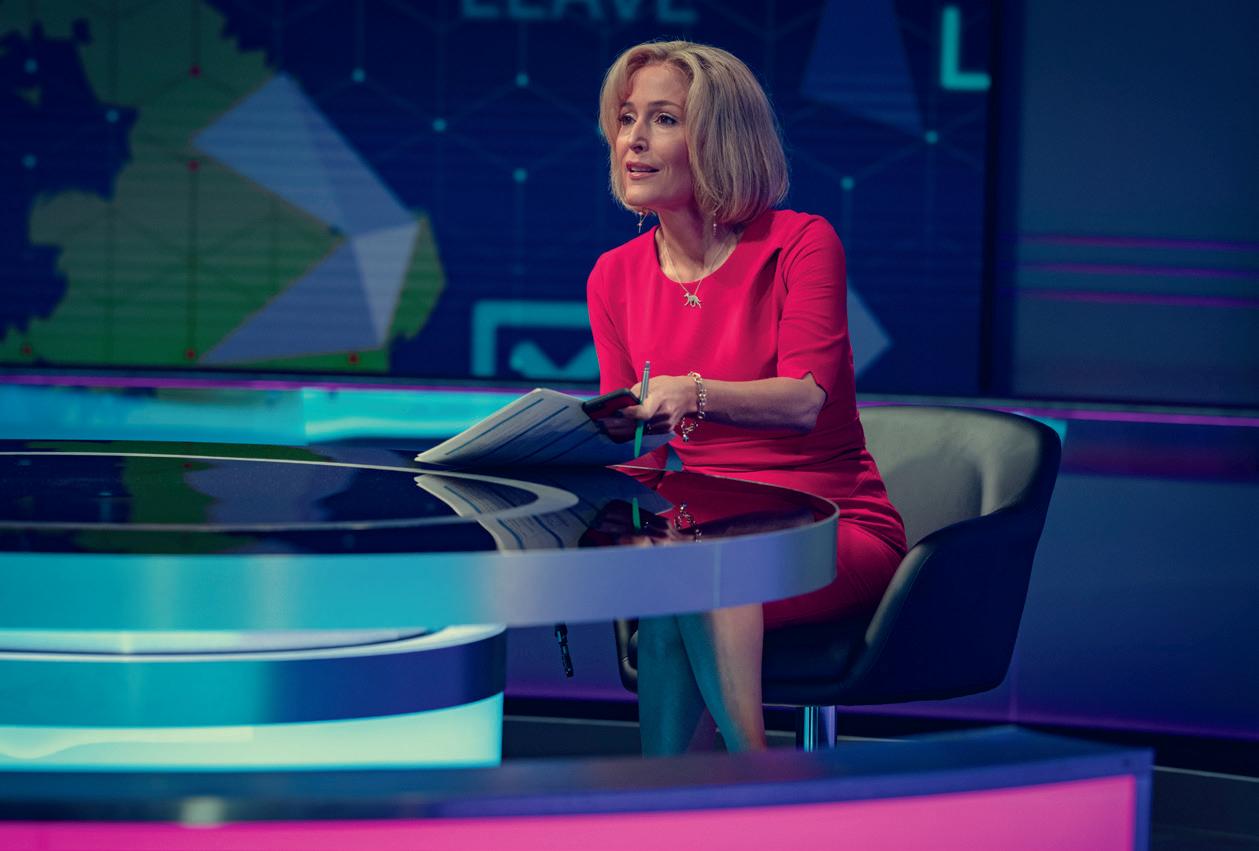
Overnight audience for Newsnight’s Prince Andrew interview 1.7M
BRIT HITS
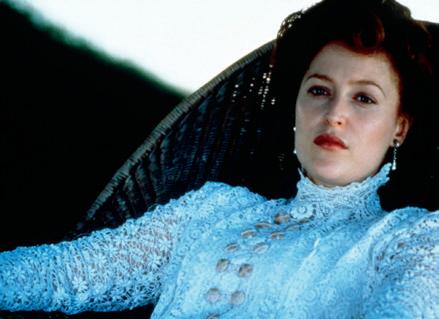
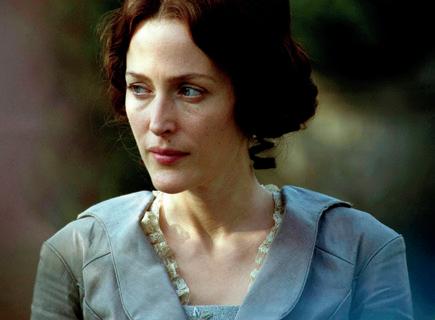
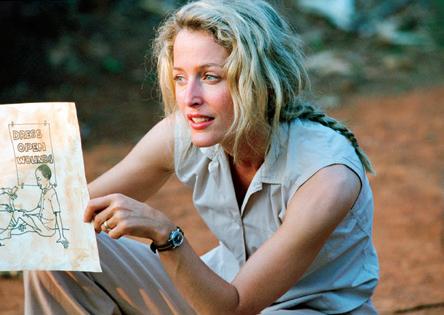
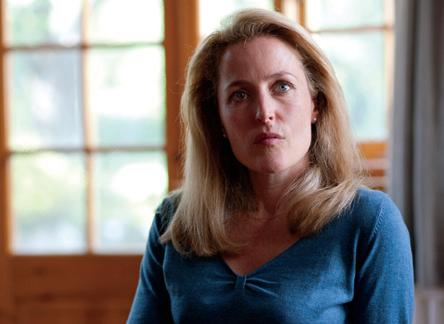
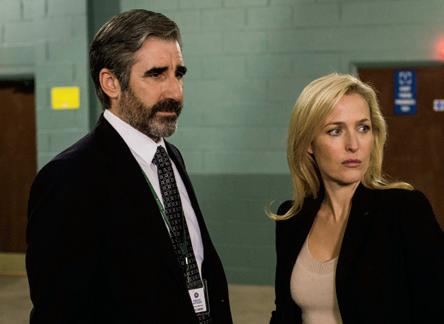

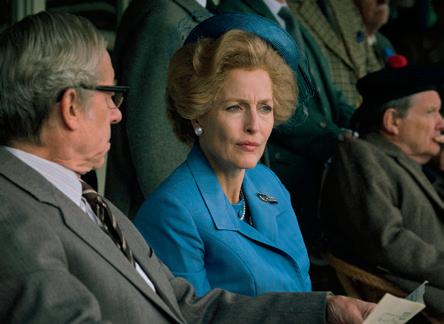
THE HOUSE OF MIRTH
Anderson teamed up with Terence Davies for this 2000 adaptation of Edith Wharton’s novel. Set in New York high society, it was a Film4 production and Anderson won a British Independent Film Award.
BLEAK HOUSE
In 2005, Anderson played Lady Honoria Dedlock in the BBC’s lavish Charles Dickens adaptation. In 2011, she would play Miss Havisham in Great Expectations, also for the BBC.
THE LAST KING OF SCOTLAND
She joined the cast of Kevin Macdonald’s Idi Amin story, with a screenplay by Jeremy Brock and Peter Morgan, in 2007. Forest Whitaker won an Oscar for playing Amin.
SHADOW DANCER
As Kate Fletcher in James Marsh’s acclaimed 2012 story about the Troubles in Northern Ireland, Anderson starred opposite Andrea Riseborough and Clive Owen.
THE FALL
Detective Superintendent Stella Gibson, played by Anderson, became everyone’s favorite investigator over three seasons of the BBC’s hit show that put Jamie Dornan on the map from 2013.
SEX EDUCATION
As sex therapist Jean Milburn on the 2019 Netflix hit, Anderson played a woman caught between sexual liberation and snooping on her son Otis’s adolescent experiences.
THE CROWN
For a single season of Peter Morgan’s Netflix phenomenon in 2020, Anderson played perhaps one of the most storied and controversial Prime Ministers in British history: Margaret Thatcher.
11 DEADLINE.COM/AWARDSLINE
217
Total number of episodes of The X-Files Anderson starred in, more than any other
cast member
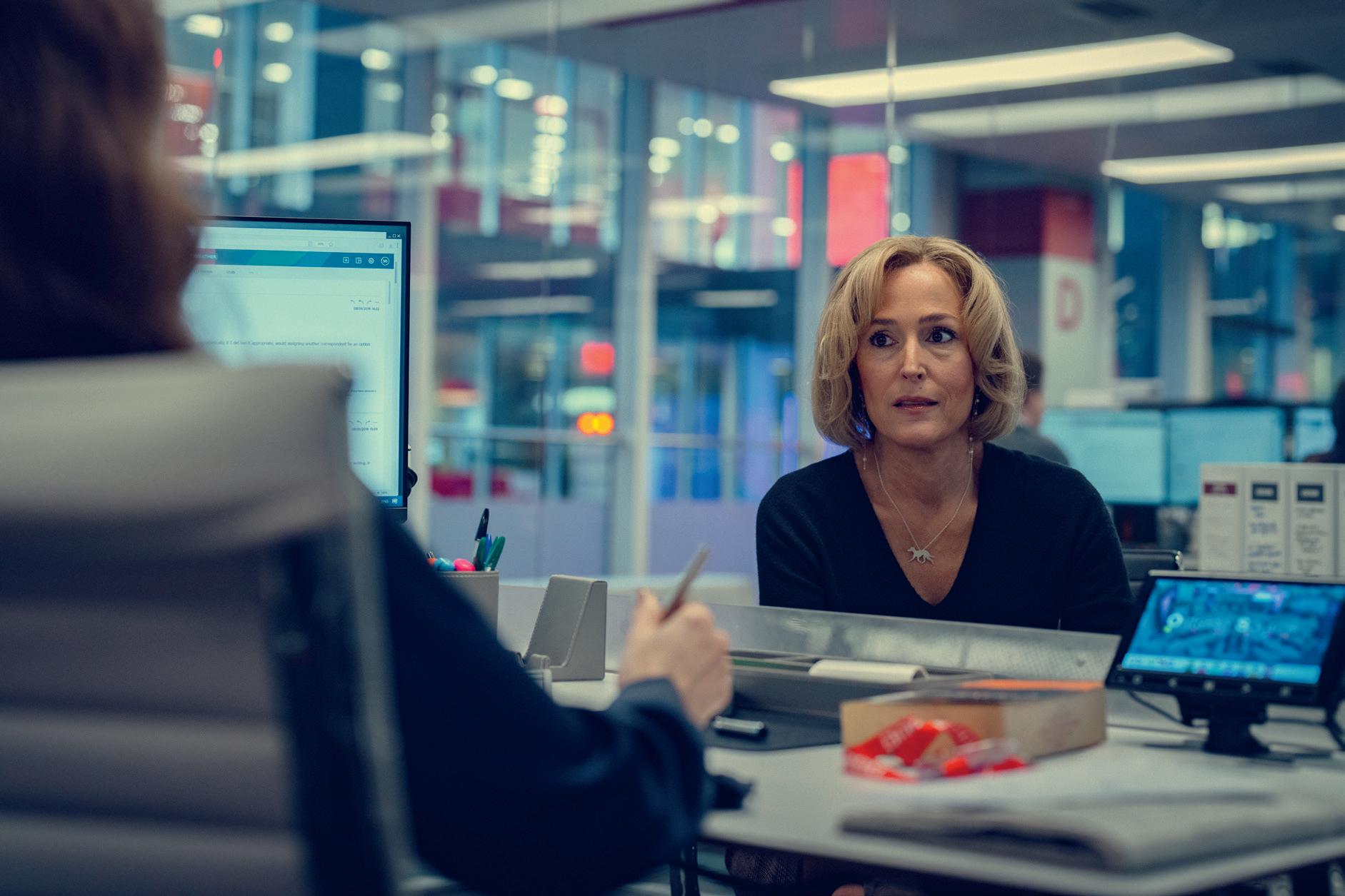
panicked, they really wouldn’t stay in my head. It was devastating.”
She wonders if Emily Maitlis walked away from the Andrew interview satisfied that she had achieved what she set out to achieve. “There were things that remained unanswered. There are still question marks. I don’t know if she walked away thinking, ‘If only I’d…’”
Anderson has grappled for her entire career with the contradictions that lie between her own feelings about her work and the praise and success she has received from others. She remembers seeing a work by the artist Robert Longo; a charcoal based on an X-ray of a painting by Manet. “On the surface, you recognize the Manet, but then he’s also got the underpainting, and all the attempts to get the final image right,” says Anderson. “It was like a physical manifestation of any creative process, trial and error manifest. It was really startling.”
She has gotten better at allowing herself to be fallible; to be open to the possibility that the messy work that goes in gets lost behind the resulting artwork. In recent years, she has launched a soft drink brand aimed at women called G Spot; as part of the messaging around the brand, she has engaged in many conversations with women about the damaging effects of low self-esteem and the relentless quest for perfection. “Part of what we’re investigating is the degree to which women struggle to ask for what they actually want,” she explains.
It is a conversation she has struggled to have with herself for many years. Creating the drink, she says, has been immensely helpful in helping her parse the way she was treated by the culture—and by network executives—while she was first coming up in The X-Files. She was 24 when she auditioned for the show, and within a few years she was the hottest star on television. “So young!” she marvels. “Press
every weekend. Interview, interview, photo shoot, photo shoot. Everywhere I went, there would be paparazzi. I felt trapped, so I’d sit across from a journalist and project trapped.”
In the media world of the 1990s, she was pushed into becoming a pin-up on teenage boys’ bedroom walls while at the same time, behind the scenes, she was fighting for her paycheck on the show to match her co-star David Duchovny’s. She had her first child during the early run of the show, returning to work just 10 days after having a C-section, and was still fighting for equal pay when The X-Files had become such a phenomenon that it spun off into feature films. ‘The Scully Effect’ encouraged a generation of girls to take up science, but the actress playing Scully spent the show’s run defending her right to be there, and rather than embrace the many questions she got about her struggle, she was thrown by
them. “Why do the press want to talk about the pay disparity?” she thought. “Why are they bringing all of this up again?”
Anderson simply didn’t consider these fights to be any sign of courage, because she couldn’t admit to herself that she had any; the world was telling her she didn’t deserve it. “I didn’t want to talk about any of it,” she says. “But actually, now I’m like, ‘I’m going to join you in talking about it because it’s still an issue.’ That was proved to me when I did a reboot of The X-Files and they were still trying to do the same motherfucking thing again, so many years later.”
Doing Sex Education also helped her reshape her own narrative. The sex-positive show for teens has been quietly transgressive in making it OK to talk about topics we have always considered taboo. She liked the script—and liked the part she had been offered—but even she was surprised by how much enlightenment she found in the work as she interrogated her own past.
“The irony is I’ve only started to think consciously about it in the past two years,” she says. “I can understand, with my business hat on, why I was the person hired for Scully. And I can also understand, with my business hat on, how I became the person you might come to for Stella Gibson [in The Fall] or Jean Milburn [in Sex Education]. But I’m not sure if I ever understood or took ownership for what the trajectory was between them.”
Like a true (honorary) Brit, Anderson doesn’t take praise very well. “I’m a bloody private person,” she says, “and a bit of a hermit. If you asked me, I’d rather be at home.” But she reluctantly admits now that she must “take ownership of the fact that I’ve got experience in this area. Maybe I just need to go a little bit out of my comfort zone to talk about that experience,

12 DEADLINE.COM/AWARDSLINE PREMIERE Close-Up
Scoop
“I'm a bloody private person and a bit of a hermit. If you asked me, I'd rather be at home.”
because it encourages people— particularly women—to have the courage to ask for what they feel they deserve.”
Then, she says, there is another point she wants to make very urgently. She is pensive, struggling to find the words, and our time is running out. She will write it down, she promises. A few days later, she emails: “I wanted to make it clear that, because I don’t have it cracked when people respond and say, ‘When you played such-and-such character, or when you asked for equal pay, or spoke up, we were inspired,’ on the days when I question whether I’m up to a challenge, or I struggle to put one foot in front of the other, it’s inspiring to me too!
“Hearing from fans that what I’m doing is inspiring to them, that obviously gives me the strength and motivation to keep going because it feels like there’s a bigger purpose outside of me just living my life. And so, right now I’m starting to embrace it and engage more in the dialogue between what I want from life, and what the people who have supported me for decades want from me as I live my
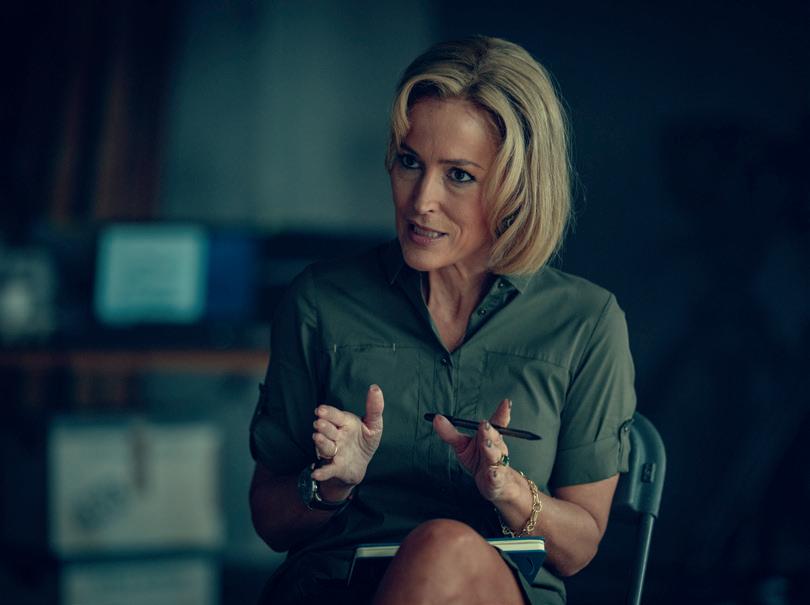
life. It is the first time it feels like more of a dialogue than a monologue. Hey, I may not be suited to it, and I might slip back into my cave, but for now I’ve poked my head out and am exploring.”
Our time together at an end, Anderson is on to another meeting, perhaps accompanied in the car by one of her gruesome podcast favorites. A few nights ago, she remembers returning home at 11 pm ready to unwind with some light dismemberment. “If someone recommends a crime podcast to me, I’ll throw it on for a few minutes while I’m having some grapes or whatever; a little snack.”
She turned to the family’s Spotify app, which she doesn’t often use, and hit play. After a few seconds, the podcast switched to a mindfulness exercise; plinky-planky meditative music and all. So, she switched it back—death, destruction, misery—and a few seconds later, it happened again—release your inner self. “It was like some ghost in the machine,” she says. Anderson persisted, but the podcast kept switching over. She started to wonder if it was a sign from a concerned higher power, that perhaps she had better unwind with something lighter. Then she got a text from her 15-year-old son. “He says, ‘Mum, are you trying to listen to a crime podcast?’” He had been at his dad’s house, using the same shared Spotify account.
“Like, shouldn’t it be the other way around?” laughs Anderson. “What a perfect example of how sane and healthy my kids are, and how slightly disturbed I am.”★
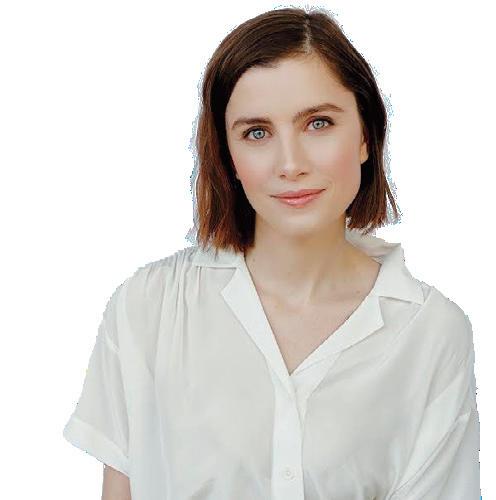
Character Studies
Very Important People host Vic Michaelis on creating their persona to interview some truly wild characters
Dropout’s Very Important People has seen host Vic Michaelis interview an assortment of characters that really can’t be described in just a few words. “One of the beautiful things about this show is showcasing different comedians’ styles of comedy,” Michaelis says. “It was really important to not make them fit into our box, but to build the box around them.” After being given full makeovers—including makeup, prosthetics and costumes—comedians come up with a character for a fully improvised interview. It was important for Michaelis and director Tamar Levine to create a sense of continuity with the host character, especially with a variety of characters like Vic’s Ex-Step Grandmother (Lisa Gilroy) or Mental Health Advocate Tommy Shriggly (Zac Oyama). “Tamar and I talked pretty extensively about the host character and the motivations behind them, and then I personally spent a lot of time researching both comedic and regular hosts,” Michaelis says.
Since Michaelis wasn’t aware of what character they were interviewing beforehand, pre-writing questions wasn’t an option. “The thing that we kept coming back to is looking at it like a first date in improv,” they say. “That’s a very classic type of scene where it’s getting to know you, but you don’t want to be so stuck on the basics. So, we looked into the different types of interviews that exist, like somebody’s trying to promote something or going on an apology tour. Anytime we would break, we’d say, ‘What type of interview do we think this is? Let’s try to lean into that.’ But improv was always first.” —RYAN FLEMING
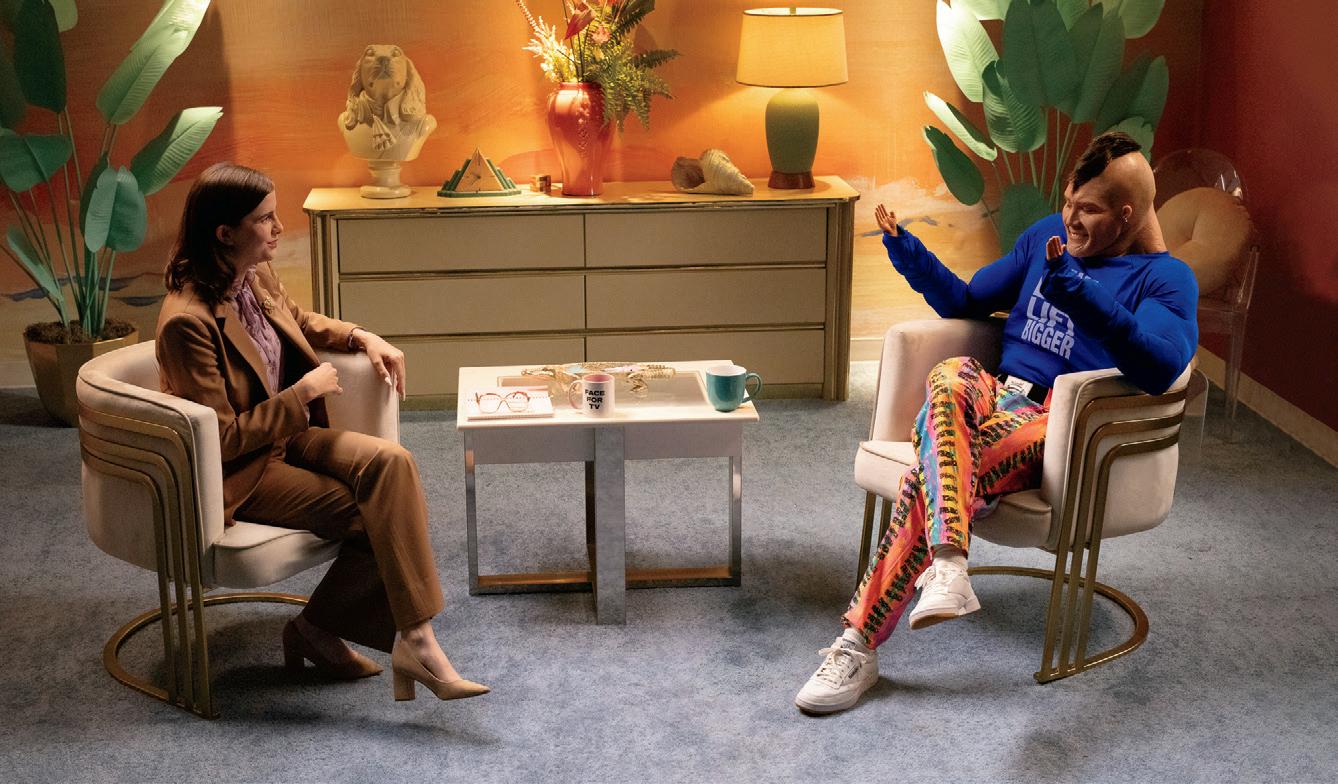
NETFLIX/KATE ELLIOT/DROPOUT 13 DEADLINE.COM/AWARDSLINE
Vic Michaelis interviews Tommy Shriggly (Zac Oyama).
Quick Shot
Kali Reis
The ex-boxing champ on leaving the ring to land a knockout blow in True Detective: Night Country
BY CARITA RIZZO
AGE 37
HOMETOWN Providence, RI
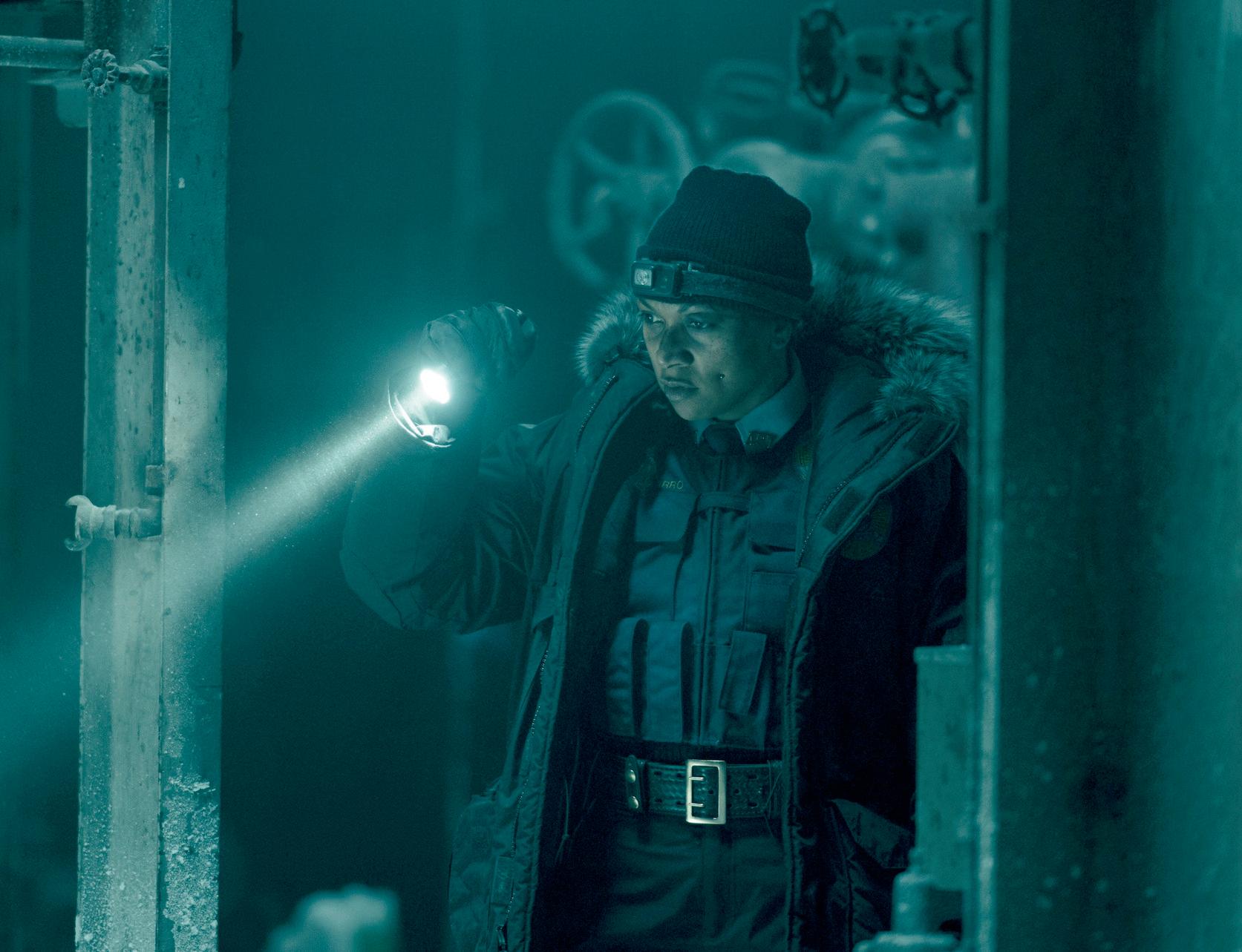
Halfway through True Detective: Night Country, Kali Reis’ character experiences a loss so traumatic it would make most people lose their minds. Steely State Trooper Evangeline Navarro has but one way of coping with the situation: She instigates a brawl, in essence begging for a physical manifestation of her pain. Watching one of the most heart-wrenching sequences of the anthology series play out, and Reis’ portrayal of her stoic character’s momentary collapse, it is near impossible to
comprehend that this is only the 37-year-old’s third on-screen role.
To those who have followed her career, Reis is still best known as a champion boxer with six world titles in two weight classes under her belt. All this to say, Reis has never been afraid of hard work and discipline. But her move from competitive sports to acting was not the kind of career evolution she had consciously been looking for.
“My brother had just passed away from brain cancer, and boxing was our thing,” she says. “Boxing has been an outlet, it’s been a job,
it’s been everything to me. But for once in my life, it just wasn’t really doing it for me. I needed something else.”
Much like boxing had found her at a transitional time of her life—“As a teenager, I was going through some things. The solo aspect of boxing and the self-accountability aspect have always intrigued me. I found a lot of purpose in it,” she says—acting came to Reis in a way that felt serendipitous. “Josef Kubota Wladyka, the director of Catch the Fair One, was educating himself on the Highway
of Tears in Canada, but he knew it wasn’t his story to tell.” Reis, who is of both Cape Verdean and Seaconke Wampanoag descent, had been posting about missing and murdered Indigenous women online. “He saw that I was bringing awareness to it and reached out to me via Instagram,” she says. “He was like, ‘Do you ever think about acting?’ And I’m like, ‘This weirdo in my DMs. What is going on?’ But I’d had a thought: ‘If it’s meant for me, it’ll find me,’ and that’s when I talked to Josef. From a thought to an avalanche, basically, that’s how my acting career began.”
In the independent thriller Reis portrayed Kaylee, a Native American former boxer conducting a search for her missing sister, whose disappearance the authorities have no interest in investigating. Although Reis’ role was tailor-made for her, she still found the endeavor challenging. “It wasn’t a tough transition as far as having the mentality to do something new,” she says. “Being someone who’s gotten used to being comfortable being uncomfortable—meaning your back is against the ropes, you have to survive, you have to fight—I’m very familiar with that. But it meant that I was going to learn something about myself. It’s me against me. I was like, ‘OK, I got this opportunity because I can handle it, I don’t know how, but I’ll figure it out.’ It was hard as hell.”
Reis received an Independent Spirit Award nomination for her role, which both surprised her and affirmed her choice to move into a different arena. “My first thought was, ‘People will be like, ‘What does she get Best Actress for?’ And they’ll watch the movie and see the message that we were trying to convey. That’s really what it meant,” she says. “But it also meant, ‘I have something here.’ I really wanted to do this. It
14 DEADLINE.COM/AWARDSLINE MAX PREMIERE Fresh Face
just gave me more motivation to get better.”
Much as in boxing, Reis knows that even if fighting looks like a solo endeavor, you are only as strong as your team. “In the ring, you have corner people that see what you don’t see. Everybody in your corner has the same goal, they want to see you win,” she explains. Whenever she doubted herself on Catch the Fair One, Wladyka was the one to raise her up. “Josef kept saying, ‘Yo, Homie, you got the sauce, you got the juice.’ I’m like, what sauce?” she says. “But he was genuine. He saw something in me that I couldn’t see in myself. It’s that little look of people that you trust, and I don’t trust many.”
On True Detective, it was series creator Issa Lòpez and costar/ producer Jodie Foster that manned her corner. “Issa is such an amazing mind,” Reis says. “Her explanation of the story, and who
Navarro was, was very clear. The thing that resonated with me was that Issa made a conscious decision to make Navarro part of the community. This half-Dominican, half-Iñupiaq, who is also a police officer—that’s a very layered and convoluted type of position to have as an indigenous woman. There’s a fight she has to fight within herself before she can fight outside. I thought that was very brave [of Lòpez].”
When it comes to going toeto-toe with Foster, Reis can’t get over the Oscar-winner’s lack of airs. “It’s freaking Jodie Foster,” she laughs. “But there was no hierarchy, it was ‘How can we tell this story?’ She was also interested in my process. And I’m like, ‘Process? I don’t know how I got here, what you mean process?’ But it was amazing to feel like I was accepted into this elite group of creators that have been doing this for their entire lives. Here I am
Cook’s Look

just showing up, and I’m welcomed with opened arms.”
For Reis, inhabiting Navarro was in some ways like slipping on a familiar pair of gloves. “I’ve learned that I do darkness and troubled very well,” she acknowledges. Her mission is now to excel at her new craft. “It is challenging being so new, learning terminology,
learning how things move. And just learning myself in this has been cathartic,” she says. “Just like the first time I got my ass whooped in boxing. I’m like, ‘OK, how do I make that not happen again?’ It’s the same mentality. I need to understand it so that I can just give it my all and do the best I can. And I really want to be the best.” ★
How Lessons in Chemistry’s makeup designer Miho Suzuki transformed star Brie Larson into scientist-turned-TV personality Elizabeth Zott
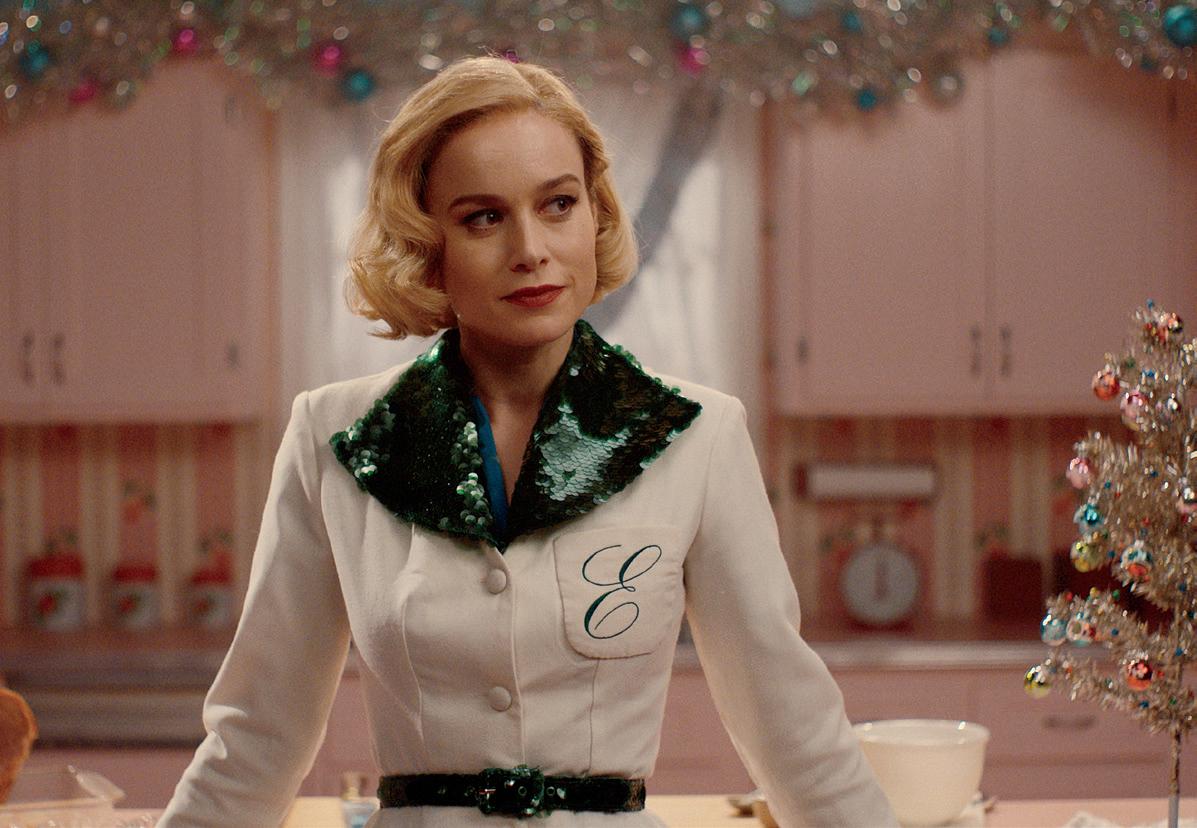
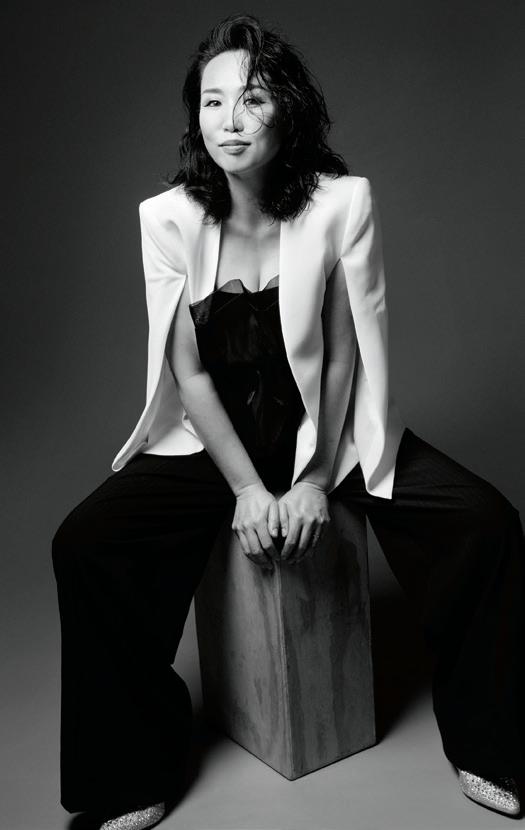
When makeup designer Miho Suzuki began working on Lessons in Chemistry, she decided the makeup needed to follow the story arc of Elizabeth Zott (Brie Larson). “In the beginning, she couldn’t afford to put herself together with lots of makeup and hair and fancy clothes, because she was so focused on her studies and experiments,” she says. “I also wanted to contrast her with the other woman around her, so I didn’t do a lot of makeup.” Instead, the focus was on featuring the “beauty of the real skin”, including Larson’s freckles which Suzuki says she actually added more on to. “It made her look very fresh and kind of innocent in a way.”
When Zott was first invited to host the TV show, a makeup designer at
the TV studio would be in charge of her makeup, which gave Suzuki the idea to go big in a fun way. “It’s one of the very quick scenes we did and she’s so uncomfortable looking,” she says. “She had blue eyeshadow and these big eyelashes with pink lipstick.”
As she quickly starts to take control of Supper at Six, Zott also simplifies her makeup into a more sophisticated look. “It was inspired by Grace Kelly in my mind,” says Suzuki. “She would wear this silky, matte foundation with more gradation with grays, and then [for the lipstick] I found this really beautiful burgundy with purple in it, but it’s not too dark. That ended up being her main color, which contrasted with her beautiful fair skin.” —RYAN FLEMING
MAX/APPLE TV+ 15 DEADLINE.COM/AWARDSLINE
From left: Brie Larson in Lessons in Chemistry; makeup designer Miho Suzuki.
From left: Kali Reis and Jodie Foster in True Detective: Night Country
Quick Shot
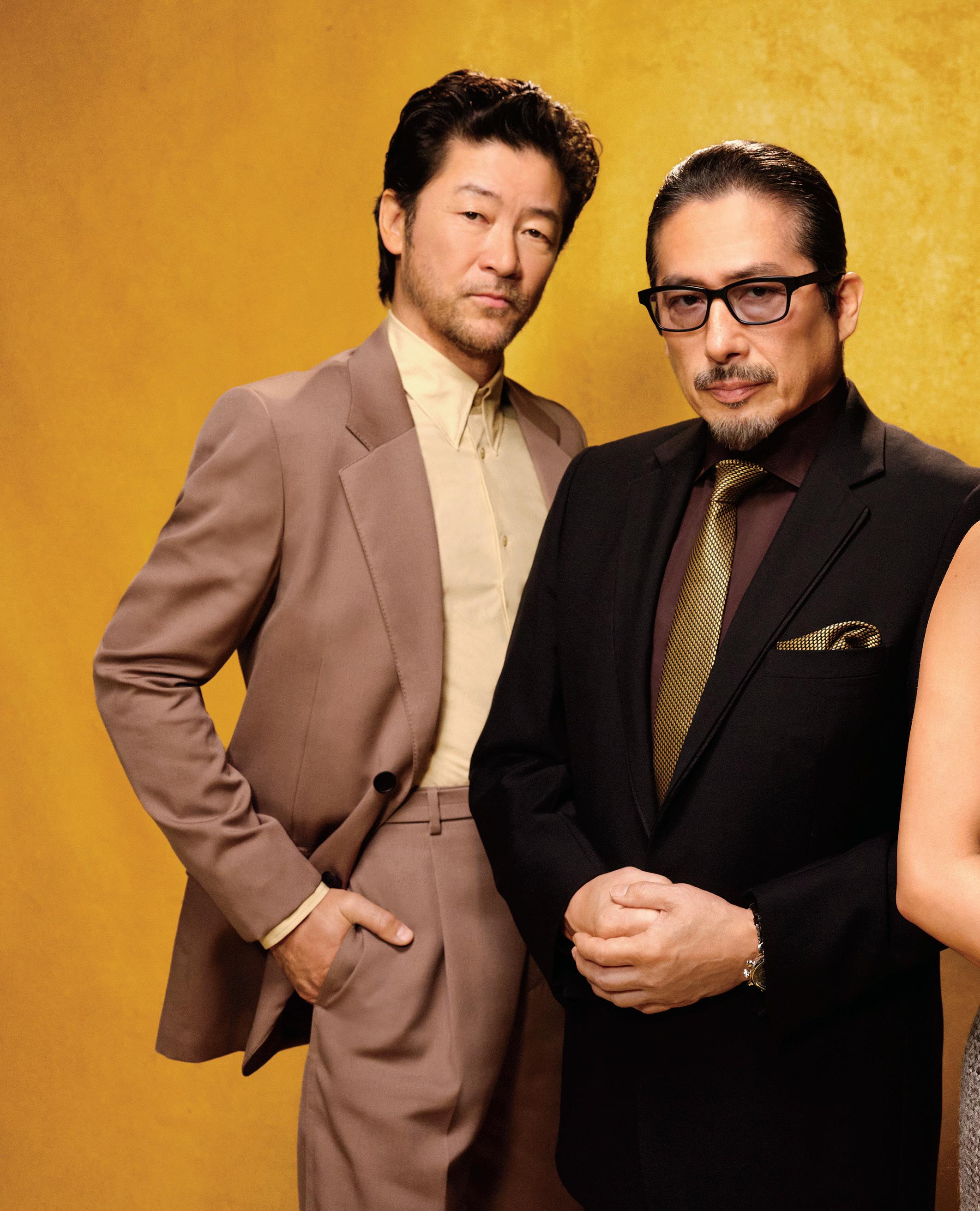
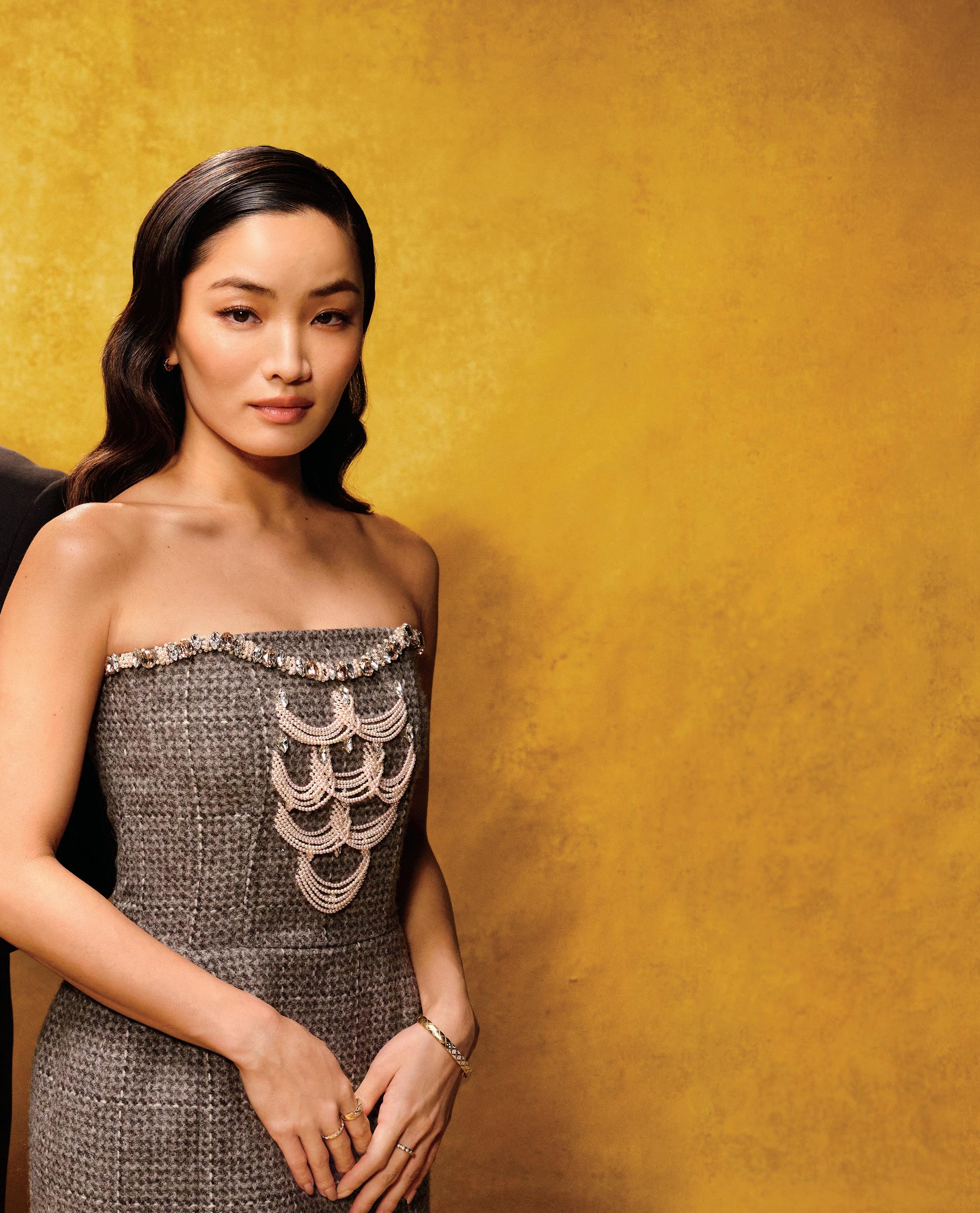
THE SH Ō GUN WAY
Hiroyuki Sanada, Anna Sawai and Tadanobu Asano walk the path in FX’s adaptation of James Clavell’s Shōgun. Against the odds, the series from creators Justin Marks and Rachel Kondo defied expectations and became a cultural megahit by centering the Japanese story at its heart. Jen Yamato heads to feudal Japan to find out how they pulled it off.
17 DEADLINE.COM/AWARDSLINE
Photographed By Jessica Chou
From left: Tadanobu Asano, Hiroyuki Sanada, and Anna Sawai.
t’s a late April afternoon when Shōgun breakout star Anna Sawai, who stars as the fierce Lady Toda Mariko in the gorgeously wrought, sharply modernized adaptation of James Clavell’s 1975 bestseller, spots castmate Tadanobu Asano and producerstar Hiroyuki Sanada across a studio floor.
Her face lights up. It hasn’t even been a week since FX’s runaway hit historical drama ended its debut season on a breathtaking note of bittersweet catharsis, having enthralled viewers over 10 episodes with its sweeping saga of survival and sacrifice in 17th Century Japan.
But as the rising actress reunites with her Shōgun co-stars, a new charge of electricity crackles in the air.
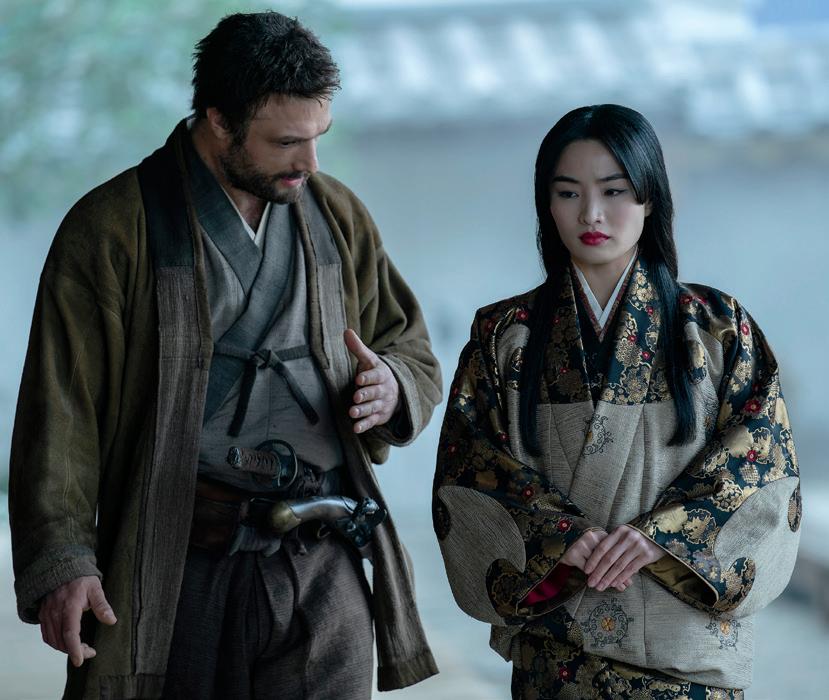
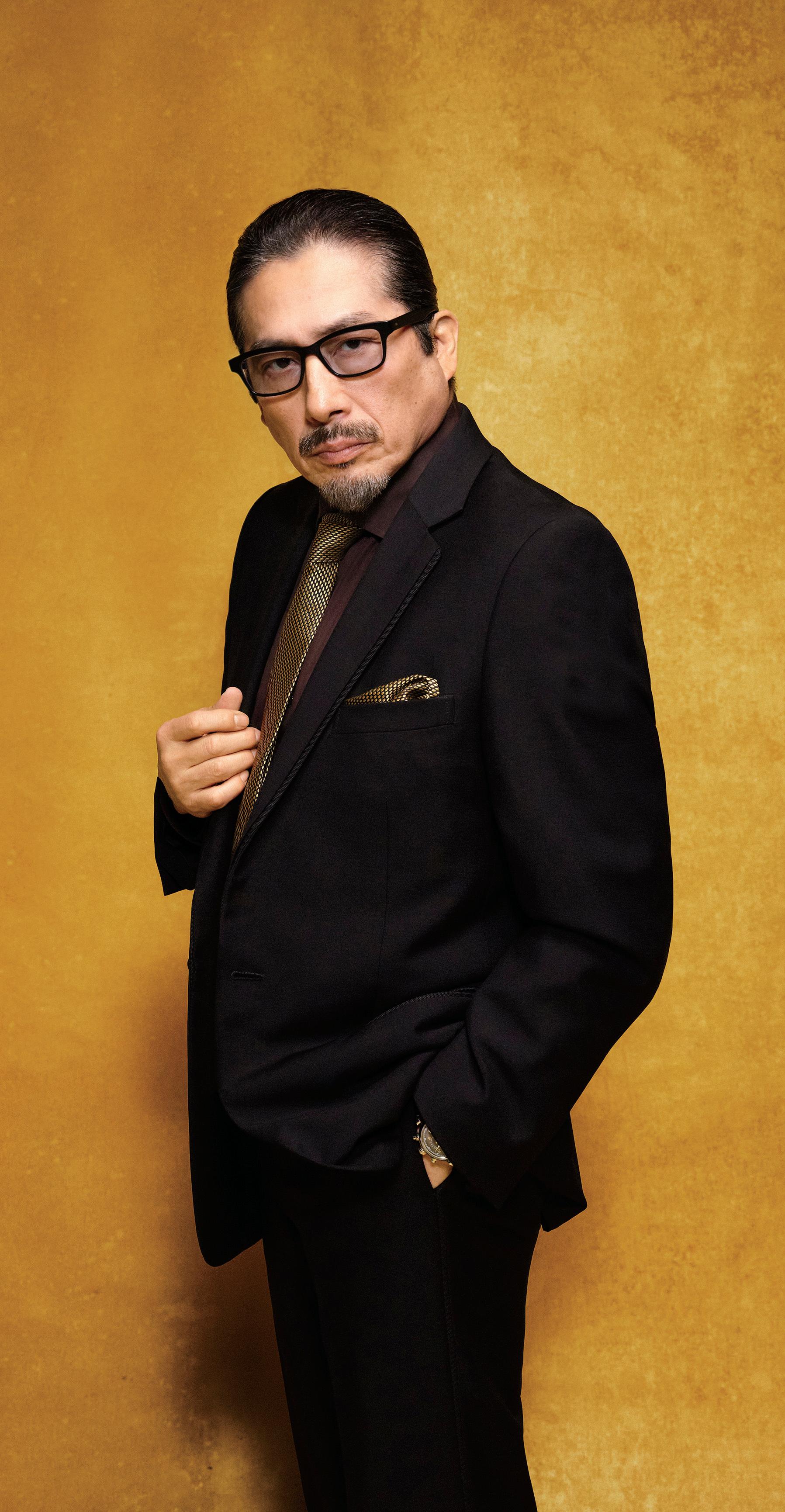
18 DEADLINE.COM/AWARDSLINE
Cosmo Jarvis and Anna Sawai.
Hiroyuki Sanada
Mariko-sama, Lord Yoshii Toranaga, and the impish schemer Kashigi Yabushige, together again in another life. (Well, Los Angeles.) The trio have traveled in from far-flung cities to mark a groundbreaking moment in which Shōgun is setting sail for a new destination: the Emmys.
It was not long ago that Sawai, at a turning point in her own burgeoning career, asked the question on everyone’s mind in her first meeting with Shōgun creators Justin Marks and Rachel Kondo: “Why do you want to remake this?” Clavell’s novel, based on feudal Japanese history, sold 7 million copies decades prior and had been, either famously or infamously, adapted into a 1980 miniseries starring Richard Chamberlain and Toshiro Mifune, spinoff video games, and even a stage musical, inspiring countless Hollywood derivatives that centered white saviors at the expense of Asian characters. But Marks and Kondo had a different approach in mind. With unprecedented diligence to historical and cultural authenticity and a wildly ambitious scope, their five-year journey shepherding Shōgun involved pandemic delays, extensive research, a massive 10-month shoot, and more than 3,000 international cast and crew creating new methods to tell their story in a uniquely cross-cultural way.
The most expensive production in FX history, the investment paid off with 9 million viewers in six days across Hulu, Disney+, and Star+, and drew praise stateside and in Japan, with admirers including Hideo Kojima comparing it to Game of Thrones. It even beat The Bear Season 2 and The Kardashians in domestic and international viewership, respectively, to score a No. 1 global debut; insert smiling Fuji (Moeka Hoshi) gif here.
A few months from this debut, in May, FX and Hulu will send Shōgun fans and awards watchers into a tizzy with news that the acclaimed historical drama will be renewed for two more seasons, switching the Emmys frontrunner from Limited Series to Drama contention. Yes, in spite of the fact that its intertwined narratives of Sanada’s embattled bushō Toranaga, marooned English navigator John Blackthorne (Cosmo Jarvis), and Christian noblewoman interpreter Lady Mariko had already played out Clavell’s near 1,200-page novel to its conclusion.
On this spring day with the finale fresh in

mind, however, the success of the show, evidenced by critical acclaim, viral memes, and ratings wins, is still sinking in for these three generations of Japanese talent. The veteran elder statesman, the art house darling, and the newcomer; none had yet seen, let alone been invited to participate in, a project like this for Asian actors in Hollywood, the first Western production of its scale to center on Japanese characters with a predominantly Japanese cast, in a story told largely in the Japanese language.
Shōgun had proved so popular that, in recent weeks, Sanada and Sawai embarked on a whirlwind U.S. promotional tour, hitting the likes of Good Morning America, Jimmy Kimmel and Kelly Clarkson on the talk show circuit. Sawai even taught Stephen Colbert how to walk Mariko-style, feet pointed inward in the disciplined gait of a 17th Century Japanese noblewoman, across the Ed Sullivan Theater stage.
48 hours earlier, Sanada—who took on a career-first producer credit while also starring as Toranaga, based on the real Tokugawa Ieyasu who was known as one of the ‘Great Unifiers’ of Japan—attended the glitzy White House Correspondents’ Dinner in Washington, D.C. where he was humbled as other guests approached him to gush over the show. “It was a great reaction. More than we expected when we made it,” he says happily.
Now he and Asano, himself a celebrated star of Japanese cinema, flank Sawai in the studio, their paces matched in dancerly synchronicity, and she jokes that this is her Beyoncé moment. No one is surprised when Sanada takes the lead and counts the trio off as they stride toward Deadline’s photographer: “One, two, three!” Days later, there’s an emotional hitch in his voice as he reflects on the fact that Shōgun has been received so warmly after the decades-long fight for Asian inclusion in Hollywood. “I could never have imagined this kind of thing happening.”
Shōgun had been in development for years by the time co-creators and executive producers Marks, an Oscar nominated screenwriter of Top Gun: Maverick, and Kondo, an award-nominated fiction writer, who are married, took over the helm. First announced in 2013 by Fox as a
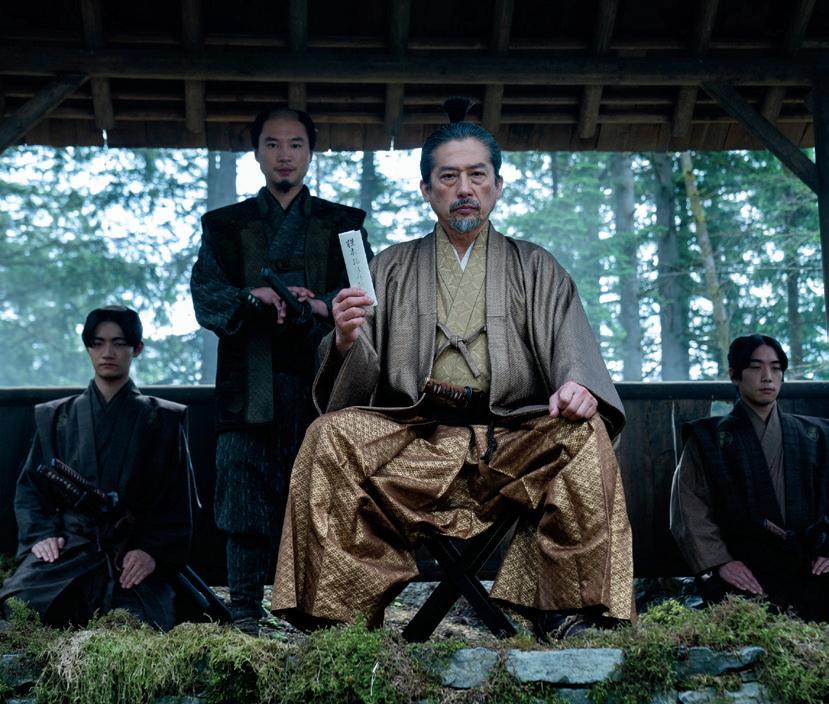
as Lord Yoshii Toranaga.
prestige miniseries for its then-subsidiary FX, it endured developmental stops and starts with various producers and writers attached as the company under CEO John Landgraf searched for the right way in.
Following the cancellation of his Starz series Counterpart, Marks had just signed an overall deal with FX when exec Gina Balian sent over a copy of Clavell’s novel in 2019. “The idea was: see if it speaks to you and we'll go from there,” he says, joining Kondo over video chat from the home on Maui they share with their two children and a colorful menagerie of pets. And for ages, there on the coffee table Shōgun sat, very much unread.
“While I didn't know the book, I did know the silhouette of the book and a lot of the movies, television shows, and stories it inspired over the years,” Marks says. The long shadow of Clavell’s internationally bestselling novel is so vast, some credit it with helping to spark the sushi boom in America in the ’80s. The 1980 miniseries’ centering of Blackthorne’s perspective, unfortunately, lent that legacy an outdated sheen to more modern sensibilities, Marks included: “I felt, in the most dickish way possible, that I knew what this was, and what story it was trying to tell.”
Then, one weekend he and Kondo began reading it simultaneously and found themselves hooked, engrossed by the book’s multiple points of view.
Fictionalizing real figures and events from a pivotal time in the waning days of Japan’s tumultuous Sengoku period, Clavell, a former British artillery officer turned screenwriter and novelist who spent years in a Japanese prisoner-of-war camp during WWII, spun a tapestry of power struggles big and small amongst characters forging their destinies in an era known as the ‘Warring States period’.
There’s the feared Toranaga, whose political rivals plot against him on the Council of Regents, formed to govern until the late Taikō’s heir comes of age; the many warlords, vassals, and opportunists whose self-serving agendas threaten a precarious peace; the Portuguese traders and Jesuit priests conniving to strengthen their foothold in Japan as religious wars rage on in Europe.
And, the two other lead protagonists of Shōgun: Mariko, the loyal survivor of a disgraced lineage who has found salvation in the Catholic faith but is still searching for her purpose; and bewildered sea pilot Blackthorne, the fish out of water ‘Anjin’ who shipwrecks on Toranaga’s shores with a Dutch vessel and is quick to judge the Japanese way of life before undergoing his own paradigm-shifting journey of understanding.
Throw in sea storms, bandit attacks, daring escapes, secret alliances, courtly machinations, and one massively destructive earthquake, and the specter of death, colliding with themes of duty and survival, looms overhead for the characters at every turn. (Not to mention a forbidden romance, but more on
19 DEADLINE.COM/AWARDSLINE
From left: Hiroyuki Sanada and Tadanobu Asano; Sanada
LATOE YU/FX
that later.)
“You start reading and all of a sudden you’re a couple hundred pages in and you think, oh my god, a thousand more pages: yes,” says Kondo. “It was propulsive and highly consumable. But we both came to it a little bit cocky. I thought, obviously I’m of Japanese heritage. Between the two of us, I’m the one to speak to this subject matter. But we came to find out very quickly that couldn’t be more untrue.”
Kondo, who grew up in Hawaii, realized she too was an outsider to the feudal Japanese society backgrounding the story, instead bringing her love of period dramas to the epic, and a personal investment in its female characters. Texas-born Marks came to its action-packed narrative of political intrigue, life or death stakes, and dazzling set pieces from a genre background. Their pitch to FX executives was straightforward, embracing Clavell’s story with one vital exception.
“We didn’t feel that we could successfully invert the gaze of this show because we’re not Japanese; it would be fallacy, maybe bordering on appropriation, to try to do something like that no matter how many [Japanese] people you hire,” says Marks. “What we could do would be to subvert the gaze—to take the expectations that we all have for stories like this and use them against the audience. To use Blackthorne in a way where he draws a lot of attention early on, and it allows for us to set the table for what is then a more surprising story.”
FX was onboard, and the co-creators assembled a six-month-long writers’ room of predominantly Asian American women,
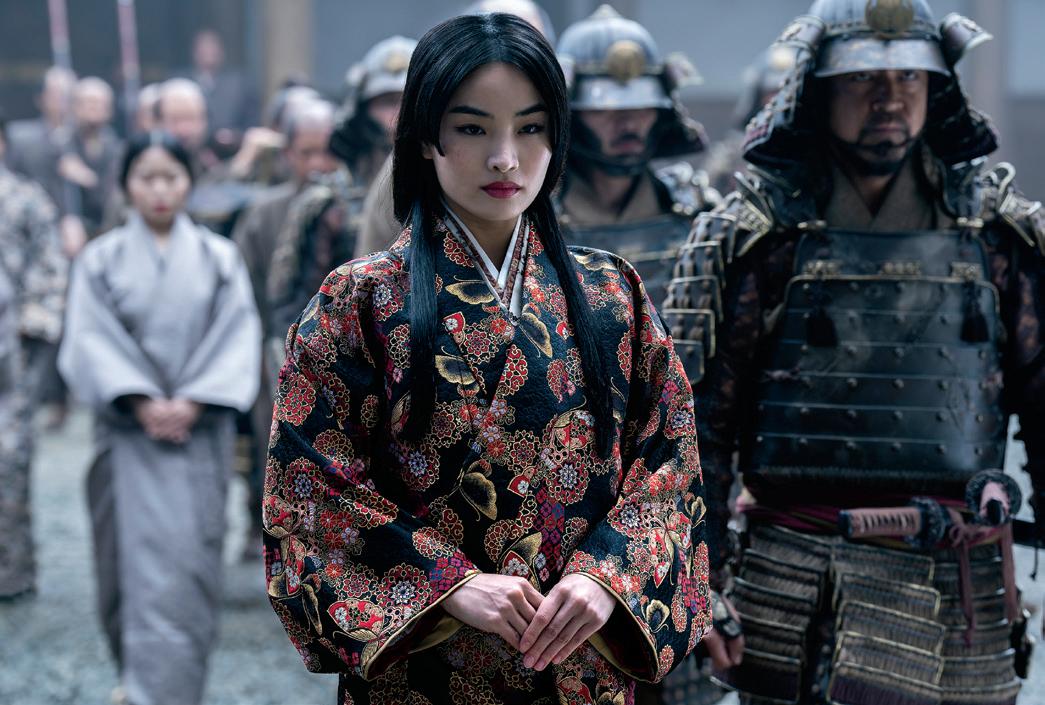

scripting the first two episodes themselves with Marks as showrunner. “Everyone had a specific angle on the approach that felt like it was flying in the face of what you thought this show would be,” Marks says. “Creating a conversation is the most important part of a writers’ room at the end of the day, and we felt it was important, given our audience, to wrap that conversation around the Asian American point of view and to bring that intersectional discourse into the process.”
More than Game of Thrones, the HBO fantasy megahit to which Shōgun has drawn much comparison, the writers’ room had another model in mind that they were all watching at the time: Succession. Between the dizzying power plays, backstabbing political games, and fraught relationships moving the story toward its tense denouement, the show is chock full of gory seppuku, beheadings, shinobi assassinations, cannon dismemberments, and the most loaded hand touch since Mr. Darcy helped Elizabeth Bennett out of her carriage.
It was a production of daunting scale, exacerbated by unexpected Covid filming delays and slowdowns. It had been a big win when FX agreed to make Shōgun primarily in the Japanese language, casting actors some of whom had never acted outside of Japan. But the sudden extra timing led to the creative process that would refine the writing on the show and define their overall approach.
“So much of this process has been building the car as we’re learning how to drive it,” says Kondo. “No, we didn’t know how to do any of this. And it was, let’s say, controlled chaos for a very long time.” Case in point: Translating the show’s dialogue, originally written in English, into spoken Japanese performed by the cast.
Working with consulting producer Mako Kamitsuna and researcher Frederik Cryns, each script was pored over and fine-tuned for cultural nuance before being sent to a team of translators in Tokyo.
According to Kondo, the resulting language felt too modern to their Japanese producer Eriko Miyagawa and Sanada. So, the translated scripts were then sent to Japanese playwright Kyôko Moriwaki, a specialist in jidaigeki period dramas, to be further translated into historically accurate period Japanese.
Then came an unexpected serendipity as to how each word choice and mark of punctuation was then re-translated back into English subtitles. It was on set when Marks realized their linguistic telephone game could yield poetic treasures when he heard Sawai and script supervisor Kazuko Shingyoku marveling over a line in the second episode that Mariko says in Japanese to Toranaga, explaining whether her Christian faith would conflict with her service to him.
“In our version she said, ‘If I were just Christian, it would. But I’m more than one thing.’ And after all those years of going through translation after translation, it comes back to us years later as, ‘If I were just Christian, it would. But I have more than one heart,’” says Kondo.
“And that’s what we ended up going with. It speaks to how this production was a collaboration at such an exquisite level. Everybody threw in everything they had, and somehow this alchemy happened.”
They applied that early lightbulb moment elsewhere, encouraging adjustments with input from their experts and craftspeople across departments. “What I can say with certainty is that I don’t believe the writer is the author of a show,” says Marks. “I believe that the process is the author of a show. And the nice thing about TV is that the writer gets to author that process.”
He even found wisdom in the very story they were telling. “You read the book and you see the way Toranaga operates and it’s like: are you a Blackthorne here, or are you a Toranaga? Are you riding straight into the wind because you think that’s heroism, or is it Toranaga, who likes to study the wind and adjust his sails, and allow that to take over the process? On this show, the success story was in the latter; in allowing for the wind to just go.”
Filming, originally slated to take place in the U.K. and Japan, eventually shifted to Vancouver, British Columbia in the fall of 2021 with a sprawling crew, including producers, consultants, and artisans flown in from Japan. (Michaela Clavell, the author’s daughter, is also an executive producer alongside Michael De Luca, Edward L. McDonnell, Kondo and Marks.)
As they’d done with their writers, they tapped directors from diverse backgrounds, including Takeshi Fukunaga, whose indie drama Ainu Mosir they’d caught on Netflix, and Hiromi Kamata, who’d go on to direct Sawai in episodes of Apple’s Godzilla series Monarch: Legacy of Monsters
Meanwhile, department heads overseeing costumes, production design, hair and makeup, practical set builds, stunts and more dove into extensive research to create thousands of puzzle pieces needed to craft the world of Shōgun, while visual effects artists would create more than 5,000 VFX shots to bring its vast cityscapes, harrowing set pieces, and tens of thousands of battlefield soldiers to photorealistic life.
Says Marks: “The question that we all asked a lot was: how can a group of American, Canadian, and international filmmakers— European, Japanese, everyone—come together to do something that feels like it has some measure of authenticity, in spite of the fact that the authorship is diffused across culture?”
Approaching it with sensitivity and respect had to be baked into the DNA of their take on Shōgun. And they already had an untapped resource at the ready.
At 63, Hiroyuki Sanada has performed King Lear with the Royal Shakespeare Company, appeared in Hollywood blockbusters like the recent Bullet Train and John Wick: Chapter 4, won the Japanese equivalent of the Oscars— twice—and received his country’s Medal of
KATIE YU/FX 20 DEADLINE.COM/AWARDSLINE
From top: Anna Sawai as Toda Mariko; Fumi Nikaido, Sawai and Jarvis.
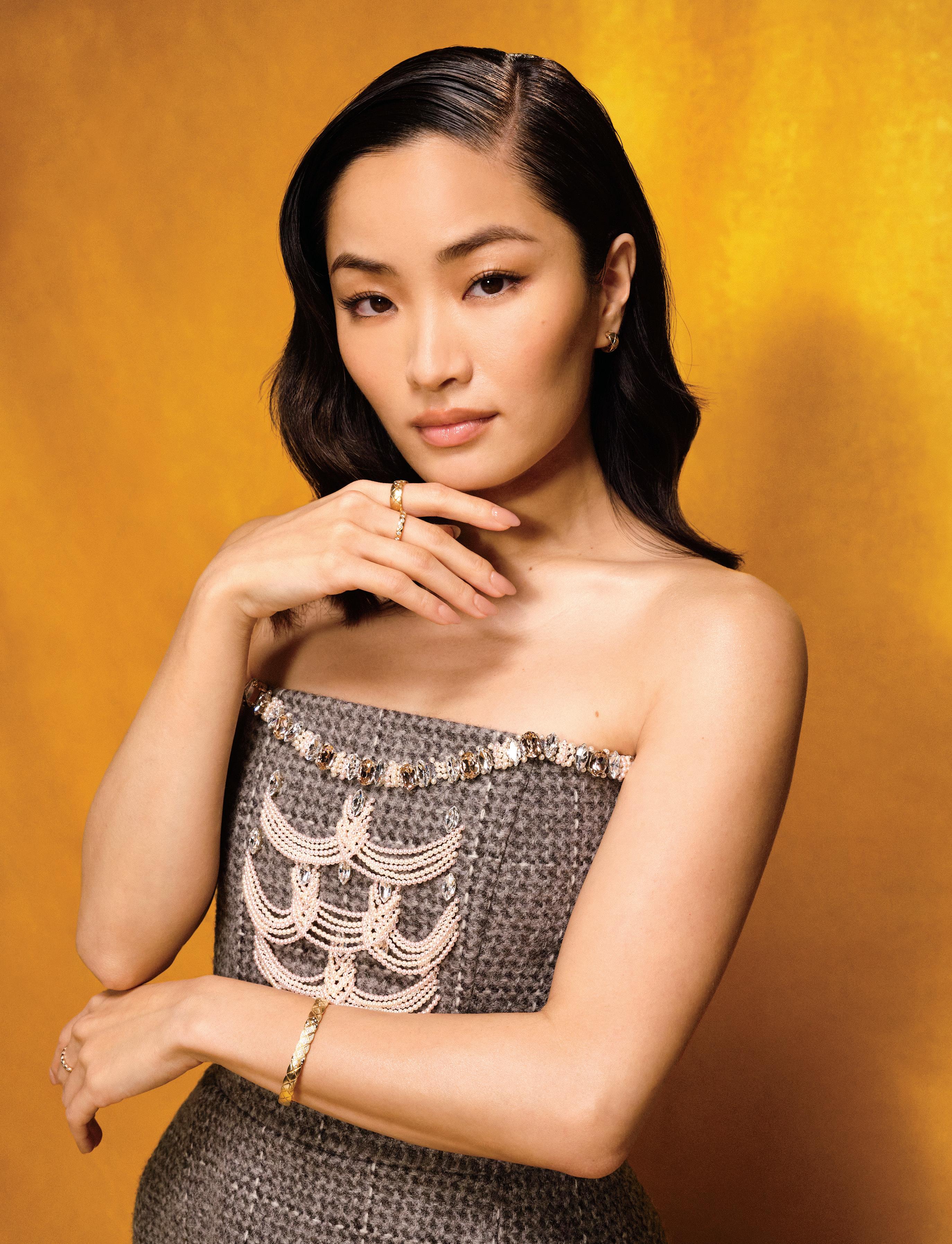 Anna Sawai
Anna Sawai
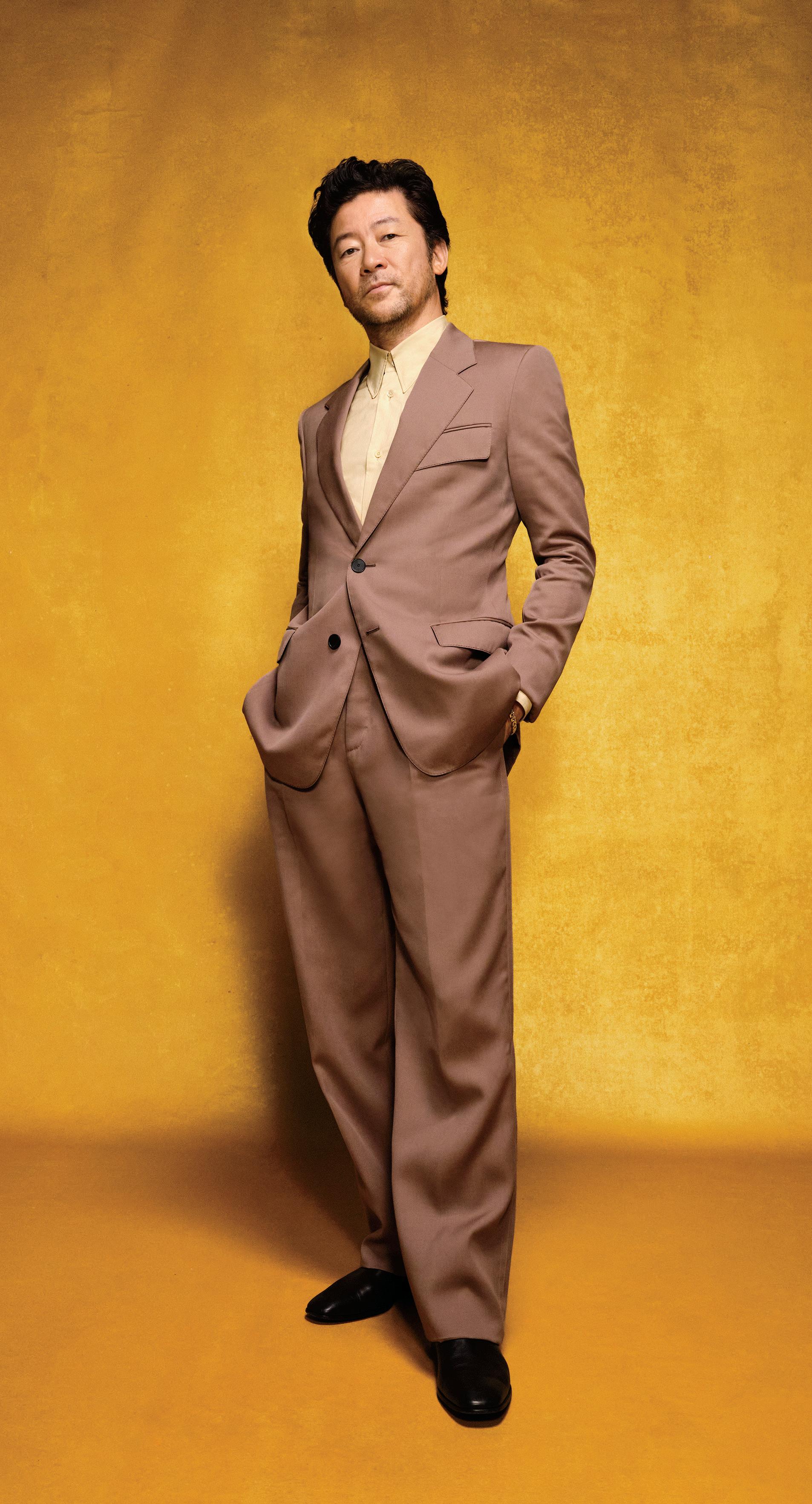
Honor for his contributions to art over his 58-year career. Among the most recognizable and celebrated Japanese actors working in Hollywood today, he had been attached to star in Shōgun even before Marks and Kondo, since its earlier iteration at FX.
No stranger to Japanese jidaigeki dramas, Sanada had even played both the real-life daimyo that inspired Shōgun’s fictional Toranaga (Tokugawa Ieyasu, in 1989’s Oda Nobunaga) and the inspiration for foe, Ishido Kazunari (Ishida Mitsunari, in the 1998 Japanese TV special Tokugawa Ieyasu and 1996 series Hideyoshi).
Long before that, Tokugawa was a heroic figure in Sanada’s childhood for his legacy of creating an era of peace that lasted 260 years.
“When I thought about why I would play this role now, I thought that because human beings will never change and there’s still war all over the world, we need that kind of hero,” he says.
His Toranaga closely guards his plans with the spies of his enemies everywhere, and as Shōgun opens, the fellow Regents with whom he tenuously shares power have him imprisoned in Osaka Castle, plotting to take him out. Sanada plays him as a brilliant strategist seeing his long game to its heartbreaking conclusion, but also brings humanity and humor to the military commander, who cares deeply for his people and his dream of hard-won peace, even as he manipulates those around him like pawns.
“I didn’t want to play a stereotypical samurai character,” says Sanada, who has a gentle air of gravity about him, onscreen and off. “He’s a great leader and strategist. He has power, but he’s also a family man. He has weakness and loneliness. I wanted to make this role a more human samurai, not a ‘Shōgun’ shōgun.”
But it wasn’t until Kondo and Marks came aboard that Sanada was asked to become a producer on the show, a career-first he proudly took on all the way to the set. Born in Tokyo, Sanada moved to Los Angeles in 2005 after starring in the international hit The Last Samurai opposite Tom Cruise, to build an international career for himself at a time when Hollywood offered far fewer opportunities for Asian actors.
Along the way, he says, he found himself frustrated by the stereotypes and cultural missteps he saw on past projects. “As an actor I felt limited in saying something to correct our culture. I didn’t want to break somebody’s pride,” he says. “I spent 20 years like that. This
“ FUNDAMENTALLY, I DON'T THINK THERE’S ANY SUCH THING AS SOMEONE WHO’S NOT COMPLICATED. ”
Tadanobu Asano
22 DEADLINE.COM/AWARDSLINE
Tadanobu Asano
time they asked me to become a producer and I thought, this is a good chance to tell our story to the world more authentically.”
The 10-month shoot, production designed by Helen Jarvis, took over two sprawling backlots and two soundstages. Among the sets: Osaka Castle, with its imposing stone structures and grand hall, and the fishing village Ajiro, constructed in immersive detail with samurai houses and pathways where a cedar factory once stood, outside of Vancouver.
Sanada would arrive to work early to check props, costumes, and other details; after wrapping his scenes, he’d change out of his heavy costumes, armor, and wigs, and go right back to set to watch at the monitors, assisting co-stars with blocking and dialogue.
The show’s approach to getting Shōgun right also meant proving to FX that it was more efficient to invest in experience, like when Sanada insisted on hiring experienced Japanese advisors proficient in period obi tying. The studio initially balked at the already large number of crew being flown from Japan on an already expensive shoot.
“Cut to very early in the production,” says Marks. “We couldn’t bring background [extras] out fast enough, and it was because it’s not just learning how to tie an obi. It’s that having done it for decades, you know how to do it not just fast, but you also know all the shortcuts for screen—the little tricks of putting a piece of Velcro here, a cinch there—all of the inherited accumulated knowledge of craftspeople who’ve been doing this their entire lives. You have that to stand on the shoulders of, if you listen. So, it’s not just about authenticity; it also saved us money in the end.
“I think we often look past that when it comes to what Hiro has long fought for, which is this pursuit of authenticity and the inclusion of his voice in that process,” he adds. “Because we don’t know what we don’t know when we go into things, especially in other cultures. We’re all on that Blackthornian journey, just feeling our way through the dark.”
In an inspired stroke of casting, Tadanobu Asano, the Japanese star known stateside for the Thor films and Mortal Kombat, signed on to play the duplicitous, death-obsessed, yet charmingly maniacal Lord Kashige Yabushige. With an unpredictable swagger and a glorious black swan jinbaori, fabricated by costume designer Carlos Rosario, which he rocks like the David Bowie of feudal Japan, he serves Toranaga, even as the elder daimyo correctly suspects that Yabushige is double-dealing behind his back.
Celebrated for his career in Japan playing deliciously complex individuals—often menacing, mischievous, and sympathetic all at once, a high-wire act in every role—Asano was immediately drawn in by Yabushige’s gruesome proclivities as he read the script for the first episode: “What kind of person boils someone alive?”
He’s speaking over video, a week after the finale has aired, bringing Yabushige’s arc and his morbid fetish for subjecting others to inventive ends to satisfying coda.
“Fundamentally, I don't think there’s any such thing as someone who’s not complicated,” says Asano. “It’s the choices you make to hide it; do you outwardly show it? In this case, Yabushige is someone who is really expressive about their complexities.”
Now 50, he was 19 when he and Sanada made the first of their five films together. That personal history informed the knotty dynamic that twisted and turned between their Shōgun characters leading up to the finale in which, on a cliff overlooking the ocean as Yabushige faces punishment for his betrayals and the tragedies they have wrought, the men reveal their hidden truths only to each other.
“If Toranaga wasn’t Hiro Sanada, Yabushige would not have turned out the way he is,” says Asano. “Even Yabushige’s sweet reliance on Toranaga, in some ways, would not have shown up onscreen.”
Sanada shed the tears his character would never be allowed to reveal.
In Episode 8, “The Abyss of Life”, as Hiromatsu sacrifices himself to keep Toranaga’s pretense of surrender intact and his generals in line, the truth of the moment is conveyed only in a wordless exchange between the two old friends. “We had to show the audience how long we’ve known each other, and how much we believe in each other, without dialogue,” says Sanada. The death, late in the season, had fans gasping.
The actors worked closely with Marks to revise the scene, which originally had several protesting generals performing seppuku, for a more intimate emotional impact. “I remember that day clearly,” says Sanada. “Toranaga is almost crying inside. He knows he’s sacrificing to make a better world. Off-camera when they shot Hiromatsu’s side, I cried a lot. When the camera came to my close-up, luckily, my tears were already dried.”
But his favorite scenes on set, Sanada shares, were for an episode he didn’t appear in at all. “I
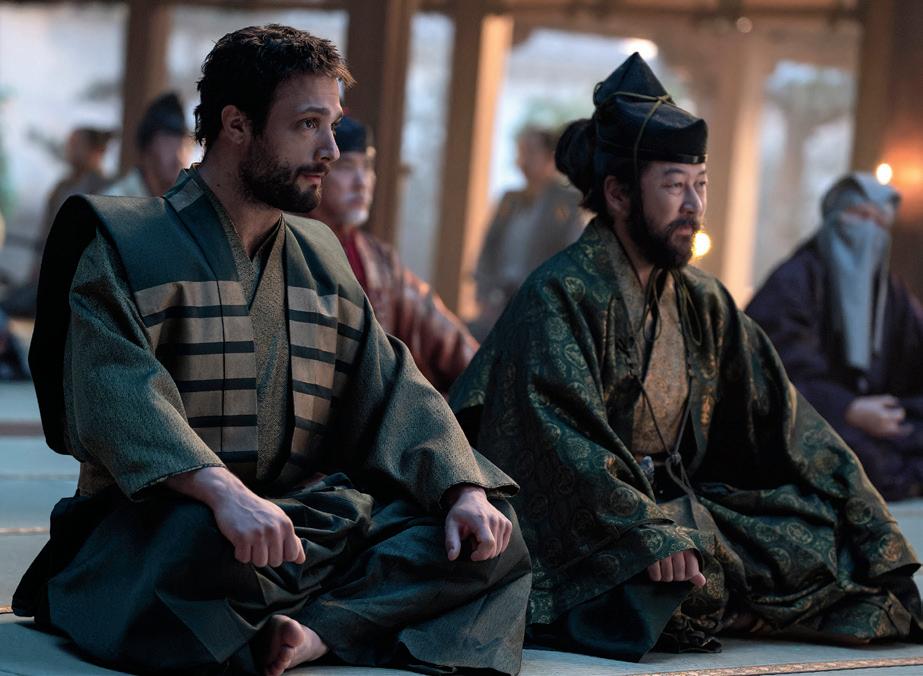
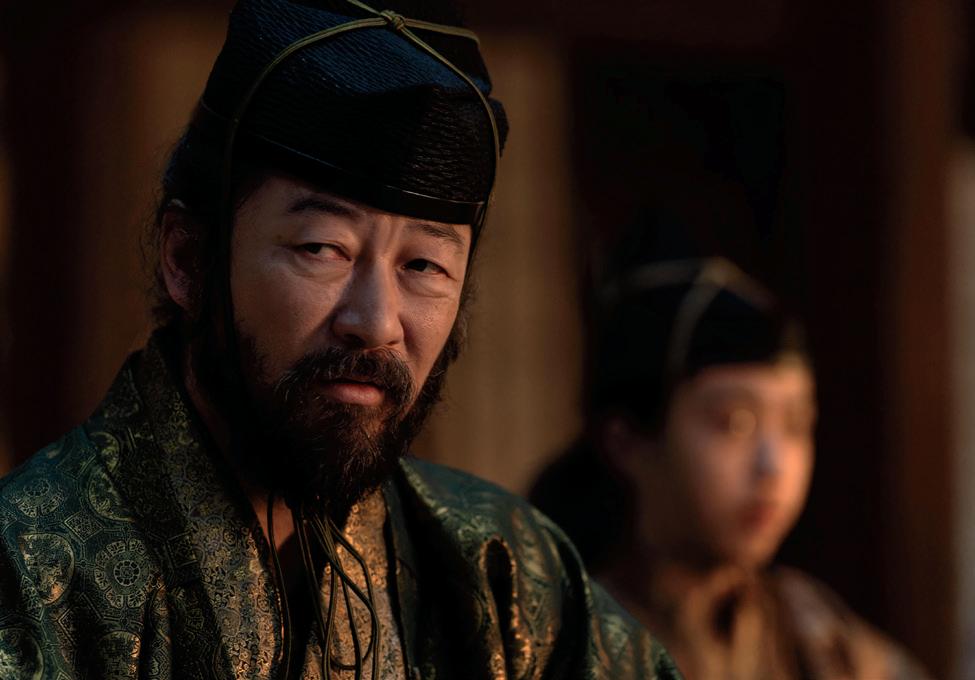
The devious lord of Izu is an almost modern figure of anxiety, so worried about his own survival in a world teeming with danger that he agonizes to understand the moment in which a person stares down certain death. And Asano, of course, has a thoroughly contemporary analogue to explain the quirk.
“We live in a world of smartphones and social media, and you can really kill time with it,” he says. “In the environment that Yabushige is in, there’s none of that, yet he has this constant curiosity. Toranaga and others have power and control, and they create a world where you don’t have time to be curious. You have to do what your lord tells you. But Yabushige’s like, whatever. I think in a way, death was the ultimate curiosity for Yabushige. It’s the ultimate time-killer.”
And if he existed today, he grins, “he’d be an influencer”.
Another Japanese film veteran with whom Sanada had a previous working relationship was Tokuma Nishioka, cast in the key role of Toranaga’s trusted general, Toda Hiromatsu. It was while filming their most crucial scene that
had no scenes as an actor in Episode 9,” he says. “It’s Mariko’s show time.”
Marks and Kondo’s search for Anna Sawai, whose Mariko becomes the sword-fighting, beating heart of Shōgun, was the hunt for a “unicorn” who could do it all while acting in Japanese and English (the latter standing in for the Portuguese spoken with Blackthorne and Father Alvito, played by Tommy Bastow). “We didn’t have a show until we cast her,” Marks elaborates. “And until that point, I didn’t know if this was going to get to the starting line.”
At 31, Sawai’s recent credits include Apple’s historical drama Pachinko, adapted from the novel by Min Jin Lee, and a lead role in Monarch: King of the Monsters, in which she plays one of two siblings crossing the kaiju-infested globe in search of their missing father (played by Ishido himself, Takehiro Hira).
Born in New Zealand to Japanese parents who moved around Asia before settling in Yokohama, she joined a J-pop girl group in her 20s. After seeing the Japanese music industry
23 DEADLINE.COM/AWARDSLINE
From left: Jarvis and Asano; Asano as Kashigi Yabushige.
machine from the inside, she opted out to chase her acting dreams.
Small roles in the Netflix series Giri/Haji and the 2021 action blockbuster F9 followed. Then Sawai reconsidered the types of roles she really wanted to be playing.
“The shift started with conversations like, ‘What do you want to do?’” says Sawai before a trip home to Tokyo. “It was a very slow process of allowing myself to forget everything that I had been told and to really search for what spoke to me, [which] had nothing to do with my race, doing action, or playing roles that felt submissive or just very attractive. That’s how we found Pachinko. And then that led to Shōgun.”
She was admittedly hesitant to join a Western samurai series, having seen, well, other Hollywood samurai movies that short-changed their Japanese characters. When she met with Marks and Kondo and posed the big question to the duo—“Why Shōgun?”—their answers and approach to authenticity gave her confidence that Mariko, trapped in a loveless marriage and torn between duty and desire, wasn’t going to be sexualized or exploited, but rather given agency and a full inner life.
Sawai “had some specifically acultural qualities that we found really unique and unexpected,” says Marks. “She’s able to stand outside of all of the cultures that she’s depicting, whether it be the Christian culture or the Japanese culture, and perform from a place of being lost; an island in the middle of it.” To prepare for the role, Sawai did extensive reading on Hosokawa Gracia, the real Japanese noblewoman who inspired Clavell’s character. She was moved to see a prominent line in the series taken from Hosokawa’s famous death poem.
“‘Flowers are only flowers because they fall,’” she shares. “The words are different, but the message is the same: we know that it’s not
forever, and that is what makes flowers, flowers, and that is what makes people, people.”
Her career-making turn as the series’ quietly incendiary heroine earned instant acclaim. As television roles go, it’s one of the trickiest in recent memory. Not only does Mariko speak two languages, often interchangeably, as she translates for the Anjin, but she also fights and trains in martial arts, rides horseback, carries herself with the physicality and gestures of feudal Japanese women, and must convey her secret feelings only to the camera, while keeping a protective veil to guard her emotions from the people around her.
“Oh my gosh, it was so hard!” Sawai says. “As an actor you’re supposed to express, but the character, culturally, has to repress. I didn’t know how to balance those two out because they’re so opposite. All I can remember is that I was boiling inside shooting those scenes, I felt so stuck. In hindsight, I can say I was feeling stuck because the character was; I was just living in her and feeling the same emotions.”
For what it’s worth, Sanada agrees with Marks and Kondo: “Anna was the only one on earth who could play this role.”
She and Jarvis were cast separately, the British actor catching Marks’ eye after watching him play an ex-boxer in the 2019 British drama Calm with Horses. “At that point in the process we had a hero who is classically trained and everything that you want, and Anna who had this hint of modernity to her and a displaced quality, and then we had this guy who seemed like he stumbled in from 1600 and was going to act for us,” says Marks. “It felt like the right energy to combine into something unexpected.”
Meeting Asano’s improvisational touches with his own, Jarvis also brought unexpected humor to the Anjin, who develops a mutual recognition with the opportunistic Yabushige.
“Cosmo has great instincts,” says Asano.
“Obviously he doesn't know Japanese, but I was able to really trust that whatever I threw at him, he would meet with a great impulse and throw the ball back at me. And in that way, with Yabushige and Blackthorne, Blackthorne ends up spinning down Yabushige's little hurricane and getting wrapped up in it.”
While the sizzle that blooms between Blackthorne and Mariko is a slow burn rollercoaster ride frequently hampered by their philosophical differences over faith, duty, and sacrifice, the longing comes to a head when she accompanies him to visit the courtesan Kiku (Yuka Kouri) in the Willow World of Episode 6, directed by Kamata and written by Maegan Houang.
In one of the show’s most memorable sequences—which is saying something, given the tectonic mudslide that levels an entire small town and all the ritual belly slashing—Kiku, hired to entertain Blackthorne while Mariko is present, clocks the vibes between the two starcrossed lovers. She sits beyond Blackthorne’s view as Mariko translates her words, allowing Mariko to speak her own desire and longing to him in a stunningly intimate exchange.
Kondo, tickled that so many viewers responded to the sequence, describes it as “the sexiest scene in which sex never happens”. (Or, as Marks calls it: “The total eclipse of the Mariko.”)
In one deft camera move lit in lush, sumptuous candlelight, as the score by Atticus & Leopold Ross and Nick Chuba spills over with emotion, the show’s creators trust their audience to meet the moment and pick up on what goes unspoken, even when the lovers part after physically sharing only a barely-there caress of the hand. (Wong Kar-Wai’s In the Mood for Love and James Ivory’s Remains of the Day, unsurprisingly, were two favorite references in the writers’ room.)
“Maegan Houang, who wrote that scene, had
JOURNEY THROUGH THE
How Cosmo Jarvis landed Blackthorne
Finding the right actor to play Pilot-Major John Blackthorne, the English sailor who washes up in feudal Japan only to become embroiled in the political games of Lord Toranaga (Hiroyuki Sanada) and his rival samurai warlords in Shōgun, was a tricky task for series co-creators Justin Marks and Rachel Kondo.
Lending a subversive spin to James Clavell’s 1975 bestselling novel, previously adapted into an Emmy-winning 1980 miniseries starring Richard Chamberlain in the role, they needed a performer
who could unlock surprising dimensions in the character that some might assume was a typical Hollywood white savior.
But as Cosmo Jarvis’s Blackthorne proves over the season’s 10 episodes, there’s plenty that the restless so-called Anjin (pilot) has to learn from the Japanese, whose customs, values, and bushidō he eventually comes to understand and appreciate.
Instead of imposing his Eurocentric views into the affairs of Toranaga, his interpreter Lady Toda Mariko, and others, “he
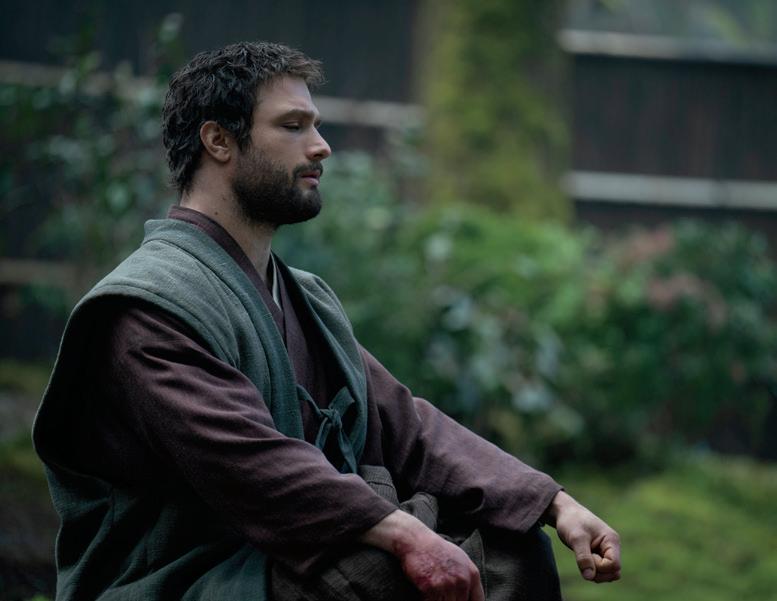
takes a bunch of side doors out,” says Marks, the series showrunner, “and often through the genius of Cosmo Jarvis and through his comedy, albeit a very dry and straight-faced one.”
Hailed for his breakout turn in 2016’s Lady Macbeth, Jarvis’s

credits include Netflix’s Jane Austen adaptation Persuasion, the upcoming Alto Knights opposite Robert De Niro, and Alex Garland’s Warfare. It was Jonathan van Tulleken, who directed the series’ first two episodes, who recommended Marks
24 DEADLINE.COM/AWARDSLINE
KATIE YU/FX
“ AS AN ACTOR YOU'RE SUPPOSED TO EXPRESS, BUT THE CHARACTER, CULTURALLY, HAS TO REPRESS.”
Anna Sawai
this great pitch in the room that lasted to the execution, which is that it feels like phone sex,” says Kondo. “That’s what Kiku is able to give them in that moment.” A few episodes later, it’s another small gesture that speaks volumes as Blackthorne volunteers to second Mariko’s seppuku, ready to behead the woman he loves in order to spare her soul.
By the time Episode 9 arrives, revealing Toranaga’s Crimson Sky to be a one-woman mission, it’s a showstopping tour de force for Mariko. Directed by Frederick E.O. Toye and written by Kondo and Caillin Puente, the episode was so intense for Sawai to shoot, she chipped a tooth while filming her naginata fight with the Osaka palace guards, just from gritting her teeth.
Kondo praises the discipline, stamina and physical capability Sawai needed to carry herself through the filming of Mariko’s grand farewell episode. “She’s a performer of the highest capability,” says Kondo. “Her level of focus is off the charts. You talk to her when we were filming Episode 9 and she’s not really there. She’s listening to you, but she’s so in her own head because it took them three, four days just to film her trying to walk out the gate. This is somebody who was performing on a level that not many can.”
One day, Sawai says, she’d like to follow in Sanada’s footsteps and produce her own passion projects, not just star in them. Asano is also
COSMO

eager to see what new doors Shōgun’s success opens. Both praise their producer/co-star for paving the way. “Without him and without the other Asian actors who have been in this industry for a long time, we would not have the ground to build on,” Sawai says.
Two weeks have now passed since Shōgun’s contemplative finale (directed by Toye from a script by Hoang and Emily Yoshida), brought closure to Toranaga’s grand plan, turning a hopeful eye to the future and setting up the postscript victory at the Battle of Sekigahara that will usher in his dynastic shogunate.
Reflecting on a season that had critics praising its storytelling to a near-unanimous 99% Rotten Tomatoes benchmark, and fans making internet memes out of everything from Fuji’s epic reactions to Blackthorne’s persistent calls for “my men and my ship”, Marks tries to remember the moment he really exhaled.
“I’ll let you know when I do,” he jokes.
The glowing first reviews were a promising start, “but I’ve seen it go both ways,” he says. “The writer of Street Fighter: The Legend of Chun-Li has seen all sides of these things. You have more control, fortunately, in TV today than in a genre movie, but I’m just happy that anybody liked it.”
For Kondo, that revelation happened on a random Tuesday afternoon.
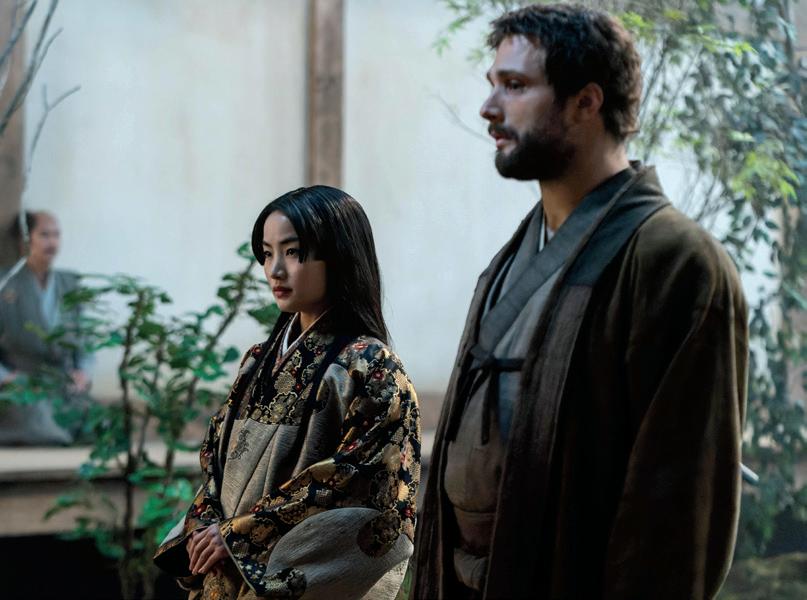
check out the up-and-coming British actor’s work as an ex-boxer in the drama Calm with Horses Marks was impressed by Jarvis’s “muscular” performance but wasn’t sure he’d be right for Blackthorne until the actor sent in a self-tape of a scene in
which Blackthorne, a prisoner of Toranaga, draws a map of the known world—and Japan’s place in it—in the sand.
“Cosmo taped it in his belfry in London in the shadows, holding his iPhone,” remembers Marks, before Kondo corrects him. “It
“I walked into our little tiny post office here in our little town and the postal worker I always see, who’s very brusque and to the point, saw my name on the return label. He looked up and said, ‘Shōgun’. He proceeded to say more words to me than he had ever said. And I could see how deeply he was enjoying it and how closely he was watching it. It made me realize that we had asked a lot of audiences to set their phones down, to really come on this journey with us, to please give us your time and trust us. And to see the fruits of that in his response made me feel like if it could do that, and it could travel all this way to this one little island, then we did something.”
The co-creators and producers meanwhile, have been fielding curiosity from fans hungry for details of FX and Hulu’s mid-May announcement that Shōgun has been renewed for two more seasons—news hinted at when Sanada inked a deal to return as Toranaga. (Debate has raged over whether or not the former limited series should continue into additional seasons.)
It’s unclear if any Shōgun continuation might draw on the other novels in Clavell’s six-volume ‘Asian Saga’, but Sanada suggests that, with the events of the original book now exhausted, they have plenty of real history to borrow from. “We know what happened, so who knows? Only the god of shows knows,” he teases.
Marks, still catching his breath from the first season, candidly admits the right idea would need to come along. “It’s so hard to do what James Clavell did. We drafted [behind him], like when you drive behind a big truck. To have to build it from the ground up, I’m not saying it’s impossible, but it would take a great idea. And I'm not sure where that idea is—yet.”
Or maybe he already has the next epic season mapped out, hidden behind his own Eightfold Fence, teases Kondo: “He still has to keep everything in his secret heart.” ★
was a flip phone,” she says with a smile, “because that’s Cosmo.”
The scene felt lived-in and “made a boring scene actually exciting,” says Marks. Still, he worried that getting network sign offs on Jarvis might be a challenge, thanks to preconceived notions of what the character should be like. “That was a Friday. And on a Sunday, I woke up with Rachel, still thinking about Cosmo.”
“There’s something about this guy that is so unexpected you can’t take your eyes off of him and what he’s doing,” he says. On impulse, he sent the tape to one of the show’s executives.
“Within three hours the entire company had seen that audition on a Sunday afternoon, all
the way up to Landgraf. And that began the conversation.”
Cast opposite Sanada as Lord Toranaga and Anna Sawai as Lady Mariko, Jarvis brought a fearlessness to the role and a helpful spirit to the production. (It remains to be seen if his journey will continue in future seasons.)
“There’s a self-consciousness that he just doesn’t possess that many good-looking dudes in that age range, who act for a living, do possess,” says Marks. “He just doesn’t have it. He’s just there. He’s trying to carry cables for everyone. You’re like, ‘Please put that down, Cosmo.’ He’s out there for the good of the show and for the good of the character—he really understood it.”
25 DEADLINE.COM/AWARDSLINE
From left: Jarvis; Jarvis and Sanada; Sawai and Jarvis.
Dialogue
Ambika Mod

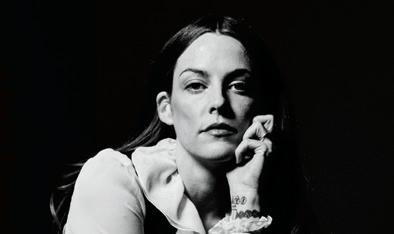
 BY HANNAH RACHEL ABRAHAM
BY HANNAH RACHEL ABRAHAM
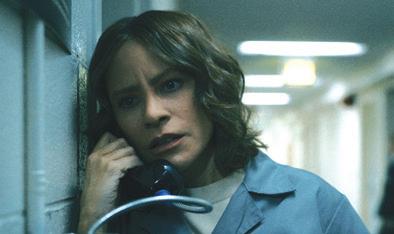
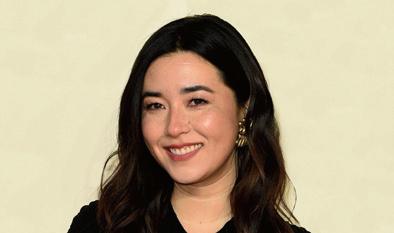
26 DEADLINE.COM/AWARDSLINE IN CONVERSTION WITH THE FINEST NAMES IN DRAMA
JOHN NACION/GETTY IMAGES
The One Day star reveals the craziness of the past year and details of her upcoming show Playdate
One bad mother Coming to terms with playing a drug lord 34
Double trouble Exploring new roles as a spy and samurai 36 Maya Erskine Give me shelter Getting the backstory for Fallout's Ghoul 32 Walton Goggins On the beat A truecrime story that's anything but routine 30 Riley Keough
Sofía
Vergara



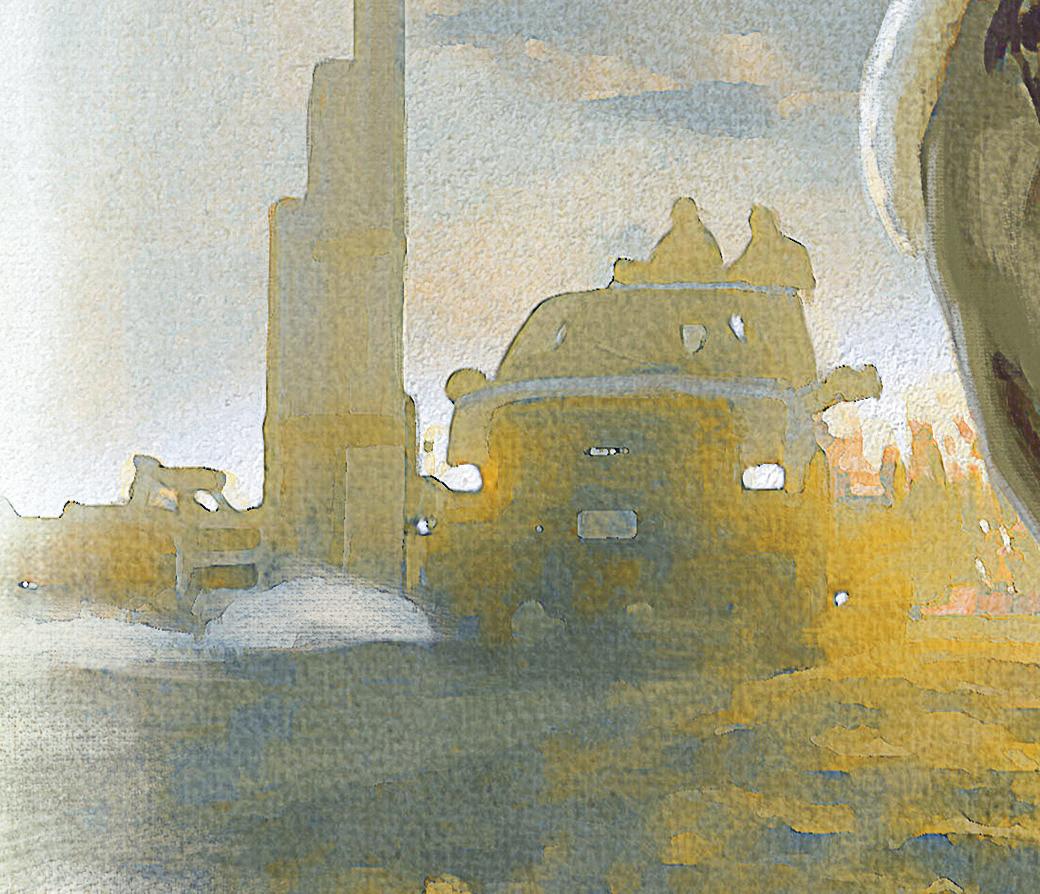

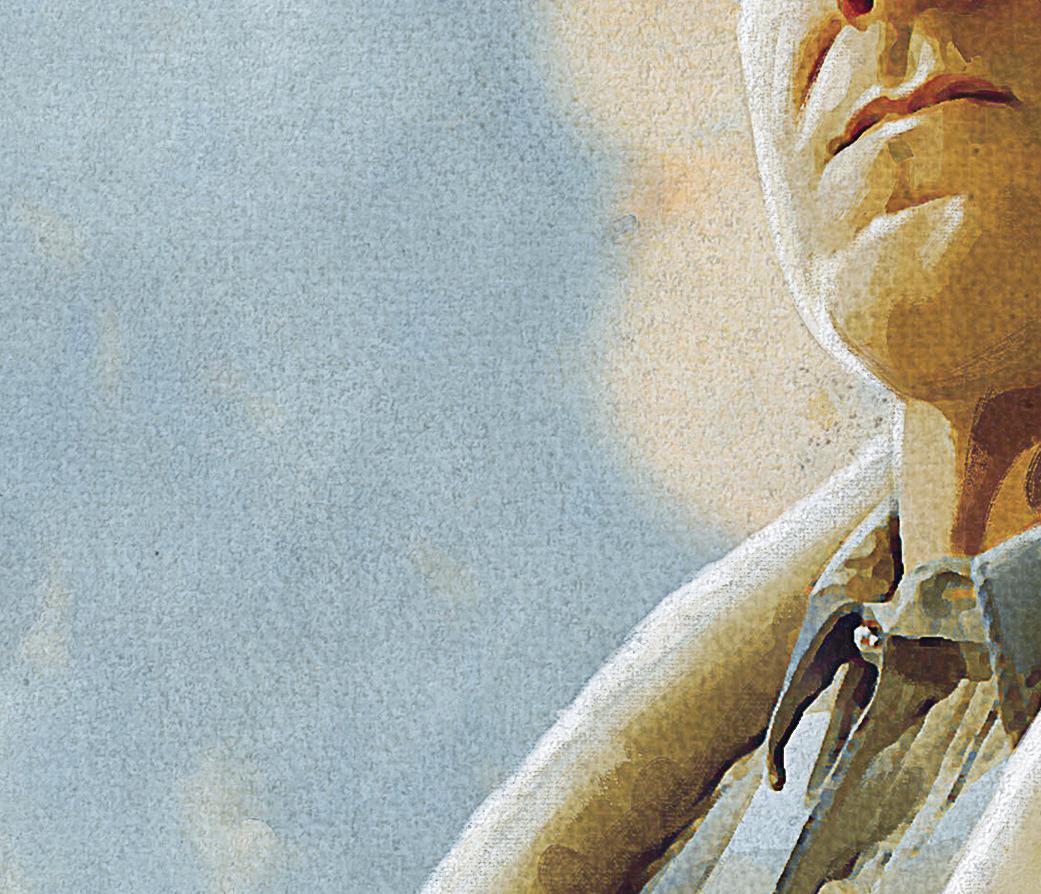
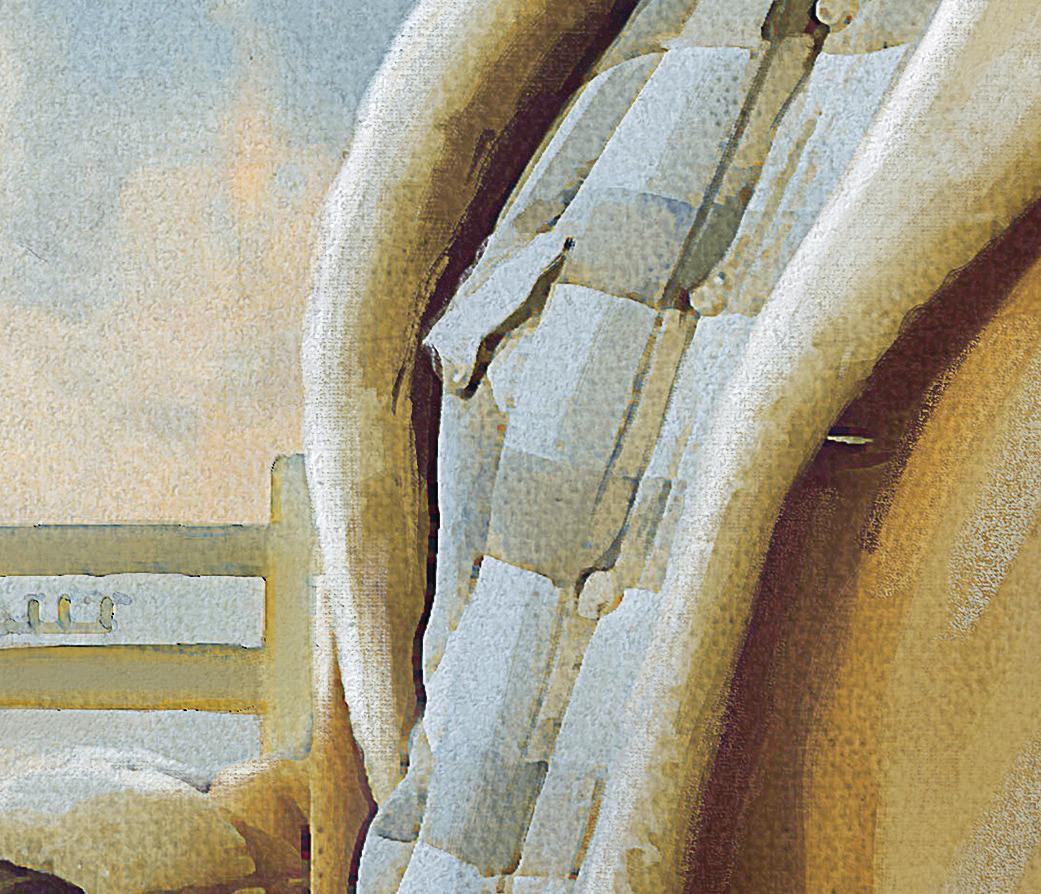
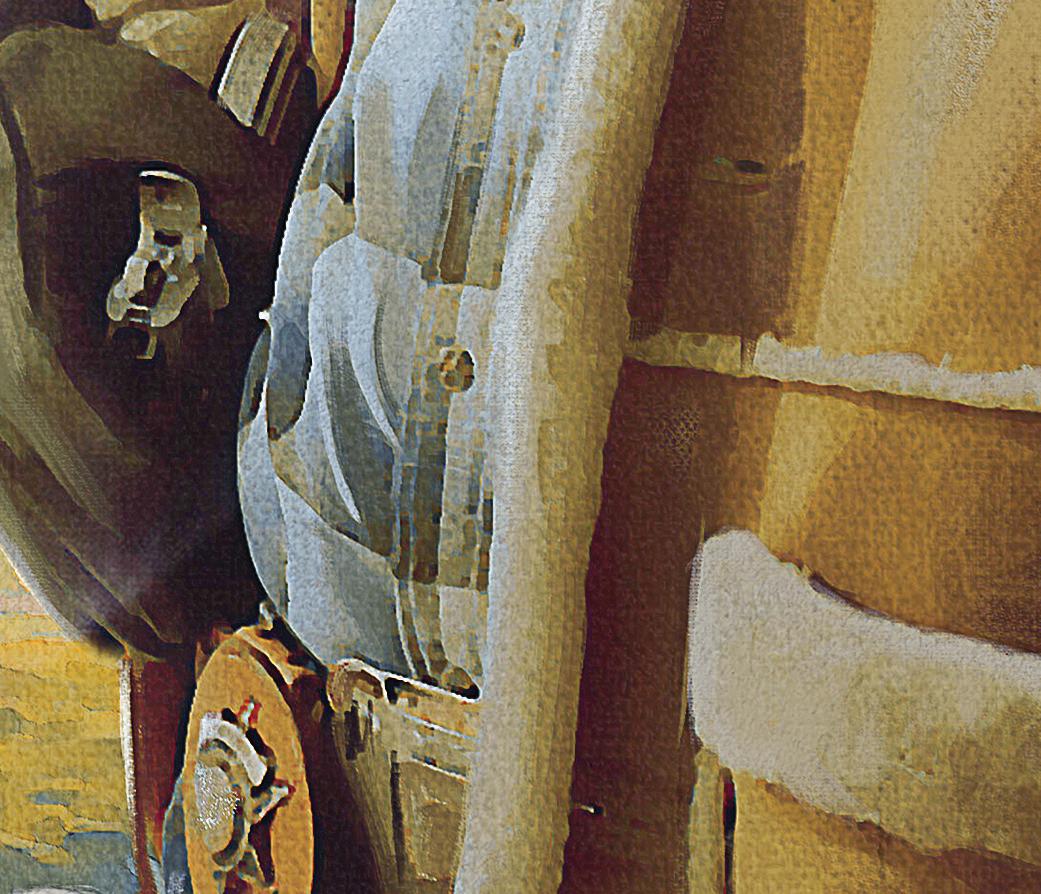

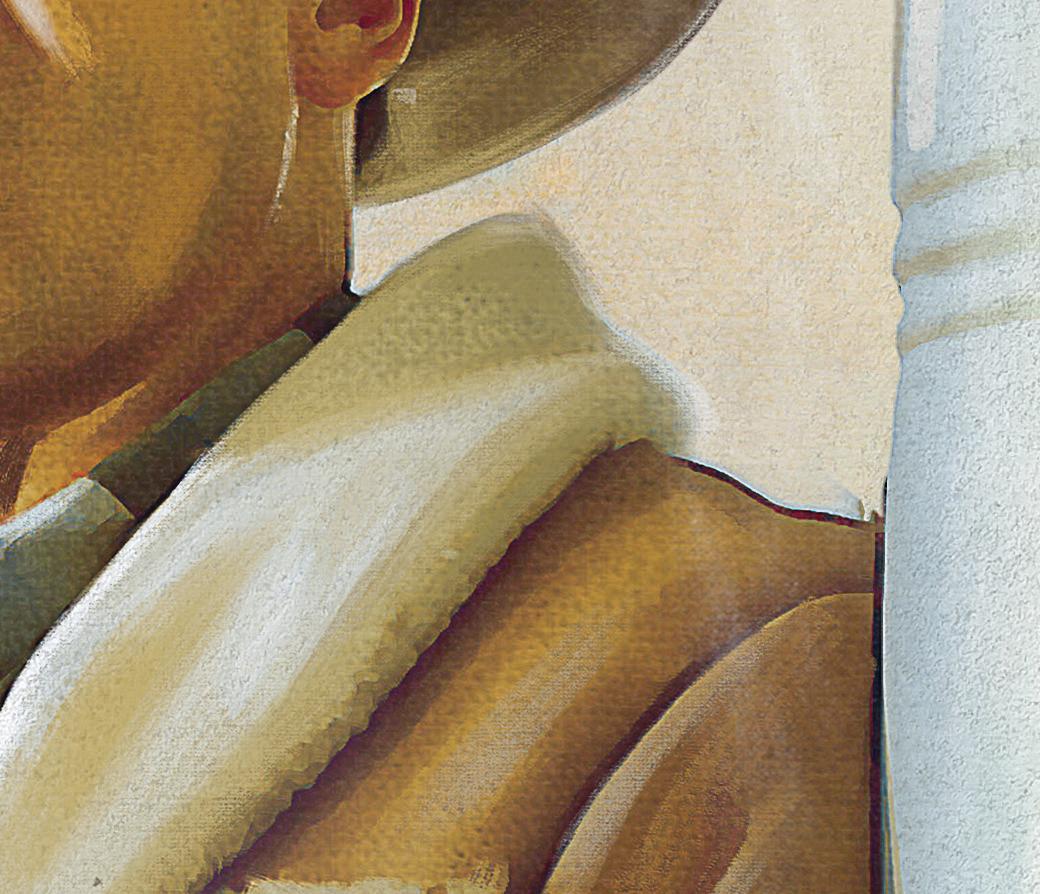
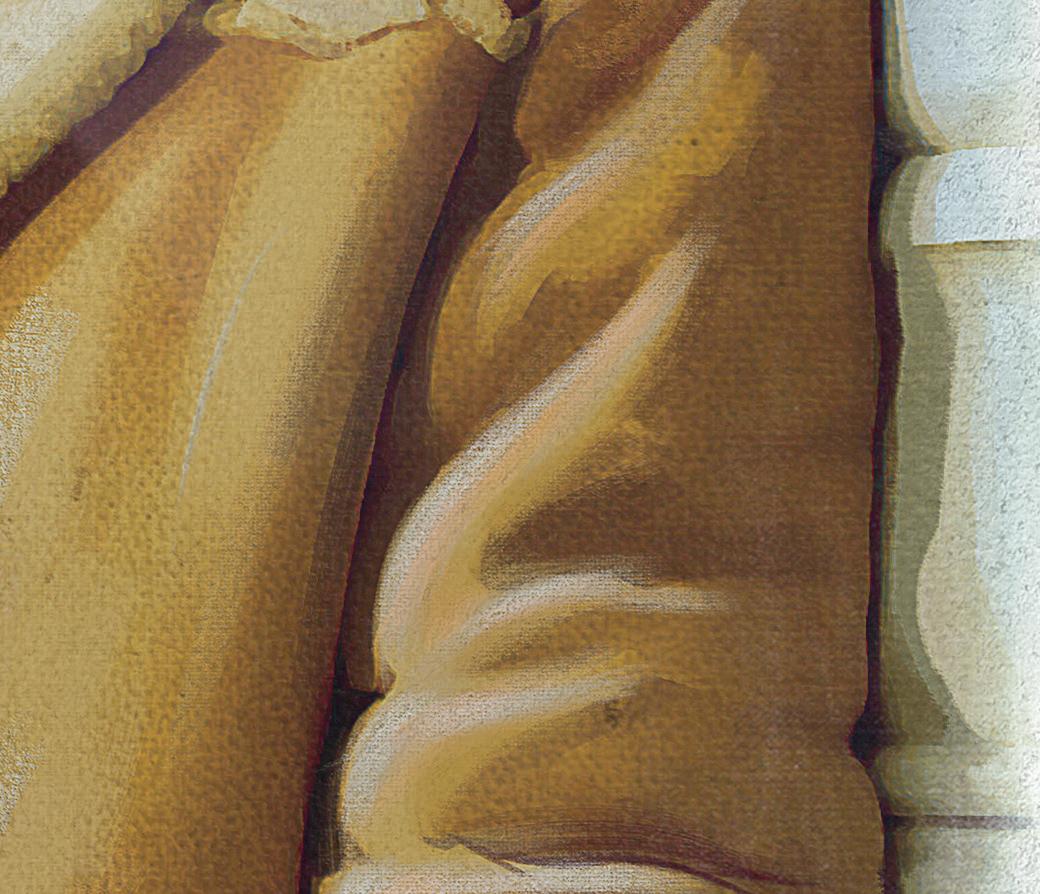
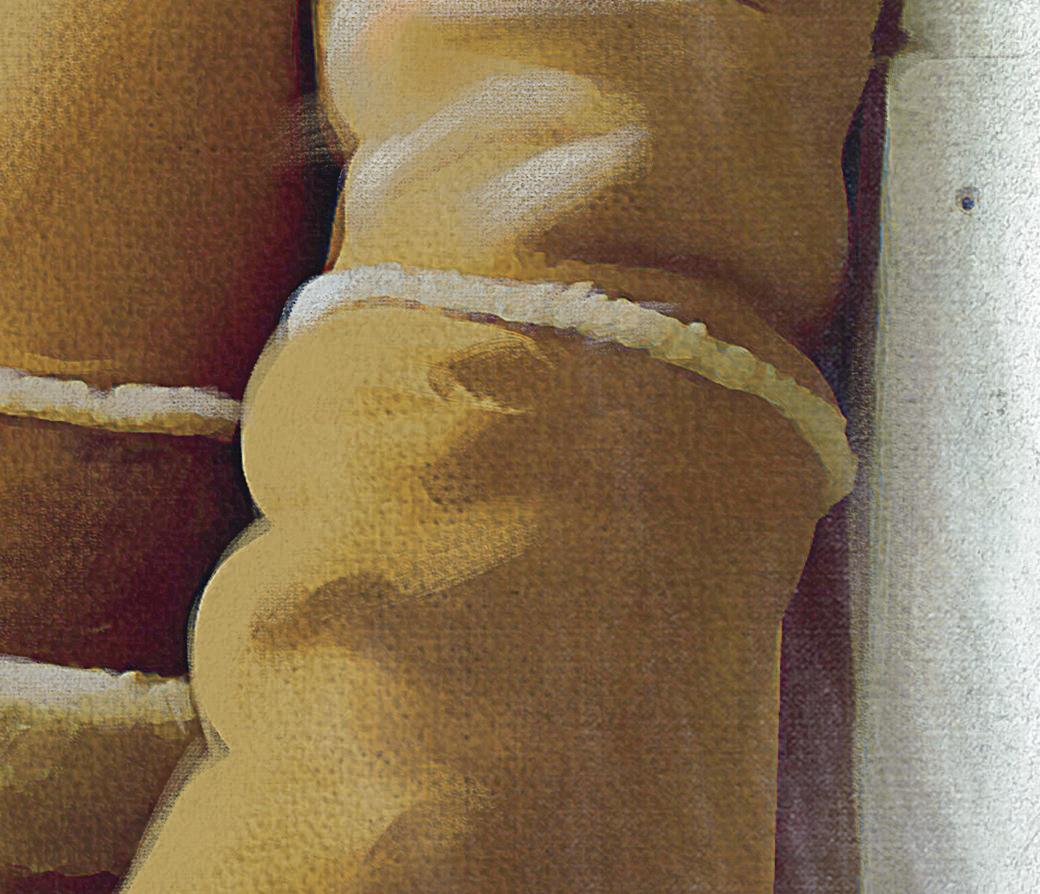
FYC
Ambika Mod is not prepared to be a footnote in 2024. After hustling through improv and a breakout turn in BBC miniseries This Is Going to Hurt, this year saw her biggest hit yet—the lead role of Emma Morley in Netflix’s adaptation of David Nicholls’ novel One Day. Paired with Leo Woodall’s Dexter Mayhew, Mod sensitively plays Emma’s loves, wins and failures over 20 years. As a twenty-something figuring out her place in the world, Mod’s own journey has overlapped with Emma’s more than once. Here, she talks about growing up, growing old and wishing people would focus less on her race.
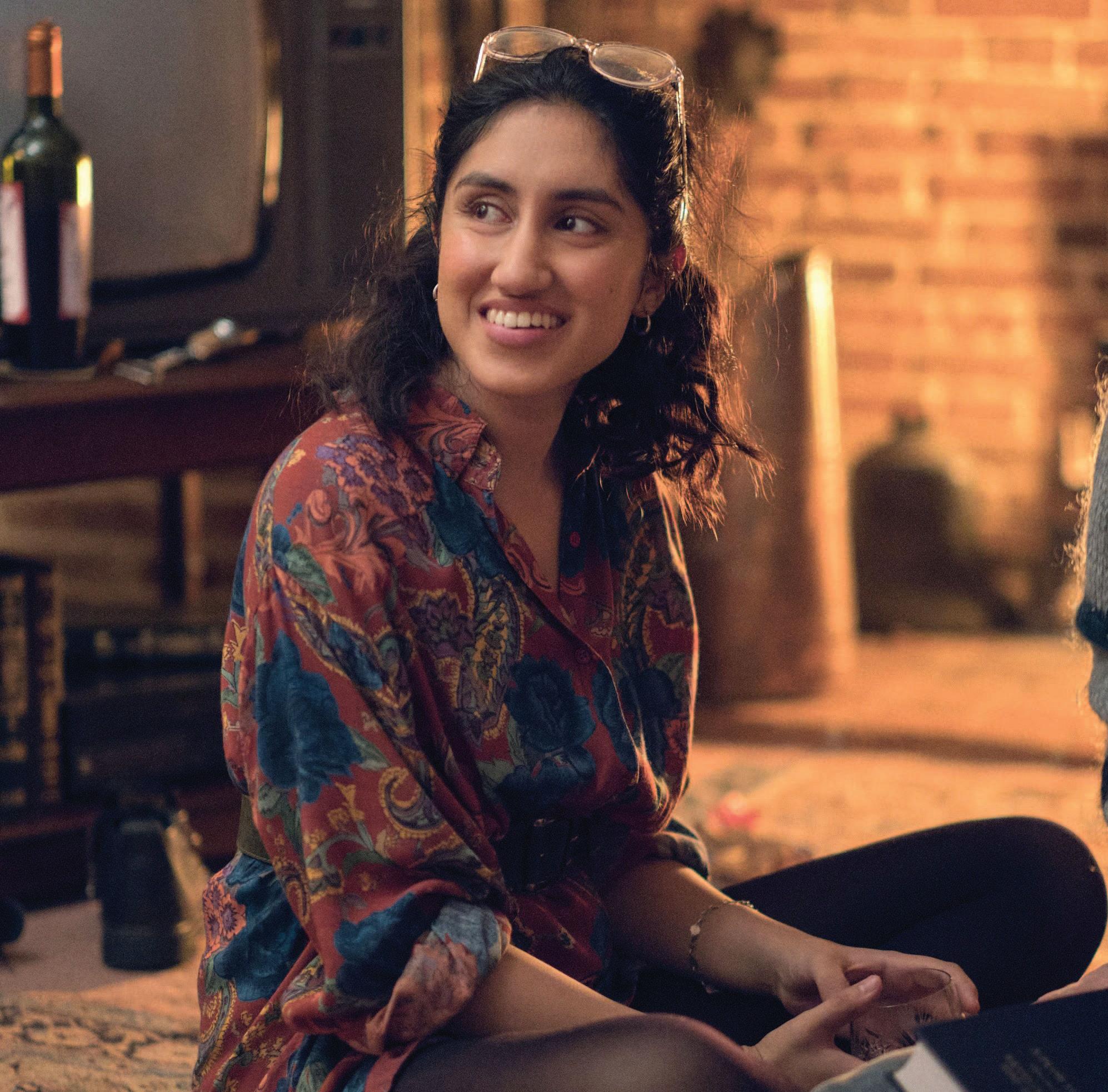
How has life been since the release of One Day?
It’s really mad, to be honest. I had an idea it would be big because it was on Netflix, but I didn’t think people would connect to it the way they are. I don’t want to sound self-important, but the goal is for people to respond to your work, and I’m glad people think
we’ve done justice to the book. I’ve also been learning to set boundaries lately. With a show like One Day where people are so emotionally invested, as an actor sometimes people assume they have a bit of you. There are certain times people ask for photos and I do say no. No one really teaches you this stuff, and it’s personal to
everyone, but yes, I’ve been figuring out the public-facing side of it.
How has being a person of color in a story that previously portrayed white characters impacted you? The color of my skin has been a massive part of the discourse when I was doing press for this show. [Prejudice] can be such
a subtle but insidious double-edged sword that most people wouldn’t even notice it. When people talked about my white co-star [Leo Woodall]’s performance, they would often talk about his acting and the quality of his work, whereas with me—not all the time—it was about how amazing it was that I’m brown, and what a change-making casting choice it was. I would think, ‘What about my performance and my work?’
I would say my being British actually informed my experience of playing Emma Morley more than my being Indian, although I wouldn’t completely erase it from the equation. I feel very privileged and passionate about talking about representation, but on the other end of the spectrum, I’m here to do a job just like my white counterparts, and I want my work to be appreciated and reviewed in the exact same way. It’s been challenging because people just aren’t ready to see people who aren’t beautiful white women on screen. I also saw that it wasn’t just me, they tear down anyone who doesn’t fit the norm that has been fed to us by this industry for so long. It’s a larger internal problem, but it’s not my problem to fix single-handedly.
Do you feel like there’s an unspoken pressure to speak for all brown people in a way? Absolutely. I think that is, sadly, the reality for many people of color. Anyone who feels that their identity is marginalized isn’t meant to be a spokesperson for a much bigger group of people. I would never have thought to be the same as any South Asian girl who comes up to me in the street and says, “I love Emma, watching One Day is the first time I saw a South Asian girl in this way.” I’m so glad they had that experience watching the show, but I also recognize that they are their own person.
So why do you personally love Emma?
28 DEADLINE.COM/AWARDSLINE LUDOVIC ROBERT/NETFLIX
Anyone who knows the book knows that One Day is Emma’s book. The trope of the heroine in the rom-com genre is either the Manic Pixie Dream Girl or the woman who changes herself for the man or gets a makeover. Emma knows her best qualities are her intelligence and her wit, and she uses that. She never dumbed herself down. She never made herself small. In the beginning, she lacks confidence, feels like an outsider, and she’s the underdog in a lot of ways. I think that’s why Emma being played by a woman of color ultimately adds complexity to her role. But I love her so much because she grows into her own person, and she doesn’t grow in relation to Dexter. Their relationship is really important to her life on a grander scale, but in the day-to-day, this is a story about growing up. This is so cheesy, and I hate saying this, but Emma is very much the hero of her own life.
Dex and Emma embody the popular concept of ‘right person, wrong time’. Do you think if it was the right person, there wouldn’t be a wrong time? No, I think timing is everything in relationships. The likelihood of two people being in love with each other at the exact right time, being ready for that love at a time like that, almost seems impossible. I’ve always believed in ‘right person for right now’—if there’s a person at all—rather than this idea of an eternal love. Emma and Ian turned out not to be right for each other in the long run, but they were in the moment they met. There’s a lot of judgment around Emma and how she waited for Dexter and decided to take him back. These are two very specific characters with specific lives, and the show doesn’t claim to comment on what love should look like. This is just David Nicholls’ story.
Emma works at an assortment of jobs before finding her calling
“This is so cheesy, and I hate saying it, but Emma is very much the hero of her own life.”
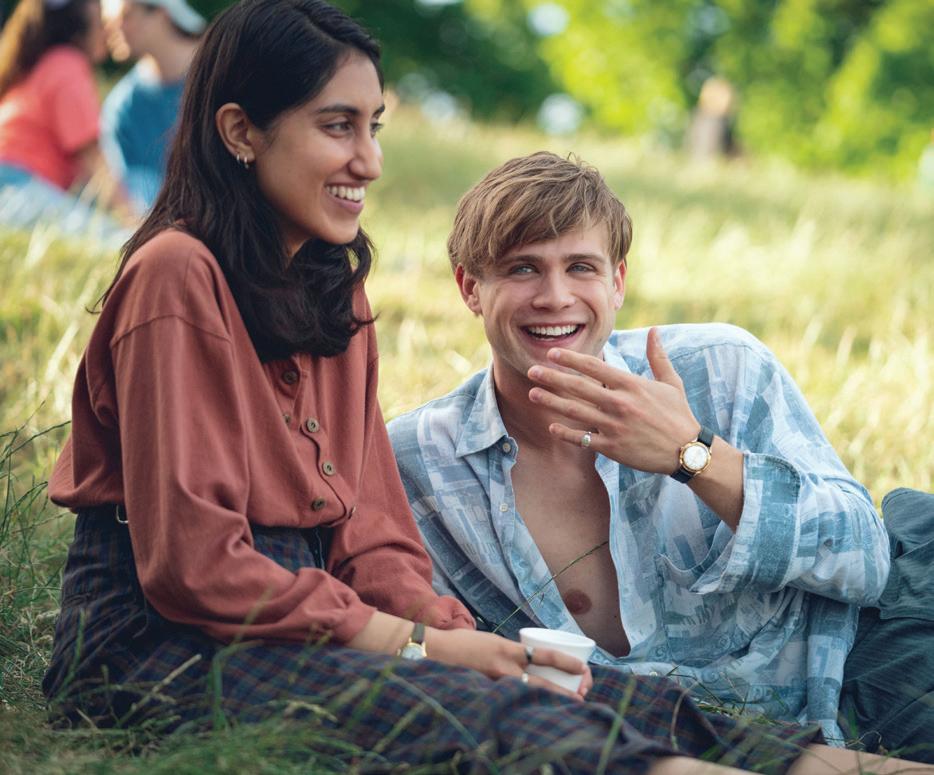
to be a writer. Did that remind you of your own time working at John Lewis and Condé Nast before your big break? I drew on a lot of personal experience, for Emma’s early days especially. There’s the whole thing of wanting to be a specific kind of artist but feeling like you are a tiny fish in a massive pond—she doesn’t have money, she doesn’t have connections, she’s not white, she’s not probably considered conventionally attractive. That’s definitely something I relate to, especially because she probably has to work her arse off to get a fraction of what someone like Dexter is given free of charge.
In my early 20s, I would wake up at 6, work a full-time job, go to a gig, be home by 11:30, and do it all again the next day. On the weekends I would be writing, and I went to the Edinburgh Fringe Festival every summer. I honestly don’t know where I got that energy from, because I could never do that now. I was just fucking ambitious, I suppose.
There’s a real liberty and shamefulness in life, to being young and wanting something so badly. I look back and the sheer determination of it astounds me. My career is the most important thing in the world to me, and I thought, ‘If I stop, I’ll stop [for good],’ so I just kept going.
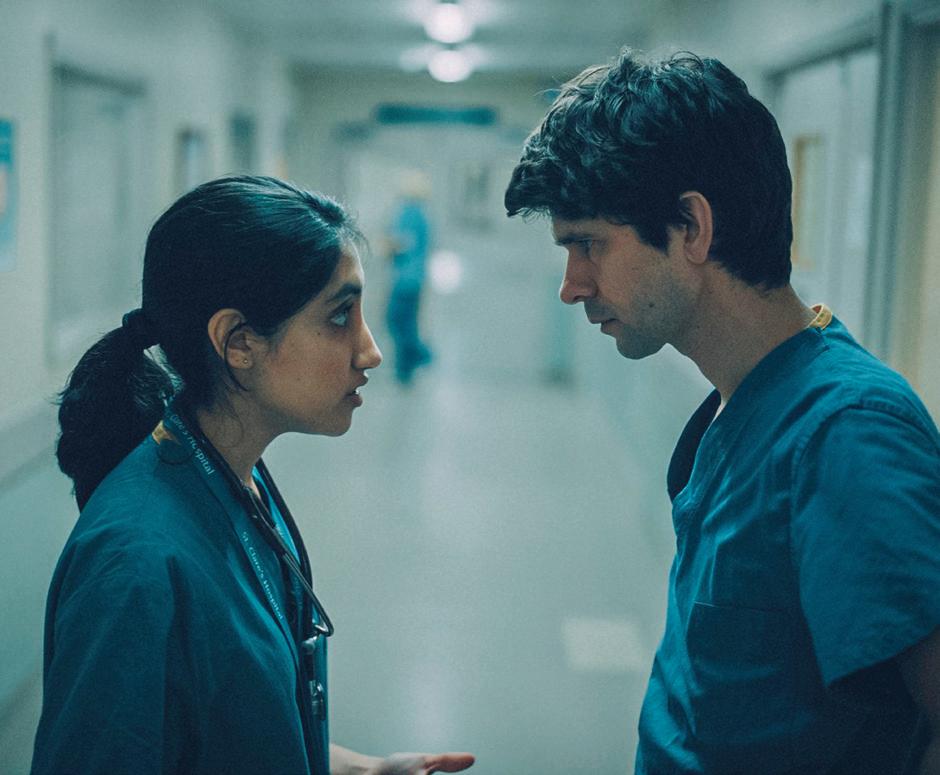
How do you think your comedy and improv background has informed your acting? Even if somehow I end up doing the most serious film that there ever was, my comedy training will inform it in some way. I never want to stop performing live comedy, especially improv, because it teaches you that you can fail. I remember shortly after This Is Going to Hurt came out, I was on cloud nine. Then I did an improv gig and we died on our arses. And I thought, “Oh, we can still fail!”
Comedy has also given me good instincts. On One Day we would be shooting 10 pages of script in a day, which is unheard of. There would rarely be time to go home after a 16-hour day and dissect 10 more pages, so I would just have to trust my instincts and my connection with my co-star.
What scenes were hardest to shoot for One Day?
There were so many scenes that I read and thought, “I’m just a comedian, who do I think I am to be doing these heightened, dramatic set pieces?” From my perspective, the argument on the street in Episode 7, and the breakup with Ian in Episode 8 were the hardest because they were
so emotionally pivotal to Emma. These were the last episodes before we see her transform into a grown-up, realized woman, so it felt really important to get right. The maze scene in Episode 10 was almost 30 pages long, and we filmed it in a freezing, damp warehouse in West London. You can’t see it, but I had UGG boots and leggings on under my dress. We shot the whole thing in two days, so we had to know our stuff. A lot of the show was honestly like doing theater, in a way.
Where do you see your career going next?
My next project is Playdate with Jim Sturgess, who played Dex in the One Day movie. He was quite supportive of the show actually and texted me that he enjoyed watching it. I would love to do something chaotic and absurd and off the wall to show a side of myself people aren’t used to. At this point in my life, I want to feel the same way about my next project as I did about One Day, where I’m playing a meaty, interesting character that exists in her own right. That’s set a very high bar, and I’ve been very lucky to have that so early on in my career. I’m in no rush, but I am ready to find the thing that excites me again. ★
29 DEADLINE.COM/AWARDSLINE NETFLIX/AMC/SISTER PICTURES/BBC STUDIOS/EVERETT COLLECTION
From left: Ambika Mod and Leo Woodall in One Day; Mod with Ben Whishaw in This is Going to Hurt
Riley Keough
How the real-life murder of a Canadian teenager by six of her peers in 1997 inspired Under the Bridge
BY ANTONIA BLYTH
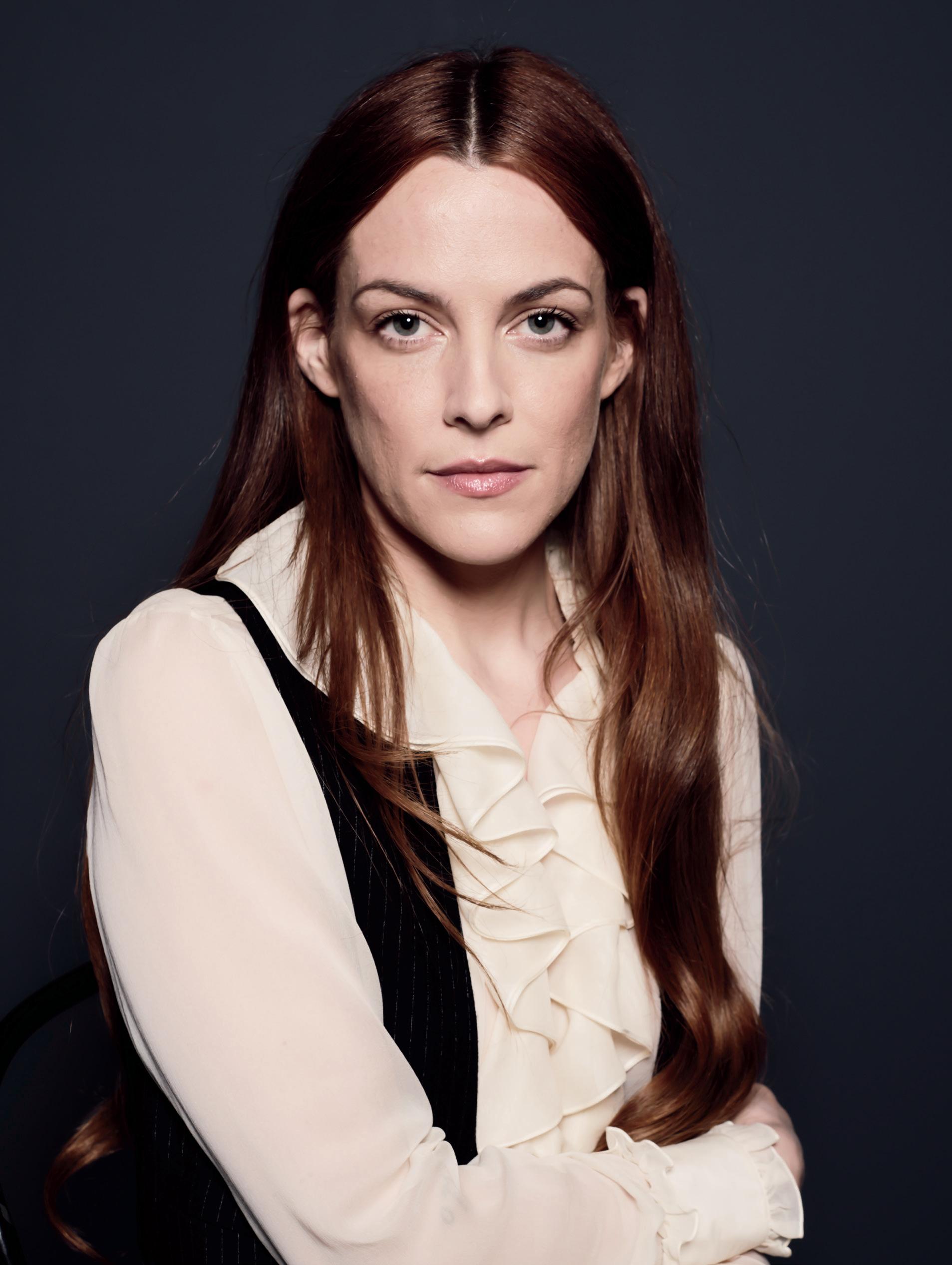
In Hulu limited series Under the Bridge, adapted from the book by Rebecca Godfrey, Riley Keough plays journalist Godfrey, as she returns to her hometown to look into the real-life murder of a local girl, 14-year-old Reena Virk. Opposite Keough, Lily Gladstone stars as investigating police officer Cam Bentland, with whom Godfrey has a complicated history. Here, Keough explains how together, the actors explored Godfrey’s “radical empathy” around the murder, and how Keough and her producing partner Gina Gammell collaborated with creator Quinn Shephard and showrunner Samir Mehta to tell a complex and nuanced story.
Rebecca Godfrey is such an interesting writer and tragically she passed away before Under the Bridge got made. How did you come to understand who she was? Yeah, she’s incredibly fascinating. Well, first I hadn’t heard about the story or Rebecca, and I hadn’t read her book when I was approached by Quinn and Samir. And then I got the pilot, and I got the ‘bible’, so to speak, and then the book as well. And I was a little bit apprehensive, because when you just get the
30 DEADLINE.COM/AWARDSLINE
MICHAEL BUCKNER FOR DEADLINE
one line true-crime story about a missing and murdered girl, for me, I was a little like, I don’t know if that’s something I’m particularly interested in doing, because I’m trying to be thoughtful about what I put into the world in my art more and more as I get older. I think that there are many [true crime] stories that are really important, but I think the way in which they’re told can be problematic. Quinn had put loads of files into Dropbox of her diary entries and her writing, and I just got a little bit more of an insight into Rebecca as a person. I just really could relate to her desire to go further and deeper into something than most people wouldn't have, and searching for truth in a way that feels a little bit reckless, but ultimately was really brave. I think that there were issues with her book. It was problematic in the sense that it wasn’t really about Reena’s life. So, I think that that was something that Quinn and Samir took into consideration… and Rebecca was OK with that, and I thought that was very cool. She was OK with not being the hero of the story and with her work being questioned.
I felt like she was on a journey that was about this thing, but it was also very internal. And I think that’s where there’s a line that becomes potentially selfish because you have this woman who’s basically inserting herself into a very tragic situation by choice, which is very privileged. And so, I just find it fascinating. I’ve also similarly thrown myself into situations looking for something,
some deeper meaning, a deeper understanding of the human condition and human nature, and in questionable situations myself. I really liked that that was a way to explore the genre in itself.
True crime can feel exploitative, but this is, to me, something different, since we’re seeing it from Rebecca’s viewpoint of “radical empathy”. There’s no black-andwhite solution offered.
In the conversations that I was having with Quinn and Samir on our first meeting, I was like, “I am not a black or white person. The conversations that I want to have about these things are complex, and if I’m going to do this show, I want to be able to have those conversations as much as we can in a way that people can tolerate.”
I think that when you’re dealing with children, people are able to have those conversations more than they are with adults. It’s complicated. I think the show does a really good job at making them all human individuals who are real people, and then you can really explore something when everyone’s a human being. No one’s being used as a device to shove some kind of message or be didactic.
You’re also an EP on the show. Tell me about collaborating with Quinn and Samir in that sense.
It was really inspiring because they’re a unit and myself and Gina [Gammell], my producing partner, are really close as well. We’re best friends and also work on everything together.
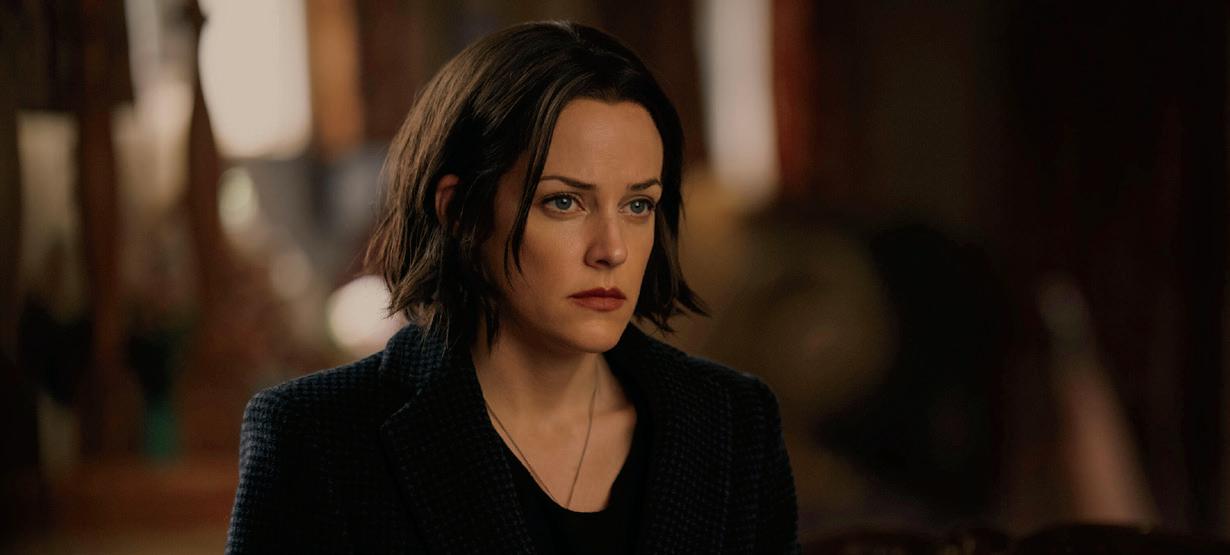
We directed War Pony together. We write together, she runs Felix Culpa, our company, and we’re also very strong, opinionated people. They were so collaborative, and it was our first television show that we’ve produced. And so it was a very fruitful and interesting collaboration. There were a lot of really nuanced conversations. We were constantly having to ride these lines of non-judgment and just honesty and go, well, if Rebecca says this in this scene, that makes her stance this. There were a lot of more profound and interesting conversations in the collaboration than I’ve had on other jobs, because we all had the same agenda in the radical empathy approach and in the approach to humanize all the individuals involved.
You physically resemble Rebecca on the show, but it’s a delicate balance playing a real person, especially one who is also no longer with us, right? It’s really tricky. I think that Rebecca had wanted me to play her, and knowing that actually weirdly allowed me a freedom because she felt connected to me in a way. I wasn’t actually trying to totally mimic Rebecca, I was playing her from this place of where we both can meet in the middle a little bit, where I relate to her in a way. That felt right to me. I just felt like she trusted me. Of course, I hope that she would’ve approved of it all.
Have you been able to speak to her family about playing the role?
Quinn was my main source because Quinn had done all this work [directly with Rebecca] already, and also Quinn’s a writer and an actor. So, she had all the information, she knew Rebecca, and then also was able to, in the moment on the day, go, “This isn’t feeling totally right,” or, “Maybe she would feel more like this here?” So, I had this wonderful resource in Quinn. And if it was
feeling way off, then I think Quinn would be able to steer it back. I did meet Rebecca’s husband and her daughter who came to set, and they’re just wonderful. And I’m sure it was a really challenging experience for them to have me dressed as Rebecca. But I think ultimately, they were very happy that she was being honored and that it was being made.
How did you and Lily Gladstone build the dynamic between your characters?
Well, we didn’t rehearse, so it was a lot of on the day talking about the scenes before we shot them. The scenes with Cam and Rebecca are just always a little complicated because their relationship isn’t totally clear. There’s not a really clear formula. So, it was nuanced and just figuring out, where are we at this point? How are we feeling in our relationship? It was one of the more complicated relationships on the show, where you’re going, why are they here? What are they doing with each other? What is the agenda? Is this love? Is this trauma? I think that I enjoy playing those more complicated, more real beats.
Has making the series changed the way you look at crime or extreme behavior?
I think I’ve had a lot of life experience that has influenced my feelings on those things. I’ve spent a lot of time with people who have been convicted of crimes. I’ve had a lot of experience in that space and the justice system. All of these topics are something I was previously interested in. And so, I think that for me, it’s more like that the show is maybe reflecting things that I already think about a lot. And that was also similar to Rebecca. She essentially had this relationship with [one of the perpetrators] for a very long time, and I think that that could be a very controversial thing, but I think that ultimately, she was just looking for empathy and humanity. ★
31 DEADLINE.COM/AWARDSLINE
DARKO SIKMAN/HULU
Riley Keough in Under the Bridge
Walton Goggins
The Fallout star on how his backstory as Cooper Howard influenced the nature of The Ghoul
BY RYAN FLEMING
Walton Goggins often portrays characters who transcend time and place, whether in modern day Kentucky, like in FX’s Justified, as career criminal Boyd Crowder, or in Civil War-era Wyoming in Quentin Tarantino’s The Hateful Eight, as plucky sheriff Billy Crash. In Fallout, though, he goes further: as The Ghoul, he is 200-yearold apocalypse survivor Cooper Howard, once a favored Western movie star, now a mutant bounty hunter. The two halves of this character combine in a captivating performance for which Goggins was happy to endure a torturous prosthetic.
How did you get involved with making Fallout?
It started with a conversation actually, a Zoom call, with Jonathan Nolan, Geneva [Robertson-Dworet] and Graham [Wagner]. The three of us got on the phone about eight months before we started shooting, and they just told me about this story that they were making and this role that they wanted me for, and we just really started breaking down exactly what the story was about and how they wanted to approach it.
And right out of the gate, maybe two minutes into the conversation, I did say that I was in, no matter what. Geneva’s an old friend of mine and maybe there is no bigger fan of Jonathan Nolan than me, and I’ve been a fan of Graham’s for a really long time too. And it was only after saying I was in that they said, “Well, don’t you want to know who you’re playing?” And I said, “It doesn’t really matter. I’m in.”
And they said, “Well, you’re going to be playing a noseless, irradiated ghoul,” and I said, “You know what? Maybe I should read those scripts. Yeah, maybe that’s a good idea, and let’s talk afterwards.” I
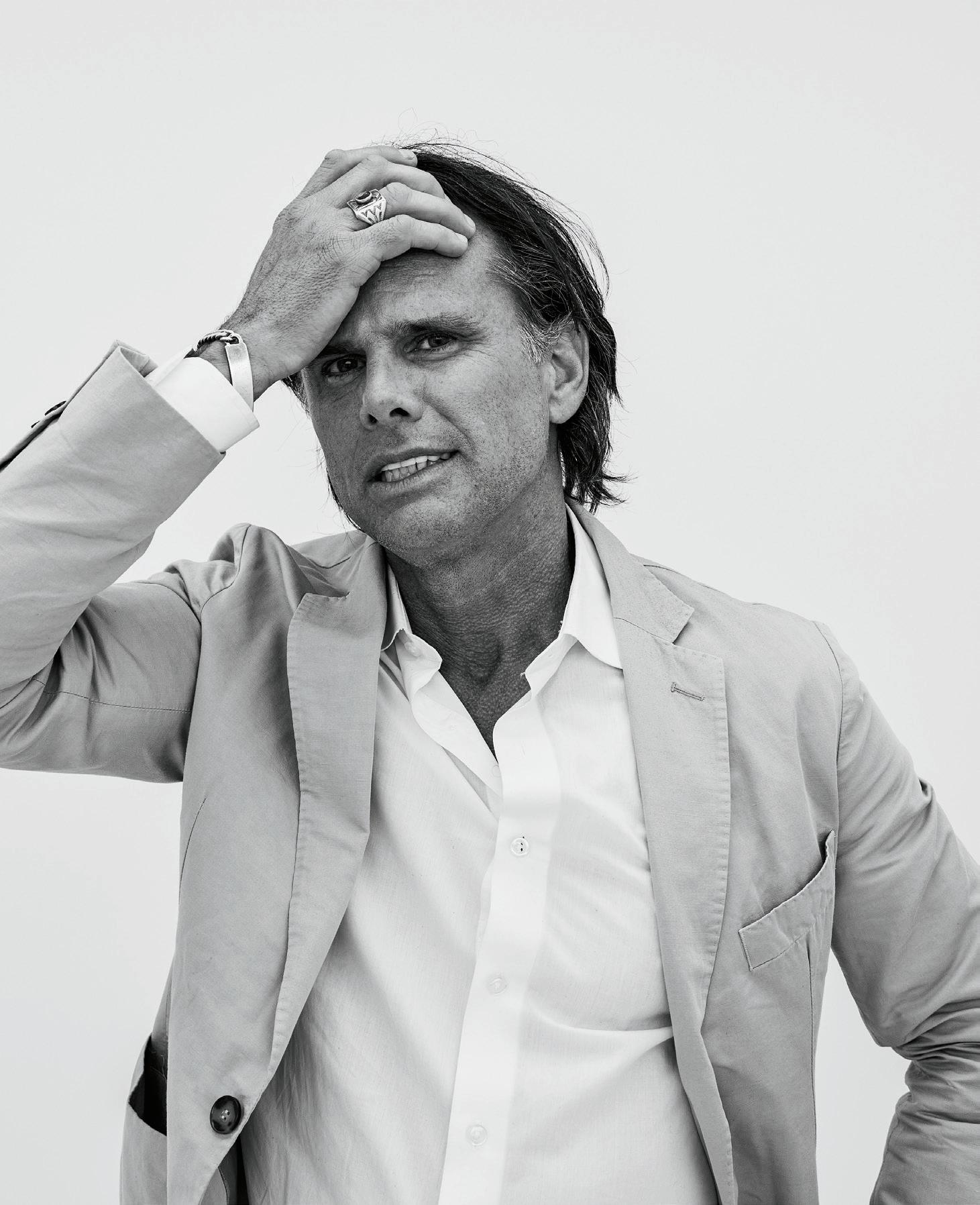
say that because that’s what happened, but, really, it began with a conversation, and it was a great conversation right out of the gate. I was working at the time, and I hung up the phone with them and read the first two scripts, and I couldn’t put them down. I called them back and I said, “Yeah, I can’t live without this. I’m in.”
And were you familiar at all with the Fallout video game series?
I had heard of it. My son is a gamer but I’m not. He’s a big fan of [developer] Bethesda Games, so I had heard him talk about Fallout. But I had never played the game myself, no.
So, were you aware of what the ghouls looked like in the games?
I’m curious how much of a surprise those prosthetics were. Well, I had no idea what a ghoul looked like. Leading up to this meeting, it was a few days in the setting it up and they just said “Fallout”, so I went online and began reading about the game. Whatever article came up first in my search was about a guy leaving a vault, so I’m thinking, ‘Wow, that’s really interesting. That’s obviously who they want me for,
the Vault Dweller that’s coming out into the world, of course.’
I didn’t get far enough into the article to realize that ghouls were a part of this world and learned very quickly that it was not that role. It was something completely different. After we hung up, the first thing I did was Google “ghoul Fallout” and thought, ‘Wow, OK, we’re going to have to spend some time in the chair on this one.’
How long did it take for the prosthetics designers to get the right look for The Ghoul?
Well, I’m going to say we talked about it for three months before we did the first application. There were many conversations back and forth about, what is it that we’re looking to elicit from the audience? What limitations can we live with for me as an actor, and how do we want me to be able to communicate to the audience? We didn’t want to lose his humanity, but he needed to carry the weight physically, in his physical appearance, of living 200 years in an irradiated landscape. The emotional scarring as much as the psychological scarring and the physical appearance, they all dovetailed into each other.
I’m going to say it took us three months of talking back and forth, a lot of different drawings predicated on the game, and then Vincent Van Dyke, who created the piece, along with Jonah [Nolan] and Geneva and Graham and myself, just began going back and forth on, how do we want the audience to relate to this person? All of us universally agreed that we didn’t want the audience to be repulsed by his appearance. We wanted them to lean into this experience with him and want to study his face and to understand what’s hiding in his face, what’s hiding in plain sight, and for that to be almost another piece of the story in and of itself. By the time we did the first application, we were pretty close, we were probably 80% there, and we did it two more times after that. The first time we did it, I put it on, and it took about five hours to do it. My dear friend Jake Garber, who’s one of the best special effects makeup people in the business, put it on, and then I just asked to be left alone really for about an hour and a half, and just walked outside and took a lot of video and looked at it in different lighting to understand what was
32 DEADLINE.COM/AWARDSLINE JOSH TELLES FOR DEADLINE
possible with it. What are people seeing and what aren’t they seeing? How am I going to have to modify what is normally my instrument? Can I do that? So, there were a lot of those questions. And I don’t want to alter my imagination. I’m not going to over-emote. I don’t really even know how to do that.
We kept working with the pieces, and Vincent made them thin enough where you know that it’s me and you can see my face and you know what he’s thinking just by looking in his eyes.
At one point, we talked about using contact lenses. I went to the doctor and we had them made and put them in, I think, the very first time we did the first application, and immediately, we all looked at it and said, “This isn’t right. All of a sudden, you become non-human. We have to see your eyes.” And so that was a big part of it right out of the gate.
I’m always curious about being able to show emotion easily with prosthetics. Was it difficult to act with the prosthetics on?
Well, I was deeply insecure the first couple of days we were filming, and after every take, I would look at Jonah and say, “What’s happening here, man? Do you understand what it is that I’m saying, what’s in my heart, what’s in my head?” And Jonah said, “You’ve got it buddy. We see it all. Everything is right there. It’s all in your eyes, Walton. Just you do your thing. You will effectively communicate whatever it is that’s going inside of you and going on inside of him.”
So, after two days of hounding him with this question, I finally just relaxed into the process and didn’t try to alter whatever it is that I do for any other movie or television show that I’ve been involved with. It’s just live and hold up a mirror in nature and try to be as honest as you possibly can and trust that the story you’re telling will be told. Initially, I thought, ‘Oh my god, I’ve got to put some extra spin on this,
or make this bigger, or gesticulate more, or something like that,’ and I am incapable of doing that as a storyteller. I don’t think it would’ve worked, and luckily for me, the audience was able to understand what was going on in my head.
When you started working on Fallout, what interested you about this dual character of not just The Ghoul, but Cooper Howard as well?
The first script that I read started with Cooper Howard. The whole scene about the dropping of the bombs was from his perspective, and the relationship with his daughter was set, really, from the very beginning. And it was the first literally seven or 10 pages of that script where my heart was in my throat, and I just understood who this person was, what he must have gone through in that initial reading.
And as the story progressed, The Ghoul was introduced and The Ghoul was an even a bigger part of the first episode, and then they reconfigure things the way that Jonathan likes to do. I was just taken with the person that I read on page one and the person that I read however many pages later, and I thought, ‘Wow, what an opportunity to go from this person to this person, and fill in the details of what happened in between in his life.’ I thought it was a very unique opportunity to go from an optimistic, fully-fledged human being, to a cynical fraction of a human being who has absorbed all the pain and the devastation of the world that has experienced a nuclear fallout.
I knew The Ghoul was cool. He’s a cool guy. What I didn’t know when we first started, when I read it for the first time, was how cool Cooper Howard is, and where he comes from. And I won’t tell you about his upbringing because it’s personal, but when he came to Hollywood he was a stuntman in my imagination. He was working for a director, and they were looking for someone to step in because this actor didn’t show up,

and they just liked being around Cooper. They liked the way he talked, and they said, “Here, could you say a few of these lines over there?” And he was natural, not because he wanted to be an actor or didn’t want to be an actor, he just wanted to be in the movie business, and he was effortless the way that he is in his life, effortless in his love for his daughter and his relationship with his wife. He has a very specific set of morals coming from where he came from, and there’s just an easiness about him. I was so surprised, and genuinely heartened by how secure he was as a human being, as Cooper Howard, and the relationship that he has with his wife and with his buddies and his house, and the way his house is decorated and even how he walks down a staircase. It’s just without errors, isn’t it? It’s infinitely approachable. He says what he means and he means what he says, but he does it with a smile, and I just love him. I love being Cooper as much as I love being The Ghoul.
Cooper definitely has a great story in the series as he is learning about Vault-Tec. He’s not really changing, but he’s starting to realize there are things he should be more aware of.
Yeah. And I don’t think he is overtly political, but I don’t think that he’s apolitical either. I think he is a person that served his country in war, and he’s blue collar, comes from a middle-class, upper poor-class family, and he has a practical, reasonable approach to the world. He’s dependable and sensible, and so that carries on, obviously,
into his relationship with his wife. And then, when things aren’t adding up and he looks at how the world is changing around him and the way in which Jonah wanted to explore that in this version of this Fallout story, his eyes are just being opened wider and wider as time goes along. He is exposed to an ideology that he fervently disagrees with, only to have it sow the seeds of doubt in his own beliefs about the world and how the world works.
And then you start to see flashes of Cooper Howard coming through into The Ghoul as the season goes on.
When you read about The Ghoul for the first time, on paper, one can think, ‘My god, he is sadistic, what he’s putting this poor Vault Dweller through.’ And as the story goes along, hopefully, at least that was my intention, because I think that’s the story, [you understand] that it isn’t personal. It only becomes personal as he gets to know her. But she is just another experience in his day of walking the wasteland, and he doesn’t have any bad feelings towards her. He doesn’t have this harmful intent, like, “I’m doing this to hurt you as a person because you have hurt me in some way.” It’s just practical day-to-day survival in this environment. And in some ways, that’s even scarier, isn’t it? It was to me. It’s only after he’s confronted with, yet again, his own mortality, that he has to think and recalibrate his plan, or his day is fucked, as they say, and he has to change course.
What direction do you want to see both of your characters go in Season 2?
Where I would like it to go? I want to keep that a secret. It’s very complicated in my mind, and I think for everyone involved, and it feels like we’re at the beginning of something. We haven’t finished the beginning of this experience, and there’s a long way to go and a lot of story to be told. ★
33 DEADLINE.COM/AWARDSLINE JOJO WHILDEN/PRIME VIDEO
Fallout
Sofía Vergara
The Griselda star on playing Colombia’s real-life cocaine godmother: “She hurt many, many lives”
BY CARITA RIZZO
It took nearly 15 years for Sofía Vergara to land Griselda at Netflix, but when it was finally time to step into the notorious Colombian drug lord’s heels, the Modern Family star was filled with doubt. “There were a million things that I was nervous about, mainly my performance,” she says. “This was my first time acting in Spanish, my first time doing drama, and I was nervous if I was going to be able to convince people that it wasn’t just Gloria Pritchett with a plastic nose.” To Vergara’s delight, the reception has been nothing but effusive. “It’s a risk to do something like this, because you never know,” she says. “To realize people actually love it, it’s a gift.”
Reading some of the reviews, one in particular said you had ‘outof-left-field gravitas.’ I would assume that you wouldn’t enter a project like this if on some level you didn’t think you could do it. Is there a sense of being underestimated as an actor?
No, you’d be surprised. My whole life I’ve done things that I’m totally sure I’m not qualified to do, but I don’t like losing opportunities. When I see an opportunity, I’m
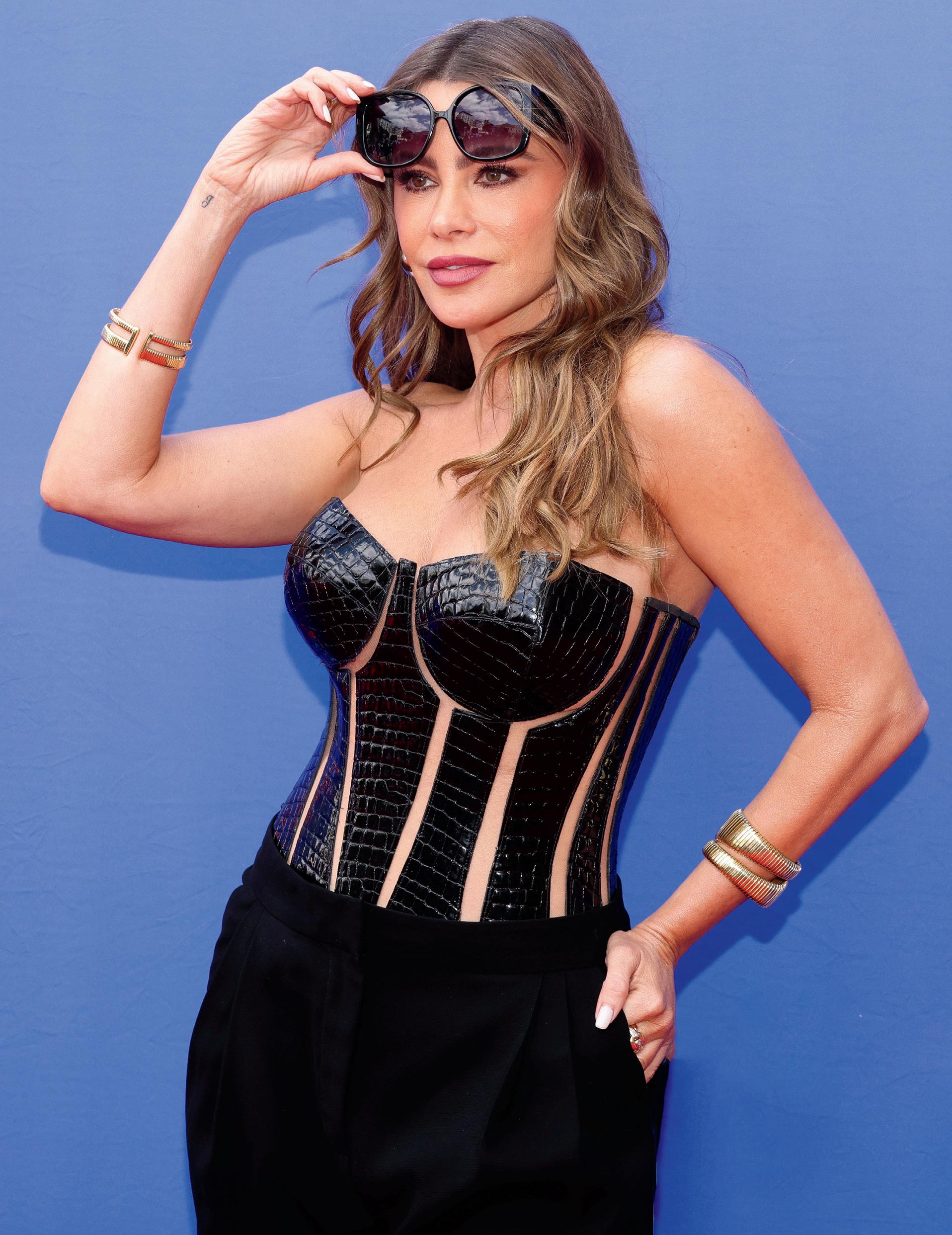
34 DEADLINE.COM/AWARDSLINE
VICTORIA SIRAKOVA/FILMMAGIC
like, “You know what? I’m going to try it.” I don’t think my job is like a brain surgeon’s, where you’re risking somebody else’s life. The worst that could happen is that you don’t make the money you thought you were going to make, or people are not going to like it. I knew that I knew that character so well, because of the way I lived in Colombia during the ‘70s, ‘80s and ‘90s, when narcotraffic was booming. That’s the thing that really made me feel like, “I think I got it.”
When you set out to make this series, what was it you wanted to say about Griselda Blanco?
As a woman, she fascinated me, because I knew these characters from Colombia. They were household names: Pablo Escobar, the Rodríguez Orejuela [brothers], who are the biggest narco guys in the world. But I never thought that there would be a woman who would be able to rise to the level of these guys. There were women that were laundering money for them or being mules, but never a big, big boss like her. It was very tricky [playing her], though, because I would find myself sometimes rooting for her, thinking, “Wow, it’s amazing that a woman was able to do that,” and I had to check myself out of it, like, “Listen, at the end of the day, this woman was a fucking serial killer, a sociopath, and she hurt many, many lives.”
What have you made of the public’s reaction to your Griselda?
I’ll tell you this, I was so surprised, because we did a press tour all over the world and when we got to the premiere in Miami—there were like 400 people—I was fucking in shock when every time that she would do something horrific, people would go crazy. They’d clap and cheer. They wanted her to get away with shit. It was super crazy. So, to me, that was a big, big reassurance that I was able to do what I always thought I wanted with the character. I always thought of her like Tony Soprano. I wanted
people, even though it’s a bad guy, to relate to her, like her and root for her.
In terms of her physicality, I assume the aim was not for you to look exactly like her. What was the goal of your transformation?
We didn’t have time [for me] to look like her, because we only had three hours [a day] for my transformation, so we needed to think about that. If I was going to look like her completely, that would’ve taken a significant amount of the day. It was complicated to figure out how she needed to look. I wanted to look like a woman you would believe was able to marry three times. There was some kind of sensuality and sex appeal to this woman. And I wanted to disappear. I didn’t want people to think, “Oh, that’s Sofía,” and that was my major concern.
I heard the prosthetics were difficult to act in, but as an actor, is there a freedom in not seeing yourself in the mirror when you’re doing something like this?
Yeah, it’s a lot easier. Even if I had not slept well or had eaten Chinese food, the next day I could be swollen, because you’re going to get into this weird-looking character. That was a little bit liberating. But it was also brutal, because I decided to do this weird walk. I didn’t want to walk like me with my boobs in the air and my jiggly ass, like a Latin woman. So, I would have a lot of pads on, and I figured out this walk that I thought was not very feminine. But when we were three months into it, one day I couldn’t get out of bed. My doctor got crazy. He’s like, “You can’t walk in a different posture like that for three months at 50 years old.”
What did you do?
I had three more months to go, so they kind of injected me—I herniated a disc, actually, and now I have to deal with it forever—but I kept going.
That is such a commitment, to know that you are actively hurting yourself, but you have three more months to go. What makes it worth it?
I don’t think I had an option [laughs]. “Oh, shit. What have I done?” I had to do different stretches. I couldn’t just do what I was doing those three months. But I think it worked out, because that was one of the things that made her look different than me.
What was your biggest challenge in inhabiting her?
At the beginning, it was brutal for me because I’ve never done anything like that. Doing Modern Family, you’re on set, you’re happy, your thoughts are happy, you’re with your friends. Griselda was a monster. I would go home and I didn’t know what the hell was happening to me. Your body doesn’t know that you’re not really screaming and crying and doing crack and smoking 90% of the day. It was hard at the beginning. When I said I’m going to do all this, I wasn’t thinking, because I had never done it before. So, that took me a little while to get used to. I started to take a little bit of something to sleep at night, so that I could relax, because you have to get up super early the next day to go to work. I couldn’t just sit there in bed going crazy. I figured that out and then I started getting better.
Working with just one director on this series, Andrés Baiz, how did that inform you?
It was the best thing that’s ever
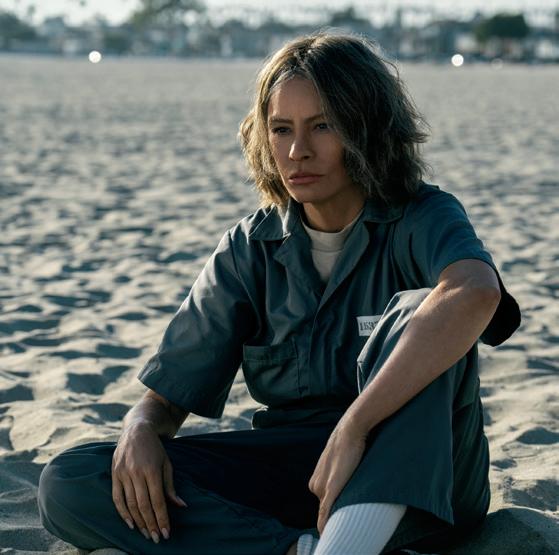
happened to me. I wanted Andy from the beginning, because I have seen his work. He’s Colombian, he could speak Spanish to me. I thought he was a genius and brilliant with all this stuff, and he helped me so much with the acting. I didn’t know if I was going to be able to cry on set or do any of the things I wanted to do. He guided me, and I would be like, “Andy, tell me, is it OK? Are you saying more or less?” And he would be completely honest with me. I love having someone to direct me, because I’ve never been to acting classes or anything like that. On Modern Family, I had Ed O’Neill helping me for 11 years, so I got spoiled.
What was the impact of being able to act in Spanish?
It’s so liberating. It’s so hard for me to act in English, because I have to translate everything all the time. It’s really, really difficult, and I realized that when I was doing Griselda. I don’t have to think. I just have to feel. And when I’m doing it in English, there’s no way I can disconnect my head from, “What’s the word that is coming?” or “Oh, no, that sound is not like that.” It’s crazy. Also to be on the set with actors that were speaking in Spanish and the director is speaking in Spanish, it was amazing.
Did playing Griselda open her up to you as a person?
The whole time I was just thinking of her like a woman that had good intentions, that it was all about her and her family. She didn’t have the tools to do anything else but what she knew, which was that. But then I realized that at the end of the day, she wasn’t really a good person. It was all about her. That’s what those kinds of people are. Even though it looks like they’re doing a lot of things for other people, it’s just about them and power. If someone like Griselda Blanco had taken the right road, she could have been the president of Colombia, instead she was the biggest narcotrafficker. ★
35 DEADLINE.COM/AWARDSLINE
Sofía Vergara in Griselda
ELIZABETH MORRIS/NETFLIX
Maya Erskine
From spy to samurai, the actor reflects on portraying badass women onscreen
BY DESTINY JACKSON
Though she struggled with a sense of identity in her youth, Maya Erskine is now right where she belongs, starring in two hit shows. From playing a fierce undercover spy in Prime Video’s Mr. & Mrs. Smith, to a roving warrior on a quest for vengeance in Netflix’s Blue Eye Samurai, Erskine's career goes from strength to strength. initially known for breakout cringe comedy PEN15, Erskine left behind her portrayal of the charmingly crude adolescence of a seventh-grade girl for the dangerous worlds of espionage and Edo Japan. Here, the actor opens up about identity, vulnerability and playing complicated women on television.
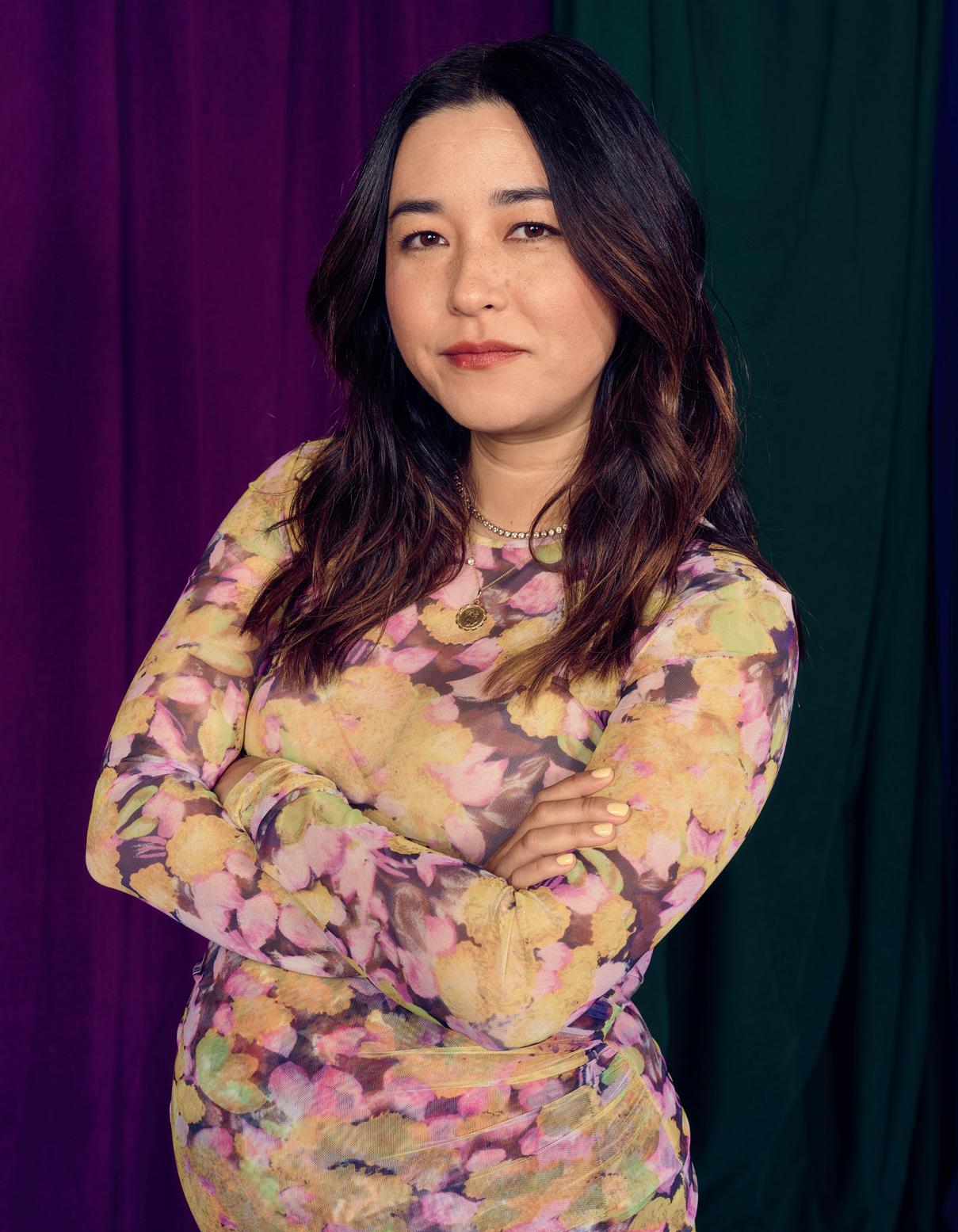
I read that you didn’t do a chemistry read for Mr. & Mrs. Smith. What was the process of being cast on the show?
It started with phone calls from Donald [Glover]. Carmen Cuba, the casting director said, “Can I give your number to Donald?” And everything was so esoteric. We just FaceTimed a couple times and towards the end of the FaceTime, he was like, “I’m working on this project,” and he described the pilot and tone but didn’t say what my involvement would be. I really didn’t know until the third call that I was potentially being asked to play Jane.
Was there a key physicality that helped you unlock your portrayal that differed from the film adaptation of Mr. & Mrs. Smith starring Angelina Jolie?
It was a couple things. One, I had just had a baby, so I had to get strong. My body was a total wreck, and I didn’t feel like I was in my body after birth. It took a long time to come back from that. So that was the foundation of becoming this character. I was like, “OK, get strong in the gym.” So that was step number one, and that made a huge difference. And then I think in terms of how Jane was different from the others, I think she holds herself up. There’s just a little bit more closed-offness in her. And so, in the physicality that’s represented, she’s not loose, she’s not in the moment. She’s very controlled. So that was a big part of my physicality that I feel like might have been different. And also, that she’s just completely a mess in a lot of ways too. She’s not a perfect spy. So, there was no pressure to get to Angelina Jolie’s status, because they’re not that. They’re just these people who happen to sign up for this job and get it.
Also, something different is the discussion of culture and race in Mr. & Mrs. Smith, which also bleeds into Blue Eye Samurai. Both shows center around biracial Japanese protagonists. How
did your own perception of race play into your experience growing up and your acting career?
There’s such a clear connection for Blue Eye Samurai because the show is all about dealing with being mixed race, which I am. But what’s interesting is that it subverts what you normally see. Because it’s usually a mixed-race person trying to hide their Asian part. I would be trying to hide my Japanese part, but she’s trying to hide the white part of her. And that’s something we don’t see all the time. Growing up in the States, I felt like I didn’t have anyone I could look at as “Oh you’re me, we look like each other.” I didn’t have that touchstone. And then when I would go to Japan, I wouldn’t be Japanese enough. So, there was no place for me to exist as just a person.
In terms of how it affects roles, I’ve always just felt like an outsider. So that’s how I’m drawn to roles and characters. Anytime someone doesn’t feel like they fully fit into the mold of society that’s my way in, that’s what I’m drawn to in stories. I do feel in Mr. & Mrs. Smith when they do talk about race, they’re also talking about how they don’t fit in in general. They’re not the perfect mold for these spies. In Jane’s life, I don’t think she ever had a sense of what her identity was. So, the whole show is her searching for that and finding her place in the world.
The couples therapy episode is quite a turning point for Jane and John’s relationship. It really encapsulates how different the two are. John is the far more emotionally vulnerable one, and Jane, while well meaning, is quite cold. What is your take on their dynamic?
I think their dynamic is interesting because they are both triggers for each other’s insecurities, but they are also good mirrors for each other to really show what the other person is like. And it's this weird, arranged marriage where if they met on the street,
36 DEADLINE.COM/AWARDSLINE
BUCKNER FOR DEADLINE
MICHAEL
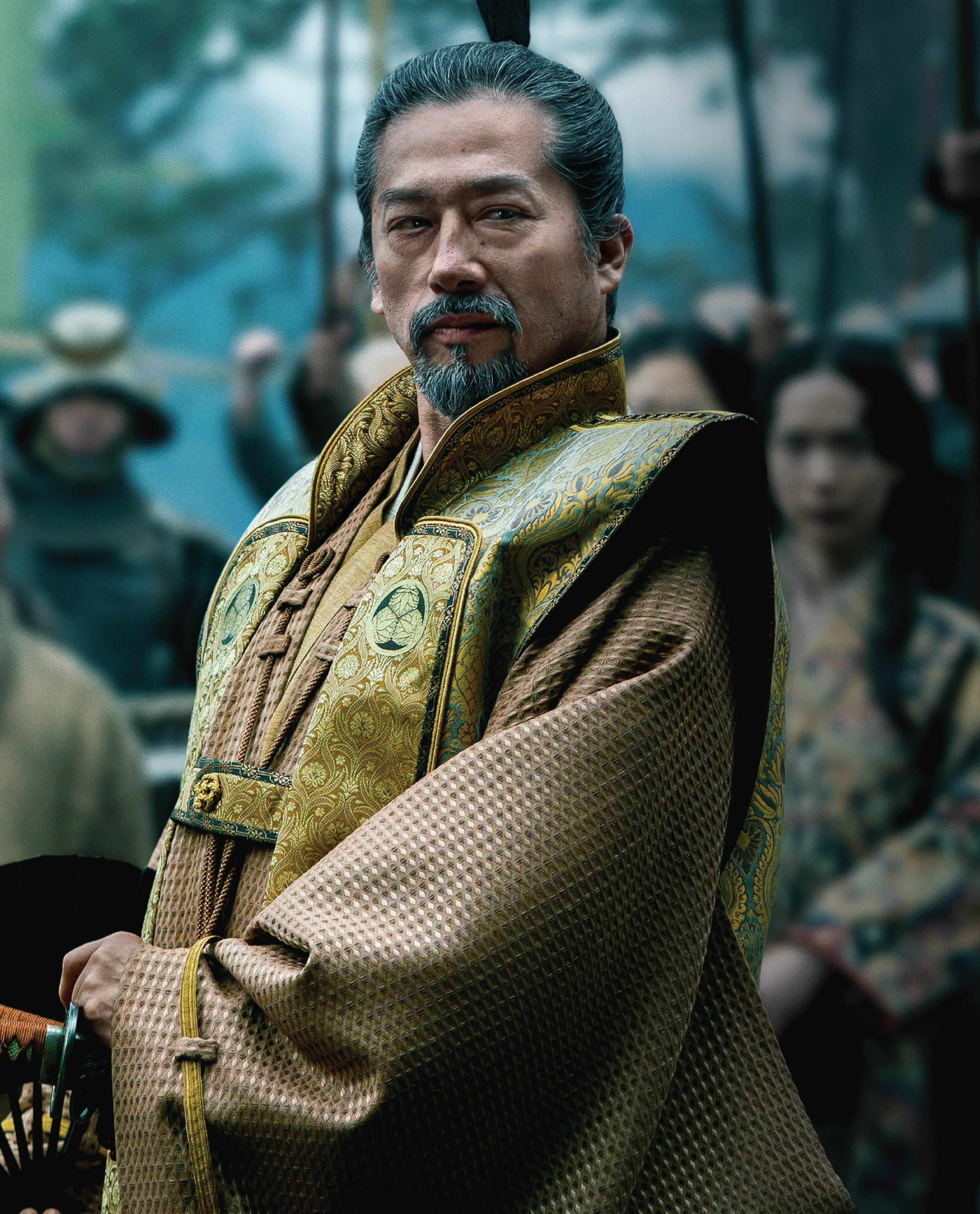









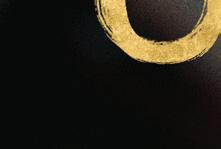

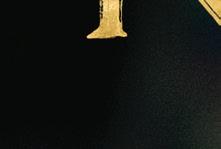





 HIROYUKI SANADA OUTSTANDING LEAD ACTOR IN A DRAMA SERIES
HIROYUKI SANADA OUTSTANDING LEAD ACTOR IN A DRAMA SERIES
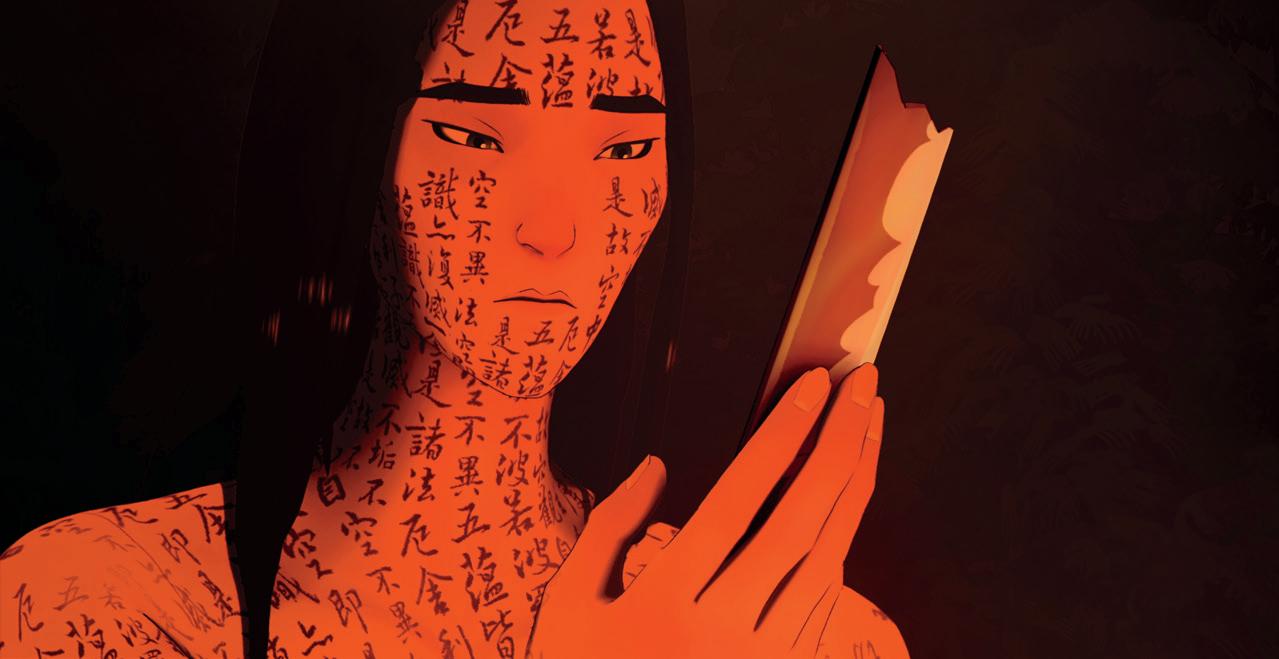
they would never probably date each other. But because they are in this situation, they do end up getting to know each other. And they may not be perfect for each other on paper, but they do form a bond where they build real trust, even though they’re lying to each other a lot, in the beginning. But they have to form trust because they’re putting their lives in each other’s hands. So, there’s real trust there. And in terms of their dynamic, I think that Jane isn’t good at showing her vulnerability. So, her guard is up a lot, and part of that guard maybe comes across as emasculating the other person, so that she can feel like she’s in control. And that’s obviously a big trigger for him. It’s interesting that they’re a couple that work together. That can be great. But there are so many dynamics that come up when you’re working with your partner; your pride, your ego, all of those things you have to wrestle with. In this version, Jane ends up being the one who is more successful, getting promoted on the side, while John cares less about that. Their dynamic mirrors relationships that are happening all the time without all the spy stuff. It’s done in such a great way, the way they wrote it against the spy backdrop, it makes the stakes weirdly relatable even though these are life and death stakes.
Speaking of Blue Eye Samurai, that also has some pretty high stakes. What’s so interesting though, out of all the other
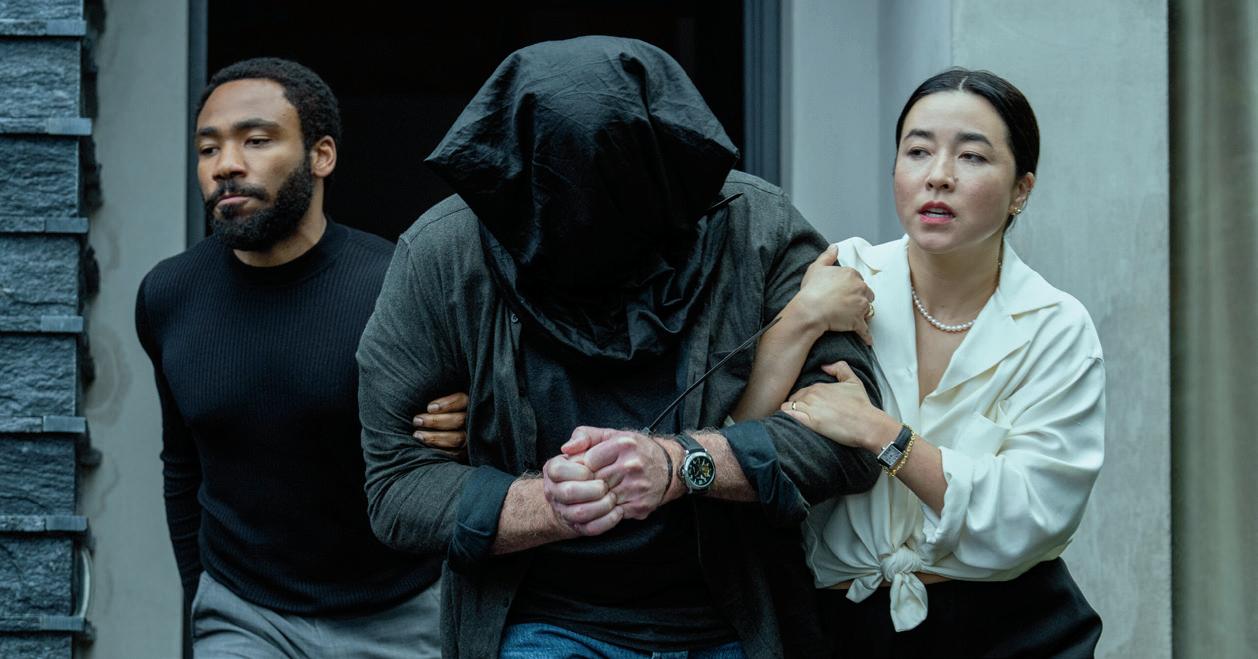
“It was vulnerable for me to try a role that was so different from what I was so used to.”
voicework you’ve done, this one certainly looks kid friendly, but it actually isn't at all. It’s got violence, nudity, swearing, spying. What drew you to it?
I love that this project was going to be me playing a character where I could really change my voice. That was an exciting challenge for me because I knew I couldn’t just sound like myself. I’d have to actually do work to make my voice deeper so that they wouldn’t try to change it in post. I was excited about the writing by Michael Green and Amber Noizumi and the idea of the show because I’d never seen animation done like that. I almost wish I could play this in person, because it’s so rich, but it was perfect for how it was made. I really think that was the right choice to make it animated.
Mizu is this character who is grappling with so many obstacles in her way, and that felt like it was going to be fun to play. She has to seek revenge, but she’s not allowed to as a woman, so she has to do it as a man. So, she has to hide as a man, and then she also has to hide that she’s part white and that she’s going after her white father. There’s just so much to it, so it felt really rich.
Both you and Donald come from this quirky comedy background, but you’re both showing a
different side of yourselves in Mr. & Mrs. Smith. Especially in your portrayal of Jane, who is very guarded. Was it vulnerable for you to step into this more serious space to portray her?
It was vulnerable for me to try a role that felt so different from what I was so used to. I was in PEN15 for so long, and once you do that for a while, you start to really get comfortable in that space, and you want to live in that character forever. And then this is such a departure and such a different character and that, of course, is scary to jump into.
I’m quite the opposite of Jane in terms of that she holds so much in, and I’m someone who overshares and I need to be so close with people that it’s almost unhealthy. But with her, there’s this other unhealthy extreme of just keeping everything so locked up that it’s an uncomfortable spot to be in for a long time. And so that was hard for me to really hold a lot in and still have a lot going on underneath it all.
Mr. & Mrs. Smith’s ending is so ambiguous. What was your take on it?
I knew from the moment we started filming the pilot what was going to happen, we knew how it was going to end. That they would do the truth serum. That the final shot would be the three gunshots,
all of that. I loved it because I always love an ending that’s a cliffhanger where the audience can make their own conclusion. [Co-creator] Fran [Sloane] says, “Depending on how you view life, if you’re a glass half-full, glass halfempty, that’s going to probably point you towards what you think happens with John and Jane.” And I love that. Donald directed that episode, I loved filming it, his actual mom plays his mom in it, and I got to have a scene with her. I’ve got to say it was terrifying to film that truth serum scene because it was trying to figure out what does truth serum do to your body? Is it like MDMA? Euphoria? So, trying to come up with that and playing it as truthfully as you could, and it was such a release and so cathartic to finally, as this character, just say everything that she was holding in, because I knew all of that inside, but I couldn’t say it.
Where would you like to see Season 2 of Mr. & Mrs. Smith go? Trick question because I can’t say if it includes our John and Jane. But I will say that I would want to see how their relationship evolves and what other challenges would come up against a couple in their situation. Do they have kids? Do they not have kids? Do those issues come up? If it is a new couple, and we are not in it, I would want to see just a different kind of Mr. & Mrs. Smith again, just have it completely different and explore a whole new set of relationships. That would be exciting. ★
38 DEADLINE.COM/AWARDSLINE NETFLIX/DAVID LEE/PRIME VIDEO
Blue Eye Samurai
Mr. & Mrs. Smith
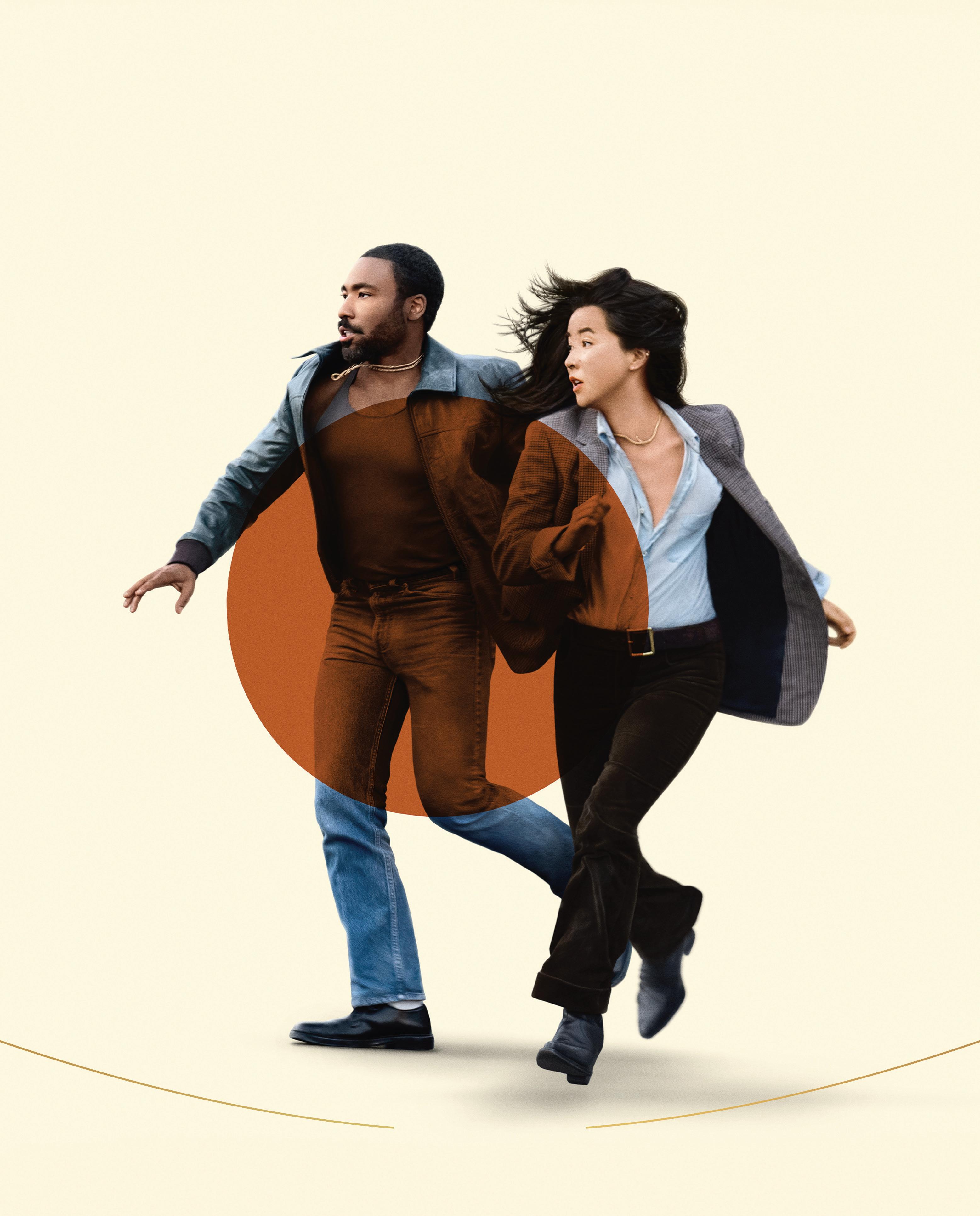
Craft Services
COSTUME DESIGN
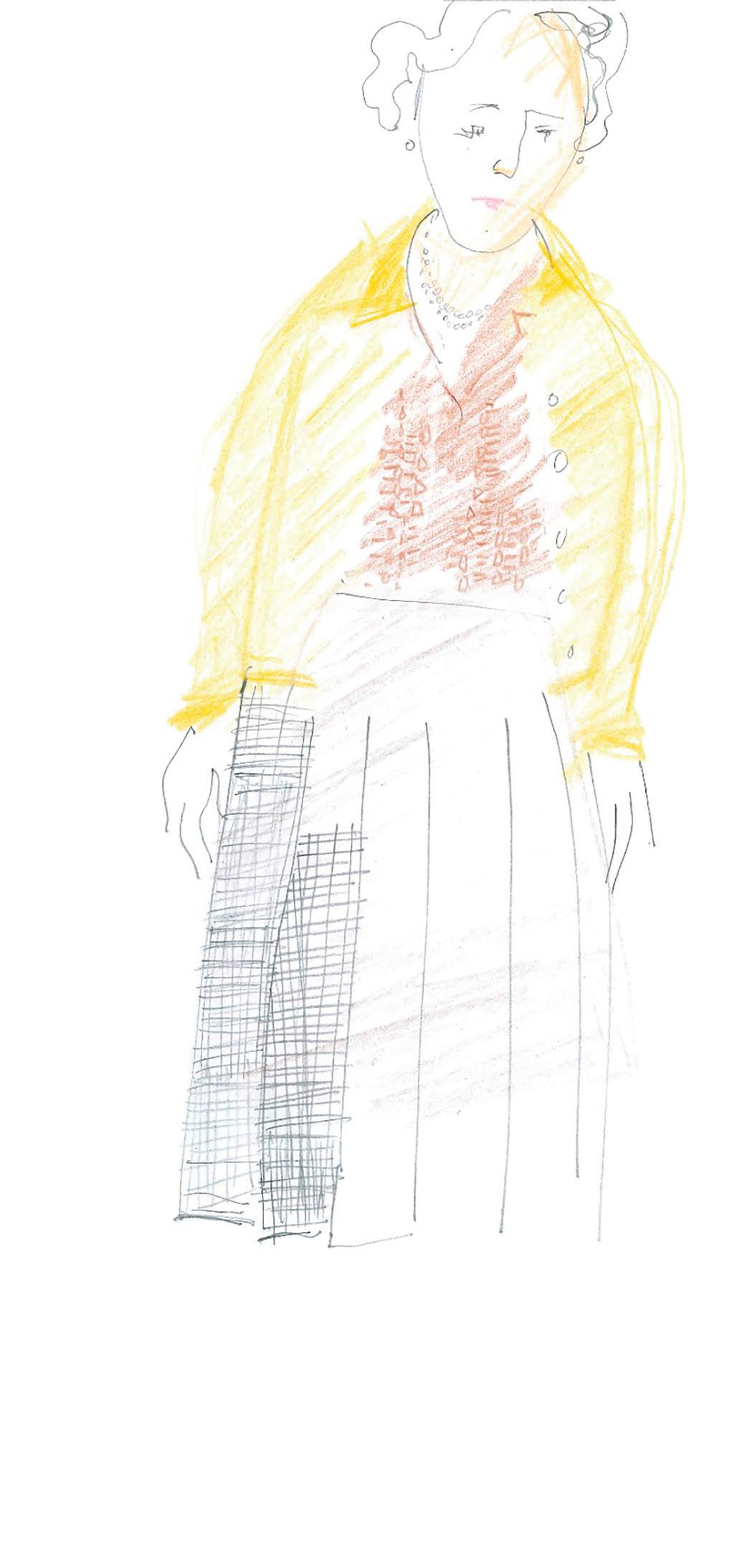
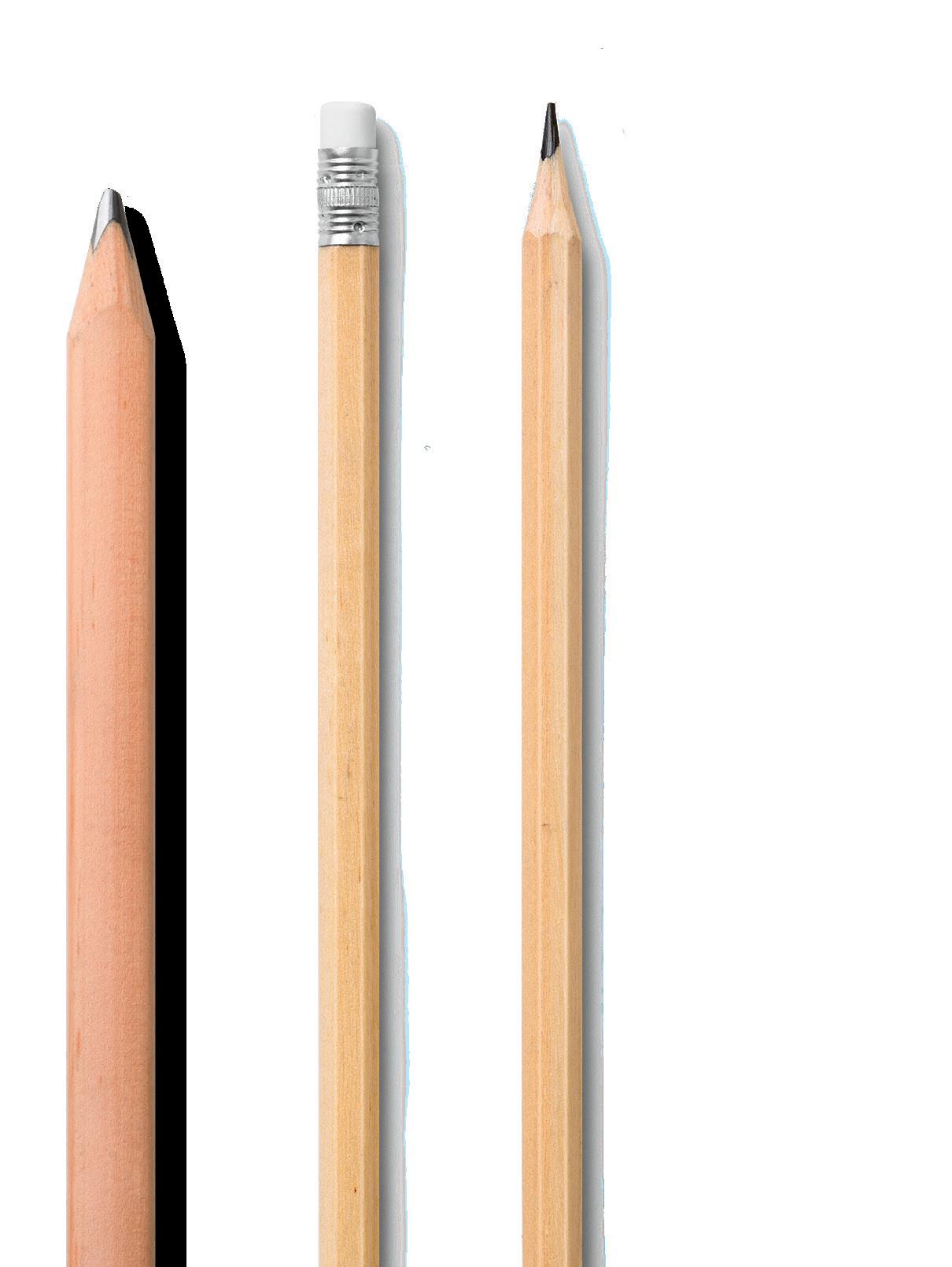
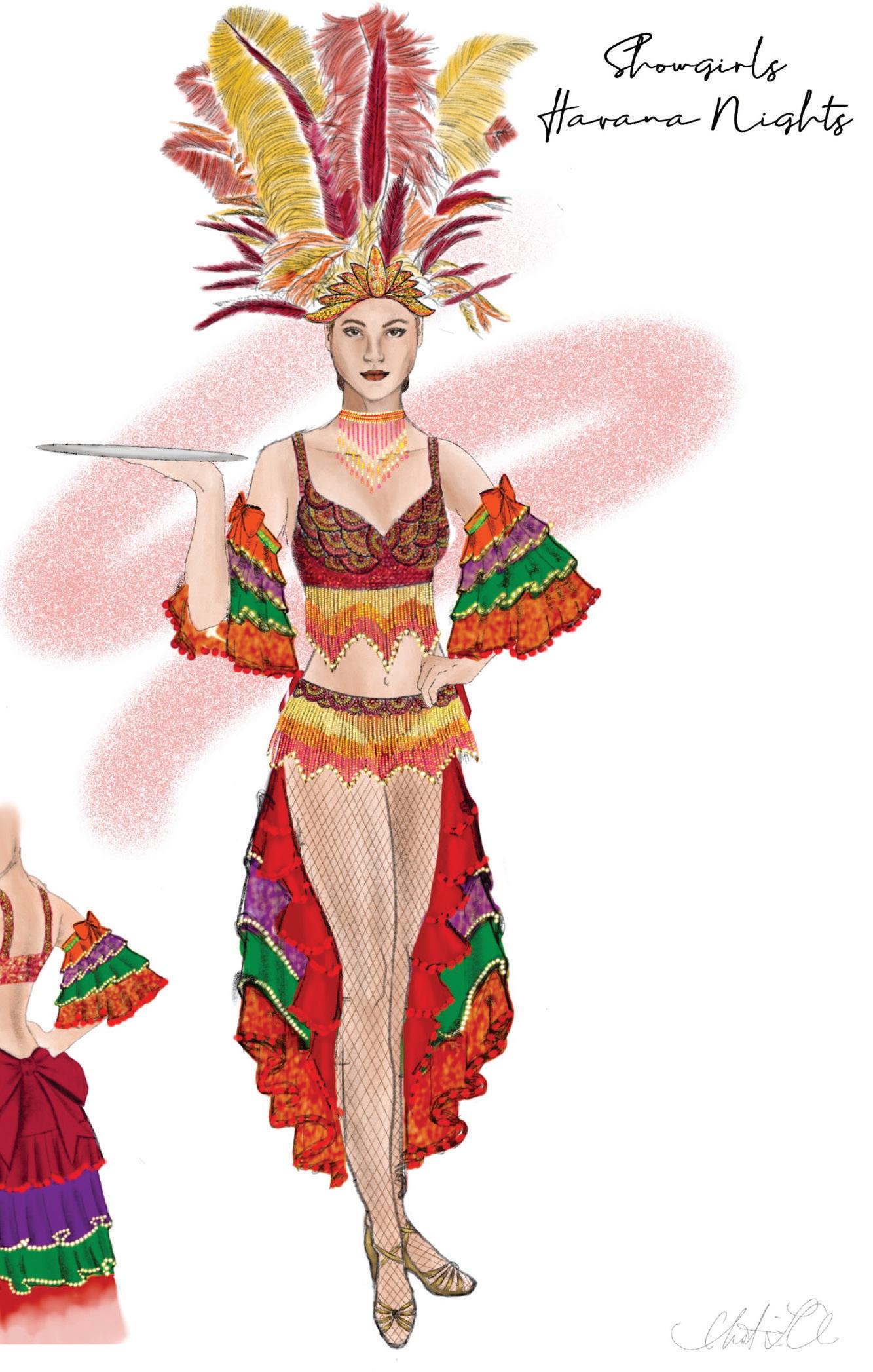
COUTURE
Costume designers Alix Friedberg, Kasia Walicka-Maimone and Amy Roberts on dressing for a higher social standing
o matter how popular a clothing style may be in the world of high fash ion, trends are made to come and go. This Emmy season has costume designers doing the work of interpreting those trends for a new era. tracks the fashion of one woman trying to fit in with The Crown palette for one final send off. Taking cues from painters of the 1880s, Age builds on a framework of fashion trends.


40 DEADLINE.COM/AWARDSLINE
Palm Royale
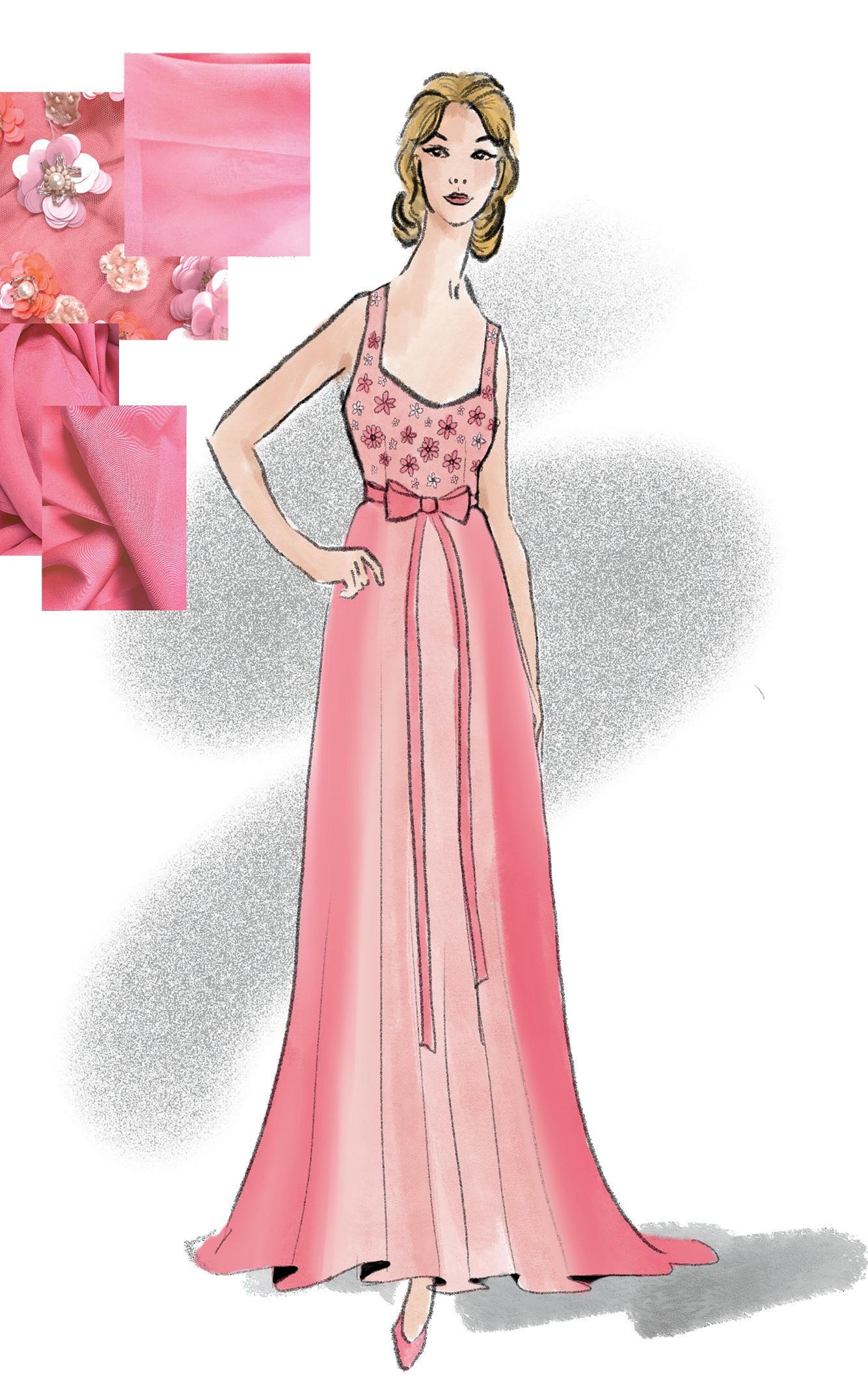
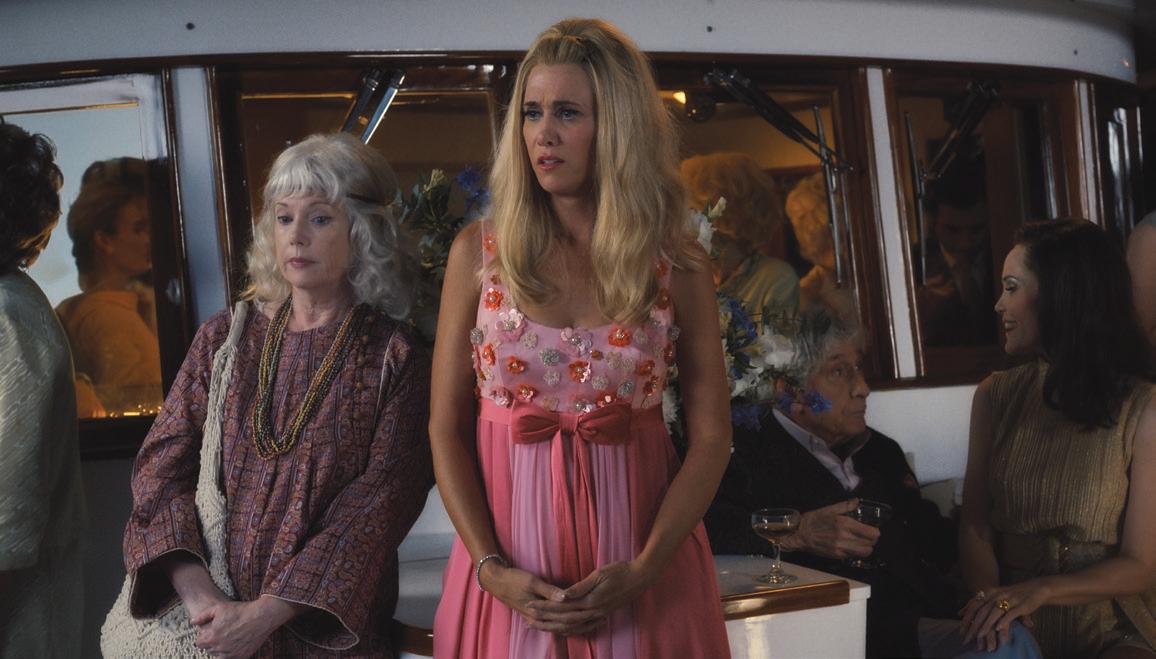
Palm Royale
For costume designer Alix Friedberg, Palm Royale presented a great opportunity to explore the innovative fashion of the time. “They call it the fashion revolution for a reason,” she says. “The late ’60s was a very flamboyant time, and there was a lot of peacocking going on with men and women.” While there weren’t any specific styles for Friedberg to draw from, the inspiration came from how designers were experimenting with silhouette. “The ditching of the structured undergarments played a big role in the freedom that designers had in that time.”
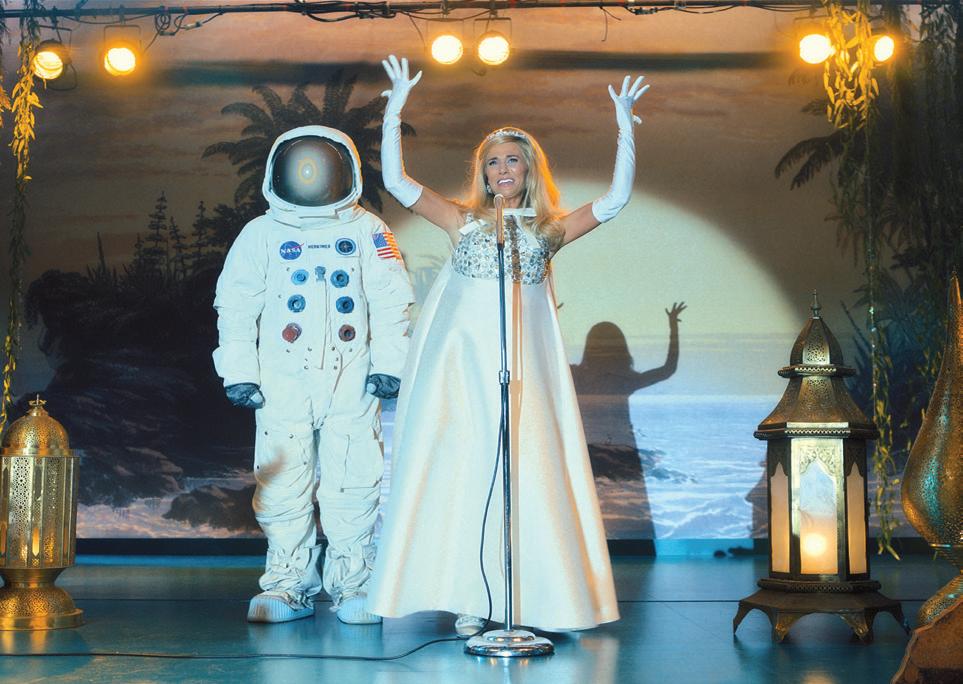
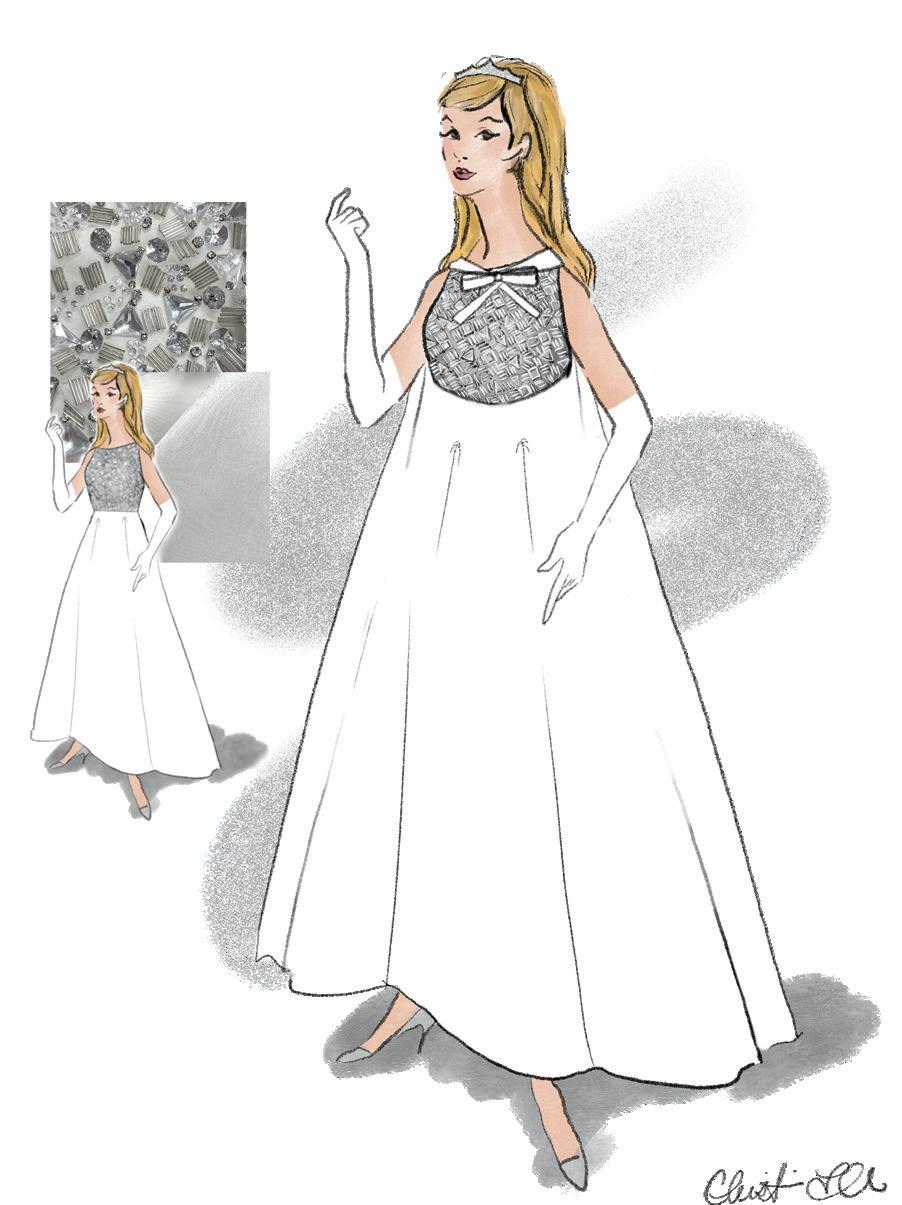
At the Palm Royale Country Club, Friedberg kept the costume design to a tight color palette. “It was pastels and whites, and really sort of bright sherbet colors,” she says. “No denim, nothing earth tone and nothing too dark navy that popped. We really kept it light and bright and crisp, so you always knew where you were by the palette.” This was to give a contrast between the “haves and the have-nots” in West Palm Beach. “That palette was a bit more in that late ’70s, sort of avocado and salmon colors, the offshoot things that have a patina on them. They were a little muddier, a little sweatier, a little more worn.”
Maxine (Kristen Wiig), the wannabe socialite, was a particularly fun design challenge for Friedberg, as a character learning what is acceptable in that society. “Maxine’s personal style has the kind of aesthetic and optimism of a little girl dressing herself,” she says. “Like a nine-year-old girl with a lot of bows and accessories and perfectly matched shoes and bags—sort of the way you would dress a doll.” Where the other women at the country club would be elegantly styled, Friedberg had to make sure that Maxine’s attire would just slightly miss the mark. “An accessory would be a little too much or too little, or a silhouette would be a little inappropriate for an event.” As time went on, Maxine strived to emulate the other women, like Evelyn (Allison Janney), though often unsuccessfully. “It was a bit all over the place,” she says. “So, there would be a moment where she would walk in with a silk caftan or a beaded gown that sort of wore her, and then the next event she was back to her old ways. But you definitely see an evolution of her trying desperately to fit in by working on those longer silhouettes and flowing gowns that the other women were wearing.”
41 DEADLINE.COM/AWARDSLINE APPLE TV+/ALIX FRIEDBERG
Left: Maxine (Kristen Wiig) wearing Friedberg's design for a pink chiffon dress to a yacht party.
Below: Maxine at the Beach Ball, wearing a white dress and Norma (Carol Burnett)'s tiara.
COSTUME DESIGN
The Crown
As the costume designer for The Crown since Season 3, Amy Roberts notes that there was a definite shift in the work for the final season. “It was different because it was the end, but also because the Queen had died,” she says. “The atmosphere was different, it was almost like making a documentary, which it had never felt like before. Not completely, but there were elements of that.”
Roberts has designed costumes for two actresses playing Queen Elizabeth II—Olivia Colman for Seasons 3 and 4, and Imelda Staunton for Seasons 5 and 6. “With Olivia, she introduced the ’60s and ’70s, and we end with an intimation of her death with Imelda,” she says. The color palette was based on a combination of the era and the story arc. “When we started, it was the ’60s and ’70s, and she had that palette of pastels, with lilacs and peaches.”
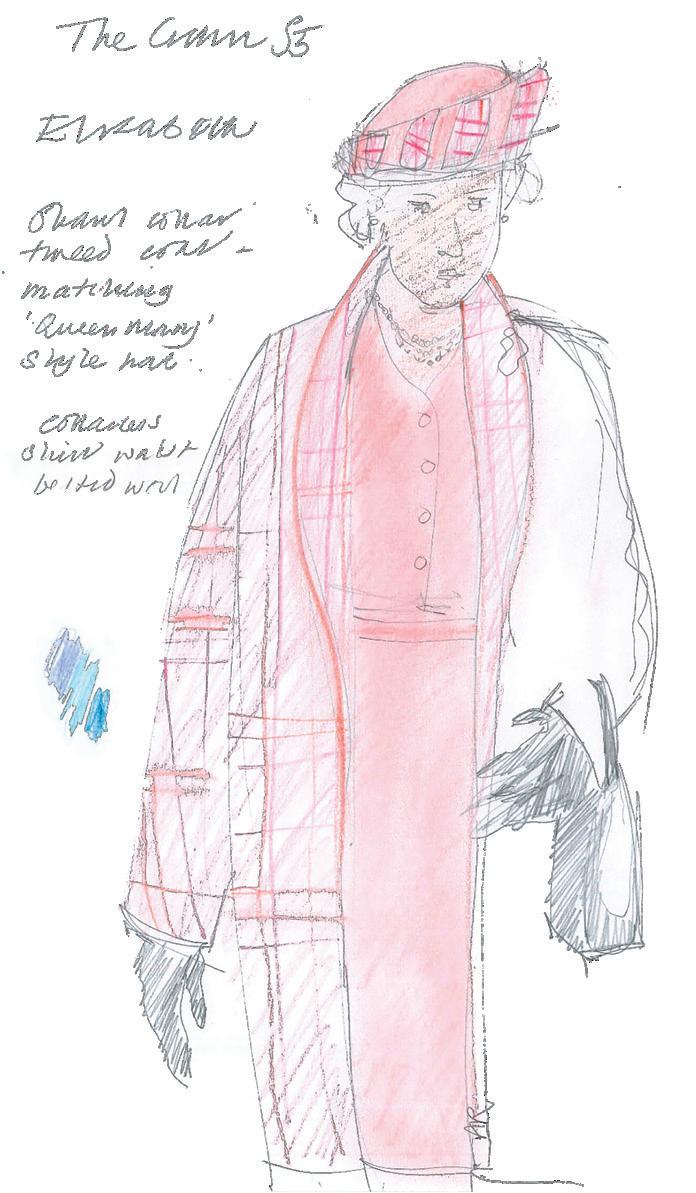
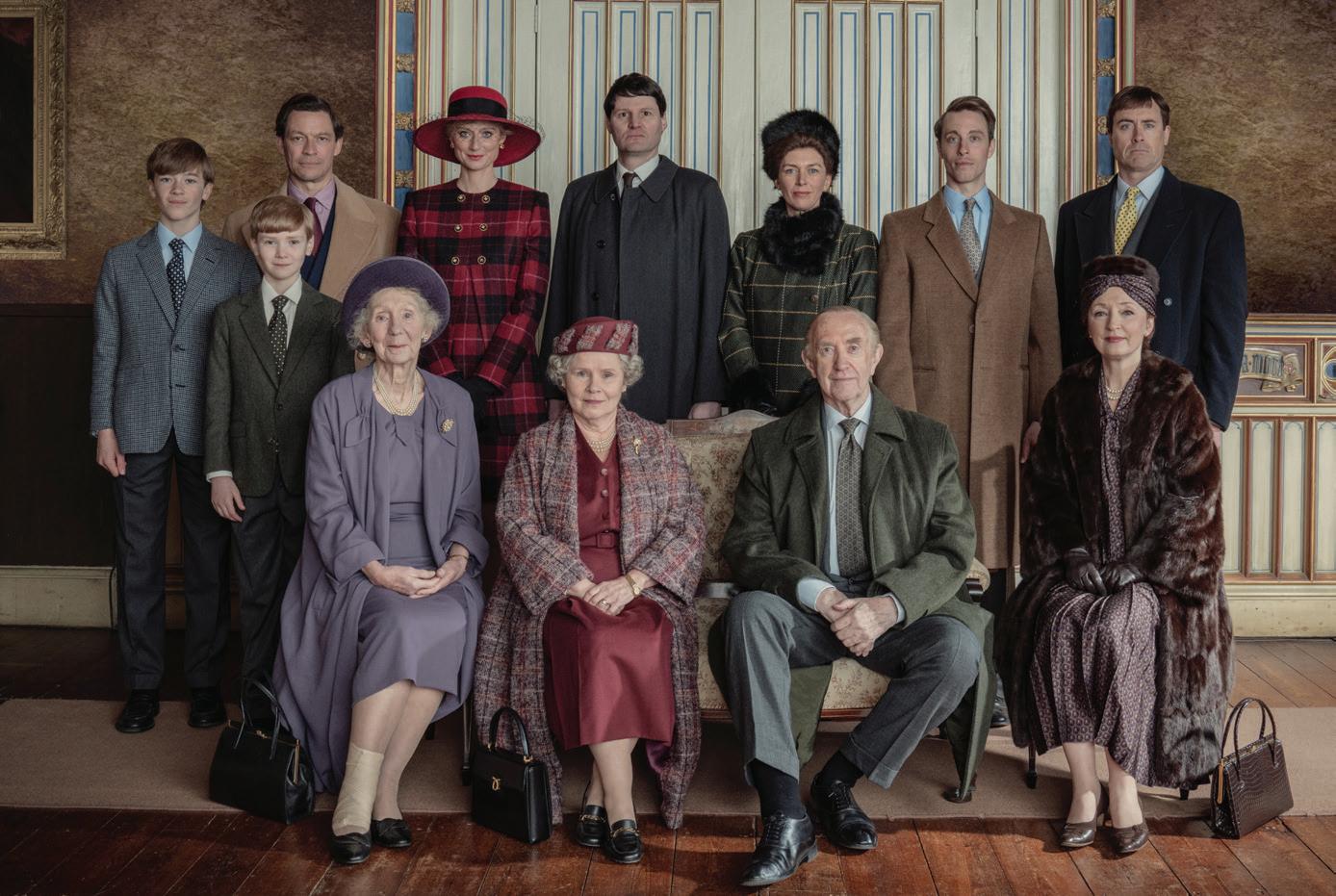
pointment she feels with her own children’s lives and their divorces.
In what Roberts refers to as the “autumn of her life”, the costumes reflect her journey through the flaws in her marriage as well as the disap-
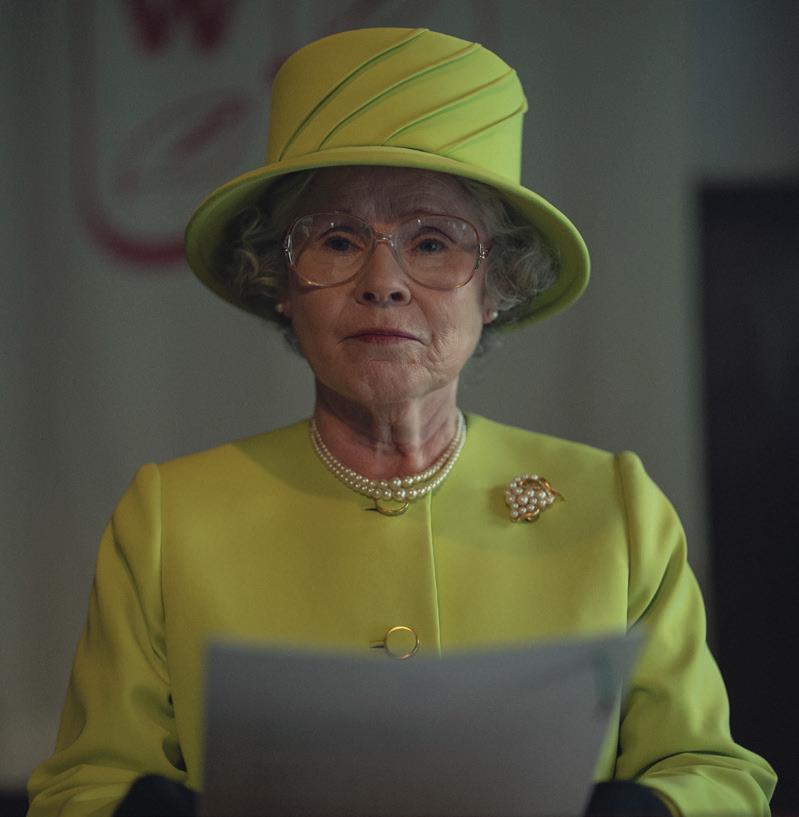
As Imelda Staunton took over the role however, Roberts brought bolder colors to the outfits to match the clothing she wore in her later years. “She goes out in a big bang like fireworks at the end, doesn’t she?” says Roberts. “That bright green dress when she goes to talk to the Women’s Institute, we called it the ‘tennis ball dress’, that was bright green and mustard and red, it’s almost like a defiance. Even though she’s kind of frailer, and there’s the question of, ‘Is she going to give up the throne to Charles?’ And yet her colors are bolder in a way. There’s almost a ‘to hell with it’ feeling, which I thought was great.”
All three actresses who portrayed the Queen
were brought together for the finale, though Roberts says she felt it was more appropriate to not design something new for Claire Foy and Colman. “We chose one of the dresses [Foy] wore with a fairly somber color. With Olivia, we chose a classic, late ’70s suit, but we remodeled it in a more somber color.” Staunton’s white dress, with the coat and hat, was modeled after the Queen’s actual outfit that she wore to Prince Charles III and Camilla Parker Bowles’s wedding, though Roberts says the final outfit worked better than she could have imagined. “The way [director] Steven Daldry worked it and shot it, there was something almost angelic about it, wasn’t it? This white color and having her walk into the light… I don’t think there was a dry eye in the house when we shot that.”

42 DEADLINE.COM/AWARDSLINE
NETFLIX/AMY ROBERTS
Craft Services
Queen Elizabeth II (Imelda Staunton, center) posing for a family portrait in Robert's designs
Above: Staunton's Queen Elizabeth II wears what Roberts refers to as the bright green “tennis ball outfit” to speak at the Women's Institute. Right: The three actresses who played Queen Elizabeth II come together for the finale of The Crown. Olivia Colman (left) wears a somber ’70s suit, Claire Foy (right) wears a darker colored patterned dress used earlier in the series, and Staunton (center) wears an “almost angelic” white coat and hat, inspired by the Queen's outfit at Prince Charles III and Camilla Parker Bowles' wedding.
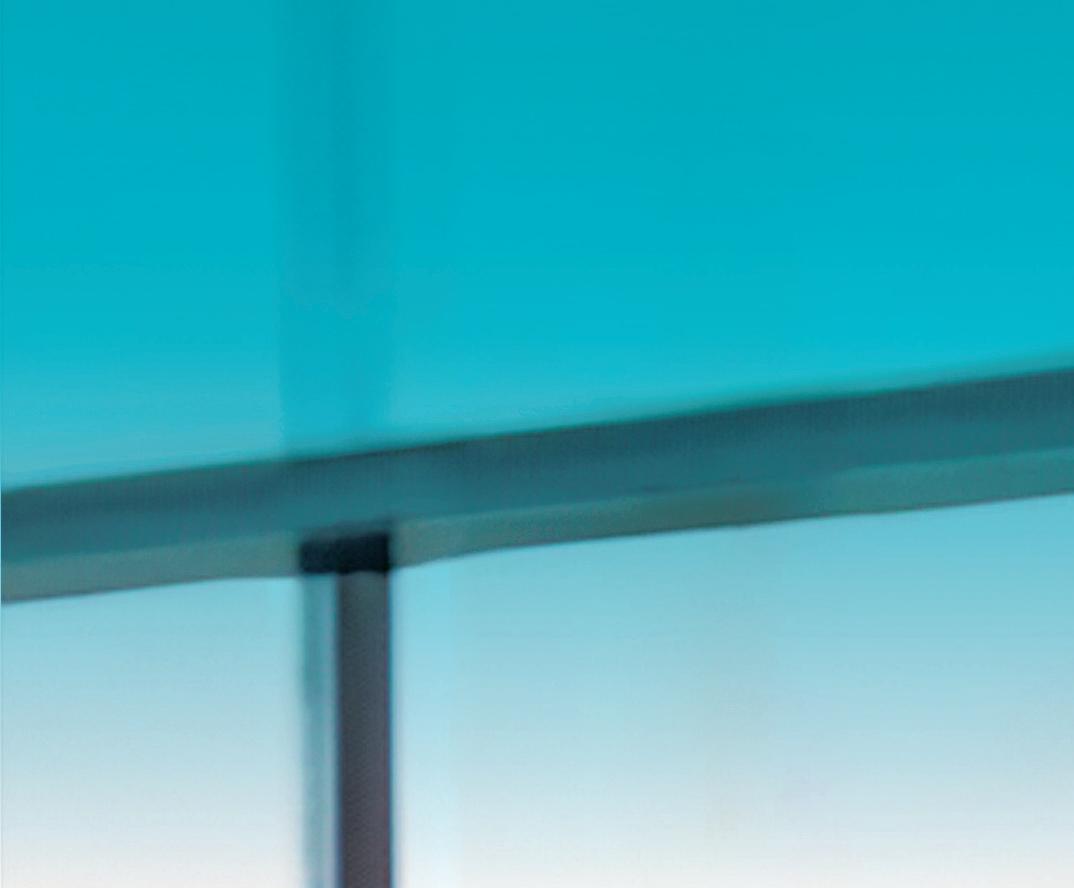
FOR YOUR CONSIDERATION
OUTSTANDING COMEDY SERIES
OUTSTANDING MUSIC COMPOSITION FOR A SERIES (ORIGINAL DRAMATIC SCORE) SHERRI CHUNG
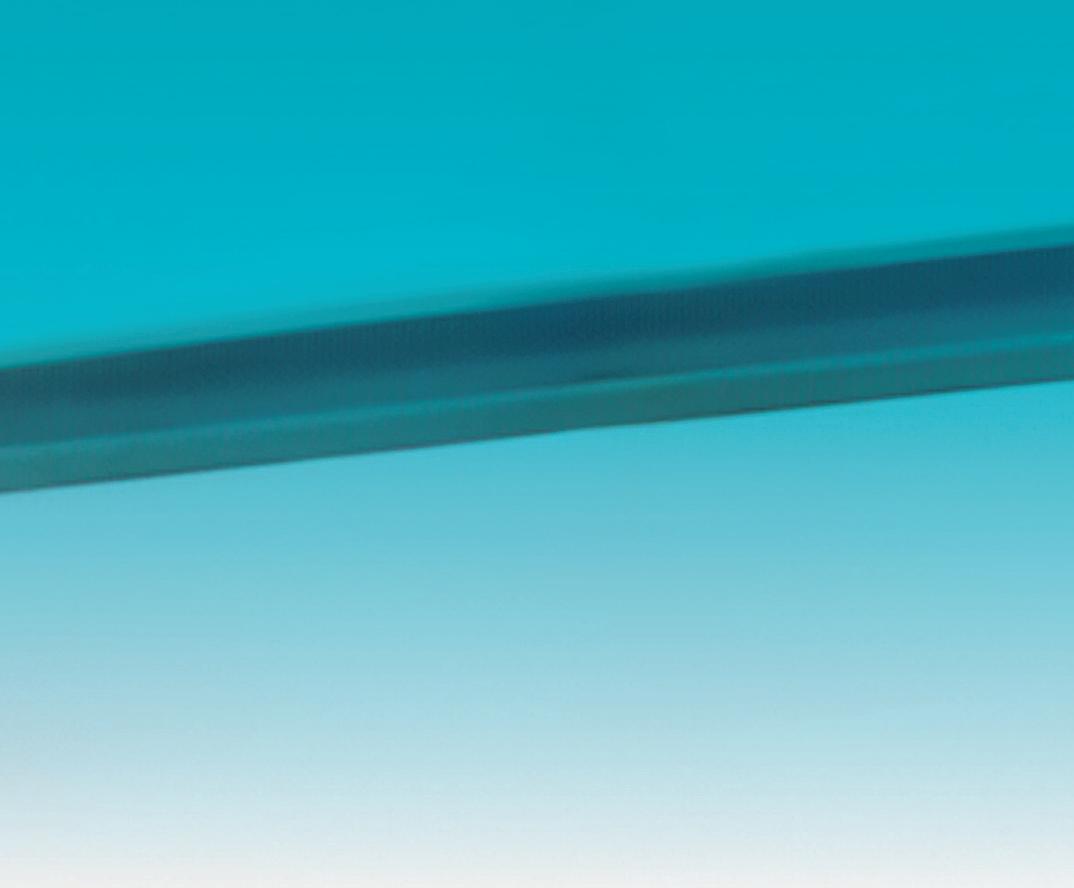

“FASTPACED, SARDONIC AND HIGHLY ENTERTAINING.”
LOS ANGELES TIMES

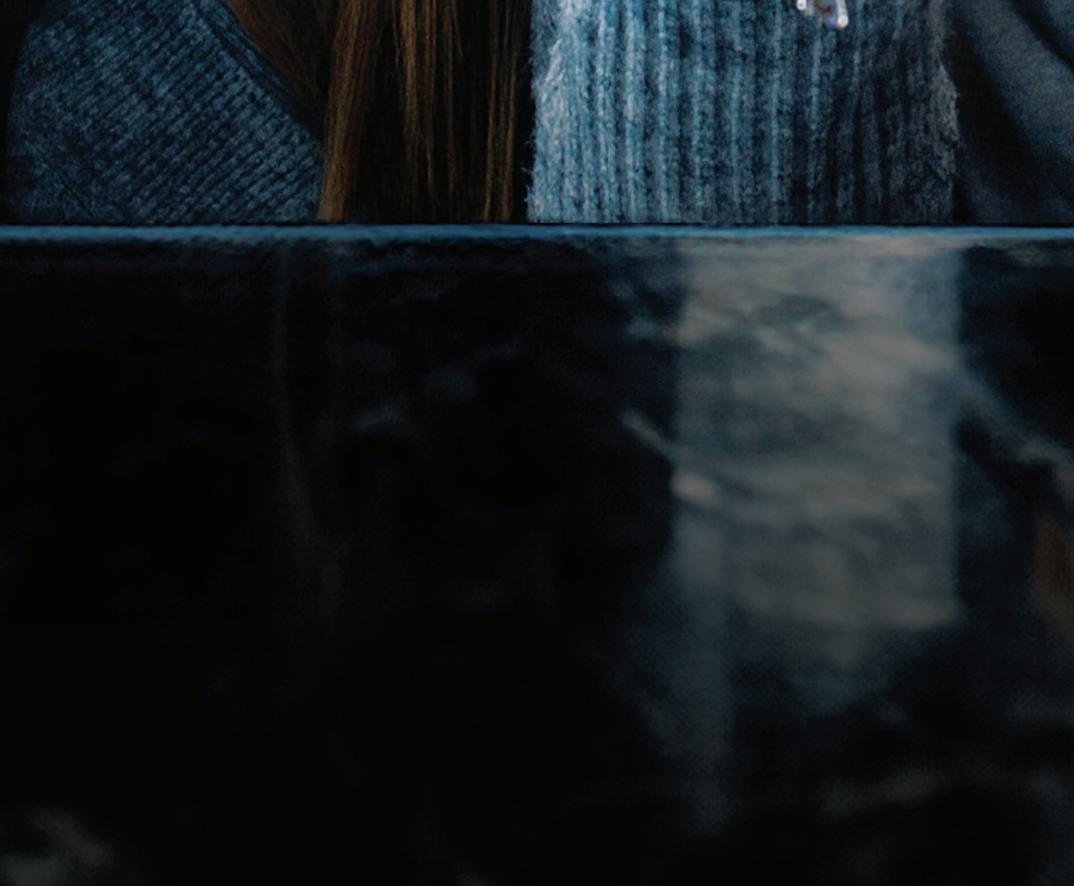


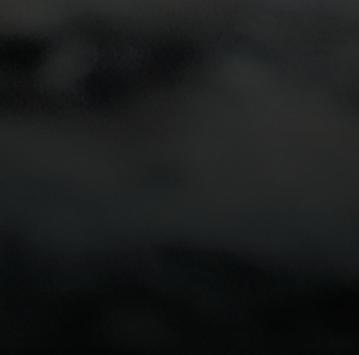
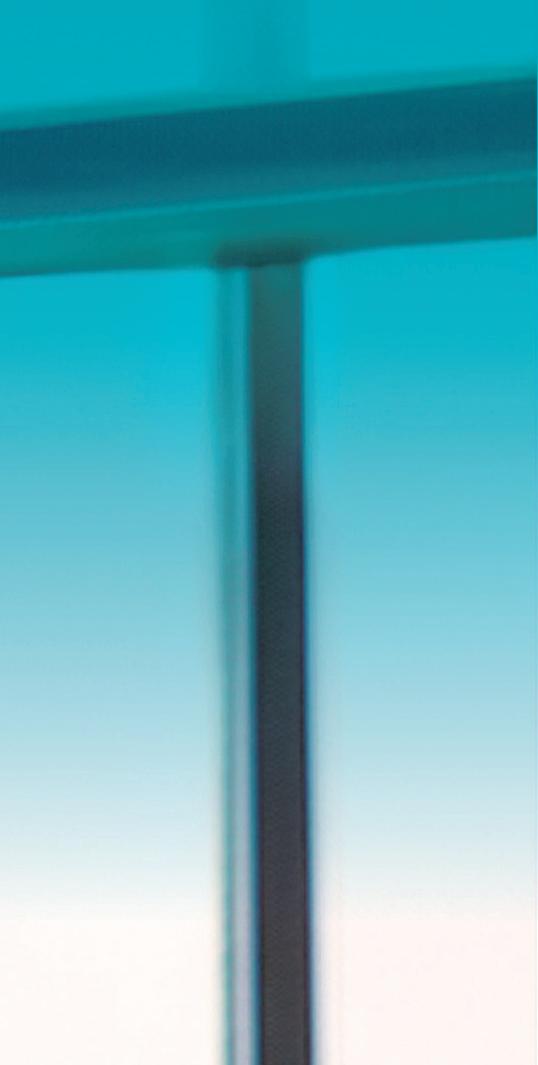
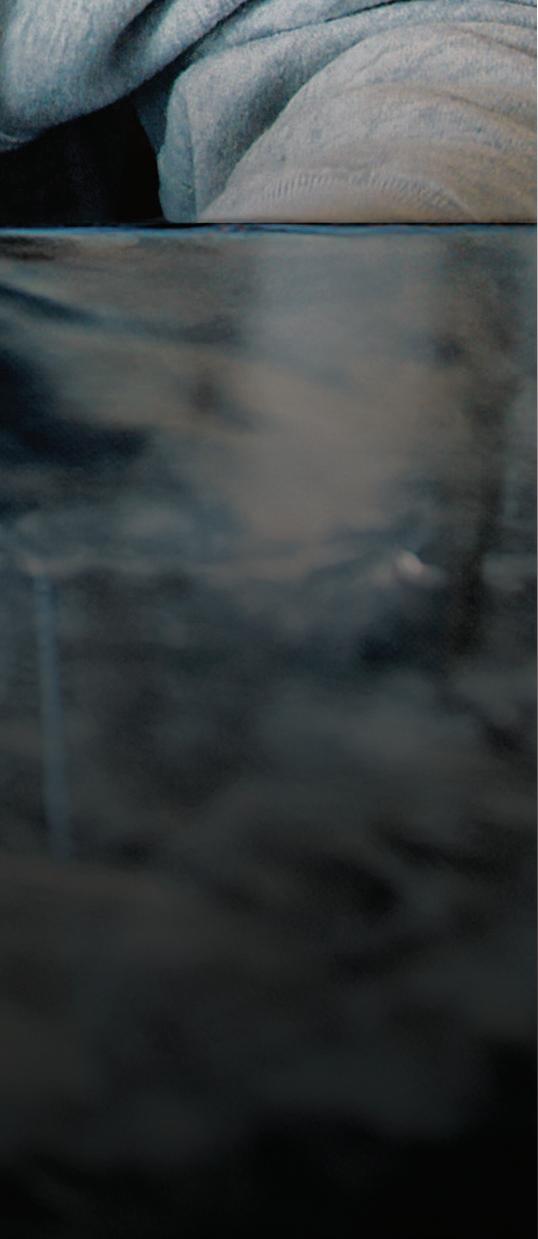
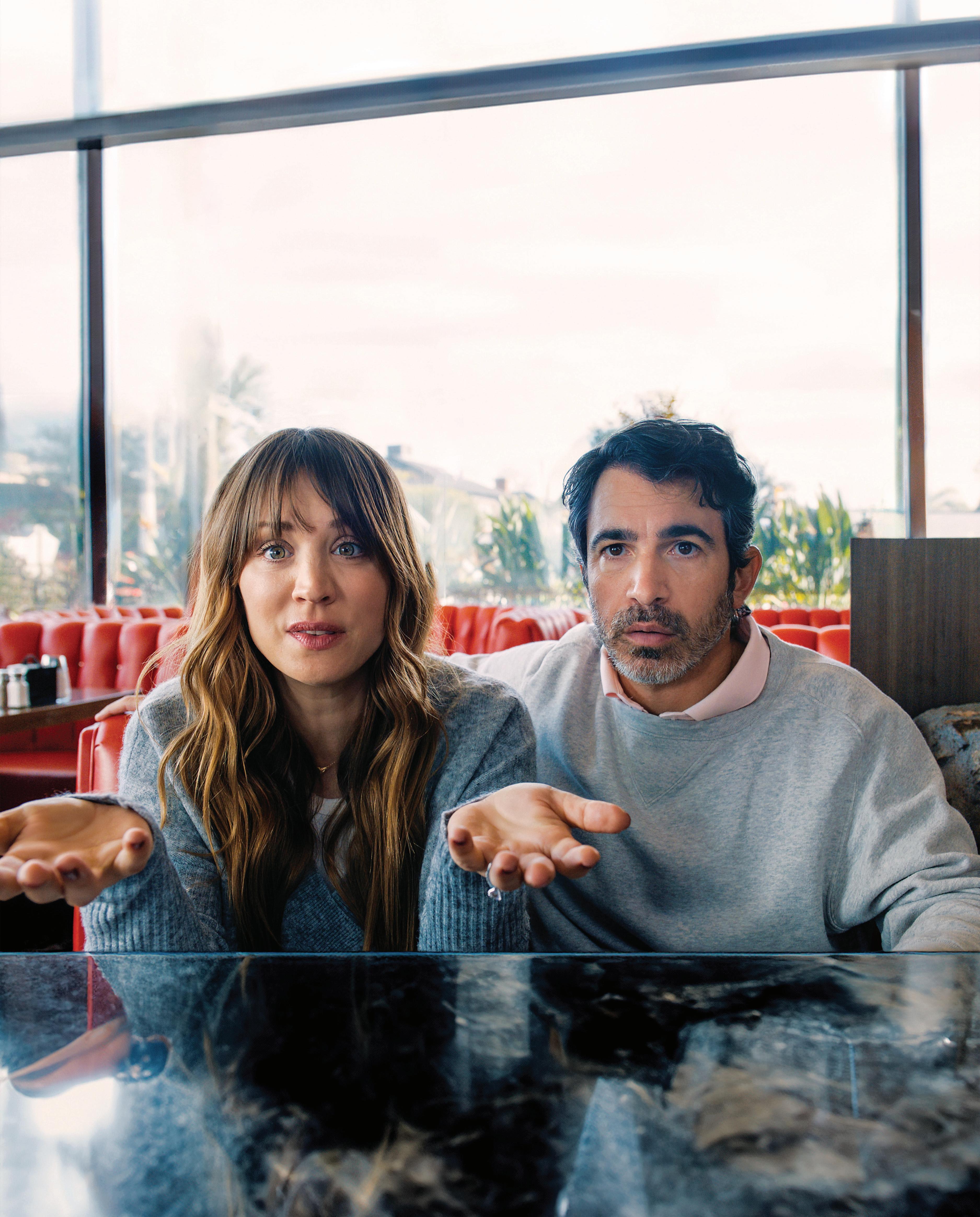
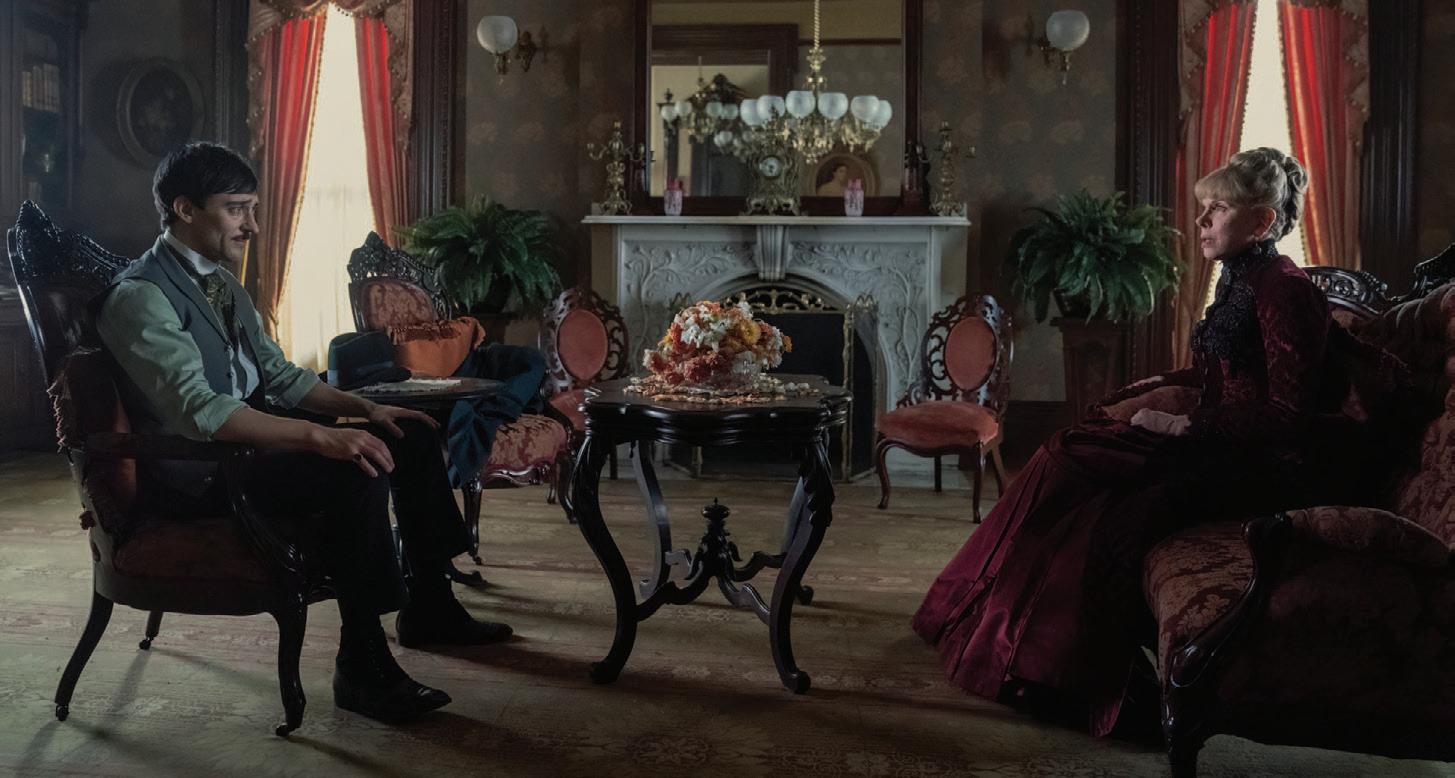
The Gilded Age
In 1880s New York City, every outfit could be seen as a fashion statement. “When ladies stepped out onto the street or showed up at events, it was a permanent fashion show that was displayed continuously in front of the world around them,” says The Gilded Age costume designer Kasia Walicka-Maimone. “In the contemporary world, there’s never just one thing that people respond to. People respond to a variety of styles and influences.”
To set a framework, Walicka-Maimone focused on two extremes on the spectrum for the costumes of higher society—one of a more fashion forward, and one of a more conservative fashion. “Bertha (Carrie Coon) is the most fashion-conscious person who is diving into the newest trends of the European houses,” she says. “She probably goes more toward the 1890s, because that’s where the newest trends come from.”
In contrast to Bertha, Agnes (Christine Baranski) is the more conservative character in terms of fashion. “Her styles are more based in the 1880s, when that was the height of her interest in fashion. The period usually covers 10 or 15 years between the newest of the new and the oldest of the old, and then we find the center of what were the most popular styles, to give us the framework of what would influence the oldest people and what would influence the most fashion forward people.”
Color palette was an important part of the series, for costume design as well as production design and cinematography. “We all have visceral responses to colors,” she says. “We know
wearing a red dress with a more conservative style for the time period.
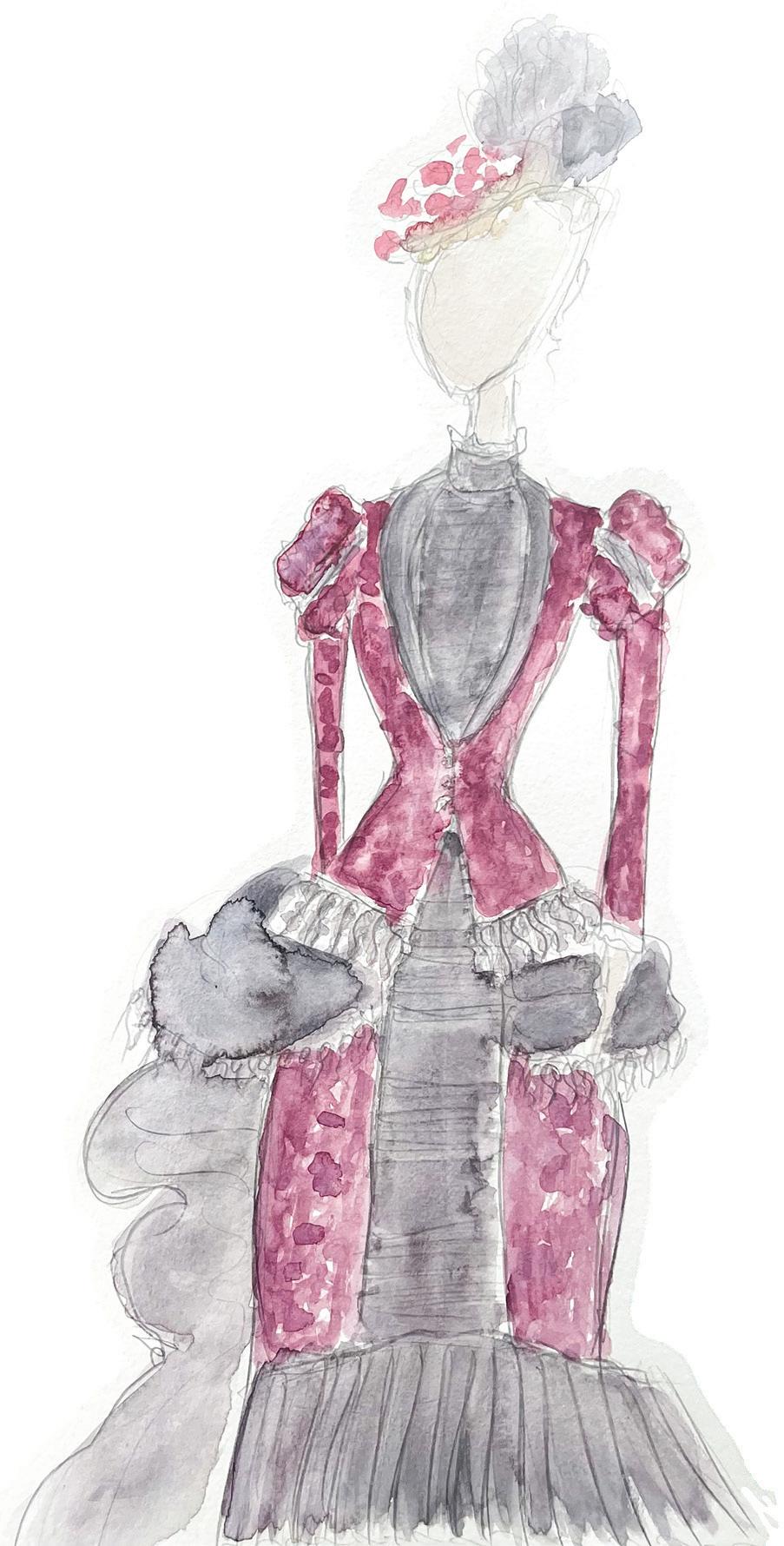
what red means; we know what pale-yellow means… But in discovering the period of the 1880s, there was a different color sensibility of paintings from the period that were very much an inspiration for the whole approach to the design and color palette of The Gilded Age, because there was already a certain level of interpretation of the color palette that was not directly driven by reality.”
Taking inspiration from painters like John Sargent, James Tissot and Giovanni Boldini, Walicka-Maimone took their use of color as a jumping off point for the color palette of the series. “I can’t quote one, because none of it is a direct representation of the painters, but the aesthetic of the painters from that period influenced the color approach to The Gilded Age.” ★

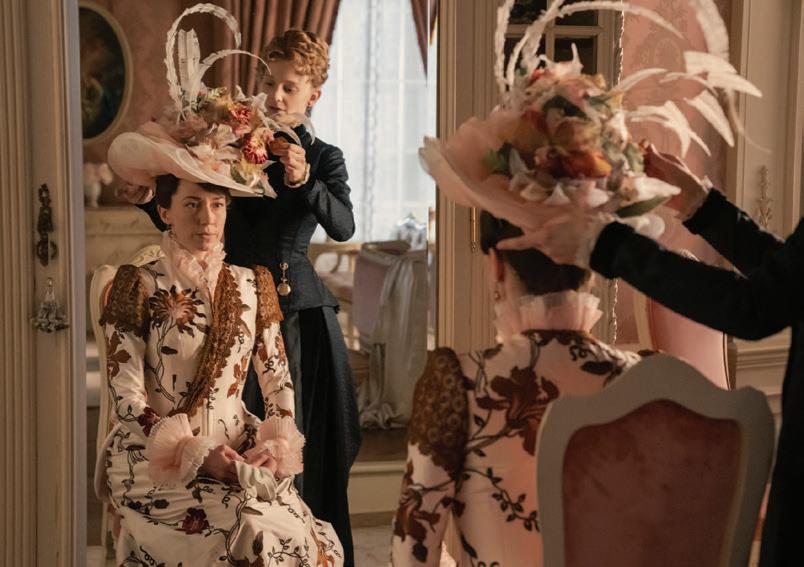
44 DEADLINE.COM/AWARDSLINE Craft Services HBO/KASIA WALICKA-MAIMONE COSTUME DESIGN
Above: Agnes van Rhijn (Christine Baranski) sits opposite her son Oscar (Blake Ritson),
Bertha Russell (Carrie Coon) putting on her Easter outfit, a more fashion-forward style for the time, with the aid of Adelheid Weber (Erin Wilhelmi).
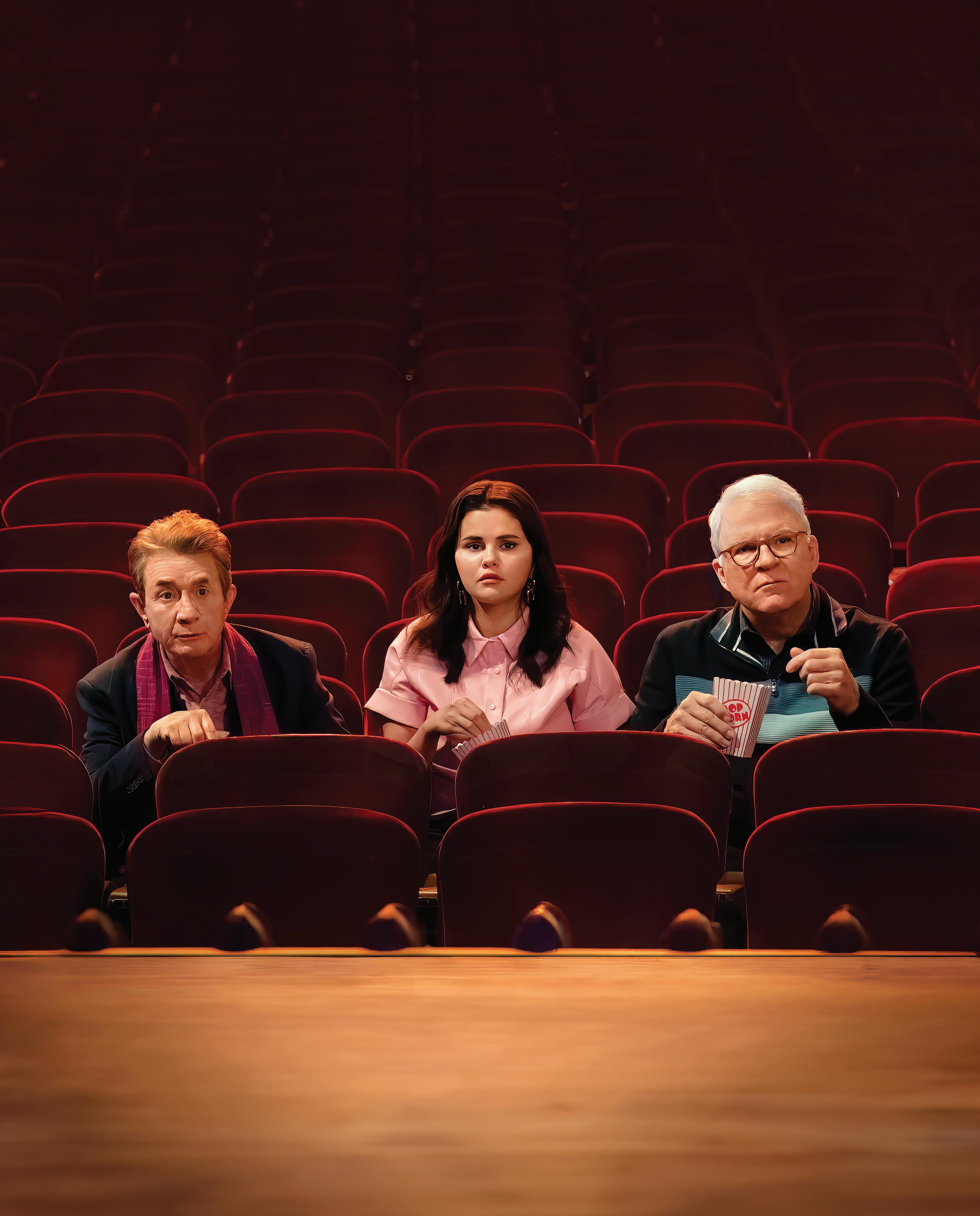
“A KILLER THIRD SEASON”
CNN “+++++” THE GUARDIAN “++++” THE TELEGRAPH “++++” THE TIMES “++++” EMPIRE “+++++” SAN FRANCISCO CHRONICLE FOR YOUR EMMY® CONSIDERATION
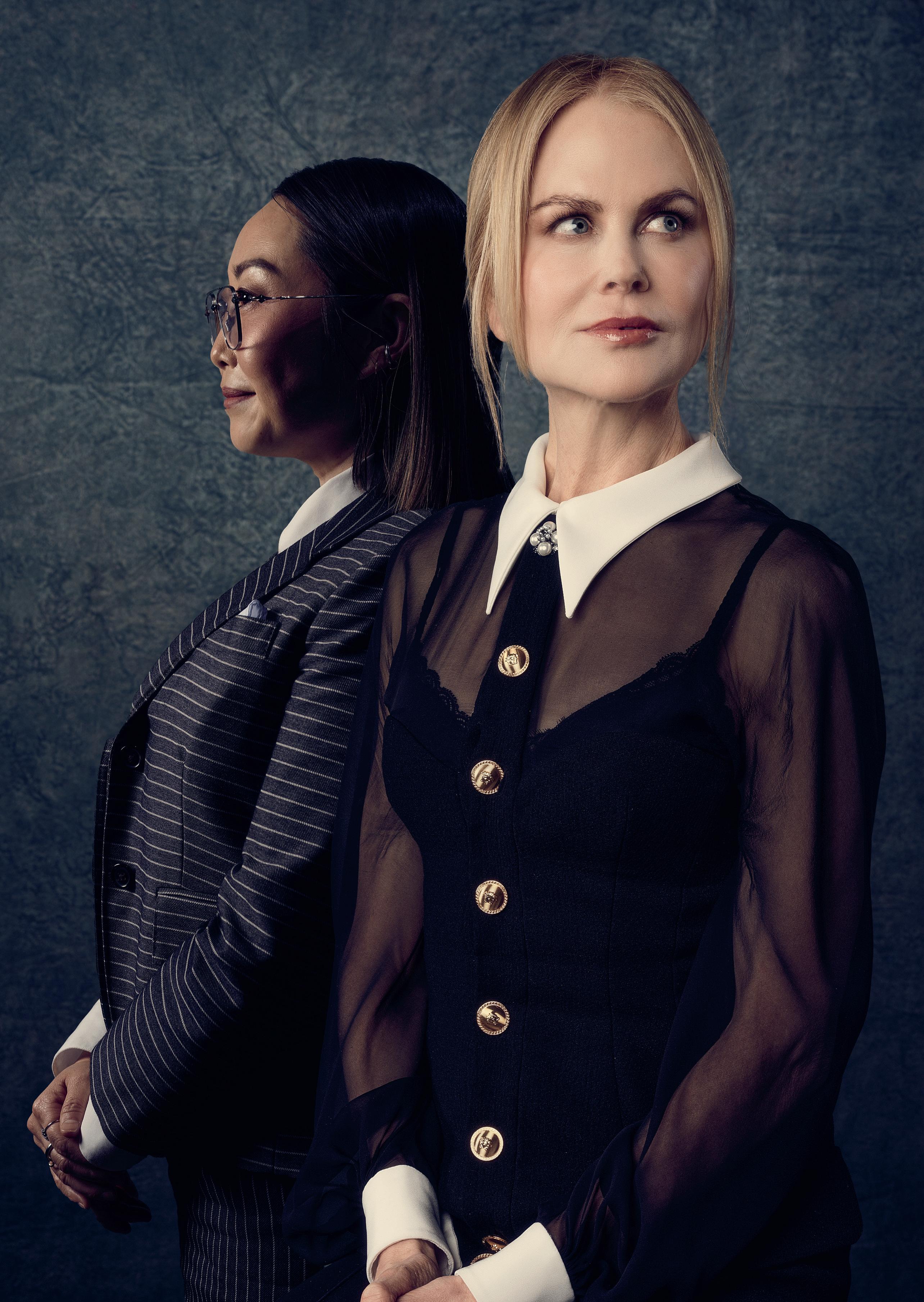
Partnership The
Lulu Wang AND Nicole Kidman
By Baz Bamigboye
Lulu Wang remembers Nicole Kidman spiraling down a psychological rabbit hole in Jonathan Glazer’s 2004 dream-like masterpiece Birth where a woman believes that a 10-year-old boy is the reincarnation of her dead husband. “That’s my favorite,” Wang declares, much to Kidman’s delight—and surprise. During the making of Prime Video’s Expats drama series, based on Janice Y.K. Lee’s second novel, The Expatriates published in early 2016, they both discovered that they had the same ‘get up and do it’ sensibility. As Kidman put it: “You’ve got to roll up your sleeves and do it.” Followed by a cry of “Don’t just sit there, let’s do it, let’s do it.” Wang says it’s “super rare” to meet someone like Kidman. “It feels pretty rare because there are a lot of people who talk about meeting more female directors. But I think that the evidence is in the resume. You can talk about it all you want and shout about it, particularly if you are somebody who has a particular status in Hollywood where your name green lights projects, and you are not using your name to green light projects with women at the helm. If you’re not doing it, then who’s going to do it?
Then who are you talking to? You are the industry. So that was great. And there’s a lot of actors now who are producers, and that’s where the power lies, not to just have the power to help yourself, but to really create a project, an ecosystem for other people to come into it.”
Initially, the filmmaker turned Kidman down, but the actor was able to soothe Wang's fears—before, during and in postproduction.
“Throughout the edit, Nicole would ask me how I was feeling—if the show was good, if I was happy with it… and I would never say yes. She always sensed hesitation in my voice. I don’t know if that scared her, that I couldn’t reassure her. It wasn’t that I wasn’t proud of what we were doing, but it’s the same cautiousness I approached the project with, I think. I always keep a level of questioning to stay focused on the process, to make sure I can actually make something the best it can be and to keep my eye on continuing to make it better. I think Nicole understands that better than anyone.”
Both are eager to work together again. Wang revealed that she’s writing a movie for Kidman, though she’d been keeping it a secret from the actor until now. The superstar was moved when Wang informed her about the screenplay. “I’ll go to that,” Kidman responded. “I’ll walk through fire” to work with her again.
So, Nic, did you read Janice Y.K. Lee’s novel The Expatriates in galley form or when it was published?
NICOLE KIDMAN: Well, my sister [Antonia] read it. My sister was in Singapore, living there. And my sister read the novel and said, “I think this would make a great film.” And so I called Janice and optioned it. We called her book agent, and that was the beginning of it. My sister’s got really good taste. I always say, you never know where the stories are to find them. And the book had been out for a while, actually.
So, at that time the book had aleady been out for, what, a couple of years maybe?
KIDMAN: I think it had, yeah, a couple of years. But it was a must-read among many of the expats. It was sort of the book. And I traveled and lived with her in Singapore, and obviously had been to Hong Kong. And I was just like, “This is a whole world that isn’t explored. And there’s so many different stories here that you can explore.” And we did not know

47 DEADLINE.COM/AWARDSLINE GUTTER CREDIT HERE WHEN TWO TALENTS COME TOGETHER TO MAKE MAGIC
MICHAEL BUCKNER/PRIME VIDEO
Lulu Wang and Nicole Kidman on the Expats set.
how long it was going to take to get it made, but it had its own paths to creation.
This probably was what, 2018? So, when was The Farewell first shown, Lulu?
LULU WANG: Sundance 2019. And I think July 2019 is when the film came out in theaters.
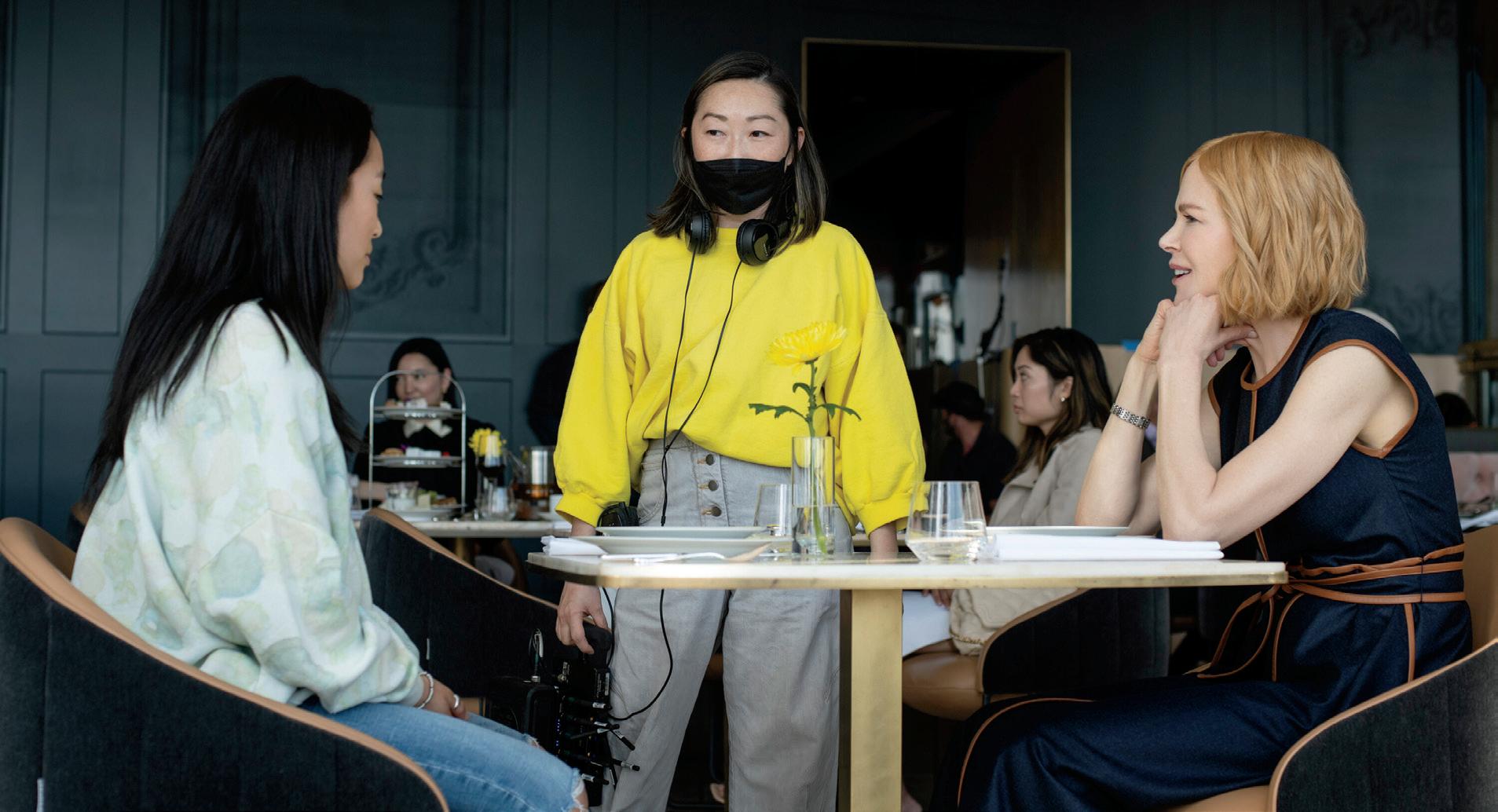
KIDMAN: I saw it at the Belcourt in Nashville, which is the little art cinema there, and it was packed. Literally. You couldn’t get in, just couldn’t. I finally got a seat and saw it and just said, “Oh my god.” And that was it. Then I asked, “OK, what happens next?!”
Did you immediately think after seeing The Farewell, “OK, I’ve just found our director?”
KIDMAN: Yeah, yeah. But that’s very daunting because then you go, “Well, now I’m not giving any other options for it to be made.” But at the same time, things are either meant to be made or they’re not, and the right people take the helm or they don’t, and that’s that. And I don’t think it’s just, “Oh my god, we’ve got the book and, we’ve optioned it, and we’ve paid money. We have to, no matter what, make it, even if it’s compromised.” It was, “No, there’s only a particular way to make this.” And that’s why I said, “If you want it, it’s yours, and I’ll support the vision.”
Let’s just rewind a little. I understand Lulu, that initially, you were hesitant about doing it, is that correct?
WANG: Well, I said “I’m going to pass on the project, but I can’t just write Nicole Kidman in an email. So I said, let’s set up a phone call and I’m going to tell her that I love the book, I love her, so I can hopefully work again with her in the future, but I can’t do this project.” So that was over the phone. And I believe that that’s when she was like, “OK, OK, but let’s have dinner.”
And then I talked to Barry [her partner Barry Jenkins] and Barry said, “Go to dinner. Yeah, Nicole invites you to dinner. Go to dinner.” So I was like, “But I already said no, all right, I’ll go to dinner.” So, I went to dinner just to maintain the relationship hopefully for the future. And then we had a few drinks and she said, “Why is it that you’re saying no?” And I told her all, she said, “Well, if you could have it any way you wanted, what would you want and what would you need?” And I said, “No, you guys have been developing it for so long, but I would really need to build this from the ground up. I would need to fill the room with people who I think are right perspective wise for this project that have different perspectives than me, including the novelist. I love some of the characters in the book, I could really see them having their own episodes.” I had ideas, but I just felt like there’s no way. And she’s just like, “Oh, OK, OK.” And then she texted or called, I can’t remember, another or 24, 48 hours later, she said, “OK, so we talked to Amazon and you got it.”
KIDMAN: I think I was in Toronto, and I met your agent, and he said, “Well, she’s going to need this and this and this.” And I’m like, “Yep, yep, yep. Yeah.” It wasn’t like needing accoutrements. It was for the shoot and things that she needed to control and bring her DoP, bring all the things she needed that would make her feel safe, and also to realize it. Then
From previous conversations, Lulu, your intent wasn’t to just follow what was in the novel, you wanted to really adapt it.
WANG: It was that, and also just making sure that we could actually stay true to the novel. Because so often when you do a TV or film adaptation, the powers that be might want it to be more plot driven. They’re like, “We love this, but make it more this other thing.” What I loved about the novel is how nuanced and character-driven it was, and that it wasn’t plotdriven and that there are no easy answers. And that’s what I wanted to make sure we could preserve in the adaptation.
And Nicole, there was no problem from you with that sensibility? You just said, “Go ahead?”
KIDMAN: That doesn’t seem crazy to me. That’s like, the talent needs to be supported, I think. Everyone seems like, “That’s such a bold movement.” I said, “No, I don’t know any other way to do it,” but I have a strong sense of commitment to the craft, to filmmakers, to writers, and...
WANG: To risk taking, creative risk taking.
KIDMAN: It doesn’t seem crazy why I’m like, “But yeah, of course.” It is odd. I don’t know why...
WANG: But it is, it’s like a web, right? Because by supporting me, then I could then take that power and support the filmmakers around me, my DoP, my production designer, and then they support the people they work with on their teams. Then they fight to bring on the Steadicam operator that they believe in, and it trickles down. And that’s what is so incredible. Nicole, being able to support me, created this entire network and world of filmmakers, women, people of color who’ve never had the opportunity to be in this space.
KIDMAN: And we talk about doing it, but you got to do it. We can all sit around at the dinner table and talk about it or do interviews and talk about doing it. But I’m always reluctant to do too much talking about it because it’s better to just get in there and do it.
Absolutely. I remember many, many, many years ago at Cannes there was almost like a Kidman manifesto, and you said something to the effect of, “I want to make a movie or a TV show or a stage show with a woman, with a female contingent.”
KIDMAN: It was at a press conference in Cannes where I said, “From now on every 18 months, I will work with a female director.” And then I went, “18? That’s too long,” in my head. So, the declaration was 18 months, but I knew in my head it would be every six months to a year.
48 DEADLINE.COM/AWARDSLINE The Partnership PRIME VIDEO
Lulu and I had our drinks and she told me what she needed to feel safe and to realize her vision.
From left: Ji-young Yoo, Wang and Kidman on the Expats set.
“My personality is like Nicole's, in that I will just jump in. I say, I want chickens and within a week I'm building the chicken coop. That's just the kind of person that I am.
LULU WANG
And you’ve been true to realizing that.
KIDMAN: Realizing it is just you’ve got to roll up your sleeves and do it. And that requires not being precious and just going, “OK, let’s go, let’s go, let’s go.” And being consistent and determined to do it. And then the other side of making the statement is make it publicly, hold yourself accountable and get it done.
The actual kind of giving, and that’s where I say to my family and my daughters and the people that go, “OK, you sure you can do this?” I’m like, “Yeah, if you support it.” And they’re like, “Yeah, yes, go for it.” And hopefully they’ll carry that forward too. I grew up with a mother and a father who said, “Well, just do it then. Don’t sit around and talk about it. Let’s go.”
WANG: Her mom is the best. I haven’t met her, but all the stories, I feel like I’ve been with her, we’ve got similar mothers who are very honest with us and hold us accountable and push us to be better.
KIDMAN: And not sugar-coat things.
WANG: Exactly.
KIDMAN: Never.
But for you, Lulu, when you’ve read these pieces about Nic and she told you what she wanted to give you, what was your view? Did you think, “OK, is this legit?” Because, as you just said, you didn’t really want to do it initially, did you?
WANG: It took me a while. Nicole knows me now, too. I am somebody who dives in feet first, and I’ve been told by my mother that I am a dilettante, and I will never be the master of anything if I am such a dilettante. My personality is like Nicole’s, in that I will just jump in. I say, I want chickens, and within a week I’m building the chicken coop. That’s just the kind of person that I am. But in Hollywood with this career that took me so long, I think I feel such a tremendous amount of pressure, not just to myself and my career, but to the whole community. I can’t mess up in a way, and I’m trying to let that go. That’s a whole another story, because if I mess up, then other people might not get these opportunities in the future. I do have to pause, and I have to be harder on myself and the conditions under which I can actually realize the thing. And there is, as you said, a lot of BS in the industry that you have to filter. And Nicole and I talked early on, and I said, “Well, are you a movie star? Are you an actor? How do you show up?” And she was like, “Oh my god.” She was offended I asked that. But I said, “Well, this is how I shoot. This is my work ethic.” And she said, “Me too. Let’s do it.”
I mean, the first day on set, she showed up. We talked for hours with the crew and intimacy coordinator about blocking the windows and how to make Nicole feel comfortable and safe. And it’s a seventh-floor apartment building in a totally...
KIDMAN: It was amazing.
WANG: And we wanted to make sure Nicole was comfortable and all of that. And we were like, “Should we block the windows? But we don’t want to block the window. We want to see outside. But she’s naked in a bathtub, OK maybe.” And she walks in, she said, “Hi.” And she just took her clothes off and I thought, “Oh. Oh. OK. I guess.”
KIDMAN: But I could see the room. I could see what it was. We needed to shoot it. We had to get the light, and now let’s loosen up. Because part of it is just going, “Let’s take all of the onus of all of this and let’s just start.” And some of it’s going to work. Some of it’s not. Just start going, let’s
go. Let’s go, pick up the camera. And that’s where Anna [FranquesaSolano], the DoP, she was operating on me within an hour and we’re like, “Just try this.” And that for me is fun. And then I feel at home, but if there’s too much protection, I don’t like that, and it makes me very nervous, I don’t think it’s the best place to come and try and create from. Then it’s like, “Oh, no, what are you expecting?” I’ve got to be able to be really bad to become good.
Does that make sense? Everyone has to. You can’t be going, “Well, this has to be perfect,” because you don’t know where it’s going to come from and when it’s going to happen, and you’ve got to capture it.
Absolutely.
KIDMAN: And just be ready to let go.
What Nic’s just said is fascinating to me. And I think it’s partly to do with her Australian upbringing. There is no nonsense. Just get it done.
KIDMAN: It’s pragmatism.
So, Lulu, what was your reaction after that first day in that building?
WANG: Well, I mean, it said to me that we were doing it. We were going to roll up our sleeves. Every step of this process was, there was just always this surreal moment of, from the first email to the first phone call, to the first time we had dinner. And I was always like, “OK, this is too good to be true. I’m going to ask for these things. And at some point, the floor is going to collapse.” And it’s not because so many people talk about things and then it doesn’t get done. We wrote the scripts, Nicole’s like, “I love them. Let’s go make it.” And that is so rare to find, that kind of esprit of, even though it took a long time, because the world was going through a lot of different challenges, none of the pause or the hesitation was from the team or from the studio.
We wrote the script in three months, and they were like, “Let’s go.” And I was saying, “I’m not shooting it.” And they said, “Well, we were thinking maybe Malaysia, maybe we could build sets.” And I said, “I’m not shooting this anywhere but Hong Kong, I can’t make this show if it’s not set in Hong Kong.” And so they said, “Well, I guess we have to pivot.” So off we went, location scouting. Oh, but it’s the middle of the pandemic. OK, well let’s apply for our permits.
There was a business Visa, so we did that. There’s a 21-day quarantine. I don’t care. Let’s do it. Everybody was just moving trains. And I think that’s headed by Nicole.
KIDMAN: A typhoon came.
A typhoon?
KIDMAN: That’s actually not abnormal in [that part of the world].
WANG: We had three typhoons while we were there. Then we had to build that night market over and over again. Have a typhoon coming, have to shut down, even though we’ve built out the whole night market, all kinds of stuff.
KIDMAN: But it’s fantastic that it made it onto the screen and that it’s there in existence and it’s very, very rich and nuanced and deep.
Lulu, Nic is your leading actor in this piece. How would you consult with her as an executive producer on the set? How did that work?
WANG: Nicole was very clear that when she showed up on set, she was
GUTTER CREDIT HERE 49 DEADLINE.COM/AWARDSLINE
The Partnership
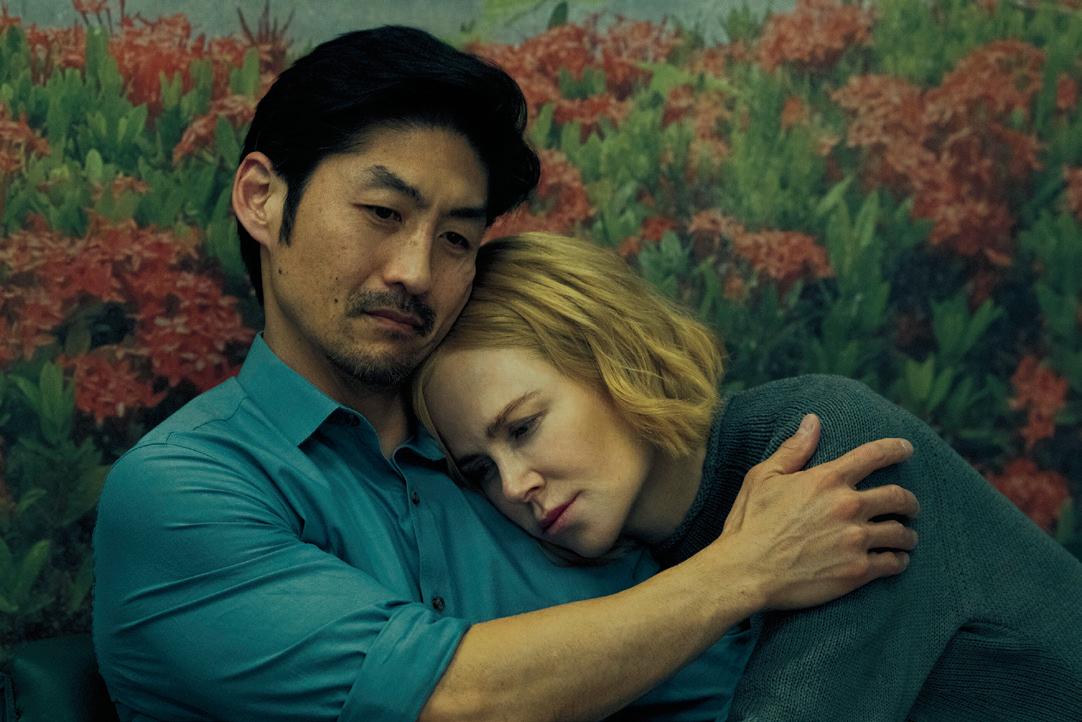
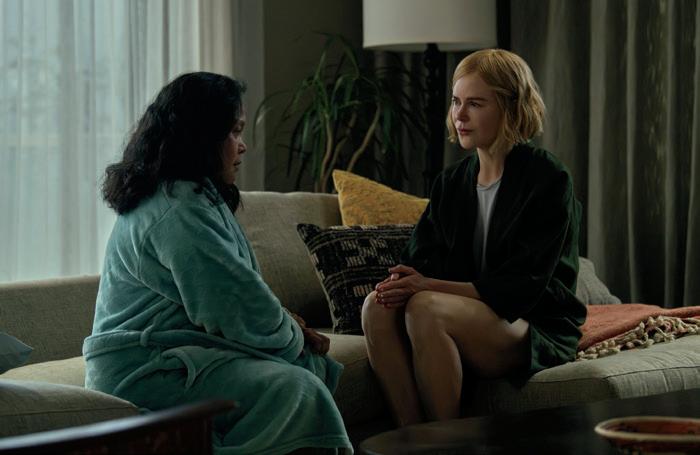
the actor, and it was a way for her to be Margaret rather than executive producer. I think that it just was very separate, and I sort of grew to know that. I didn’t know it initially, but then as we got to know each other, Nicole needed to be able to, because as a producer, you have a lot of power and you’re having to oversee the whole picture. And as an actor even, I would say, “Well, the context for this scene...” And she’s like, “No, no, I don’t need the context, what does Margaret know? I only need to know what Margaret knows, what Margaret feels, because that’s what’s real for the character. If I see too many things, then I’m not in her.”
KIDMAN: And the power cannot be where... I remember saying to Lulu, “You are the leader I have to follow in step with you, because otherwise the dynamic’s going to be stretched. You’ve got to let me come in and go, ‘OK.’” There was a whole team of people that could support her in that area. And when I needed to—if she said, “No, no, now you got to get on the phone and we’ve got to get this”—then I would. But my inclination is always, “Let me come in as your actor and you take the reins and I’ll follow.”
Nic, I’ve heard you say that it was so important to do this because a series led by women was so important, how involved were you in the casting of people that you knew you were going to be together with for a year or so?
KIDMAN: I was involved with that. Lulu and I would talk because a lot of it is very good. Yeah, I can see that. And then that was us together going, “What do you think? What do you feel?”
WANG: And it was great, because we were doing it at that point through Zooms, we’re getting a lot of audition tapes and Zoom videos that were recorded. We would be able to review together and talk about it.
KIDMAN: And I love actors. And then I can go, “Oh, OK, yeah, I see what that is.” But Lulu had strong ideas on what needed to be physically there, what needed to be emotionally there. And she would sort of steer and say, “Well, this is what I need.” And I’m like, “Yeah, then OK, we need to maybe see that again. Let her have another go and see.” And it was finding the right people for the role. Not a name, not that, but who is going to service the story and give the best performance in the ensemble.
So, to find the actress who plays Mercy, Ji-young Yoo, and Sarayu Blue’s Hilary, they’re brilliant. How involved were you in their casting?
KIDMAN: That’s having to rigorously look and then go to Amazon and go, “Listen, these are the best people.” And then I have to say, “OK, let’s go.” And Lulu had to go, “This is what we need to support it, please.” And they did, which we’re very grateful for.
There were no Amazon execs saying, “You need stars” or whatever?
KIDMAN: No, and that’s really admirable because you’re talking a lot of money, and we get it. It has to be called out and acknowledged because this was actually an incredible leap of faith for them.
WANG: And we would have conversations. It’s not like they went, “It’d be great if we had a little bit more of a star. What about this?” I would say, “Well, this is why this is important to the story and the identity of this particular actor has to be this.” And they’d be like, “OK, we get it.” And so that was just wonderful to be able to have that back and forth and be respected.
And what’s so great, Nic and Lulu, is that your cast is so diverse.
They’re South Asian. They’re not all Caucasian. Sometimes you see this sort of casting just for the sake of it. This is legitimate.
KIDMAN: Yes, absolutely. And it’s why they’re so good, and it’s why it’s an ensemble that’s working together. It was all really, I mean, she placed it all knowing. I mean, look at Ruby [Ruiz]. Oh, extraordinary. Yeah!
You're about to go and catch a plane, so what are you up to now, Nic?
KIDMAN: I’m going back to finish Nine Perfect Strangers 2 in Germany and Austria. It’s so beautiful there in the Austrian Alps right now.
And what about Big Little Lies? Is the third season happening?
KIDMAN: Next year. Next year.
OK. And are you two going to work together again?
KIDMAN: [Vigorously nodding] I hope so. I’d walk across hot coals to work with her again.
WANG: I’m writing a movie for Nicole, she doesn’t know.
KIDMAN: She better. I’ll go to that. I’ll walk through fire.
I’m going to ask my annual question about the stage quickly before you get on that plane.
KIDMAN: Yeah. Well, I just saw Sarah Snook [in The Picture of Dorian Gray] and I was floored. So now I’m way too terrified. Sarah was so amazing. Come on. But I also saw Hills of California [by Jez Butterworth and directed by Sam Mendes], which I loved. And then I go, “Oh, got to go. I got to go and do it.” But as I say, “Please don’t let it be 17 years before I get on the stage again.” Photograph 51 was the last time. What was that, in London seven years ago?
A little stage deviation there, Lulu. But how unusual was that set-up, to work with Nicole the thespian who left the executive producer responsibilities at the door?
WANG: I mean, it is slightly terrifying because the roles are so different in terms of power. She’s, as an executive producer, hiring me to direct. She is my boss, but then on set, not that there’s a hierarchy, but I can’t be scared to direct my actor. And even if my actor doesn’t agree with me, I need to be able to say, “Hey, this is my movie. I was hired to do this. You gotta do this.” But if the person that you’re giving that direction to is also the person who hired you, you might be scared to be assertive. And so that’s where I got a little bit nervous. But with Nicole, she had such a clear separation of, “I’m an actor now, I’m in your hands. You tell me what you need me to do.” And then when we weren’t on set as a producer, it was much more like, “OK, what’s happening? How do I help? Who do I call?” It was initially scary, but I think that she balances it really well.
My mom, again, would say things like, “Why are they trusting you?” Because even when my dad saw The Farewell, he was like, “Yeah, it’s emotional, but why do people find this interesting? It’s just real life.” And so, to them, it’s like, “You made a movie about our family that was just real life. And now this huge movie star in a huge studio is giving you the keys to this castle, why?” And so, I think that whenever something like that happens to me, not that I’ve necessarily questioned it, but I feel the responsibility to live up to, and exceed, their expectations and their trust.★
50 DEADLINE.COM/AWARDSLINE PRIME VIDEO
From left: Brian Tee and Kidman; Ruby Ruiz and Kidman.

The Actors Side • The Film That Lit My Fuse • Behind T



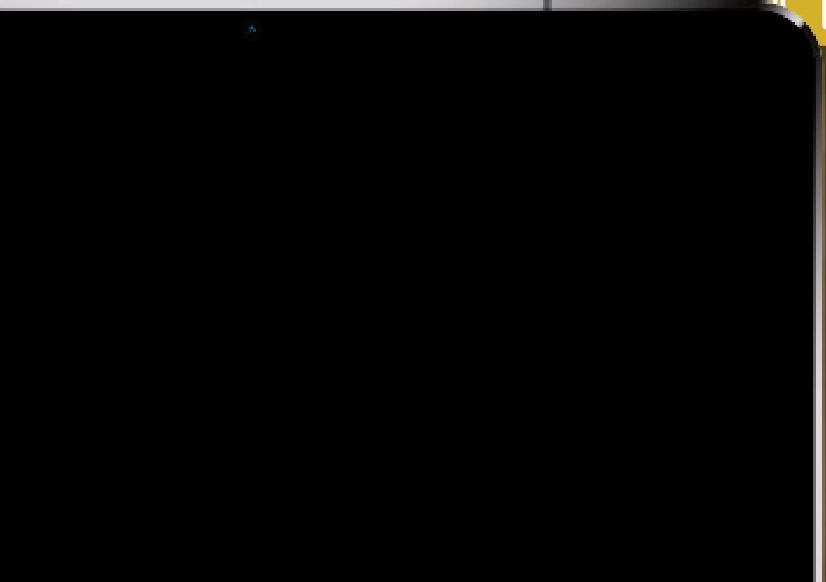



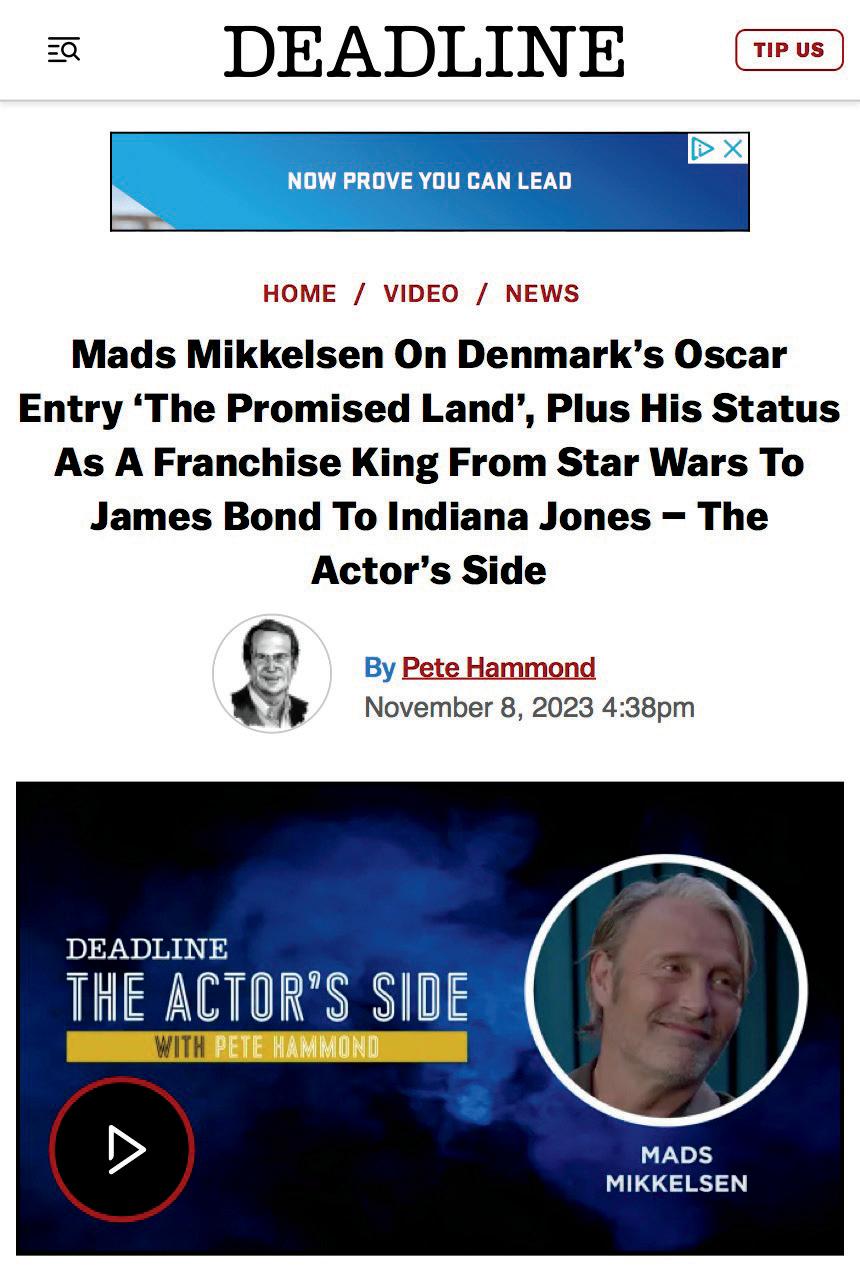

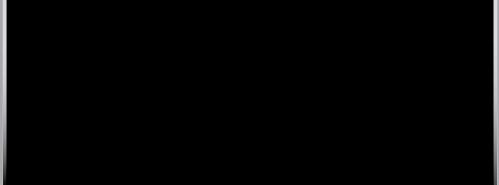










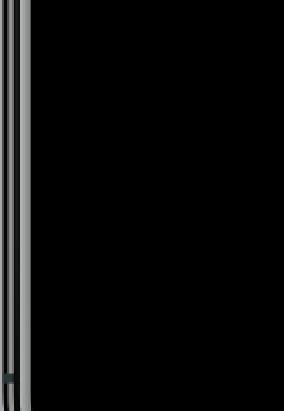
video series
In-depth interviews with entertainments leading actors, directors, writers, below-the-line crew and so many more. Explore Deadline’s video series that take you behind the scenes.
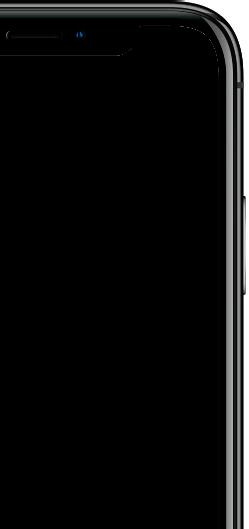

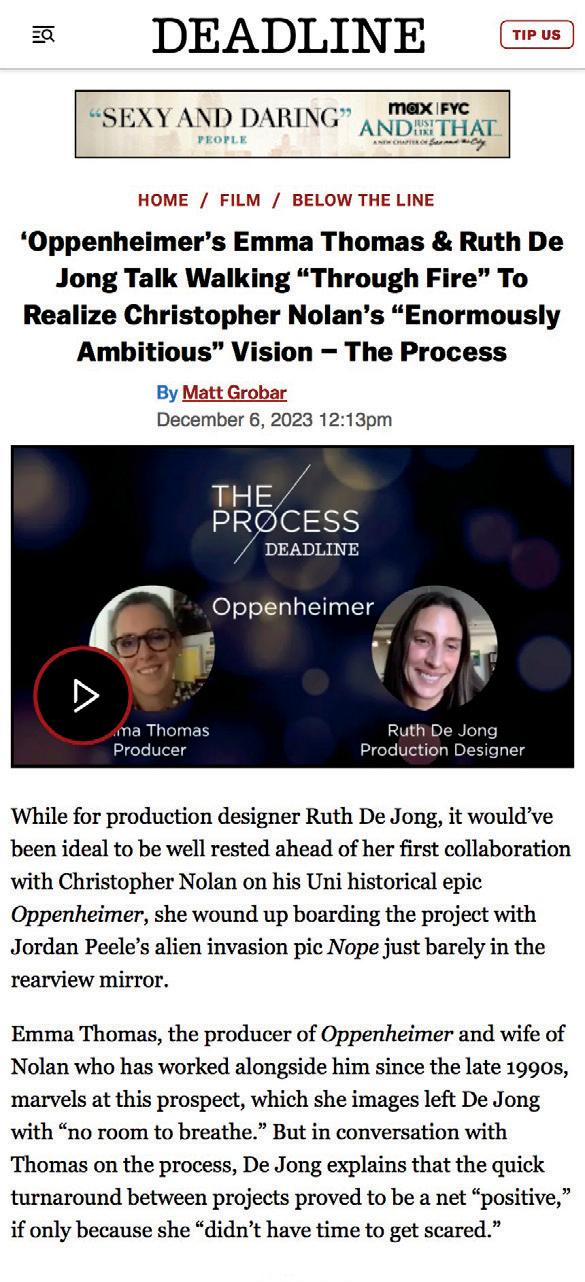
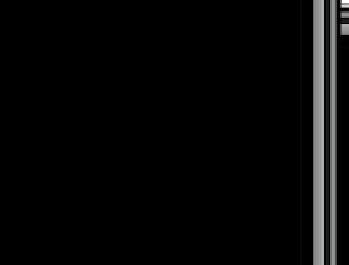
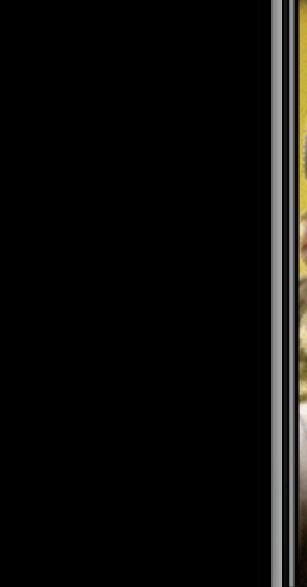










DEADLINE.COM/VIDEO
Lens • The Process • Crew Call • Production Value
The

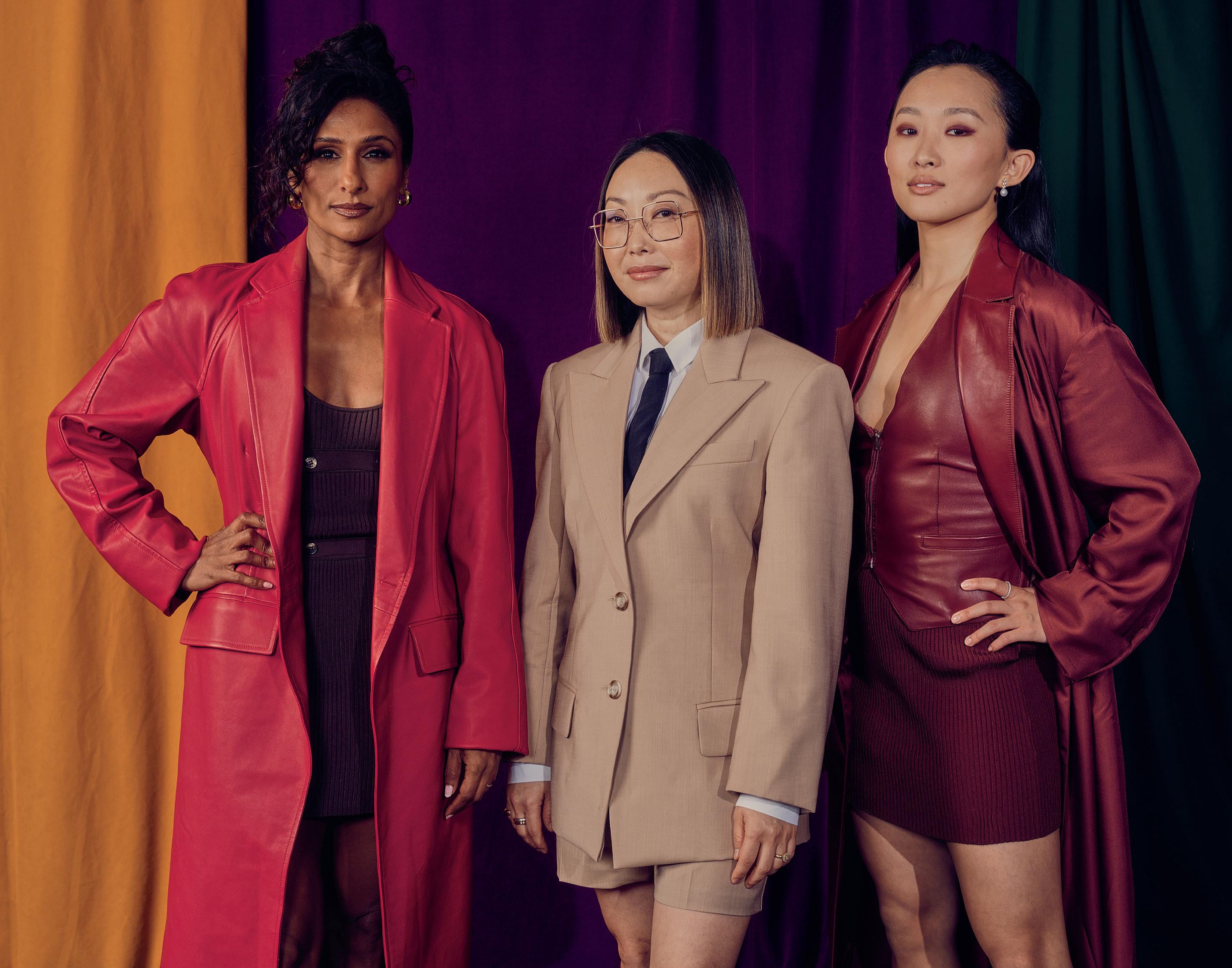
Drama Portrait Gallery
the

54 DEADLINE.COM/AWARDSLINE GUTTER CREDIT HERE
Over two days at
Directors Guild of America, the best and brightest from television’s drama world gathered for Deadline’s flagship TV event
Photographs by MICHAEL BUCKNER
Sarayu Blue, Lulu Wang and Ji-young Yoo
EXPATS
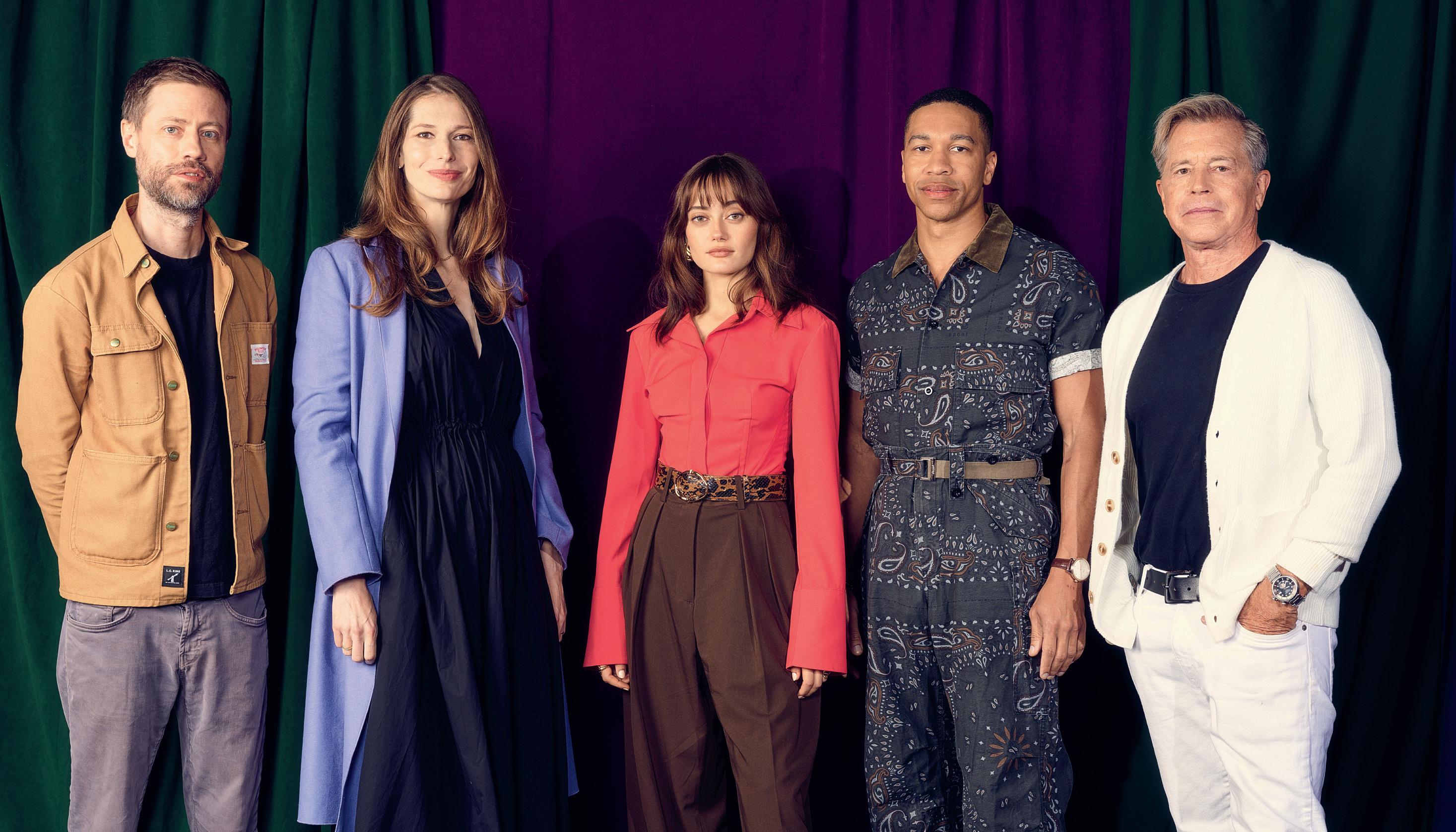
Graham Wagner, Geneva Robertson-Dworet, Ella Purnell, Aaron Moten and Howard Cummings FALLOUT
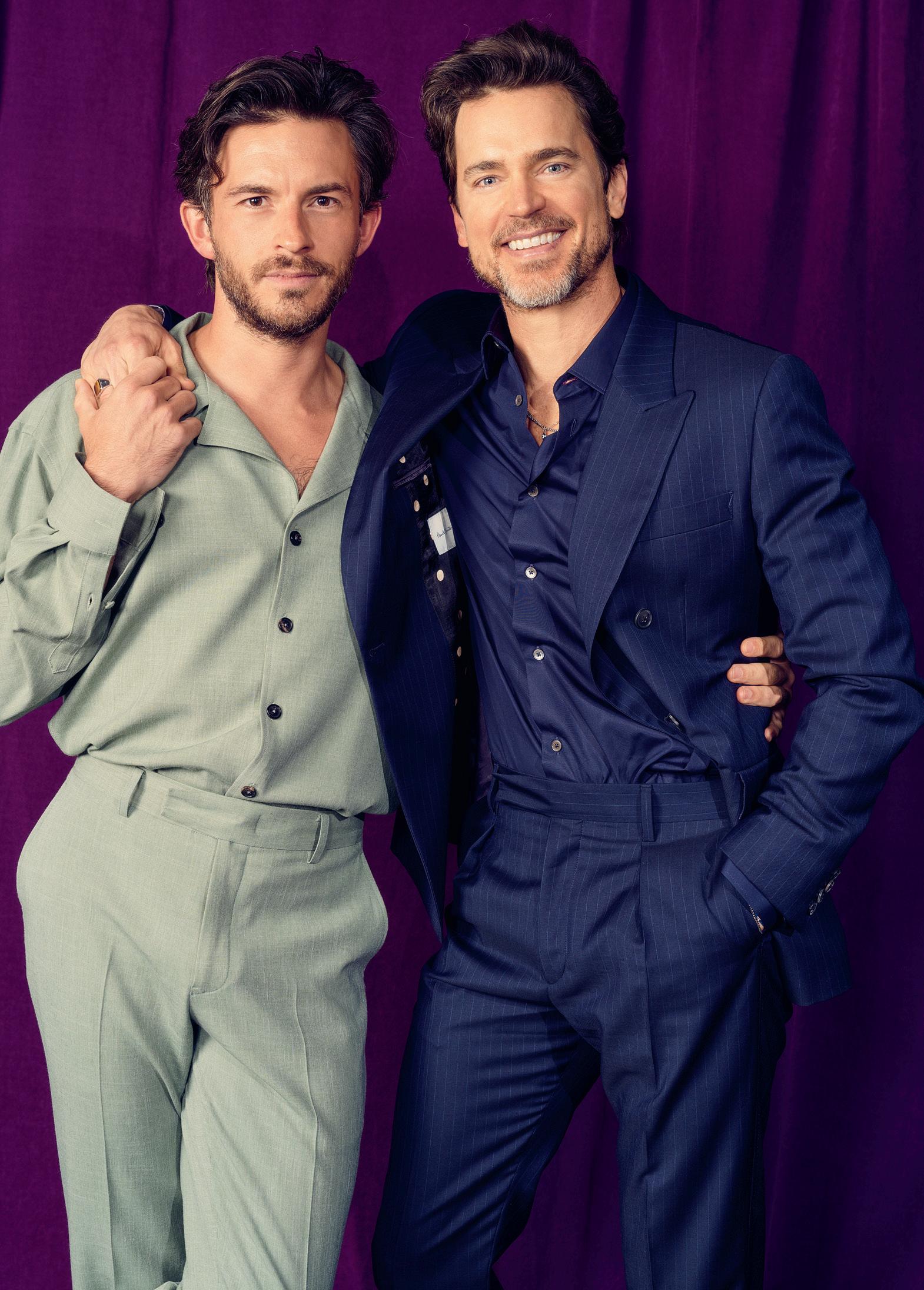
Jonathan
Bailey and Matt Bomer
FELLOW TRAVELRS

55 DEADLINE.COM/AWARDSLINE
Jeff Probst SURVIVOR
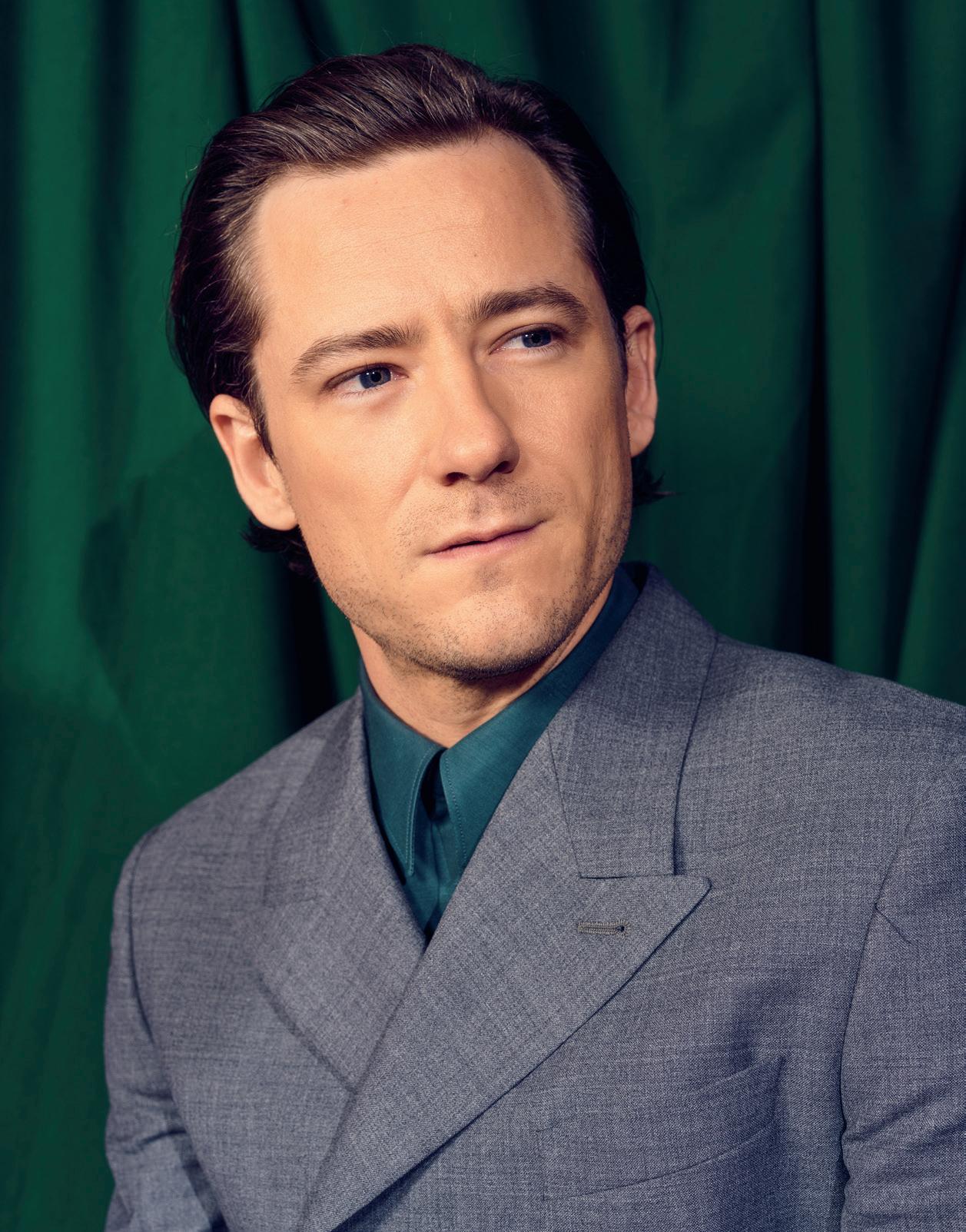
LESSONS IN CHEMISTRY

LESSONS IN CHEMISTRY
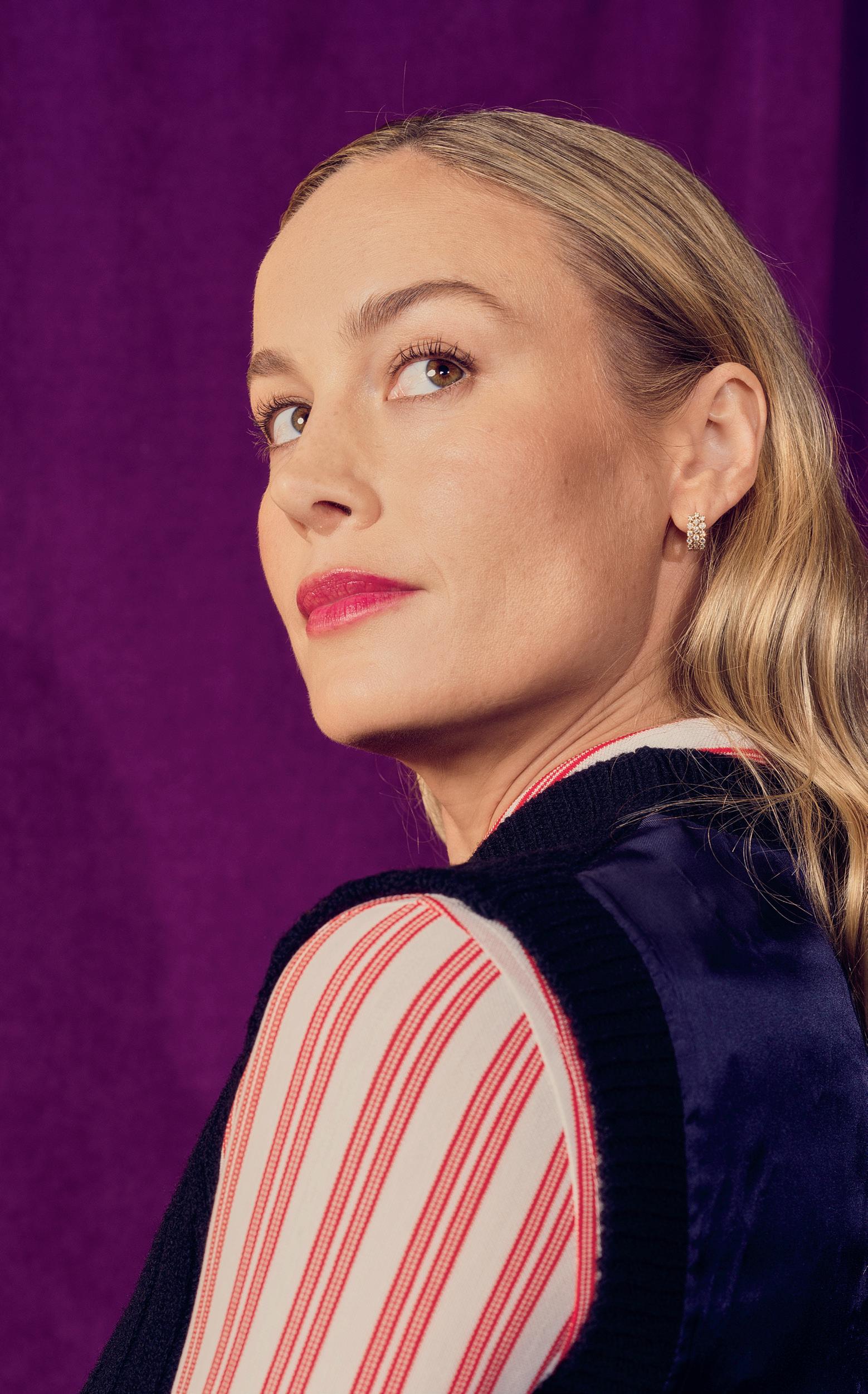

56 DEADLINE.COM/AWARDSLINE
Brie Larson LESSONS IN CHEMISTRY
Giancarlo Esposito and Skeet Ulrich
PARISH
Lewis Pullman
Aja Naomi King

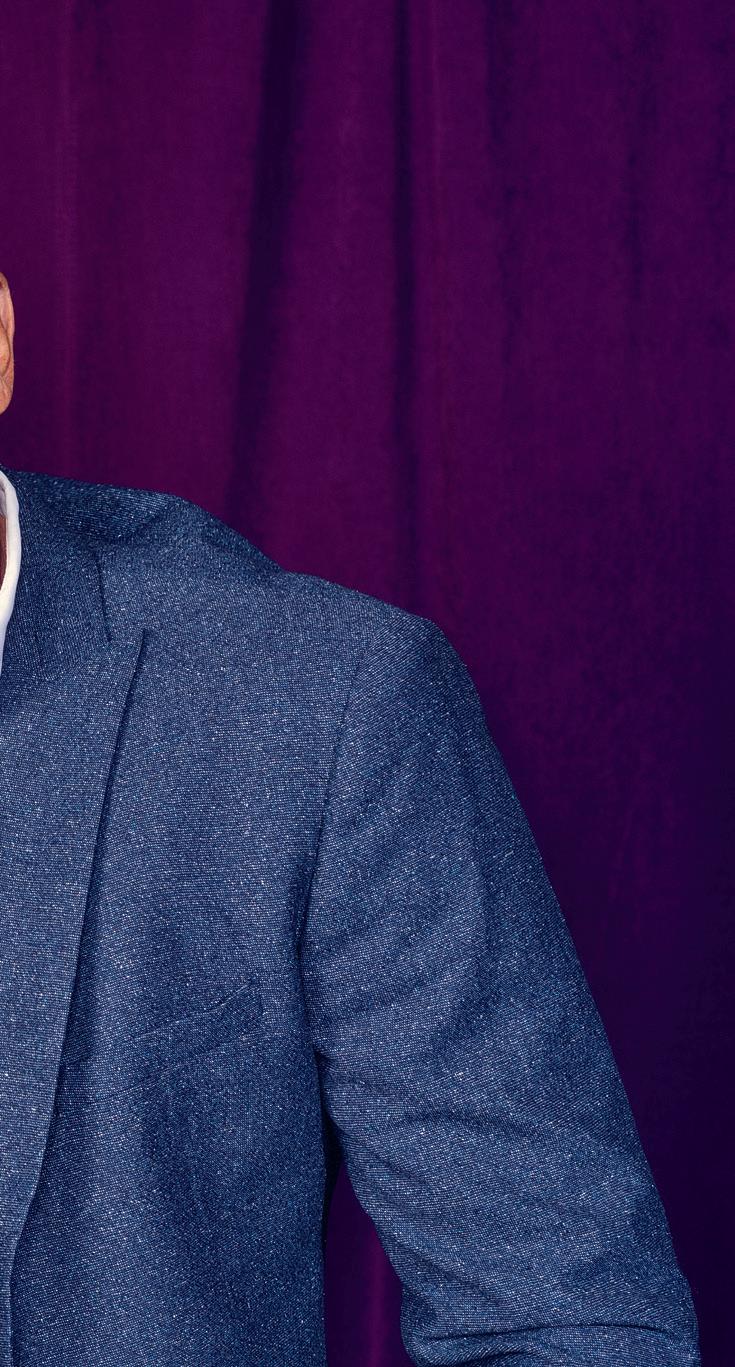
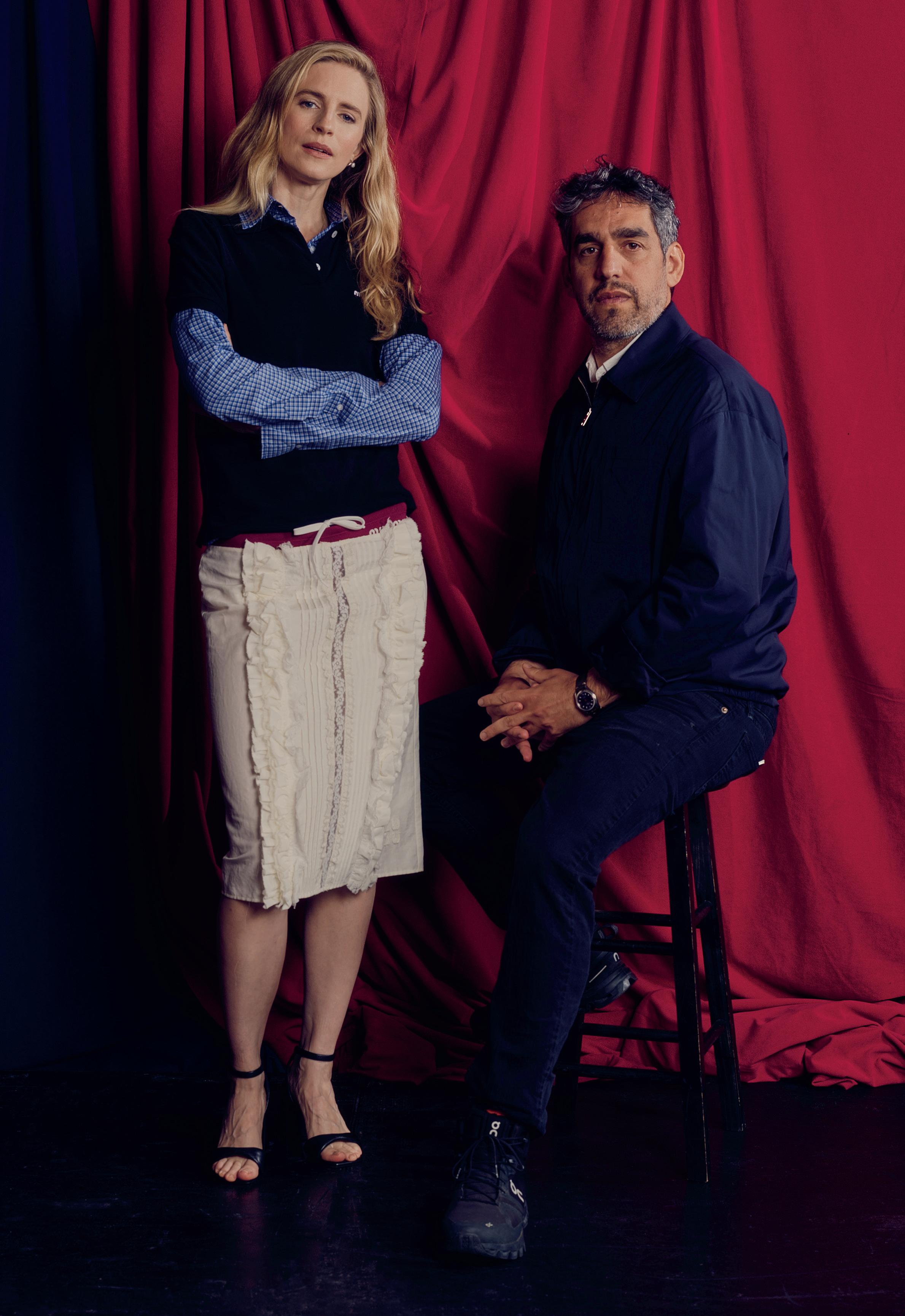
57 DEADLINE.COM/AWARDSLINE
A
AT THE END OF THE WORLD
Brit Marling and Zal Batmanglij
MURDER
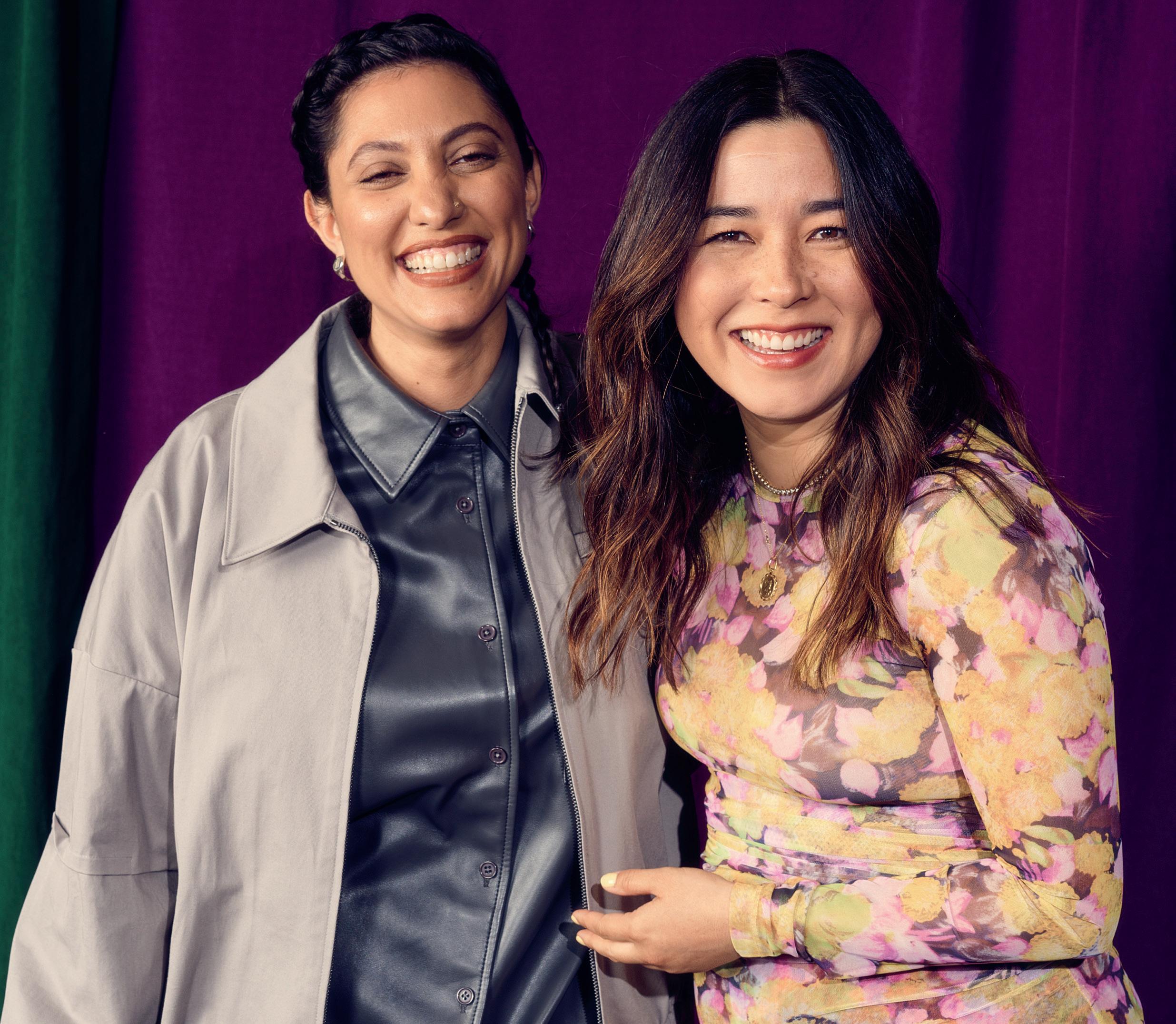
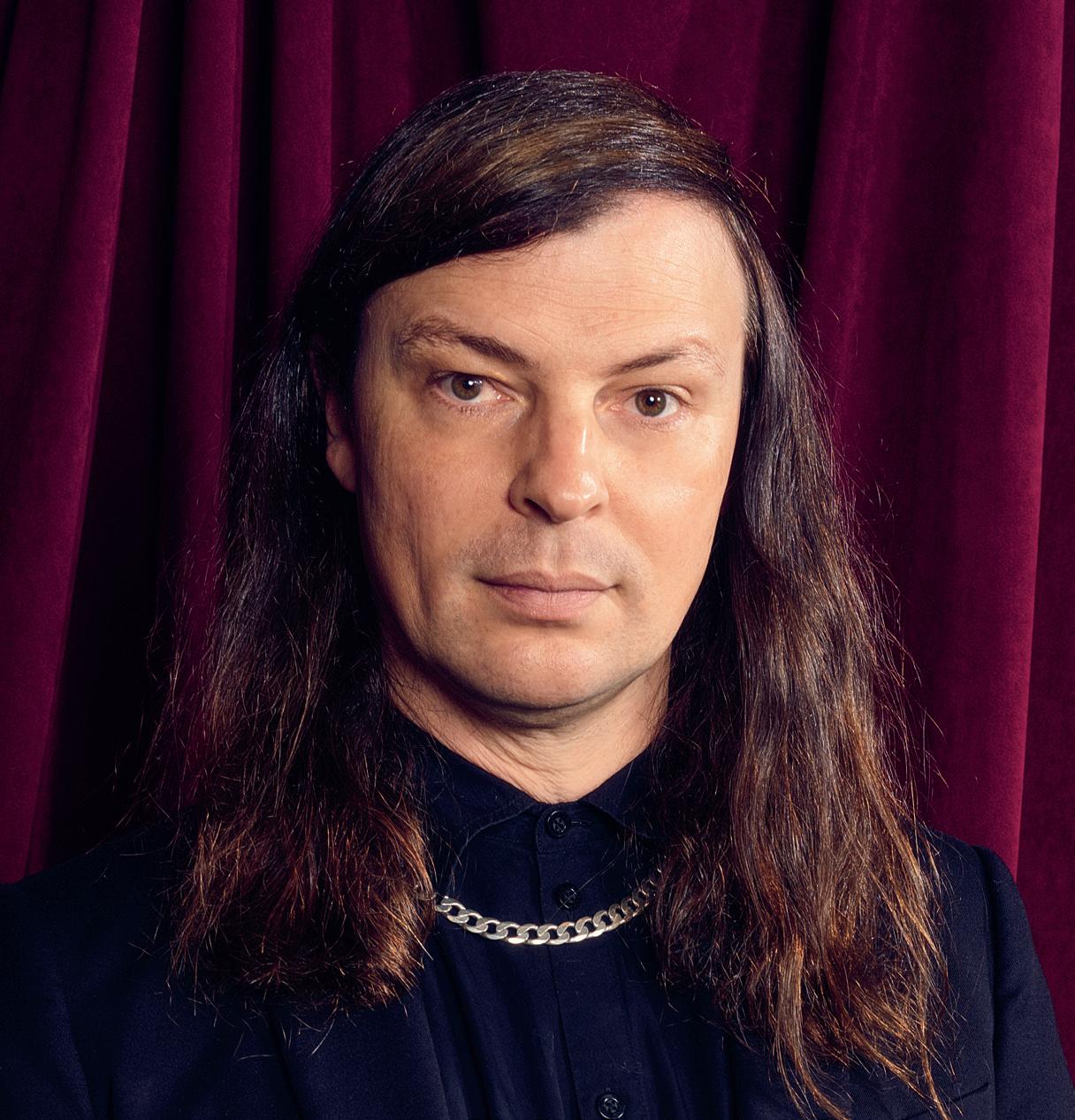
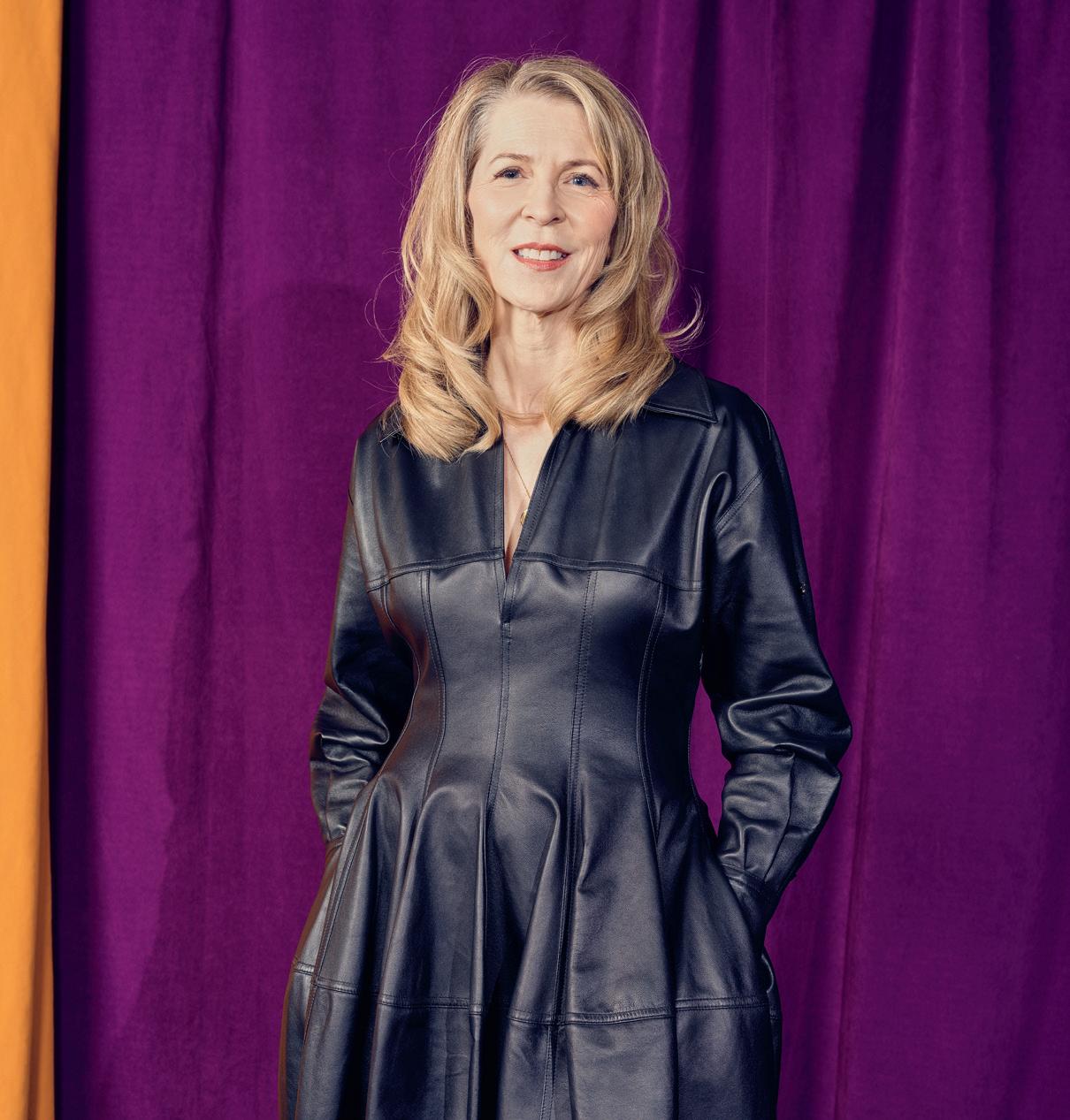


58 DEADLINE.COM/AWARDSLINE
Francesca Sloane and Maya Erskine
MR. & MRS. SMITH
Leopold Ross
MONARCH: LEGACY OF MONSTERS
Charlotte Stoudt THE MORNING SHOW
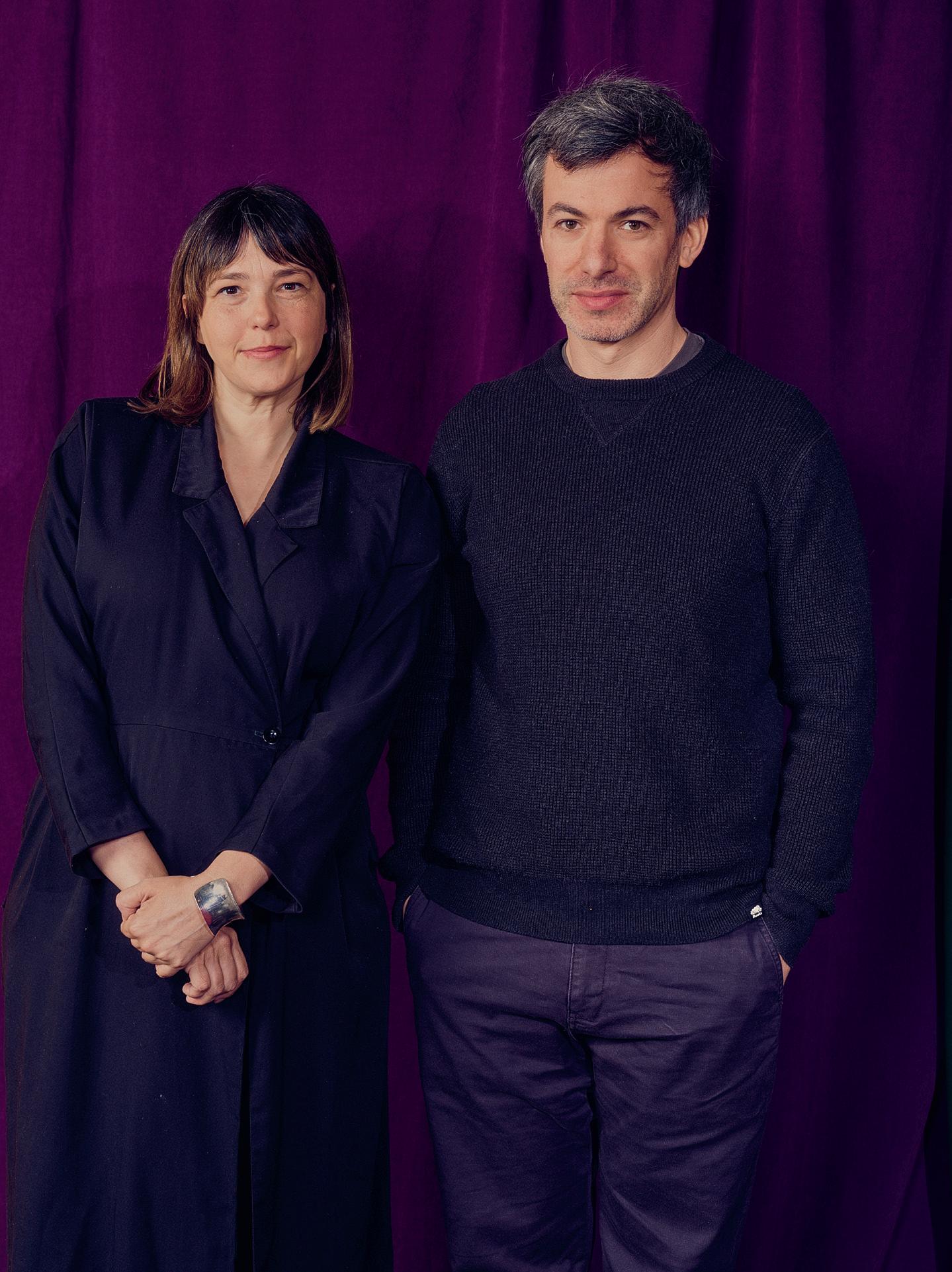
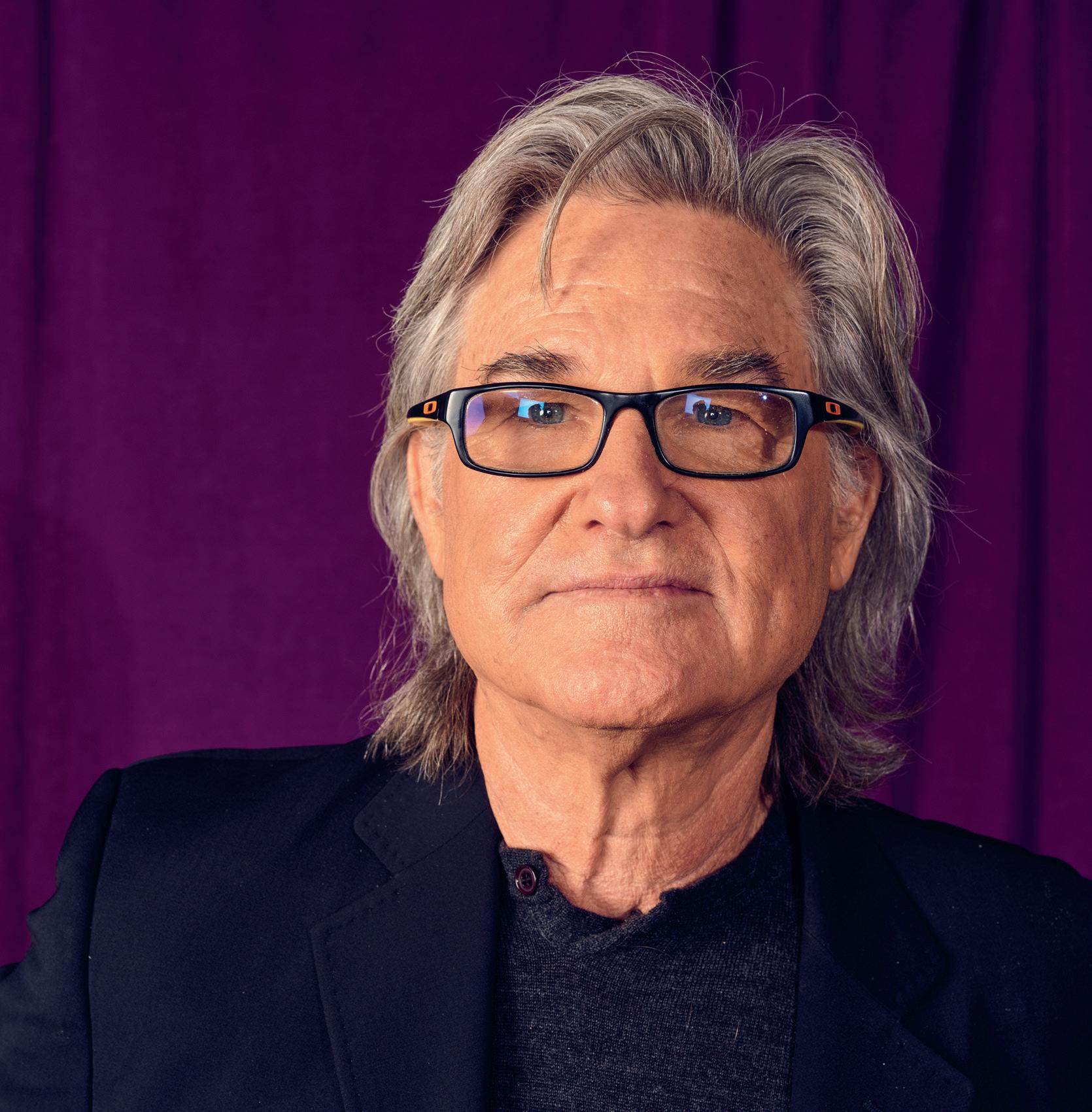
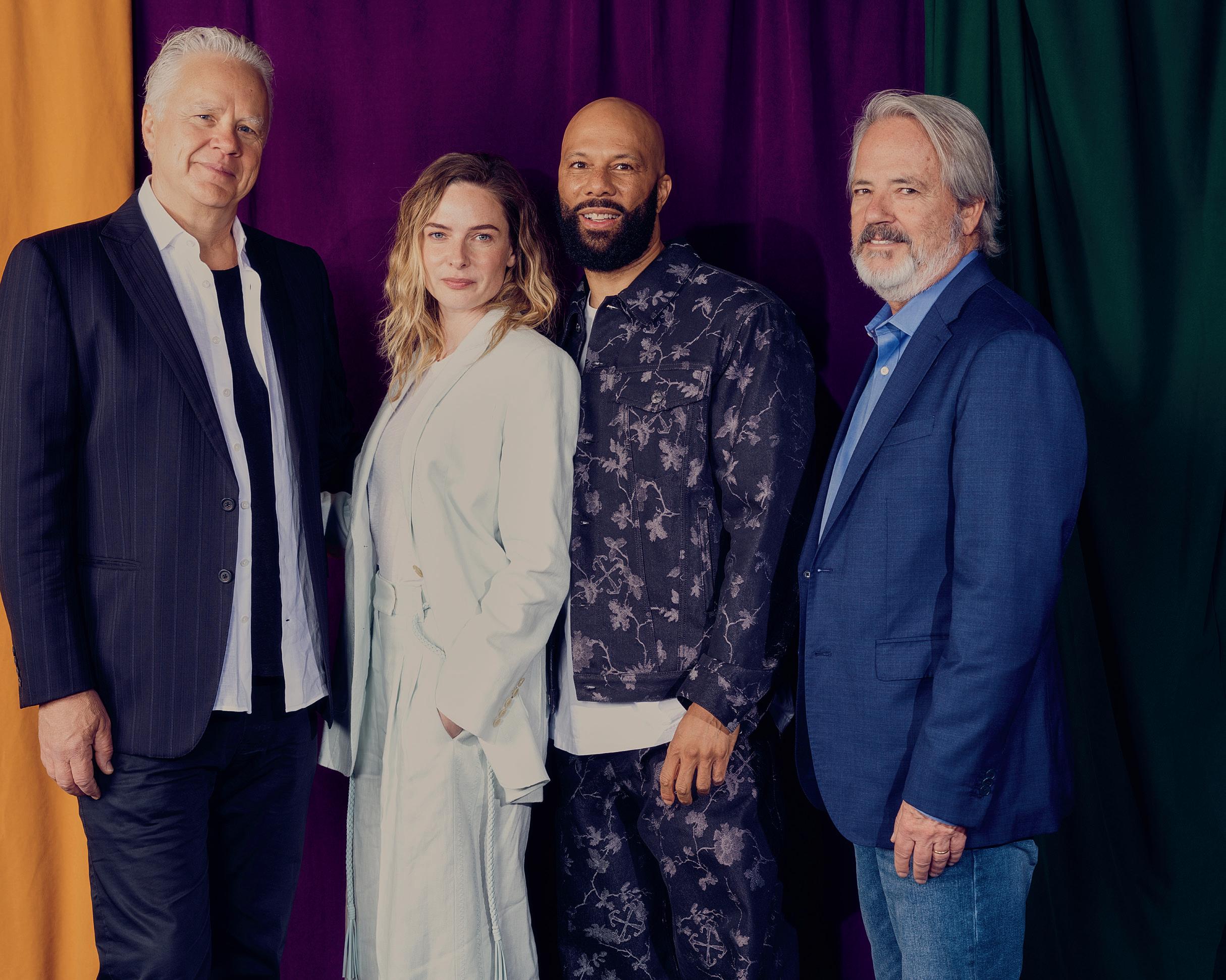
59 DEADLINE.COM/AWARDSLINE
Katie Byron and Nathan Fielder
THE CURSE
Kurt Russell MONARCH: LEGACY OF MONSTERS
Tim Robbins, Rebecca Ferguson, Common and Graham Yost
SILO
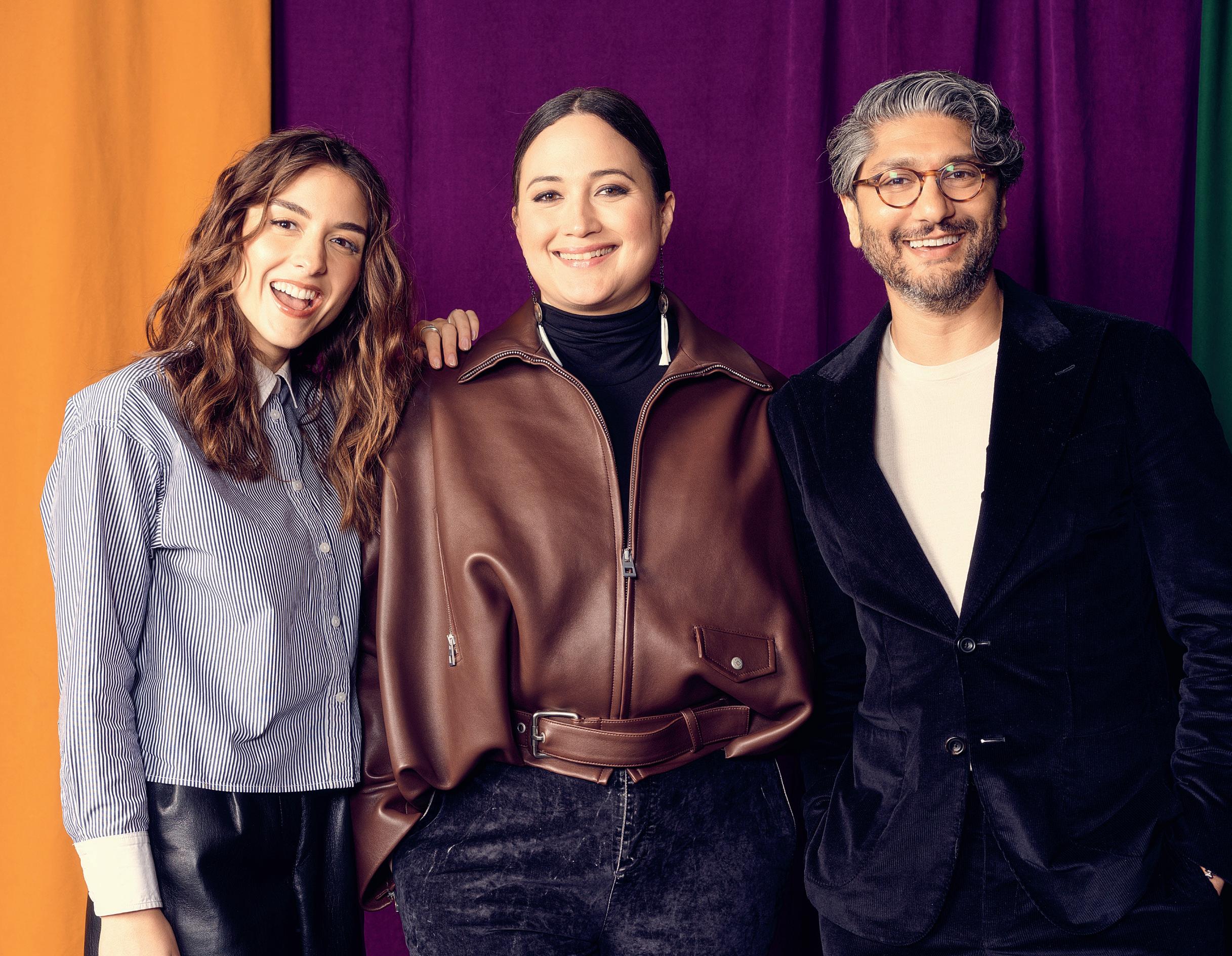

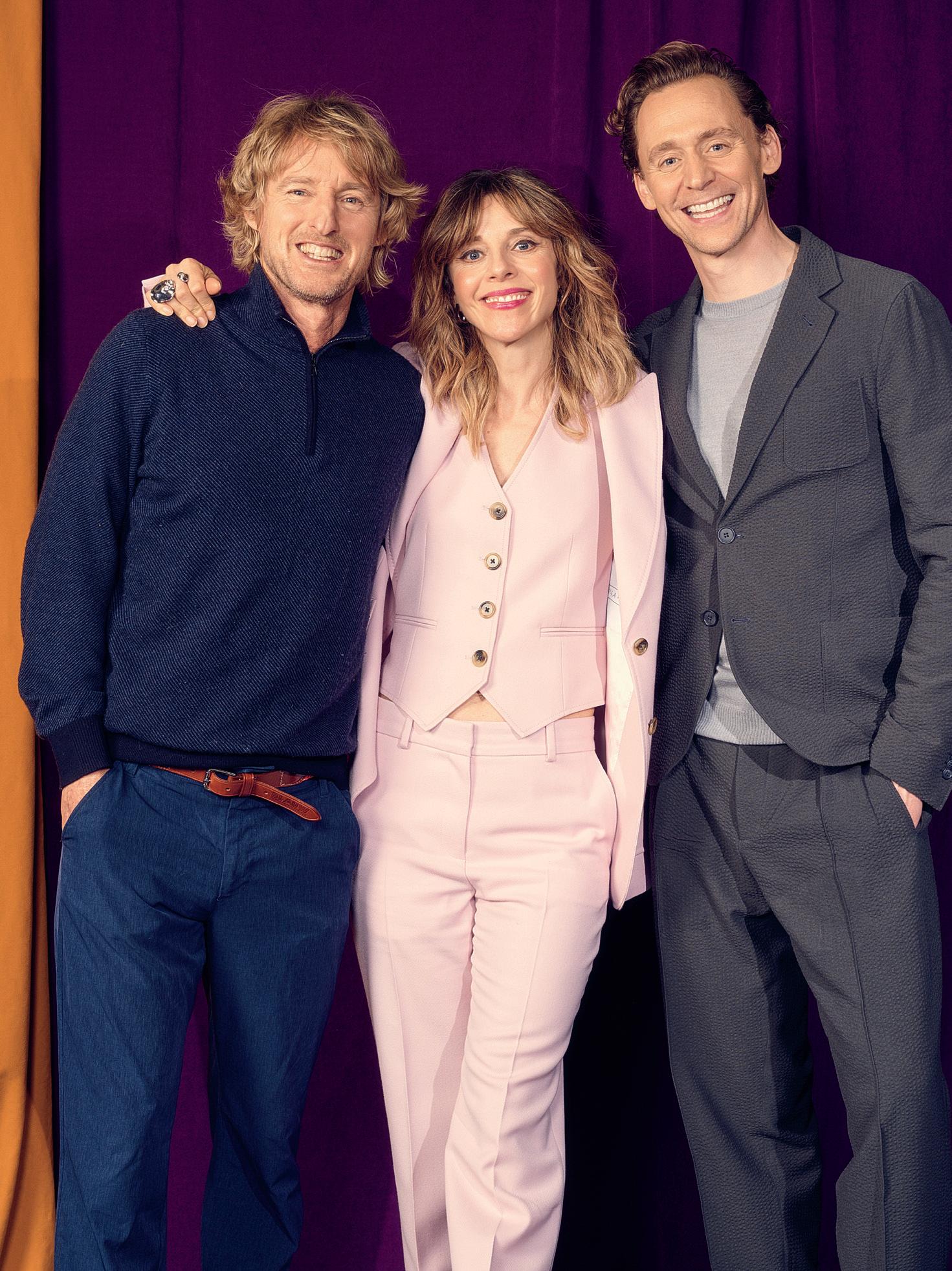
60 DEADLINE.COM/AWARDSLINE
Owen Wilson, Sophia Di Martino and Tom Hiddleston
LOKI
Quinn Shephard, Lily Gladstone and Samir Mehta UNDER THE BRIDGE
Bill Pullman
MURDAUGH MURDERS: THE MOVIE


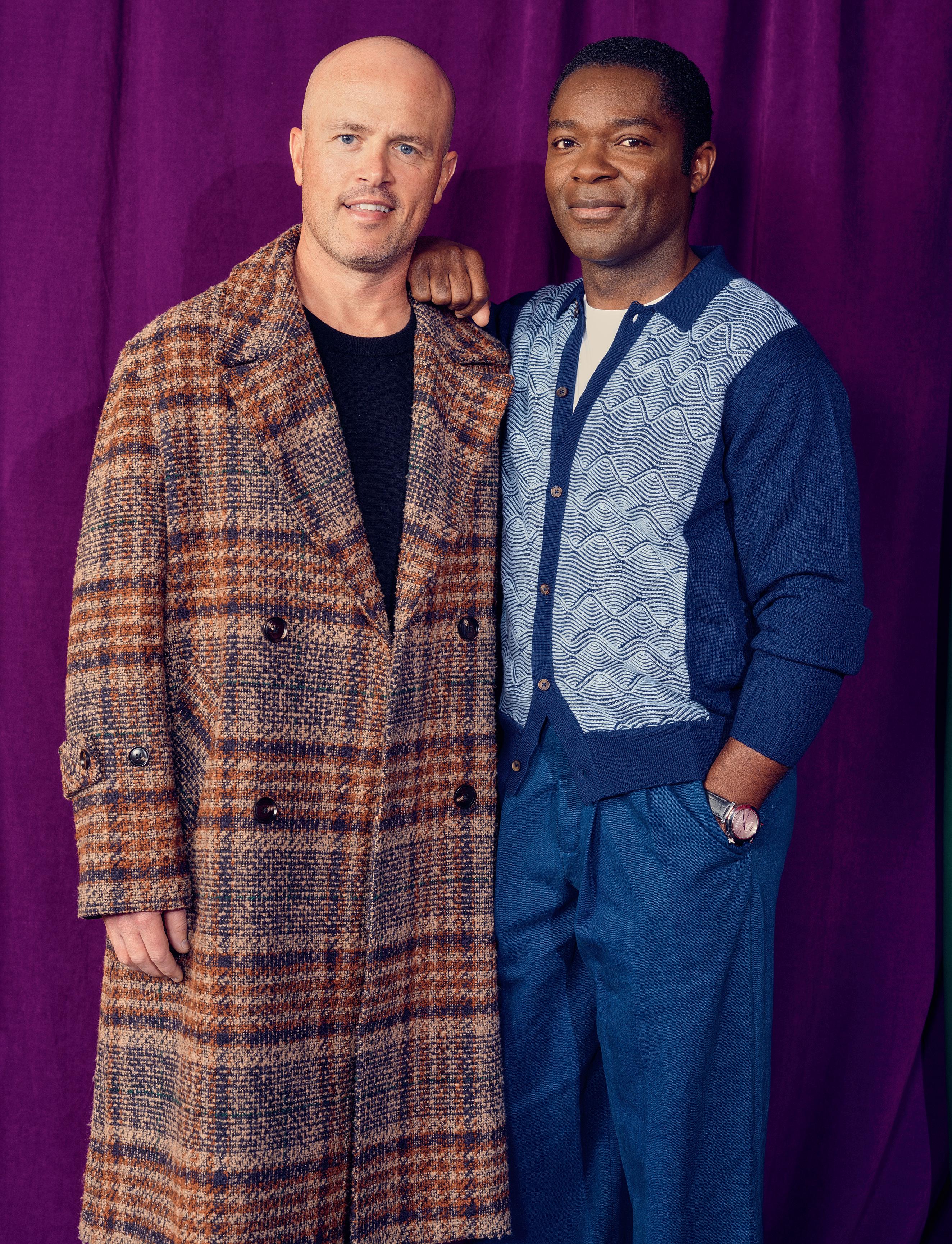
61 DEADLINE.COM/AWARDSLINE
Chad Feehan and David Oyelowo
LAWMEN: BASS REEVES



62 DEADLINE.COM/AWARDSLINE
Joey King and Logan Lerman
WE WERE THE LUCKY ONES

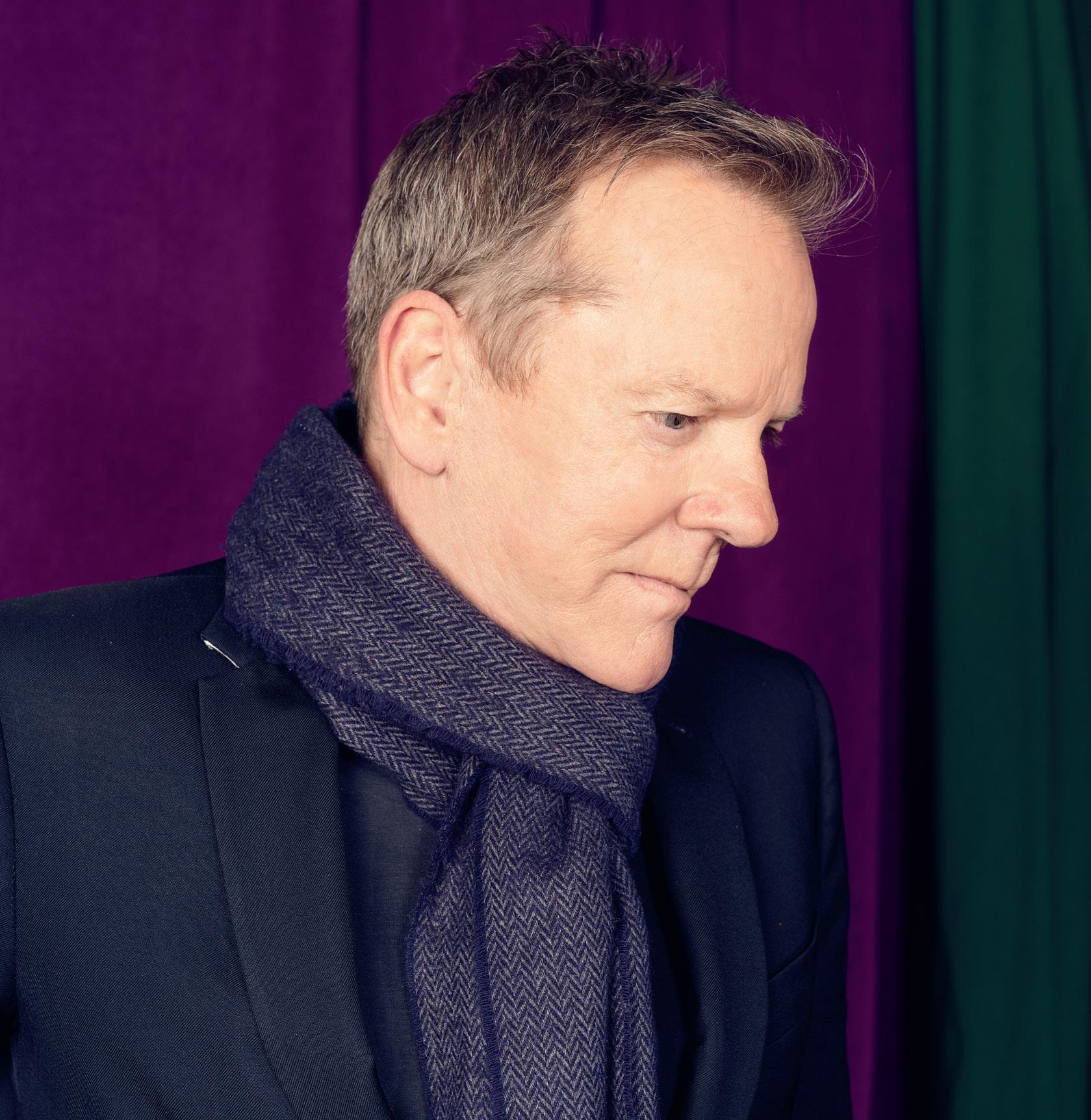
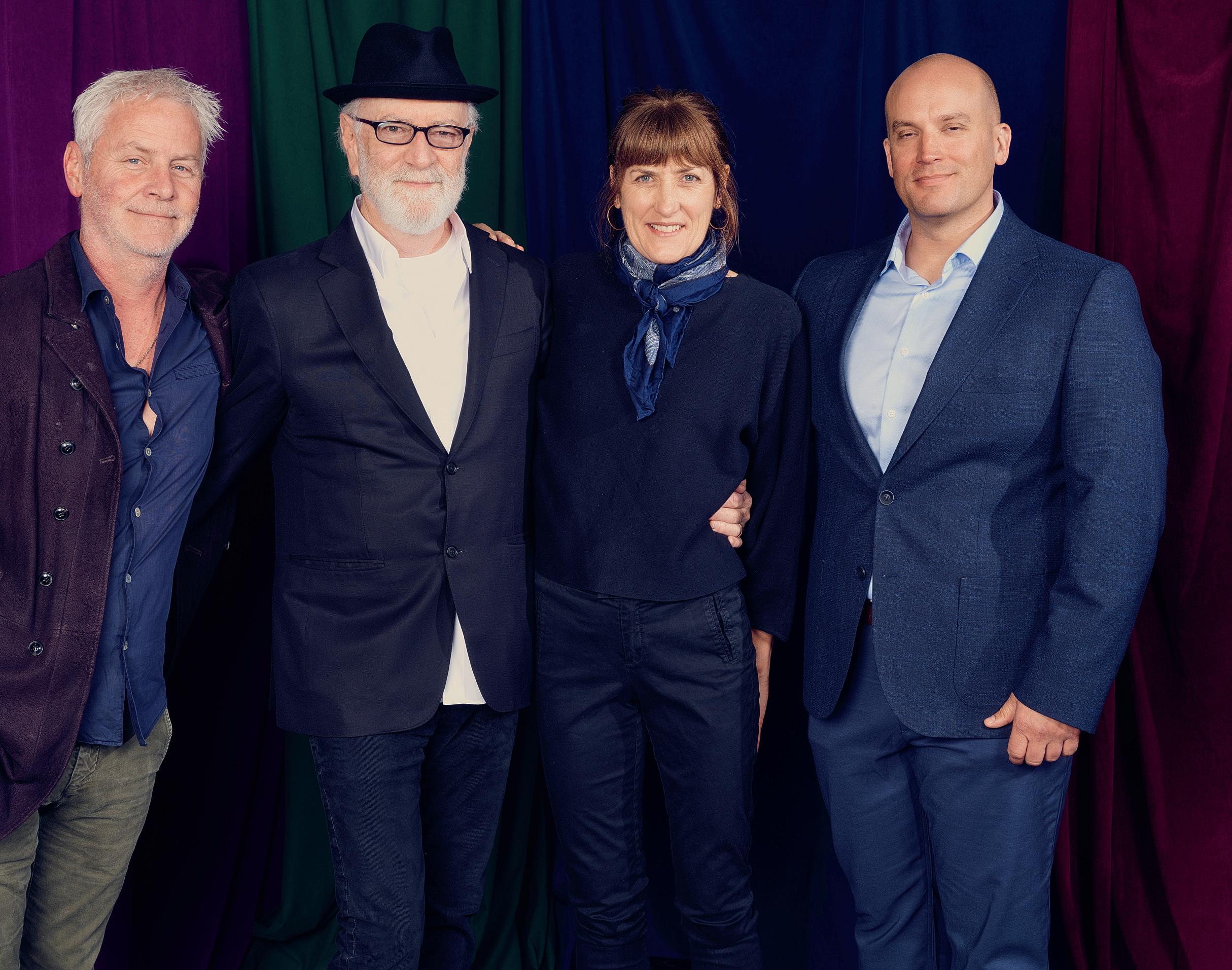
63 DEADLINE.COM/AWARDSLINE
Andrea Riseborough
ALICE & JACK
Kiefer Sutherland THE CAINE MUTINY COURT-MARTIAL
Blake Neely, Gary Goetzman, Jac Fitzgerald and Jack Whittaker
MASTERS OF THE AIR

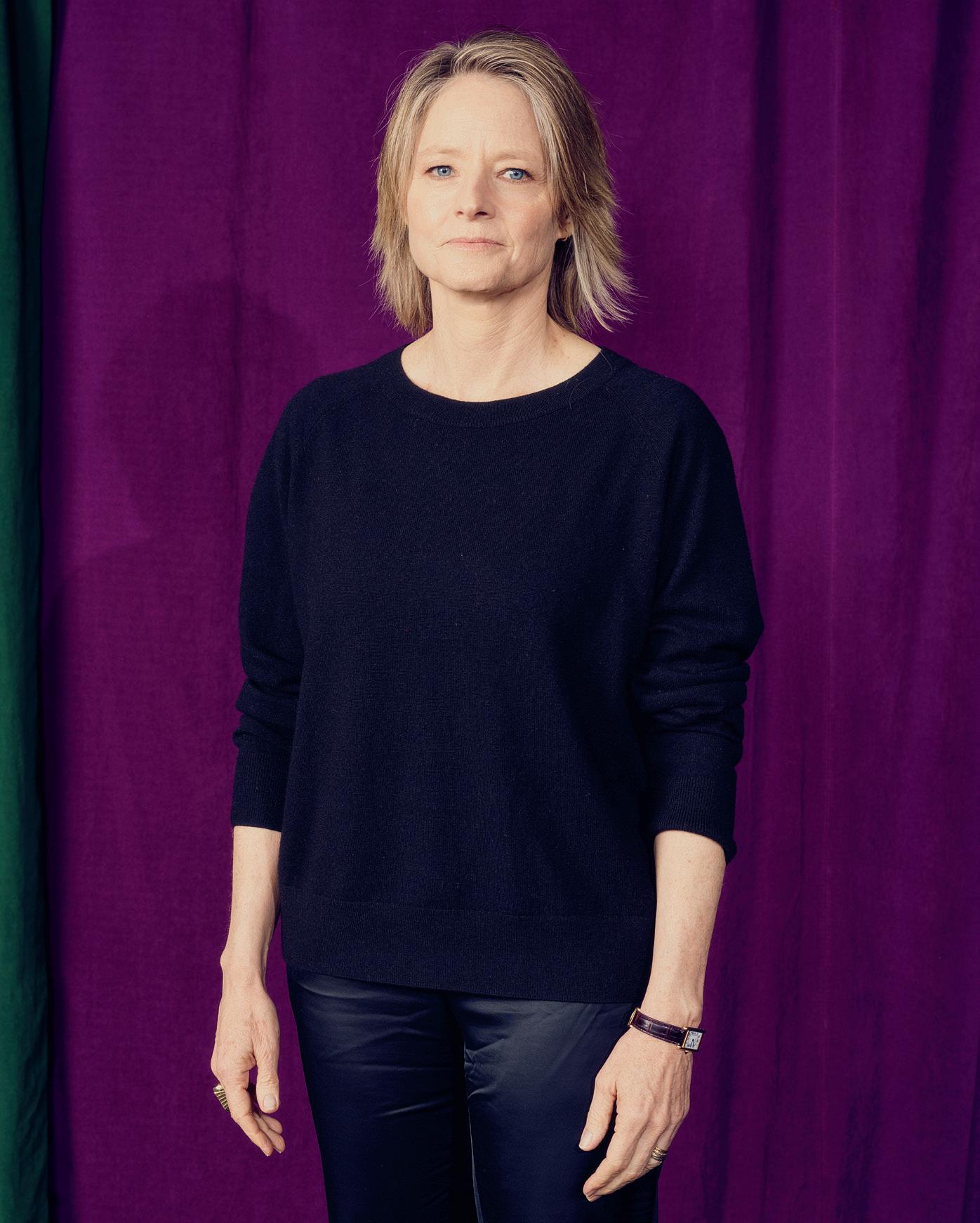
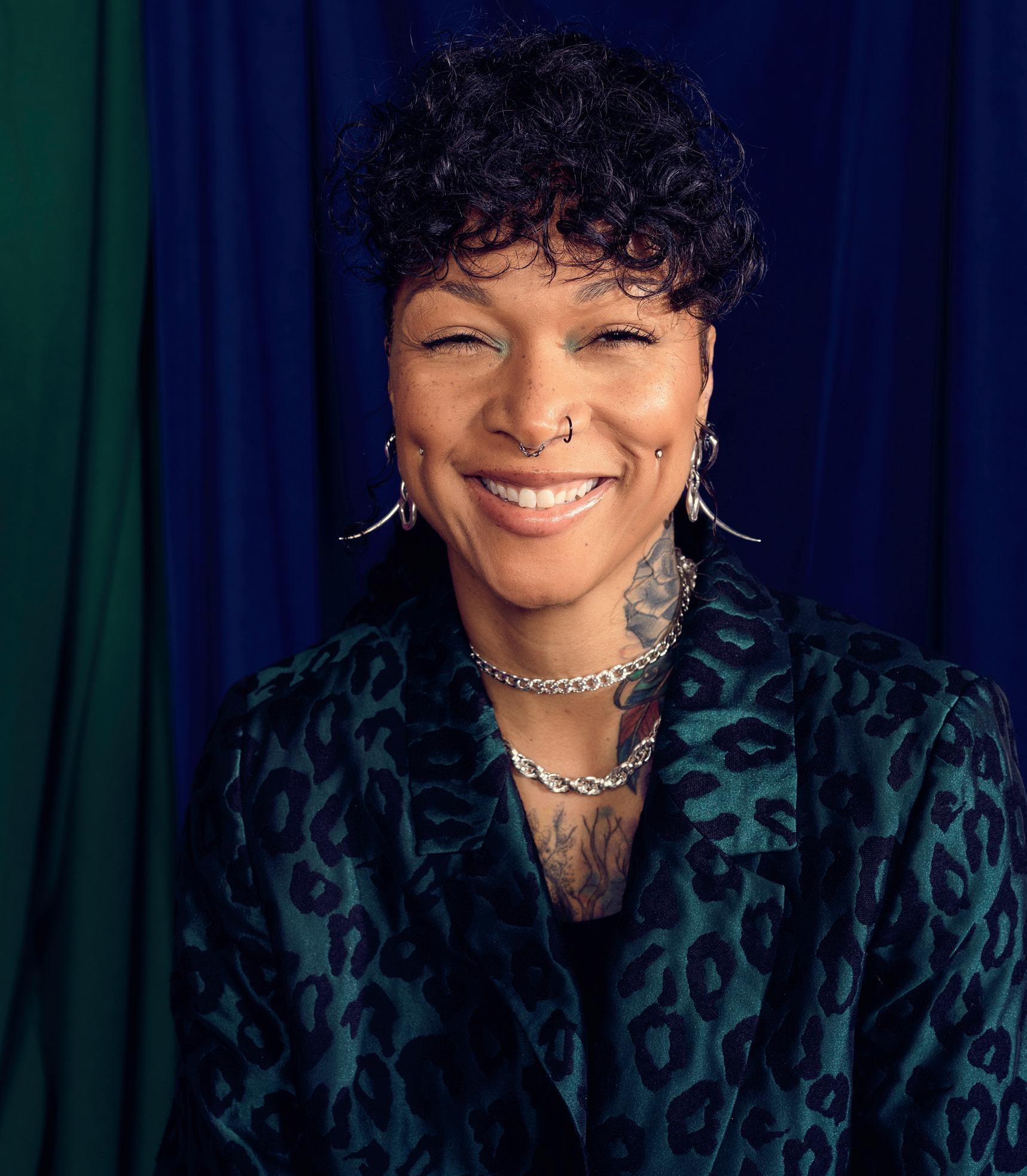
64 DEADLINE.COM/AWARDSLINE
Raphael Jackson Jr., Reggie Rock Bythewood, Gina Prince-Bythewood and Damione Macdeon GENIUS: MLK/X
TRUE DETECTIVE: NIGHT COUNTRY
Jodie Foster
TRUE DETECTIVE: NIGHT COUNTRY
Kali Reis

65 DEADLINE.COM/AWARDSLINE GUTTER CREDIT HERE
NEW LOOK
Lorenzo di Bonaventura and Todd A. Kessler THE
Deadline Studio at Prime Experience May 5-8, 2024 NYA West, Hollywood
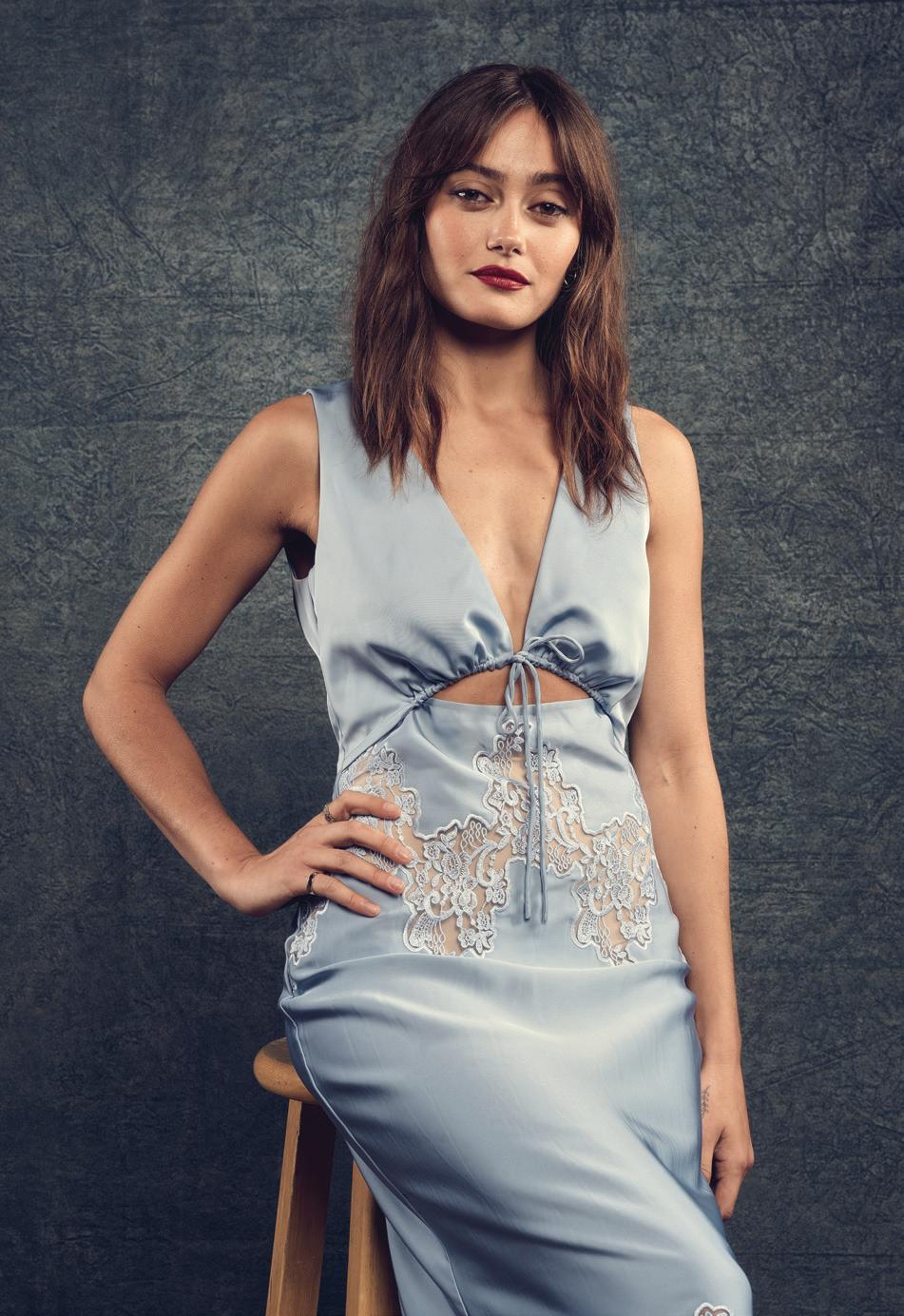
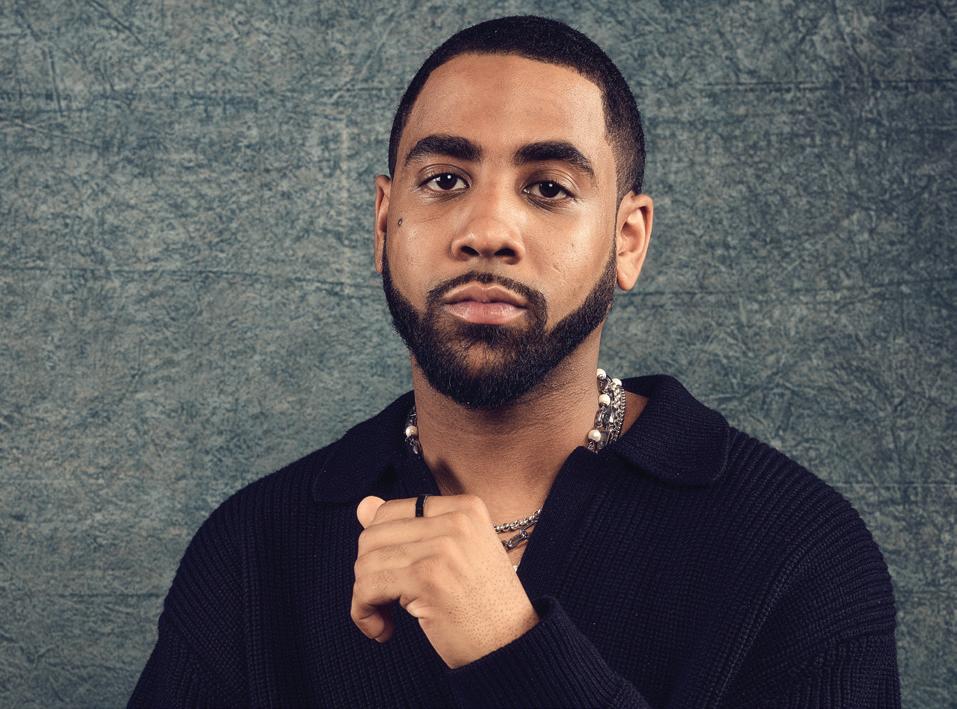
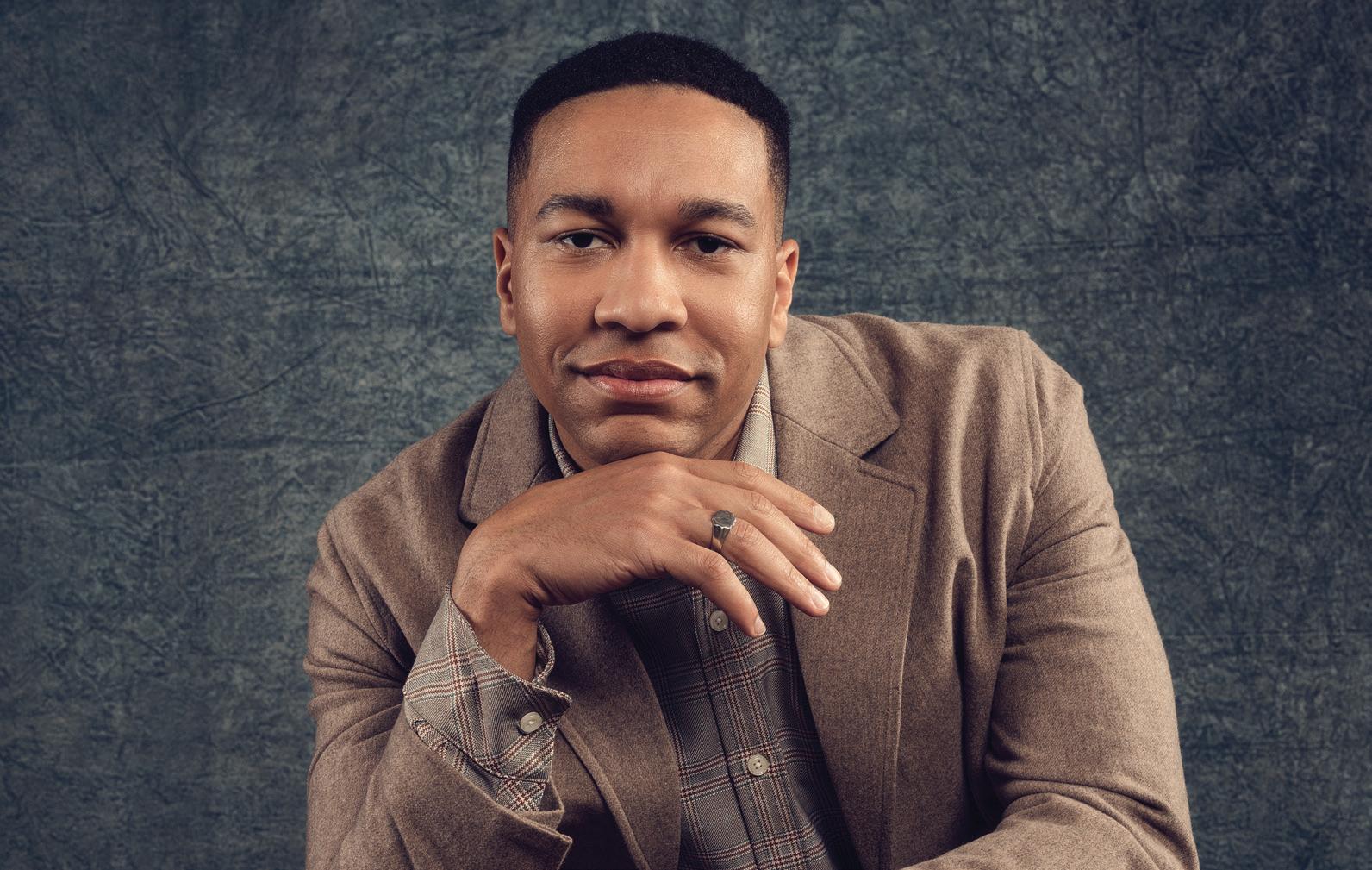
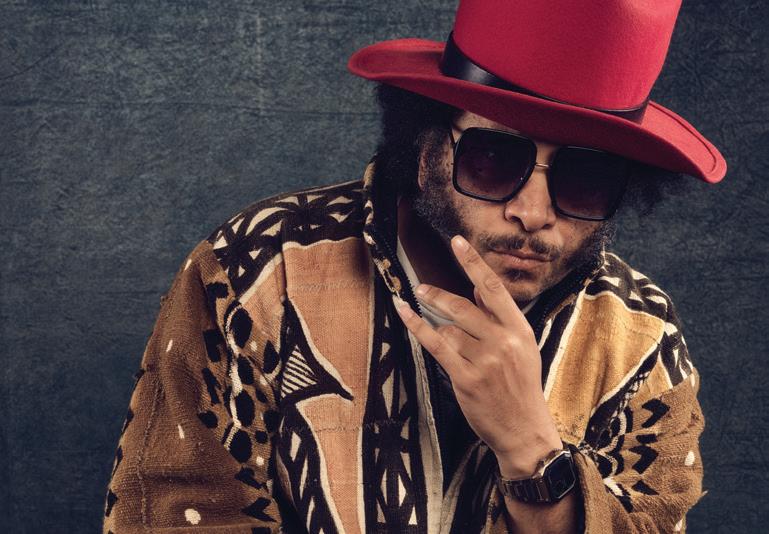
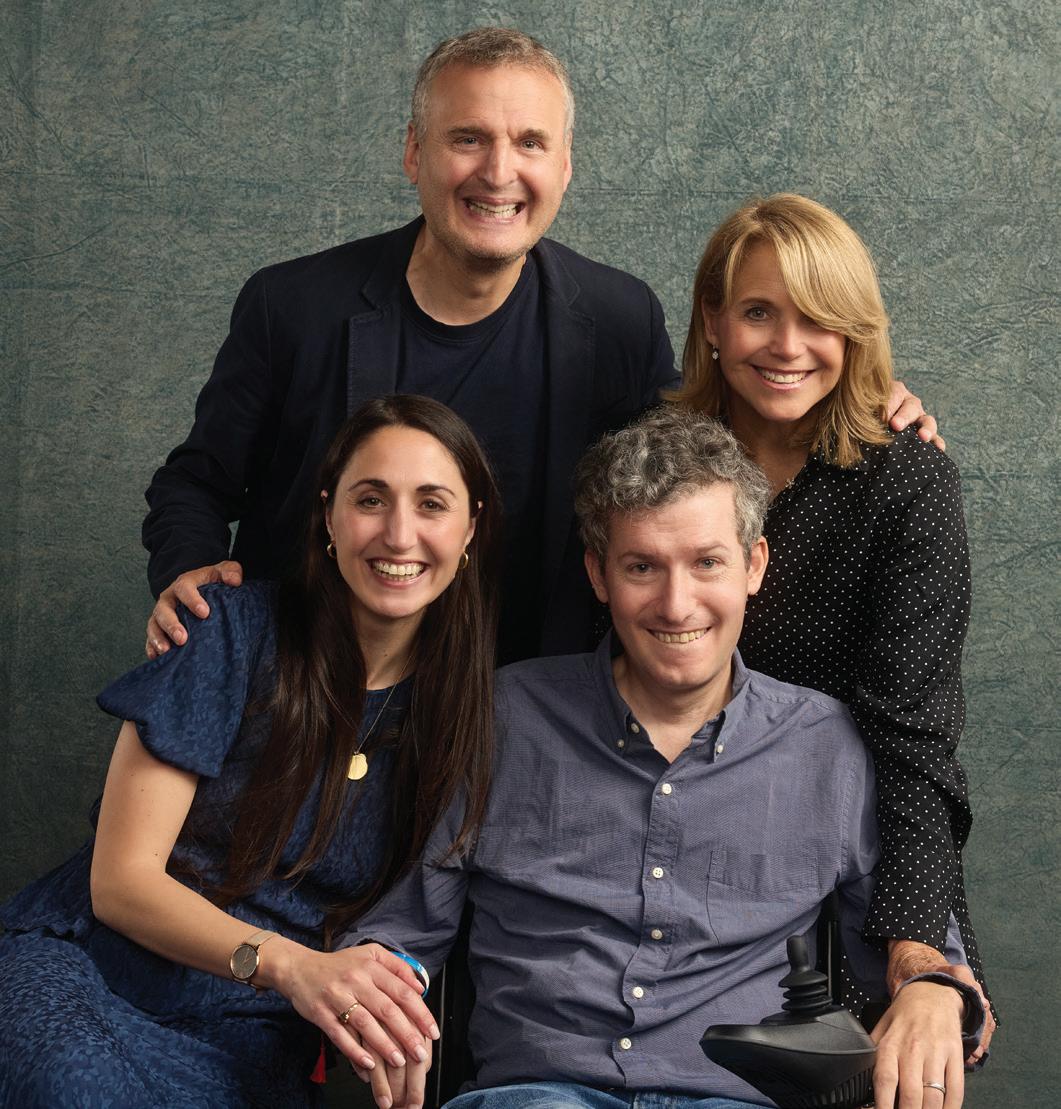

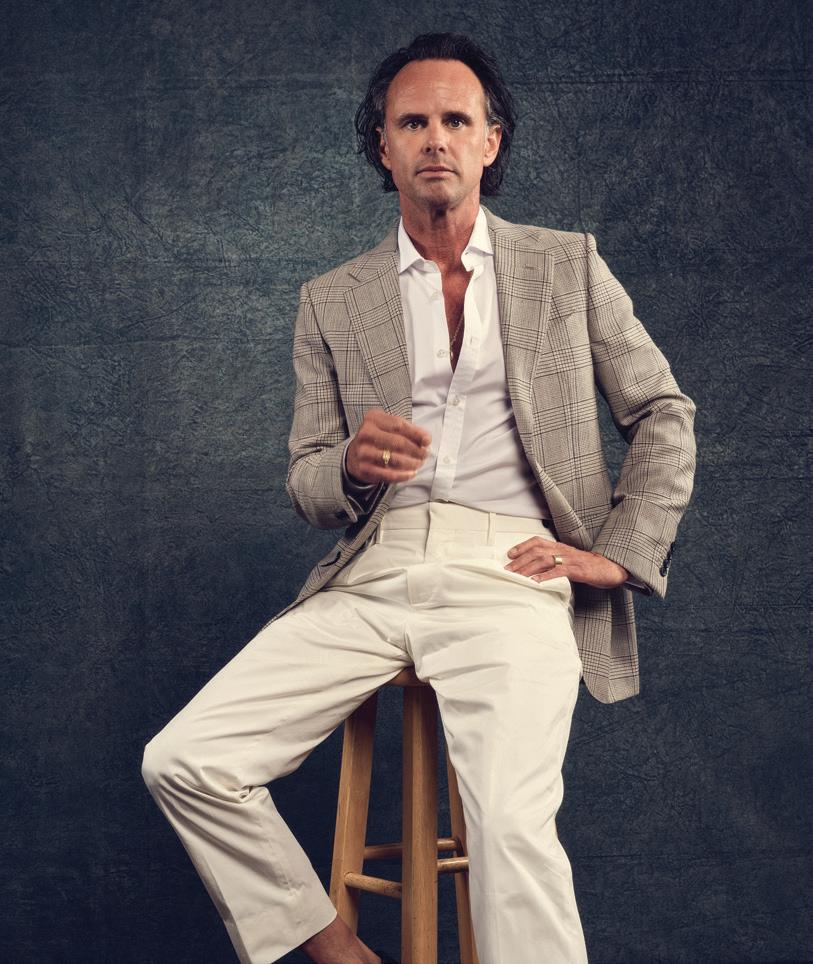
66 DEADLINE.COM/AWARDSLINE PARTNER CONTENT
MICHAEL BUCKNER/ANTHONY AVELLANO
1 3 4 7 2 6 5
1. Aaron Moten, Fallout
2. Ella Purnell, Fallout
3. Boots Riley, I'm a Virgo
4. Olivia Washington, I'm a Virgo
5. Jharrel Jerome, I'm a Virgo
6. Phil Rosenthal, Katie Couric, Sandra Abrevaya and Brian Wallach, For Love & Life: No Ordinary Campaign
7. Walton Goggins, Fallout
BREAKING NEWS SITE
For all the latest happenings on the international film and television scene, Deadline is your source. From box office numbers, to television premieres, to renewals and festival coverage, and everything in between
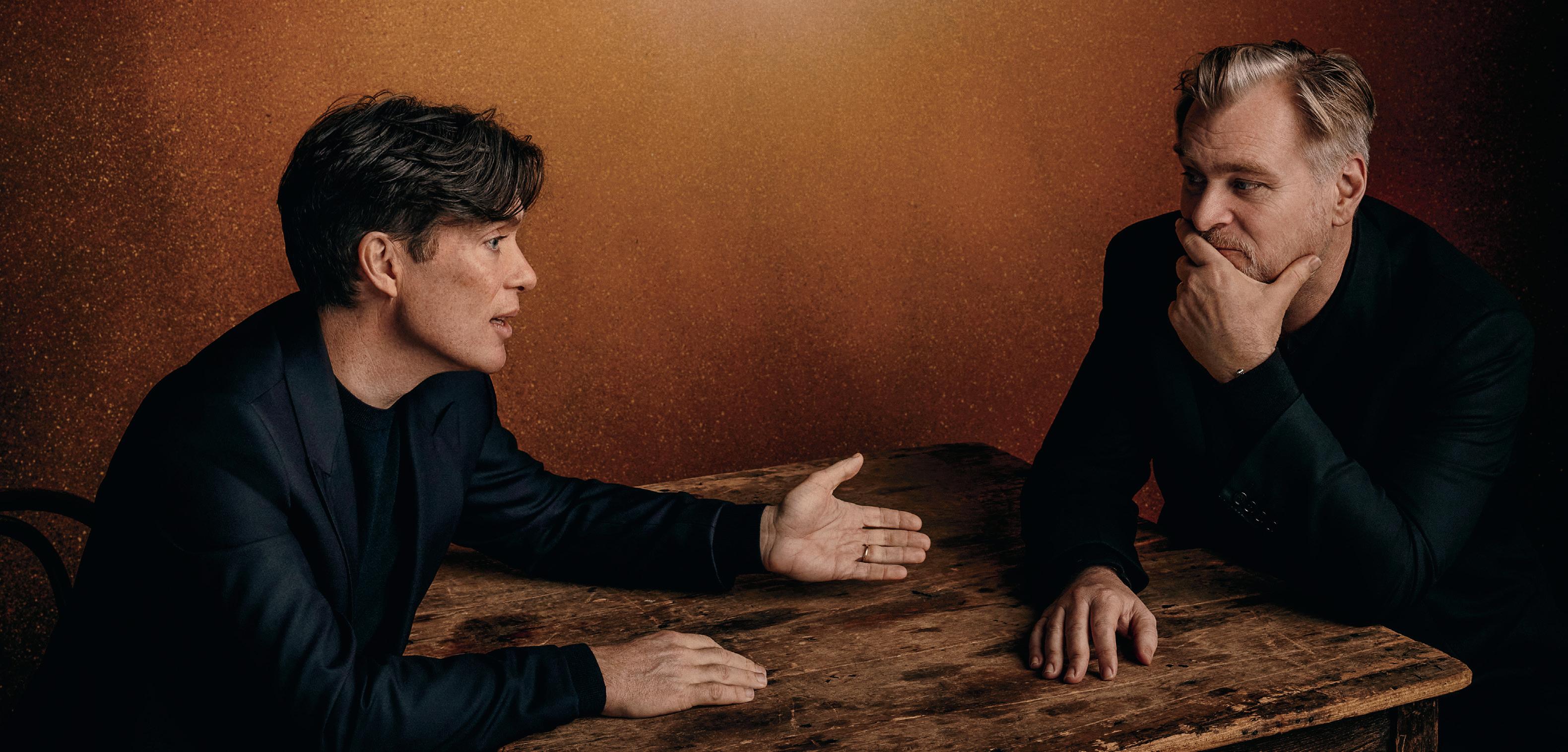

ENTERTAINMENT’S
DEADLINE.COM
#1



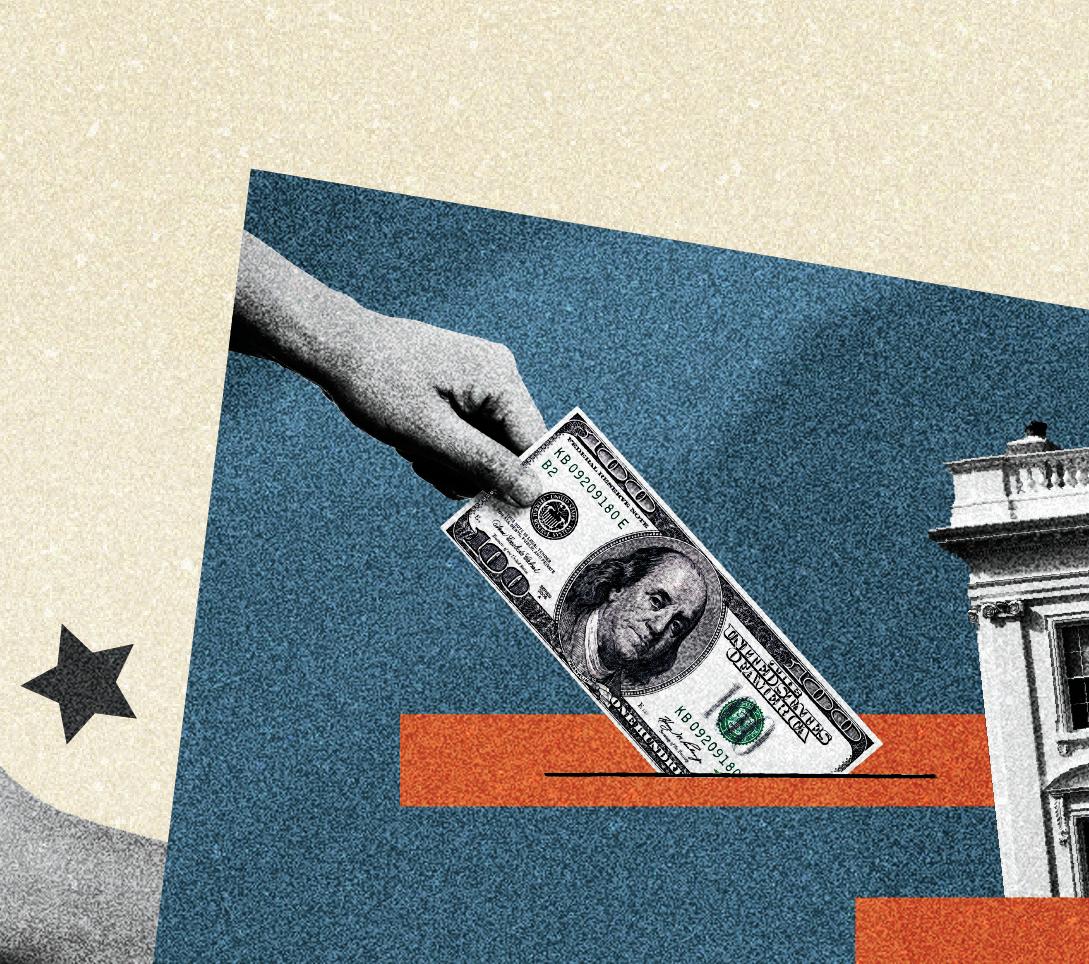
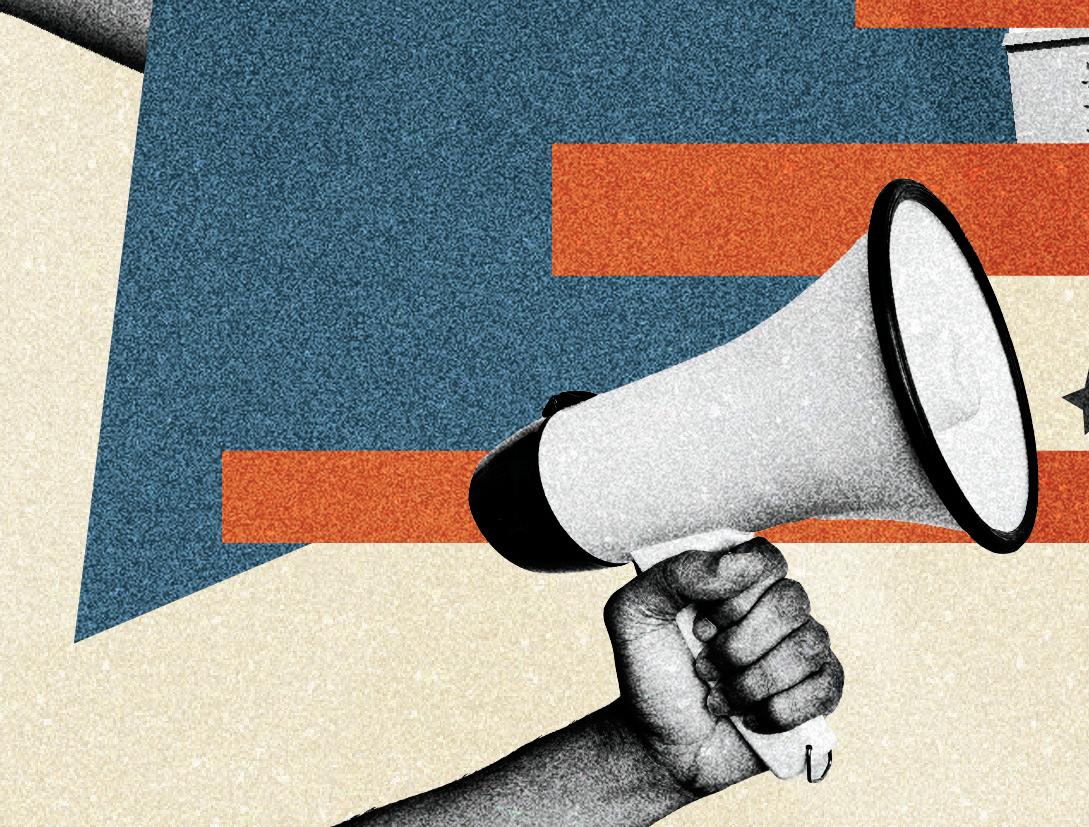
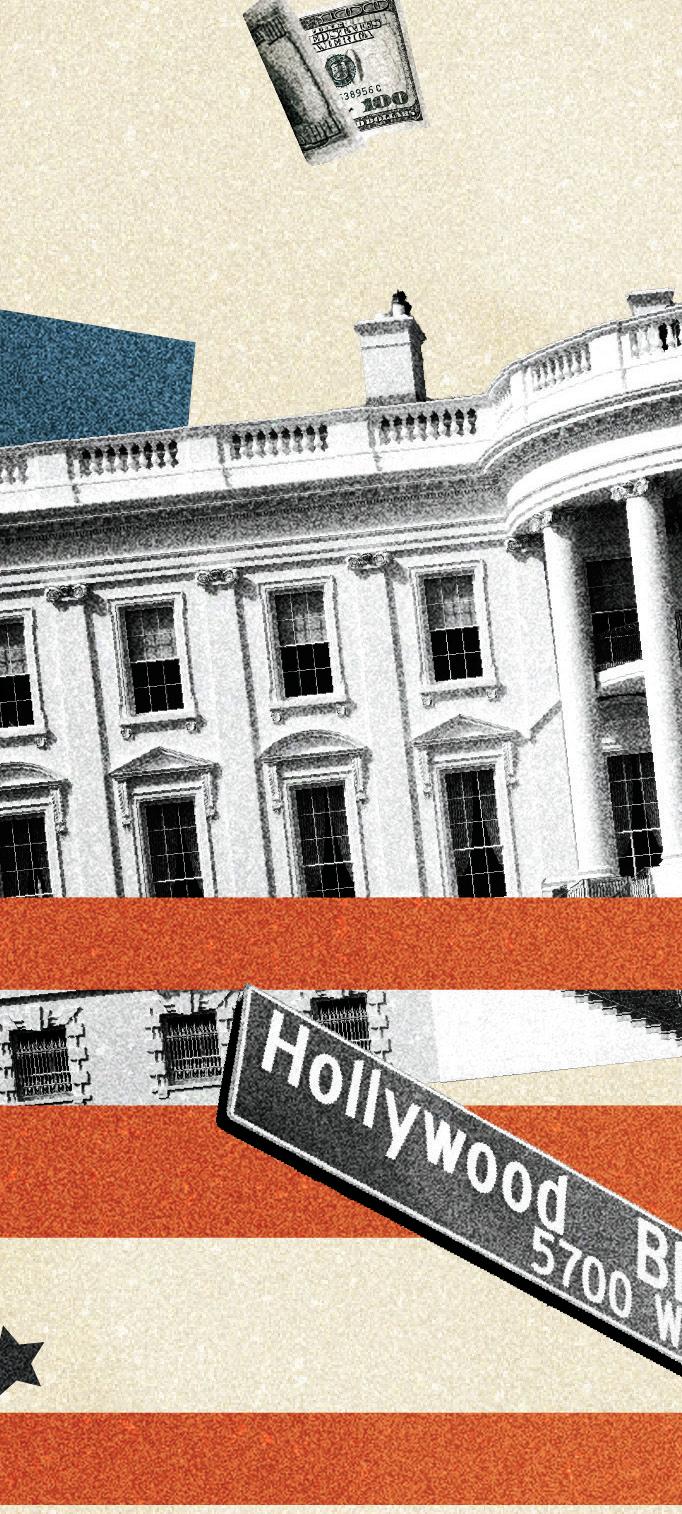



The worlds of Hollywood and DC are poised to intersect more than ever in the 2024 election. Led by Washington bureau chief Ted Johnson and senior editorDominicPatten, Deadline’sElectionLineis a destination for news, analysis and commentary on the Presidential race and the blurring line between politics and entertainment. Available on Deadline.com
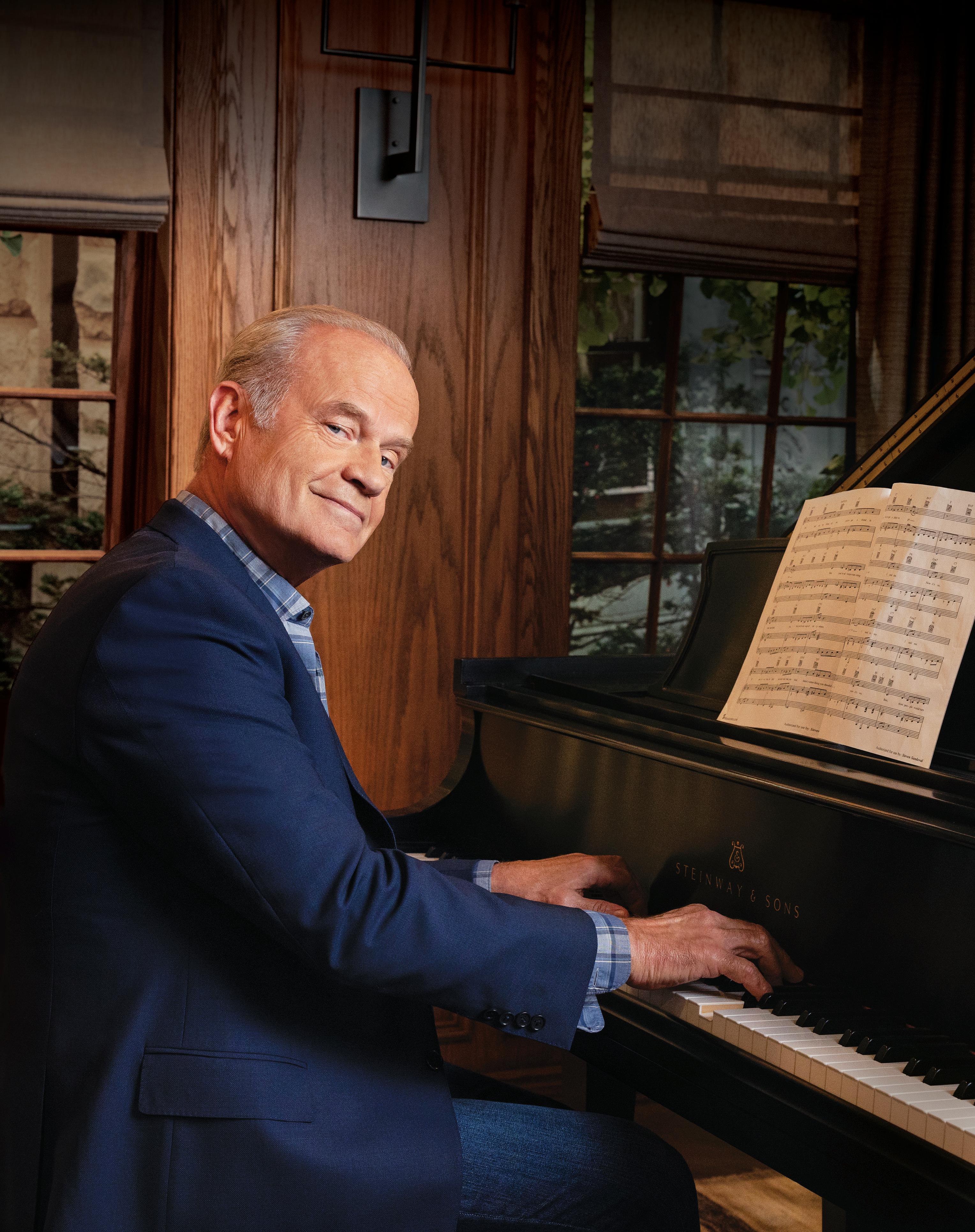
FOR YOUR EMMY ® CONSIDERATION IN ALL CATEGORIES INCLUDING OUTSTANDING COMEDY SERIES LEAD ACTOR KELSEY GRAMMER


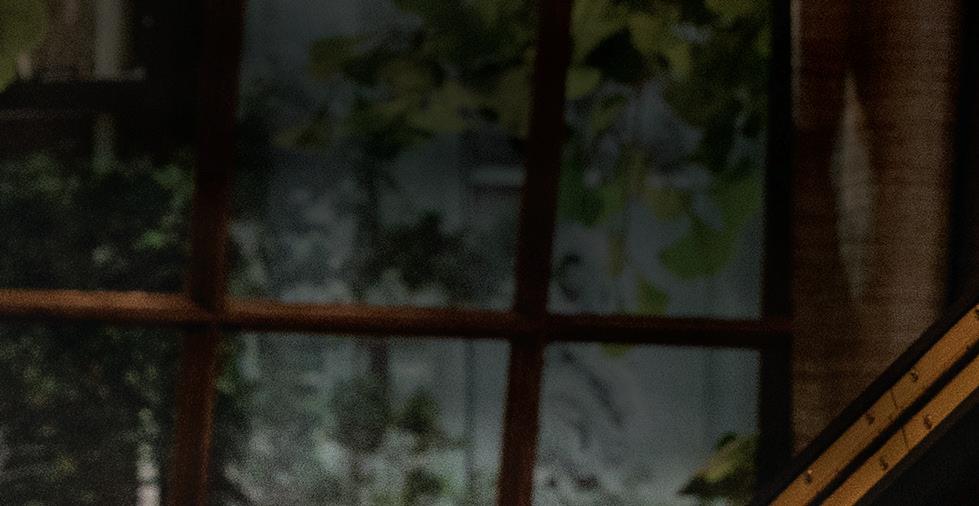
THE
EXCEPTIONAL
SAN FRANCISCO CHRONICLE
IS
AS ALWAYS.” GLAMOUR IS SO COMPLETELY FRASIER THAT
NEW EDITION WRAPS ITSELF COMFORTABLY AROUND HIM.”
LOS ANGELES TIMES
“THE
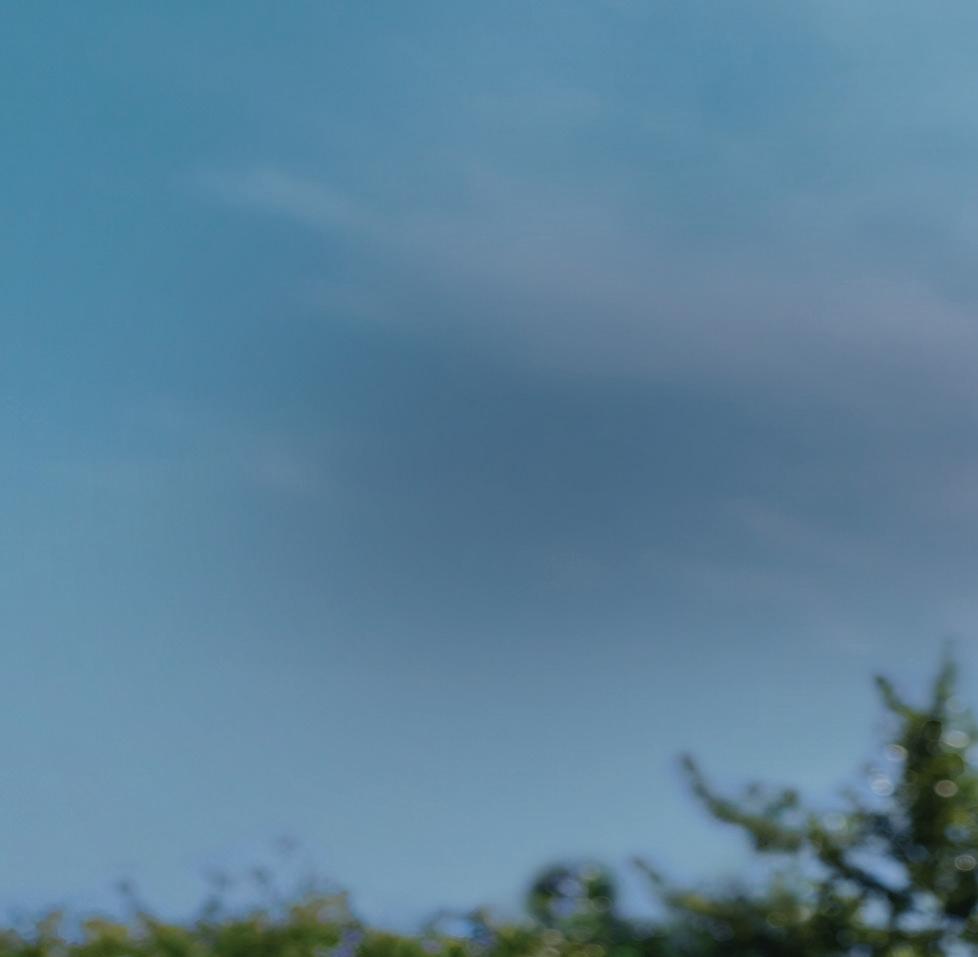
“A COMPLEX, INTIMATE, CAPTIVATING AND VISUALLY STUNNING PORTRAIT OF ANGUISH AND DESIRE.”
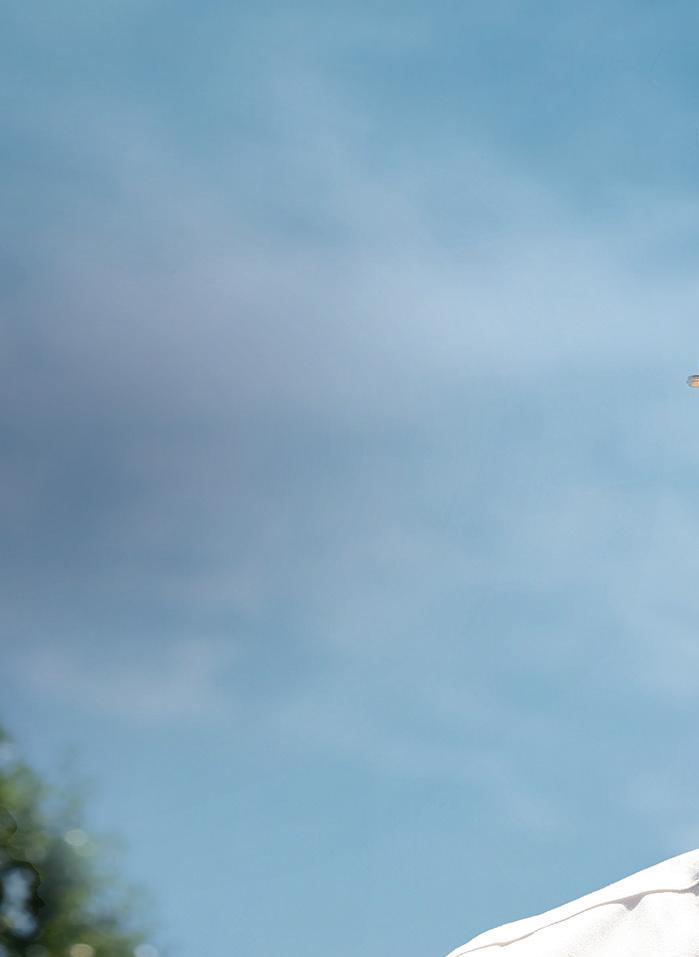
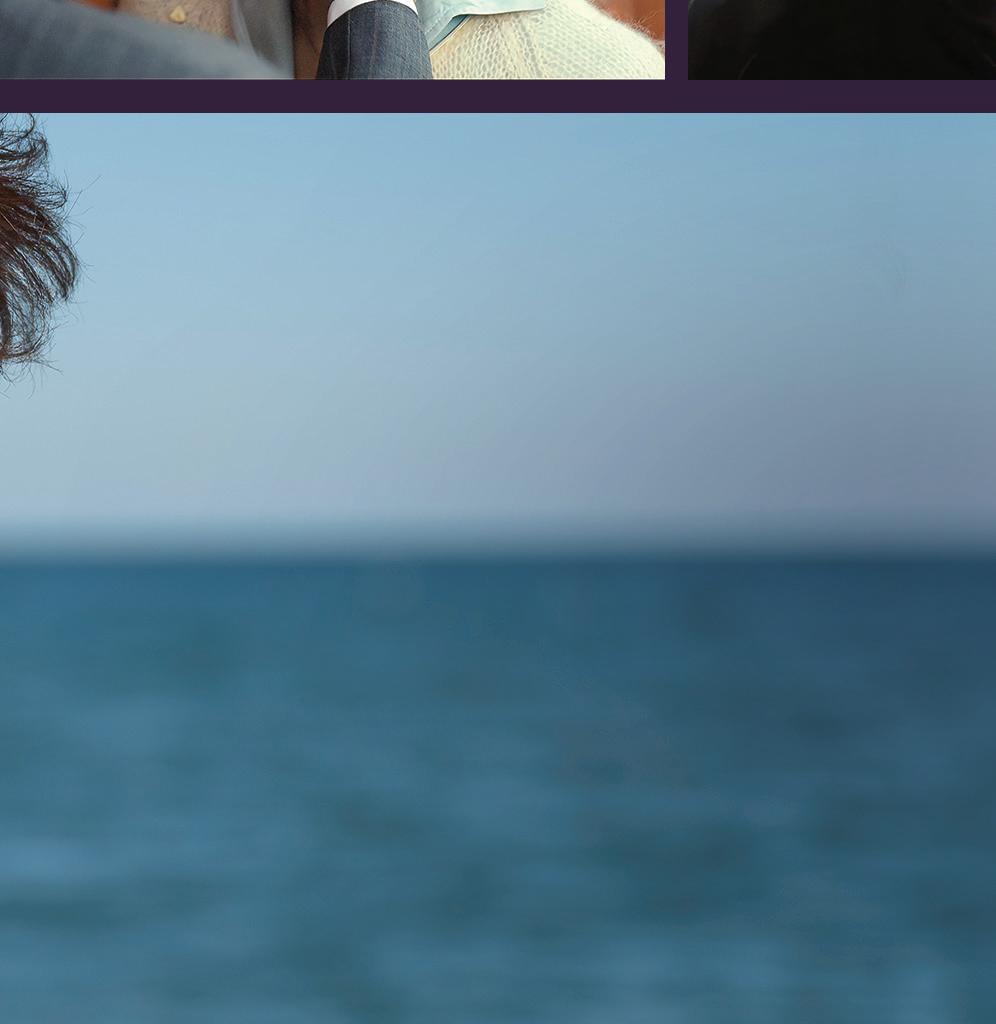
“A DEVASTATING LOVE STORY FOR THE AGES. MATT BOMER and JONATHAN BAILEY deliver the best performances of their careers.” THE A.V. CLUB


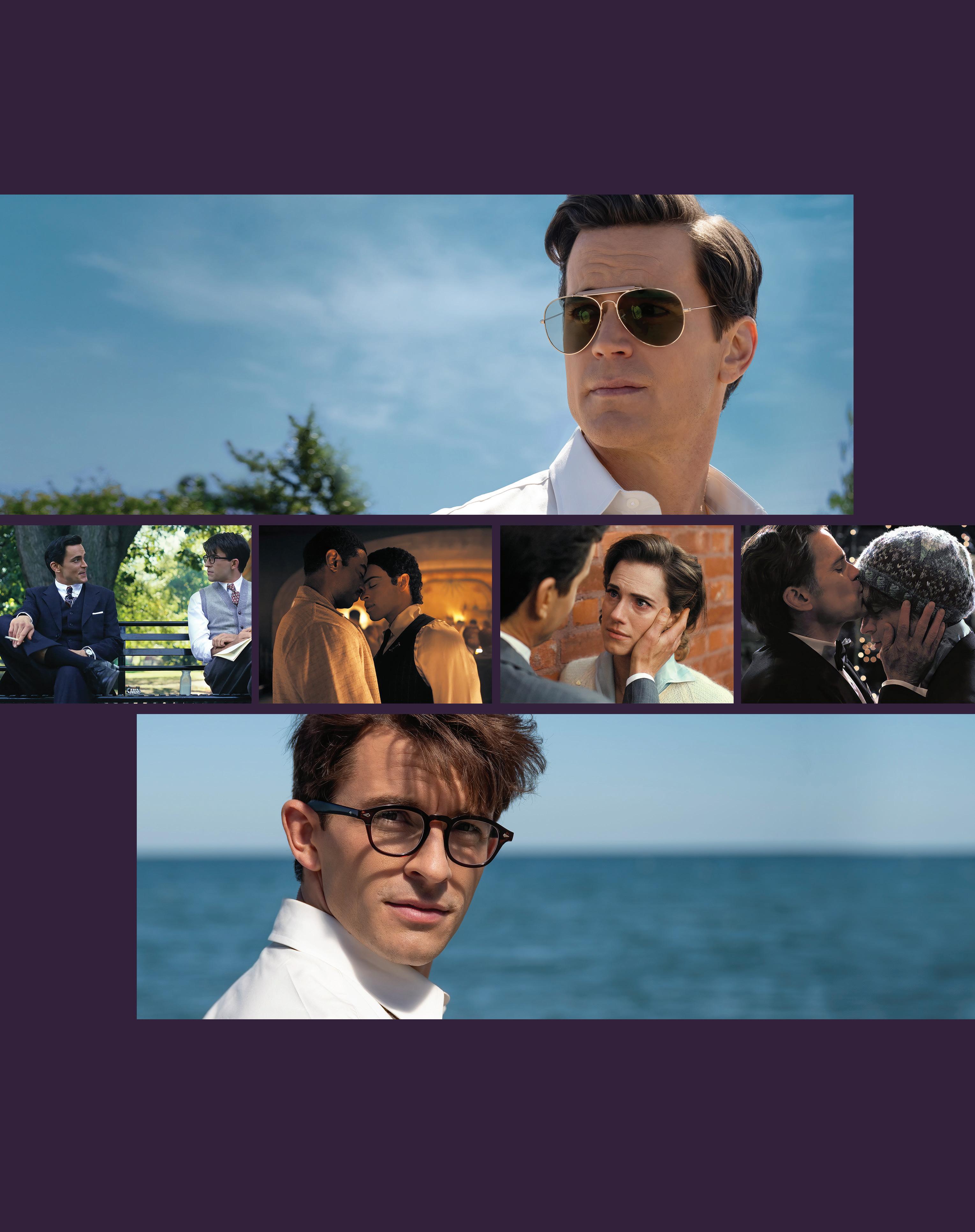
VARIETY
BEST REVIEWED LIMITED SERIES OF THE YEAR” 2023 ROT TEN TOMATOES GOLDEN TOMATO AWARD FOR YOUR EMMY ® CONSIDERATION OUTSTANDING LIMITED SERIES
























































































 Anna Sawai
Anna Sawai









 BY HANNAH RACHEL ABRAHAM
BY HANNAH RACHEL ABRAHAM










































 HIROYUKI SANADA OUTSTANDING LEAD ACTOR IN A DRAMA SERIES
HIROYUKI SANADA OUTSTANDING LEAD ACTOR IN A DRAMA SERIES






































































































































